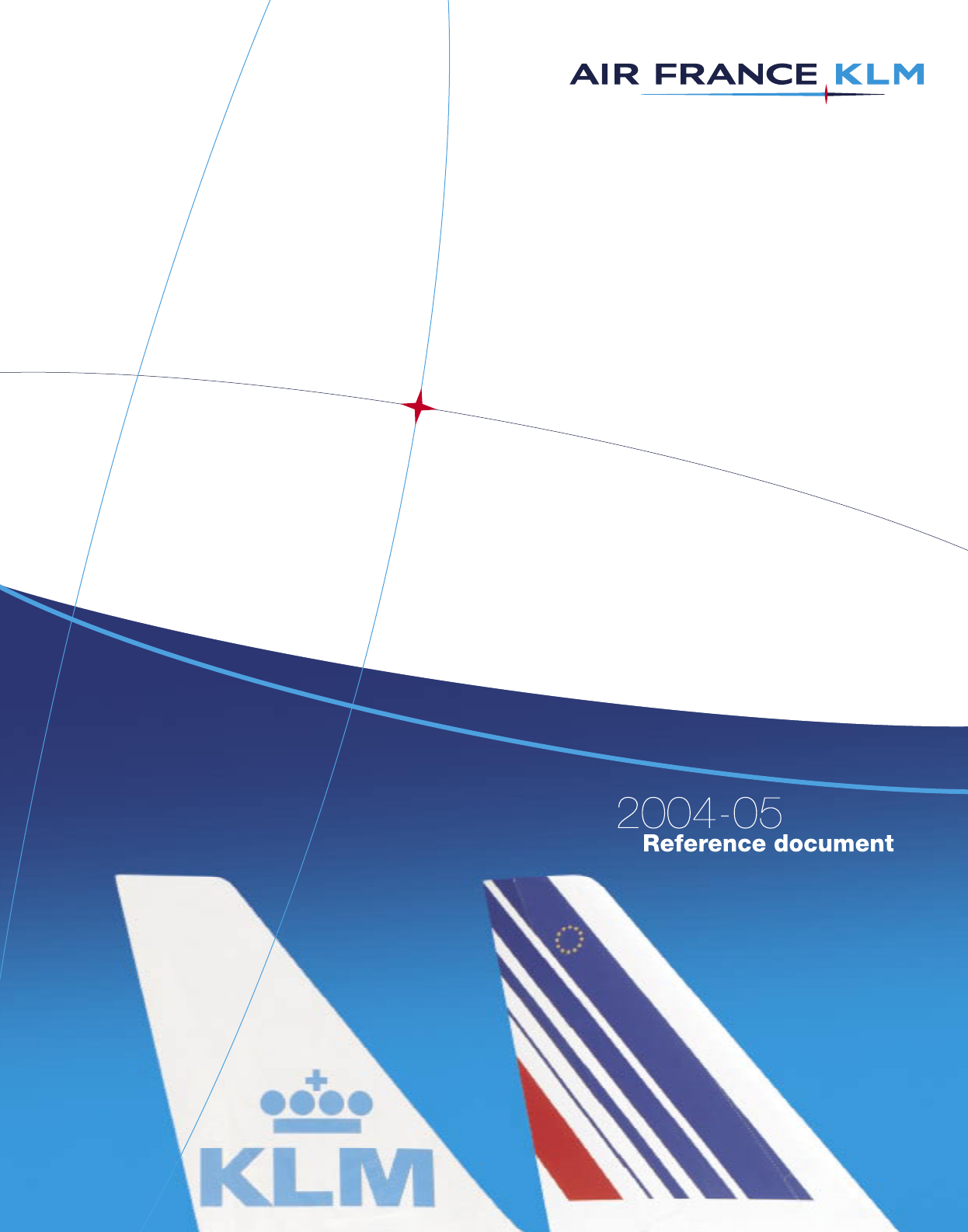
01-MAG UK.indd 1 11/07/05 13:45:45

As the public exchange offer closed on May 3
rd
, 2004,
the Group consolidated data for the first half of fiscal 2004-2005 are presented on the basis
of a 12-month consolidation of the Air France group (April-March) and 11 months for the KLM group (May-March).
Fiscal year 2003-04 is restated on a pro forma basis
01-MAG UK.indd 2 11/07/05 13:45:45

This reference document was filed with the French Autorité des marchés financiers on June 29
th
, 2005,
as required by Articles 211.1 to 211.42 of the general regulations of the AMF. It may be used to support
a financial operation if it is completed by an offering circular approved by the Autorité des marchés financiers
Contents
General
presentation
Activity report
Environmental and
employment data
Risks and risk
management
Financial report
Additional
information
As the public exchange offer closed on May 3
rd
, 2004,
the Group consolidated data for the first half of fiscal 2004-2005 are presented on the basis
of a 12-month consolidation of the Air France group (April-March) and 11 months for the KLM group (May-March).
Fiscal year 2003-04 is restated on a pro forma basis
01-MAG UK.indd 1 11/07/05 13:45:45

2
Chairman’s message
Dear Shareholders,
I
n creating Air France-KLM just over a year ago, we were
pioneers, almost like the first aviators. In some ways, we
reinvented the industry. By staying focused on customer and
shareholder satisfaction, we have opened up new opportunities
for our two airlines by creating the European and Worldwide
leader in air transport.
We have successfully implemented this project, already
producing a strong increase in results this year. A buoyant level
of activity in our three businesses, combined with an effective
cost-control policy, has enabled us to withstand the soaring
price of oil. Finally, thanks to the enthusiastic and effective
mobilization of the teams in both companies, to whom I pay
tribute, not only have synergies been implemented faster than
expected, but they have also been revised upwards.
This first successful year of the merger has been recognized
through various awards, notably from the American magazine,
Air Transport World, which voted Air France-KLM ‘Airline of the
Year’.
The reasons behind our success are simple: the co-operation
between our two companies is based on respect, commitment
and trust.
We view our cultural differences as advantages from which
we can benefit. At the same time, there are many things that
draw us together, fostering an environment of pragmatic co-
ordination, which has made it possible to launch a number of
joint projects, particularly in passenger and cargo but also in
maintenance and information systems. For our customers, this
merger has not only produced an enlarged network, greater
frequency of flights, and access to two efficient hubs, but has
also created a combined loyalty program, Flying Blue, a symbol
of our joint approach.
But just because our results were good this year, it doesn’t
mean we can stop here! To meet our objective of profitable
growth in the longer-term, there are numerous challenges
ahead.
The first and foremost is cost-control. It is by pursuing
the cost-control programs developed within both airlines
that we will succeed in creating an attractive offer, thereby
strengthening Air France-KLM’s leadership in an increasingly
competitive environment. Achieving the anticipated synergies
and identifying further ones will also be important factors in
keeping our costs down.
01-MAG UK.indd 2 11/07/05 13:45:45

3
In a sector exposed to rapid and deep-seated change, the
second challenge is to maintain the capacity to grow without
sacrificing the flexibility that has enabled us to adapt to the many
unforeseen events that have occurred since 2001. Building on
our two hubs, Roissy – Charles-de-Gaulle and Schiphol, we will
continue to develop our capacities in a focused and measured
way, by optimizing the complementary nature of the networks
and combining point-to-point traffic and connecting flights.
Our third challenge is to strengthen our financial structure
while continuing to generate sufficient cash flow to pursue the
rationalization and modernization of our fleet, which in turn will
improve our profitability and enable us to meet the demands of
sustainable development.
These challenges are not new, and we have proven ourselves
equal to the task in the past. Since its listing in 1999, your
company has evolved considerably. Back then, we ranked only
third in Europe with revenues of 10 billion euros, we were not
members of a major alliance, and we were state-owned. Now,
fully privatized, we are the leader in SkyTeam - the alliance
we have created with our key partners - and above all, we
have succeeded in carrying out the first merger in our sector
between two national airlines with different cultures.
In my view, our share price does not yet reflect this
transformation. The airline sector is often perceived as non
value-creating, but I would contend that few sectors could
have withstood the crises that have beset it since the terrorist
attacks of September 11 and their consequences. Our industry
has demonstrated its economic and social relevance and
its ability to weather difficult times. The industry will have to
face up to a difficult environment again this year. However, by
pursuing the strategic course that the Air France-KLM group
has adopted, we are confident that we will be able to achieve
our target of an operating result of a comparable level to that
of 2004-05.
Together with Leo van Wijk, Chairman of KLM, we share the
ambition of reinforcing our position as the World’s leading
airline group, for the benefit of our employees, customers and
shareholders, whose support over this past year has been
crucial.
Thank you for your continued support and the confidence you
have demonstrated in the Group,
Jean-Cyril Spinetta
Entrées de Chapitres UK.indd 5 11/07/05 13:47:55

G
eneral
6
Highlights
8
Key fi gures
10
Corporate governance
20
Stock market
25
Being a shareholder
presentation
Entrées de Chapitres UK.indd 2 11/07/05 15:31:17
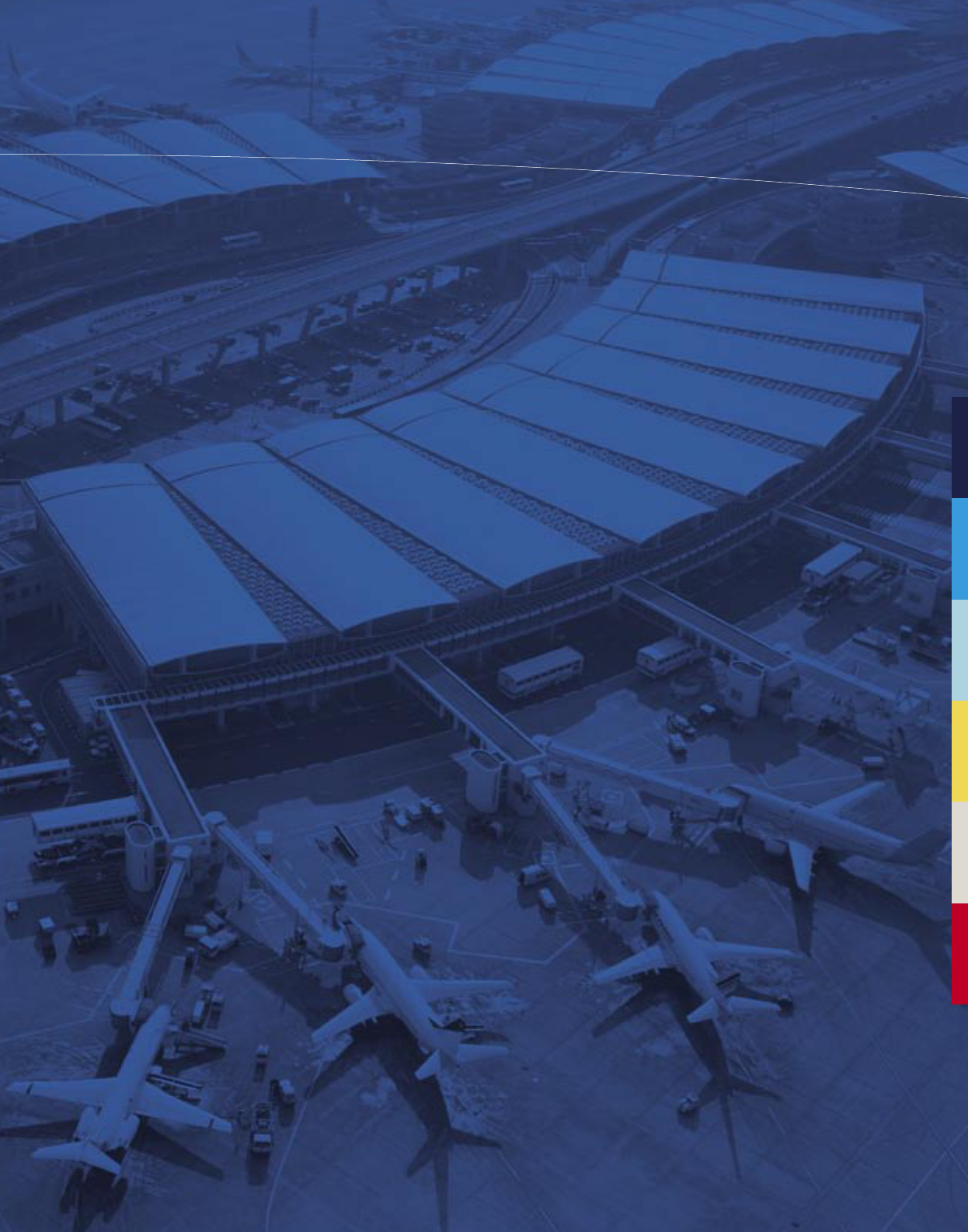
28
Activity report
62
Environmental and
employment data
104
Financial report
202
Additional
information
82
Risks and risk
management
Entrées de Chapitres UK.indd 3 11/07/05 15:31:20
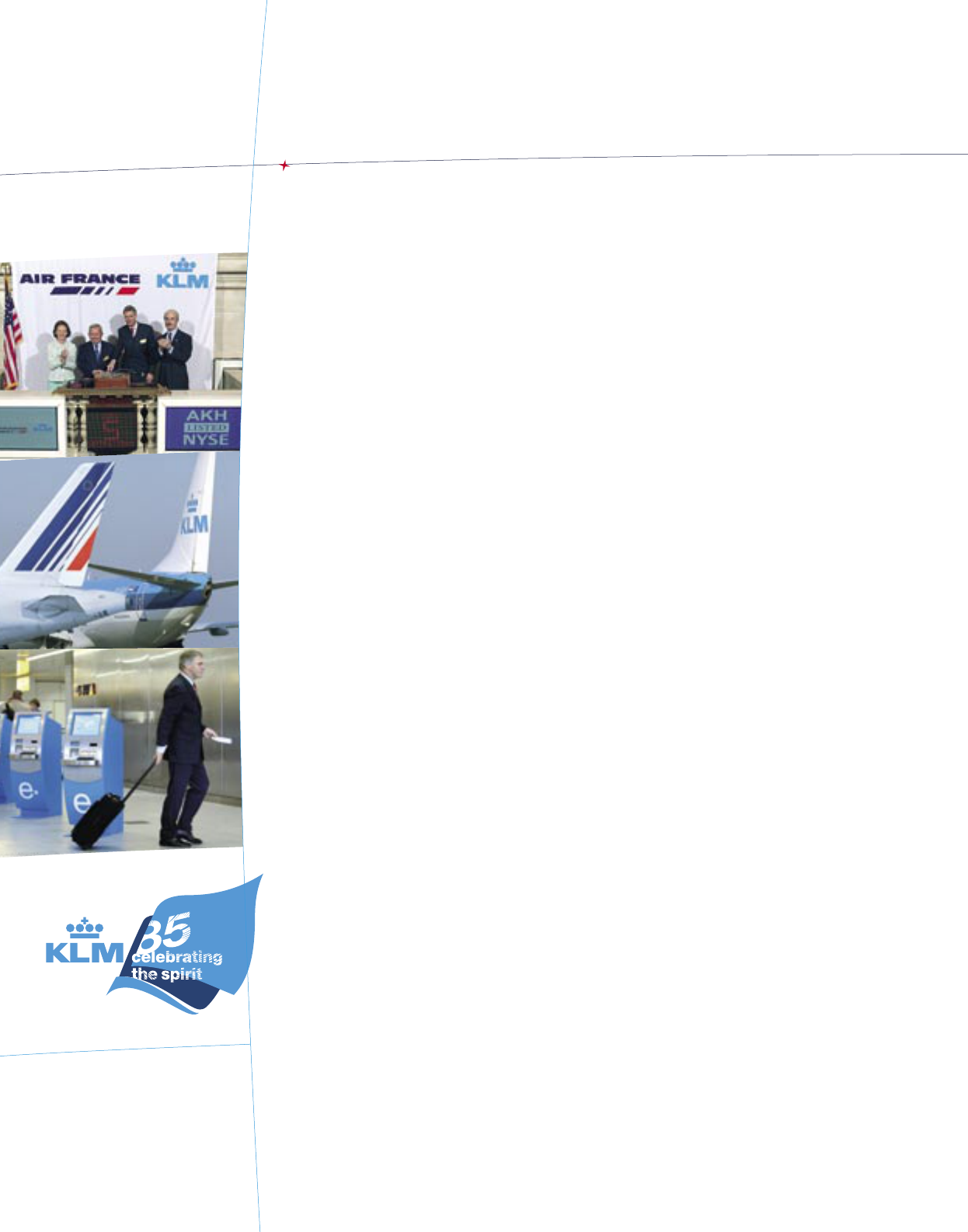
April 2004
On April 5
th
, Air France launches its exchange offer for KLM common stock. The shareholders
of KLM, at the Shareholders’ Meeting of April 19
th
, adopt the bylaw amendments allowing the
formation of the Air France-KLM group. On April 20
th
, the Air France Shareholders’ Meeting
approve the capital increase intended to remunerate the KLM shareholders.
May
The exchange offer for the KLM shares is highly successful, with 96.3% of the shares of
KLM common stock tendered in the offer. On May 5
th
, the Group is listed for trading in Paris,
Amsterdam and New York. On May 6
th
, the privatization of Air France is completed with the
transfer of the majority of the stock to the private sector by dilution of the French State’s stake.
On May 23
rd
, the portion of the vault in the embarkation room in terminal 2E at Roissy - Charles-de-
Gaulle collapses. All flights and personnel are reassigned to other terminals at the hub, resulting in
no cancellation.
June
The Group identifies the top three priorities for the coming years: implement the first measures
to generate synergies, continue a strict cost-control policy, and to develop the SkyTeam alliance.
July
The price of a barrel of oil (Brent IPE) rises above USD 40 in London, the highest level since 1990.
September
The Shareholders’ Meeting finalizes the legal structure of the Group with the creation of the
Air France-KLM holding company, which holds two air carrier subsidiaries: Air France and KLM.
KLM and its American partners Northwest Airlines and Continental join the SkyTeam alliance.
October
KLM celebrates its 85
th
anniversary around the theme Celebrating the spirit.
2004-05 Highlights
6
Entrées de Chapitres UK.indd 4 11/07/05 13:47:53
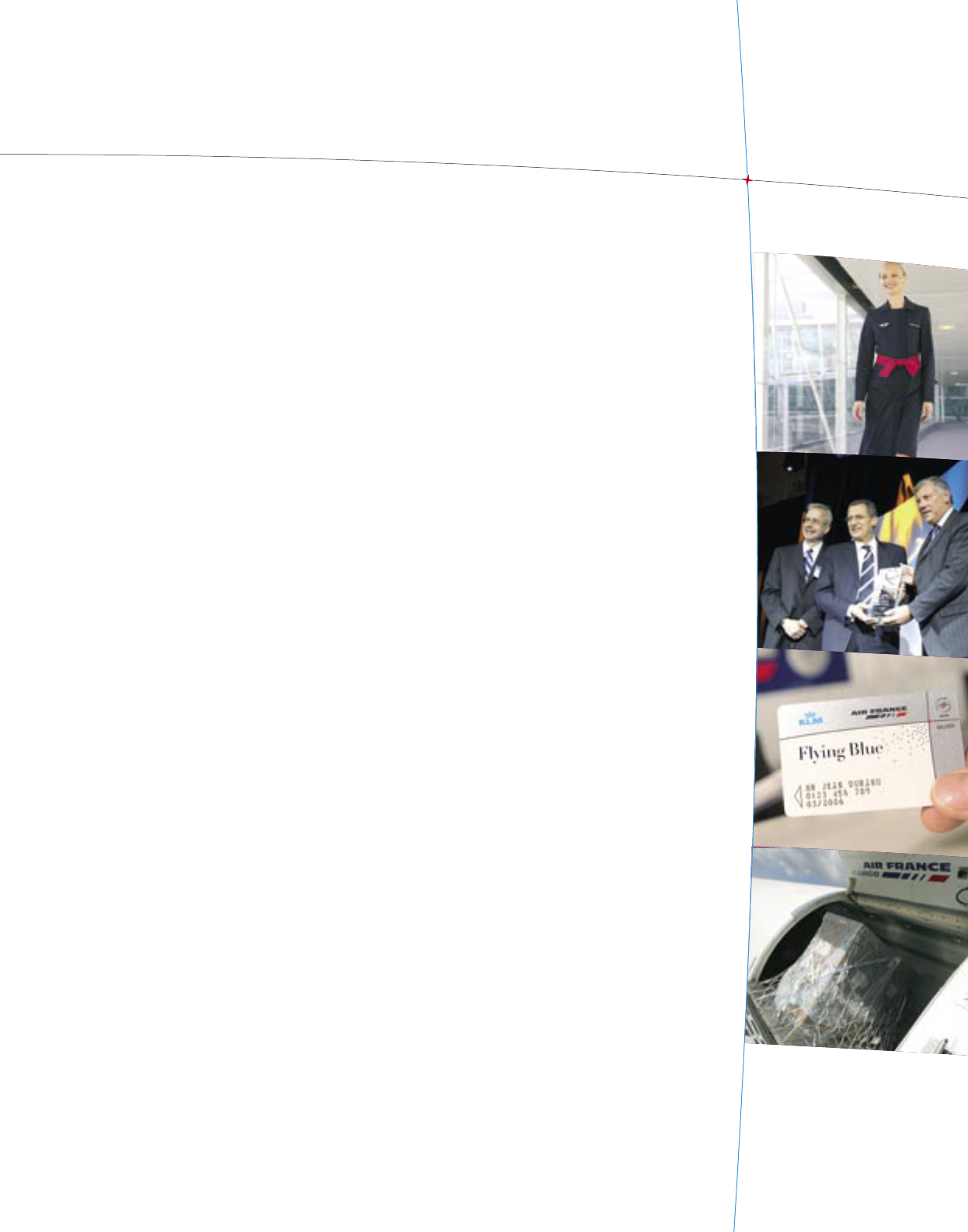
December
On December 9
th
, the French government reduces its equity interest from 44% to 23%, after the
sale of 47.7 million shares.
On December 26, a tsunami ravages the coasts of southern and southeast Asia, claiming
thousands of lives. The Air France and KLM teams are deployed to assist the survivors and
participate financially in the global aid effort.
January 2005
Air France-KLM is elected «Airline of the Year» by the American magazine Air Transport World.
Air France Cargo and KLM Cargo announce the creation of the European Cargo House,
an integrated management team in the cargo segment.
February
An offering reserved for Air France employees and a wage for share exchange are launched
following the French State’s sale of its stake in Air France-KLM.
Mars
Air France-KLM introduces Flying Blue, its single frequent flyer program, which replaces the
Fréquence Plus program from Air France and KLM’s Flying Dutchman program.
April
The price of a barrel of oil (Brent IPE) reaches a record of USD 56.51 in London.
May
At the end of the first successful year of the merger, the Group publishes substantially improved
results.
7
01-MAG UK.indd 7 11/07/05 13:45:52
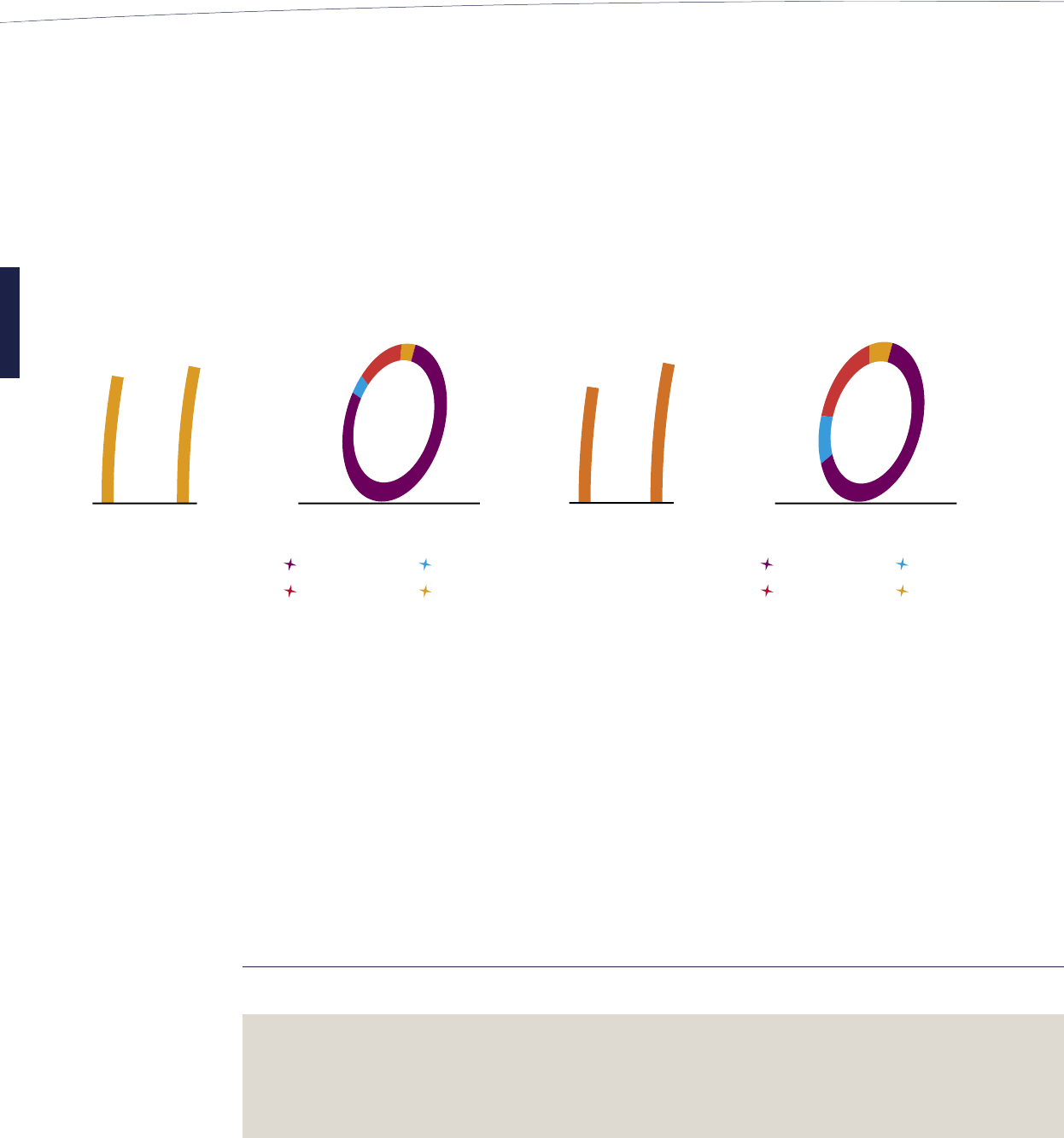
Key figures
The first year of the merger between Air France and KLM has been a resounding success. The teams
have worked together enthusiastically and the success of their combined efforts can be seen in the
115 million euros of synergies achieved, someway above the initial estimate of 65 million euros. They
have helped reinforce the cost-cutting programs at the two companies, enabling the Group to generate
strong growth in earnings despite the massive hike in oil prices.
A successful first year of the merger
2004-05
2003-04
pro forma
19.08
17.78
Cargo Other
Maintenance
Passenger
0.78
15.00
0.81
2.49
2004-05
2003-04
pro forma
489
405
Cargo Other
Maintenance
Passenger
48
312
34
95
Revenues
(in euro billion)
Breakdown
of revenues
(in euro billion)
Operating income
(before aircraft disposals)
(in euro million)
Breakdown of
operating income
(before aircraft disposals)
(in euro million)
All businesses made positive
contributions to operating
income, with a particularly
strong performance on cargo
(+61.0%).
Operating income before
aircraft disposals was up 20.7%
despite fuel costs rising 33.3%
to 2.6 billion euros.
Passenger and cargo activities
recorded growth of 6.8% and
9.4% respectively.
The Group’s revenues increased
7.3% thanks to a sustained level
of activity across all businesses.
8
01-MAG UK.indd 8 11/07/05 13:45:54
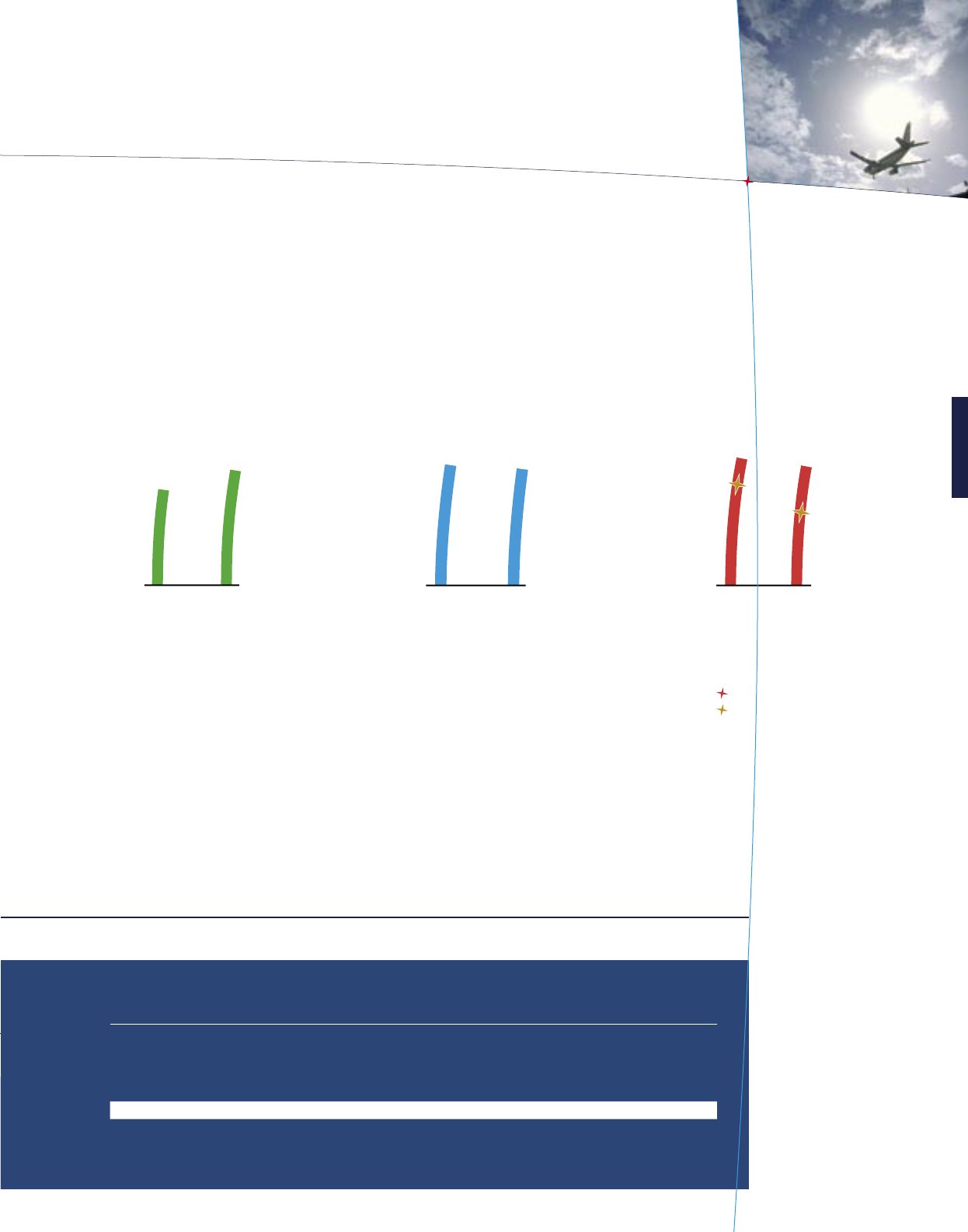
9
Consolidated figures
2004-05
2003-04
pro forma
351
292
Autres
Fret
Maintenance
Passage
12,34
12,34
12,3
4
12,3
4
Financing
Capital expenditure
2.19
2.13
5.90
1.21
5.55
1.06
March 31, 2004
March 31, 2005
pro forma
Net debt (in billions of euros)
Equity gearing
(net debt/shareholders’ equity)
in EUR million
2005
(1) (2)
2004
pro forma
(1)
Change
Revenues 19,078 17,782 +7.3%
EBITDAR 2,873 2,716 +5.8%
Operating income before aircraft disposals
489 405 +20.7%
Pre-tax consolidated net income
455 341 +33.4%
Net income, Group share 351 292 +20.2%
Earnings per share (in euro)
1.36 1.13 +20.4%
(1) Consolidation of Air France over 12 months (April -March) and KLM over 11 months (May-March).
(2) Consolidation of Servair over 15 months (January 2004-March 2005).
Net income,
Group share
(in euro million)
Capital expenditure
financing
(in euro billion)
Financial structure
(in euro billion)
The balance sheet structure has
been considerably strengthened
with equity gearing down to 1.06.
Capital expenditure on aircraft
totaled 1.8 billion euros and
ground investments 0.3 billion.
They were financed by 1.9 billion
in cash flow from operations and
0.3 billion in aircraft disposals.
Earnings per share came out at
1.36 euros at March 31
st
, 2005
compared with 1.13 euros the
previous year, while the dividend
is up to 15 euro cents (5 euro
cents at March 31
st
, 2004).
01-MAG UK.indd 9 11/07/05 13:45:56

Corporate governance
Board of Directors as at March 31
st
2005
The Board’s membership changed during fiscal year 2004–05
to take into consideration the merger between Air France and
KLM, which resulted in the privatization of the Air France group,
agreements signed by the two airlines relating to corporate go-
vernance, the transmission of holdings between the company
and its subsidiary and, finally, the sale of 25.5% of the capital
by the French State.
The Board, which had 21 members at March 31
st
2004,
increased to 26 members on June 24
th
2004, then reduced to
20 members at September 15
th
2004.
Finally, the sale of the French State’s interest in December 2004
resulted in a decrease in the number of its representatives on
the Board.
Since January 20
th
2005, there have been 16 members on the
Board of Directors:
• 11 members elected by the Shareholders’ Meeting;
• 2 representatives of the employee shareholders elected by
the Shareholders’ Meeting;
• 3 representatives of the French state appointed by ministerial
order.
First
appointed
Expiration date
of current term
of office
Number of shares
of the company’s
stock
Other directorships
Jean-Cyril Spinetta
Chairman of the Board
Born October 4
th
1943
23/09/1997
Shareholders’
Meeting called to
approve the finan-
cial statements for
the year ending
March 31
st
2010
65,240
(excluding FCPE units)
Chairman and Chief Executive Officer
of Air France, Director of Alitalia and
Saint-Gobain, permanent represen-
tative of Air France on the Board of
Directors of Le Monde Entreprises.
Leo M. van Wijk
Vice-Chairman of the Board of Directors
Chairman of the Management Board
of KLM
Born October 18
th
1946
24/06/2004
Shareholders’
Meeting called to
approve the finan-
cial statements for
the year ending
March 31
st
2010
500 Director of Northwest Airlines, member
of the Supervisory Board of Martinair,
Aegon N.V., Randstad Holding N.V.,
and member of the Advisory
Committee of ABN AMRO holding
and Kennemer Gasthuis.
Patricia Barbizet
Chief Executive Officer of Artémis
Born April 17
th
1955
03/01/2003
Shareholders’
Meeting called to
approve the finan-
cial statements for
the year ending
March 31
st
2010
2,000 Chairman of the Supervisory Board
of Pinault-Printemps-Redoute and
member of the Supervisory Board
of Financière Pinault, Gucci, Yves
Saint-Laurent and Yves Saint-Laurent
Parfums. Director of FNAC, Christie’s
International plc. and TF1. Permanent
Artémis representative on the Board
of Directors of Bouygues, Sebdo
Le Point, and L’Agefi.
Giancarlo Cimoli
Chairman and Deputy Director of
Alitalia
Born December 12
th
1939
19/07/2004
Shareholders’
Meeting called to
approve the finan-
cial statements for
the year ending
March 31
st
2010
10 Director of Enia S.p.A. and EnerTAD
S.p.A.
Directors appointed by the annual shareholders’ meeting
10
01-MAG UK.indd 10 11/07/05 13:45:56
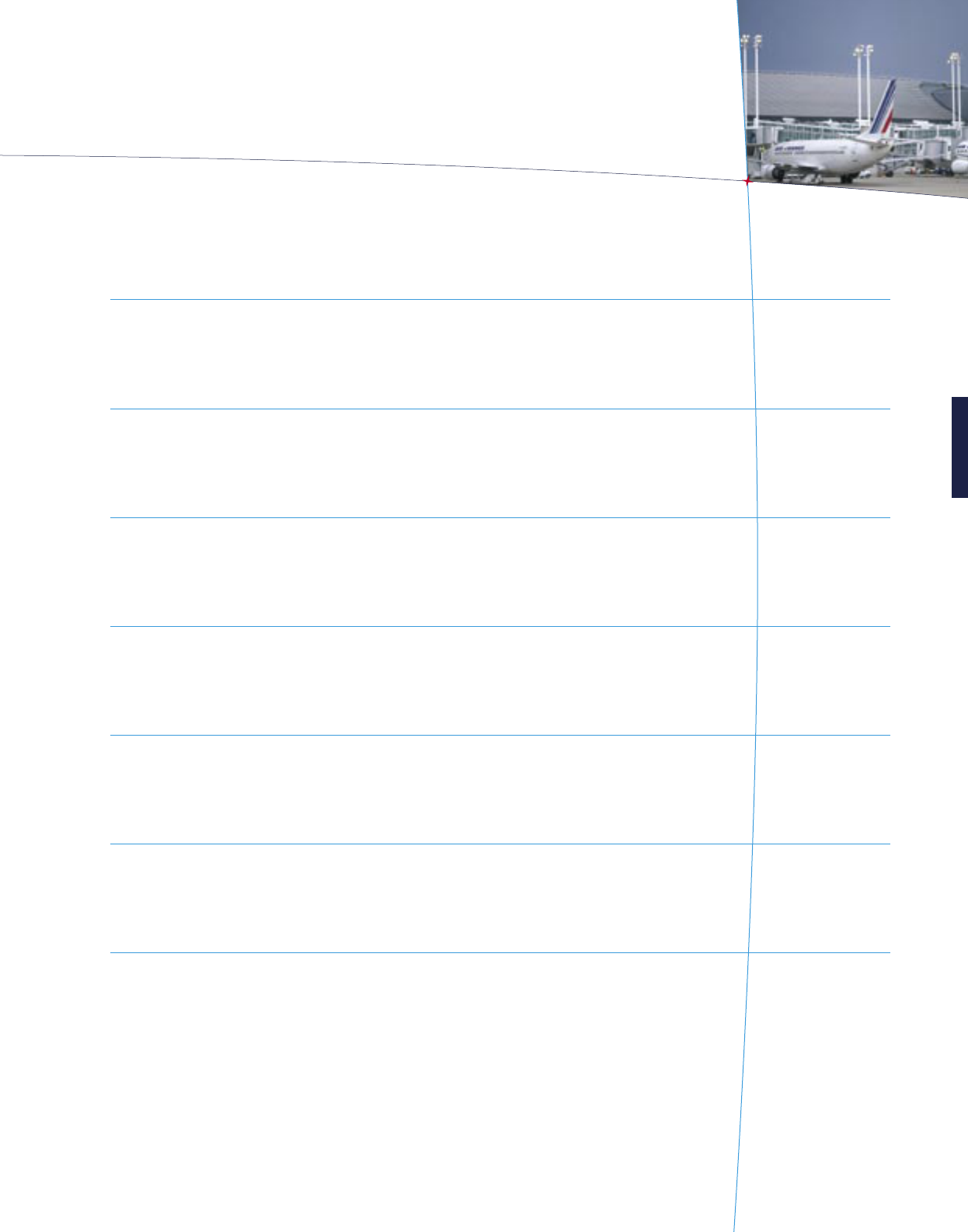
11
First
appointed
Expiration date
of current term
of office
Number of shares
of the company’s
stock
Other directorships
Jean-François Dehecq
Chairman and Chief Executive Officer
of Sanofi-Aventis
Born January 1
st
1940
25/01/1995
Shareholders’
Meeting called to
approve the finan-
cial statements for
the year ending
March 31
st
2010
523 Chairman and Director of Sanofi-Syn-
thelabo Daiichi Pharmaceuticals Co.,
Director Sanofi-Synthelabo Inc and
Fujisawa-Sanofi-Synthelabo.
Willem F. Duisenberg
Born July 9
th
1935
24/06/2004
Shareholders’
Meeting called to
approve the finan-
cial statements for
the year ending
March 31
st
2010
100 Member of the Supervisory Board of
Rabobank.
Jean-Marc Espalioux
Chairman of the Management Board
of Accor
Born March 18
th
1952
14/09/2001
Shareholders’
Meeting called to
approve the finan-
cial statements for
the year ending
March 31
st
2010
601 Director of Veolia Environnement and
Accor UK. Member of the Supervisory
Board of Club Méditerranée and per-
manent Accor representative on the
Supervisory Board of Groupe Lucien
Barrière SAS.
Pierre-Henri Gourgeon
Deputy Chief Executive Officer of
Air France-KLM
Born April 28
th
1946
20/01/2005
Shareholders’
Meeting called to
approve the finan-
cial statements for
the year ending
March 31
st
2011
44,769
(excluding FCPE units)
Chief Operating Officer of Air France
and permanent representative of
Air France-KLM on the Board of
Directors of Air France, Chairman of
Amadeus GTD, Director of Autoroutes
du Sud de la France and Stéria.
Cornelis J. A. van Lede
Born November 21
st
1942
24/06/2004
Shareholders’
Meeting called to
approve the finan-
cial statements for
the year ending
March 31
st
2010
1,000 Director of Reed Elsevier and Sara
Lee Corp. Chairman of the Supervisory
Board of Heineken, member of the
Supervisory Board of Akzo Nobel,
Philips Electronics and Air Liquide,
President of INSEAD.
Floris A. Maljers
Born August 12
th
1936
24/06/2004
Shareholders’
Meeting called to
approve the finan-
cial statements for
the year ending
March 31
st
2010
500 Chairman of the Supervisory Board
of the Rotterdam School of Manage-
ment. Member of the Preferred Stock
Committee of DSM and member of
the Executive Committee of Rand
Europe.
Pierre Richard
Chief Executive Officer and Chairman
of the Management Board of Dexia
Born March 9
th
1941
20/10/1997
Shareholders’
Meeting called to
approve the finan-
cial statements for
the year ending
March 31
st
2010
401
Chairman of the Supervisory Board
of Dexia Crédit Local, Vice-Chairman
of the Board of Directors of Dexia
Banque Belgium and Dexia Banque
Internationale in Luxembourg. Director
of Dexia Banque, FSA Holding, Crédit
du Nord, Le Monde and Generali
France. Member of the Board of Direc-
tors as expert advisor of the European
Investment Bank. Vice-Chairman of
the French Association of Banks and
member of the Executive Committee
of the French Banking Federation.
01-MAG UK.indd 11 11/07/05 13:45:58

First
appointed
Expiration date
of current term
of office
Number of shares
of the company’s
stock
Other directorships
Pierre-Mathieu Duhamel
Director of Budget, French Ministry
of the Economy, Finance and Industry
Born November 17
th
1956
15/01/2003
Shareholders’
Meeting called to
approve the finan-
cial statements for
the year ending
March 31
st
2010
— Director of France Telecom, EDF and
SNCF. Official member of the CEA.
Jean-Louis Girodolle
Deputy Director with the Department
of the Treasury State Holdings Agency
Born August 2
nd
1968
24/06/2004
Shareholders’
Meeting called to
approve the finan-
cial statements for
the year ending
March 31
st
2010
— Director of Renault, RATP, Autoroutes
du Sud de la France, and Aéroports
de Paris.
Claude Gressier
President of the Department
of Economic Affairs,
Counsel General for Public Works
Born July 2
nd
1943
24/06/2004
Shareholders’
Meeting called to
approve the finan-
cial statements for
the year ending
March 31
st
2010
— None
The directors representing the French State are not required to hold shares of the company’s stock.
Directors representing the French State
First
appointed
Expiration date
of current term
of office
Number of shares
of the company’s
stock
Other directorships
Christian Magne
Representative of the ground staff and
cabin crews
Born August 20
th
1952
14/09/2001
Shareholders’
Meeting called to
approve the finan-
cial statements for
the year ending
March 31
st
2010
172
(excluding FCPE units)
—
Christian Paris
Representative of flight deck crew
Born February 8
th
1954
14/09/2001
Shareholders’
Meeting called to
approve the finan-
cial statements for
the year ending
March 31
st
2010
28,000
(excluding FCPE units)
—
Directors representing employee shareholders
Secretary for the Board of Directors
Jean-Marc Bardy
Legal Counsel
12
01-MAG UK.indd 12 11/07/05 13:45:58
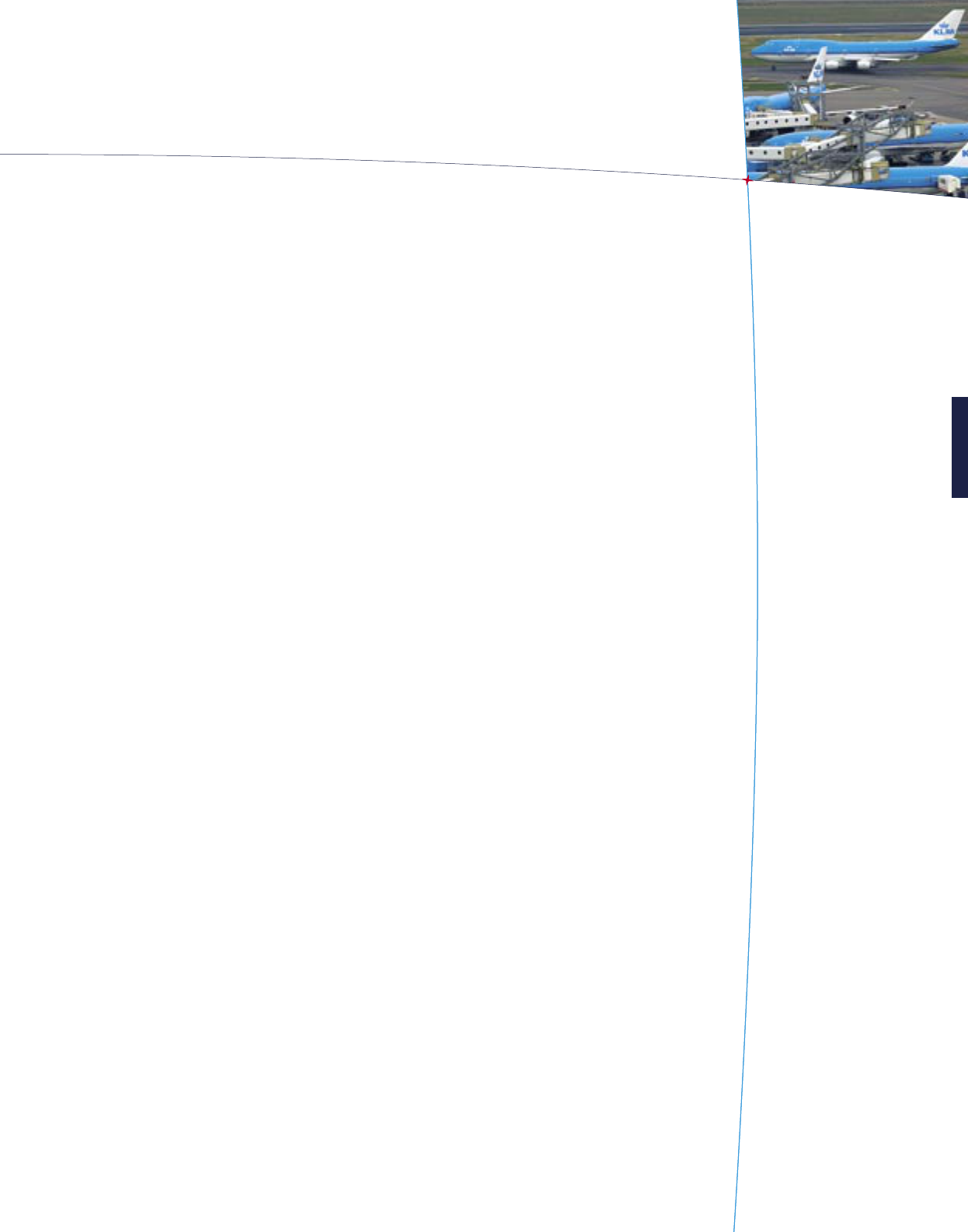
13
13
Board Organization and Operation
Directors are appointed for a six-year term of office. The minimum
number of directors’ shares is 10 shares for directors other
than those who represent the French State and employee
shareholders.
At its meeting on June 24
th
2004, the Board of Directors voted
not to separate the functions of the Chairman and Chief Executive
Officer. The Chairman is appointed by the Board of Directors; he
has full powers to manage the company, with the exception of
the limitations described below. The only limitations placed on the
powers of the Chairman and Chief Executive Officer are those set
forth in the internal rules of the Board of Directors, which stipu-
late that the Chairman and Chief Executive Officer must obtain
prior approval from the Board to conduct the following operations
when the amount exceeds 150 million euros:
• acquire or sell any interests in any companies formed or to be
formed, participate in the formation of any companies, groups
or organizations, subscribe to any issues of stocks, shares or
bonds;
• grant any exchanges, with or without cash payments, on the
Company’s assets, stocks or securities.
At its meeting of June 24
th
2004, the Board of directors decided
to appoint a Deputy Chief Executive Officer to assist the Chairman
and Chief Executive Officer, and defined his powers. The Deputy
Chief Executive Officer has extensive powers in economic, finan-
cial, commercial and employment matters. He must, however,
submit contracts of over 50 million euros for the signature of the
Chairman and Chief Executive Officer.
In addition to the laws and articles of association, the operations
of the Board are governed by internal regulations adopted by the
Board on June 17
th
2004.
These regulations define the roles of the four specialized Board
committees: the Audit Committee, the Strategy Committee, the
Compensation Committee and the Appointments Committee.
The Board of Directors has also adopted an ethics code that sets
forth the obligations of directors in terms of securities transac
-
tions, as well as a financial ethics code that defines the principles
with which the principal executives of the company responsible
for financial information and disclosure must comply.
Between three and five days before the meetings of the Board,
a file containing the agenda and any points that require special
analysis and prior consideration, summary memoranda and/or full
documentation is sent to Board members.
During fiscal year 2004–05, the Board of Directors met ten times.
The meetings lasted an average of three hours and the principal
items on the agenda were presented orally or by video, followed
by discussion. The attendance rate for directors was 80.7% (86%
in 2003–04).
The meetings of the Board were devoted to the review and/or
approval of the interim and final corporate and consolidated
financial statements, the budget, investments in the long-haul fleet,
the oil hedging policy, significant operations including changes
to the structures of the Group, the capital increase reserved
for KLM shareholders, the appointment and remuneration of
corporate officers and regulated agreements.
In its current form, the Board of Directors has initiated a self-
assessment of its operations, since March 31
st
, 2005
01-MAG UK.indd 13 11/07/05 13:46:00

Committees
This committee comprises 5 directors: Jean-François Dehecq,
Chairman of the committee, Jean-Louis Girodolle, Floris Maljers,
Pierre Richard and Christian Magne. The committee meetings are
also attended by the Vice President Finance of Air France-KLM,
the KLM Chief Financial Officer, the internal audit directors of each
of the two subsidiaries and the Statutory Auditors.
The committee has been tasked to review the consolidated
financial statements, the main financial risks, the results of in
-
ternal audits, the work programme, and the conclusions and
recommendations of the Statutory Auditors. The committee
approves the amount of the auditors’ fees and gives prior ap-
proval for some services provided by the Statutory Auditors.
It must also ensure the quality of procedures to ensure com
-
pliance with stock market regulations.
In addition, the Audit Committee reviews the interim and annual
consolidated accounts before they are submitted to the Board of
Directors and, specifically, it must review:
• the consolidation perimeter
• the relevance and permanence of the accounting methods
used to prepare the financial statements;
• the principal estimates made by management;
• the comments and recommendations made by the Statutory
Auditors and, if applicable, any significant adjustments resulting
from audits;
• with the company’s management a periodic review of the prin-
cipal financial risks and the off balanced sheet commitments;
• the programme and the results of the internal audits conducted
by the subsidiaries.
In fiscal year 2004–05, the Audit Committee met to review the
annual financial statements (May 12
th
2004), the half-yearly
statements (November 15
th
2004), and the quarterly state-
ments (February 14
th
2005). The Audit Committee also met on
September 21
st
2004 to review the 20-F document filed with
the US Securities and Exchange Commission and the process
to convert the annual financial statements of the company into
US GAAP because the company is listed on the New York
Stock Exchange. This meeting also dealt with the application
of the Sarbanes-Oxley Act to the company. Finally, on February
14
th
2005, the committee considered the progress on the
internal control action plan, and the internal audit work pro
-
gramme. The attendance rate for members was 81.7% (87.5%
in 2003–04).
The Audit Committee has the resources necessary to perform
its mission; it may also be assisted by persons outside the
company.
The Audit Committee
The Strategy Committee
The Strategy Committee comprises 7 directors: Jean-Cyril
Spinetta, Chairman of the committee, Leo van Wijk, Patricia
Barbizet, Pierre Duhamel, Claude Gressier, Christian Paris, and
Christian Magne.
The meetings are also attended by the Deputy Chief Executive
Officer, the Vice President Finance, and the Secretary of the
Board of Directors.
The committee has been tasked to review the strategies for
the Group’s business, changes in the structure of its fleet or
subsidiaries, the acquisition or disposal of aeronautical and
non-aeronautical assets, and the policy for air transport sub
-
contracting and alliances.
The committee devoted its November 8
th
2004 meeting to
preparing the Board’s work on the operations for modifying
Air France’s stake in Amadeus France and Amadeus GTD,
and concerning oil hedging policies. It reviewed the changes
in the Air France long-haul fleet plan during its meeting on
February 7
th
2005. The attendance rate for members was
100% (87.5% in 2003–04).
14
01-MAG UK.indd 14 11/07/05 13:46:00
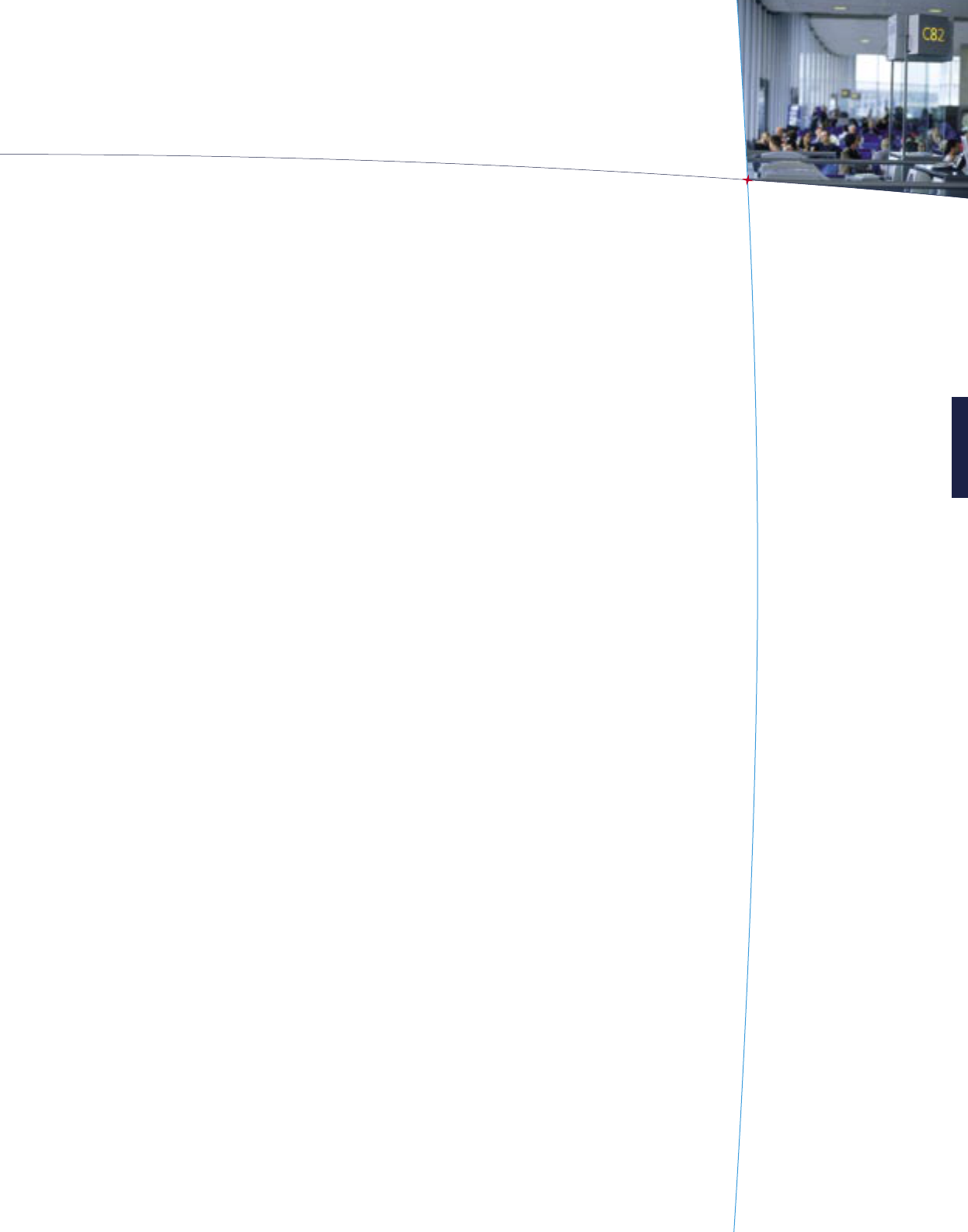
15
The Remuneration Committee
The Appointments Committee
In the context of privatization, the company adopted rules for the
appointment of directors and corporate officers and, pursuant
to the agreements signed with KLM, the company wanted to
create an Appointments Committee, the internal rules of which
were approved by the Board of Directors on March 4
th
2004.
The committee has three members: Jean-Marc Espalioux,
Chairman of the committee, Patricia Barbizet, Jean-François
Dehecq, and one substitute member. The Appointments
Committee proposes candidates to serve as members of the
Board of Directors, which approves these recommendations
and submits them for election to the Shareholders’ Meeting
of the company. The Committee met in April 2004 to make
recommendations to the Board for the election of new Board
members by the Shareholders’ Meeting on June 24
th
2004.
The attendance rate for members was 100%.
The Appointments Committee also names the members of
the Strategic Management Committee after consulting the
Chairman and Chief Executive Officer of Air France for the
members who represent Air France and consulting the KLM
Supervisory Board for the members representing KLM.
The Remuneration Committee comprises 3 directors: Jean-Marc
Espalioux, Chairman of the Committee, Cornelis Van Lede and
Pierre Richard. It is primarily responsible for submitting proposals
for the level of and changes to the remuneration of the Chairman
and Chief Executive Officer.
It may also be called upon to give an opinion on the compensa
-
tion of senior executives, as well as on the policy for stock option
plans for new or existing shares.
The committee met on June 15
th
2004 and November 23
rd
2004
to give the Board an opinion on the variable portion of the
compensation for the Chairman and Chief Executive Officer for
fiscal year 2003–04 and to prepare for the Board’s discussions
on the compensation of the Chairman and Chief Executive
Officer and the Deputy Chief Executive Officer for fiscal year
2004–05. The attendance rate for members was 100% (100%
in 2003–04).
01-MAG UK.indd 15 11/07/05 13:46:01

The Remuneration Committee recommended to the Board of
Directors, which adopted the recommendation on November
23
rd
2004, that it set the elements of the compensation for the
Chairman and Chief Executive Officer and the Deputy Chief
Executive Officer for their duties in Air France-KLM and in
Air France as follows:
• Chairman and Chief Executive Officer: basic remuneration
of 750,000 euros p.a. over two years, with a bonus on ob-
jectives that can represent 60% of the basic remuneration.
- 2004-05: 550,000 euros and a target bonus of 60%
- 2005-06: 750,000 euros and a target bonus of 60%
• Deputy Chief Executive Officer: basic remuneration of
550,000 euros p.a. over two years, with a bonus on objec
-
tives that can represent 60% of the basic compensation.
- 2004-05: 370,000 euros and a target bonus of 50%
- 2005-06: 550,000 euros and a target bonus of 60%
The criteria for awarding the bonus are as follows:
• 50% linked to the achievement of the results set in the bud
-
get,
• 50% linked to the achievement of new strategic objectives,
including gains in market share and preservation of econo
-
mic balance.
The Chairman and Chief Executive Officer and the Deputy
Chief Executive Officer also have a pension plan, which was
set up in 2003 for 39 executives of Air France and guarantees
an annual pension benefit of between 35% and 40% of their
annual average remuneration during the last three years of
employment based on time with the company.
They do not receive a severance package if they leave the
company.
Compensation
The Shareholders’ Meeting of June 24th 2004 allocated
directors’ fees to the member of the Board for fiscal year
2004-05. The directors’ remuneration modalities are the
following: 12,000 euros as the fixed portion and 12,000 euros
as the variable portion; for the Committee Chairman:
10,000 euros for the Audit committee and 7,000 euros
for the other committees, for the Committee member:
6,000 euros for the Audit committee and 4,000 euros for
the other committees. A global amount of 553,028 euros
has been paid.
Compensation for Directors
Remuneration for Corporate Officers
(1) Amount transferred directly to the Treasury
Directors Directors’ fees paid by
the company
Pierre-Henri Gourgeon 4,849 euros
Claude Gressier 16,969 euros
Cornelis J.A. van Lede 17,878 euros
Christian Magne 32,500 euros
Floris A. Maljers 21,469 euros
Christian Paris 26,909 euros
Pierre Richard 29,636 euros
Directors who have left their
duties during the fiscal year 180,820 euros
Directors Directors’ fees paid by
the company
J
ean-Cyril Spinetta 31,000 euros
Leo M. van Wijk 22,060 euros
Patricia Barbizet 28,727 euros
Giancarlo Cimoli 9,091 euros
Jean-François Dehecq 35,818 euros
Pierre-Mathieu Duhamel 29,500 euros
Willem F. Duisenberg 15,878 euros
Jean-Marc Espalioux 30,364 euros
Jean-Louis Girodolle 19,560 euros
(1)
(1)
(1)
16
01-MAG UK.indd 16 11/07/05 13:46:02

17
2004-05 Position Gross
remuneration
Variable
remuneration
(1)
Achievement
of objective
Jean-Cyril Spinetta Chairman
and Chief
Executive Officer
of Air France-KLM
and Air France
550,000 euros 160,000 euros
100%
Leo van Wijk Director
Chairman of the
KLM Management Board
653,709 euros 429,731 euros
Partially
Pierre-Henri Gourgeon
Deputy Chief Executive
Officer of Air France-KLM
and Chief Operating Officer
of Air France
363,675 euros 142,300 euros 100%
(1) Variable remuneration received for the previous year.
Mr Spinetta and Mr Gourgeon have decided to part to the tran-
che offer to the group Air France employees and to exchange
salary for shares.
Stock options for new or existing shares granted to the
corporate officers of the company
The company has not established a stock option scheme for
its corporate officers.
For all information on the stock option schemes established by
the subsidiaries for their own executives, officers or employees
which entitle the holders to shares of Air France-KLM, see
«Additional Information – Information on the share capital
– Stock option schemes».
Loans and guarantees granted to corporate officers of
the company
None.
The remuneration of the Chairman and Chief Executive Officer
and the Deputy Chief Executive Officer of Air France-KLM is
invoiced to Air France under a regulated agreement approved
by the Board of Directors on November 23
rd
2004, for the
responsibilities they perform in this subsidiary.
The remuneration of the Chairman of the KLM Management
Board is decided by the KLM Supervisory Board. He also
benefits from a pension plan managed in accordance with
Dutch law. The company contributed 228,278 euros to this
plan for fiscal year 2004–05. In addition, Mr van Wijk may
benefit from a severance package equal to his final salary plus
an amount equal to the average of his bonuses for the last
three years if his contract is not renewed when it expires in
January 2007.
01-MAG UK.indd 17 11/07/05 13:46:04

Strategic Management Committee (SMC)
The Group is also managed by a Strategic Management Com-
mittee comprising eight members named by the Appointments
Committee. The SMC meets every two weeks, alternating
between Amsterdam and Paris, to make decisions relating in
particular to the coordination of networks and hubs, medium-
term budgets and plans, the fleet and investment plan and
alliances and partnerships.
The members of the SMC are paid by the companies to which
they are attached.
(For more information on the role and responsibilities of the
SMC and the Chairman of the SMC: see the section on
«Additional information».)
Jean-Cyril Spinetta
Chairman and Chief Executive Officer of Air France-KLM
and Air France and Chairman of the SMC
Joined the company in 1997
Born October 4
th
1943, Mr Spinetta attended the Ecole
Nationale d’Administration.
Leo van Wijk
Chairman of the KLM Management Board
Joined the company in 1971
Born October 18
th
1946, Mr van Wijk holds a master’s degree
in economics.
Philippe Calavia
Vice President Finance of Air France-KLM and
Chief Financial Officer of Air France
Joined the company in 1998
Born October 1
st
1948, Mr Calavia attended the Ecole
Nationale d’Administration.
Pierre-Henri Gourgeon
Deputy Chief Executive Officer of Air France-KLM and
Chief Operating Officer of Air France
Joined the company in 1993
Born April 28
th
1946, Mr Gourgeon attended the
Ecole Polytechnique.
Peter Hartman
Chief Operating Officer of KLM
Joined the company in 1973
Born April 3
rd
1949, Mr Hartman is a graduate in mechanical
engineering of the Polytechnical Institute of Amsterdam and a
graduate in management from the University of Rotterdam.
Bruno Matheu
Senior Vice President – Marketing and Network Management
for Air France
Joined the company in 1992
Born August 2
nd
1963, Mr Matheu is a graduate of the Ecole
Centrale de Paris.
Michael Wisbrun
Executive Vice-President for Cargo for KLM
Joined the company in 1978
Born March 14
th
1952, Mr Wisbrun holds a master degree in
engineering of the University of Delft.
Cees van Woudenberg
Chief Human Resources Officer, KLM
Joined the company in 1989
Born June 27
th
1948, Mr van Woudenberg is a law graduate
of the University of Leiden.
As of March 31
st
2005, the members of the Strategic Management Committee were
18
01-MAG UK.indd 18 11/07/05 13:46:04
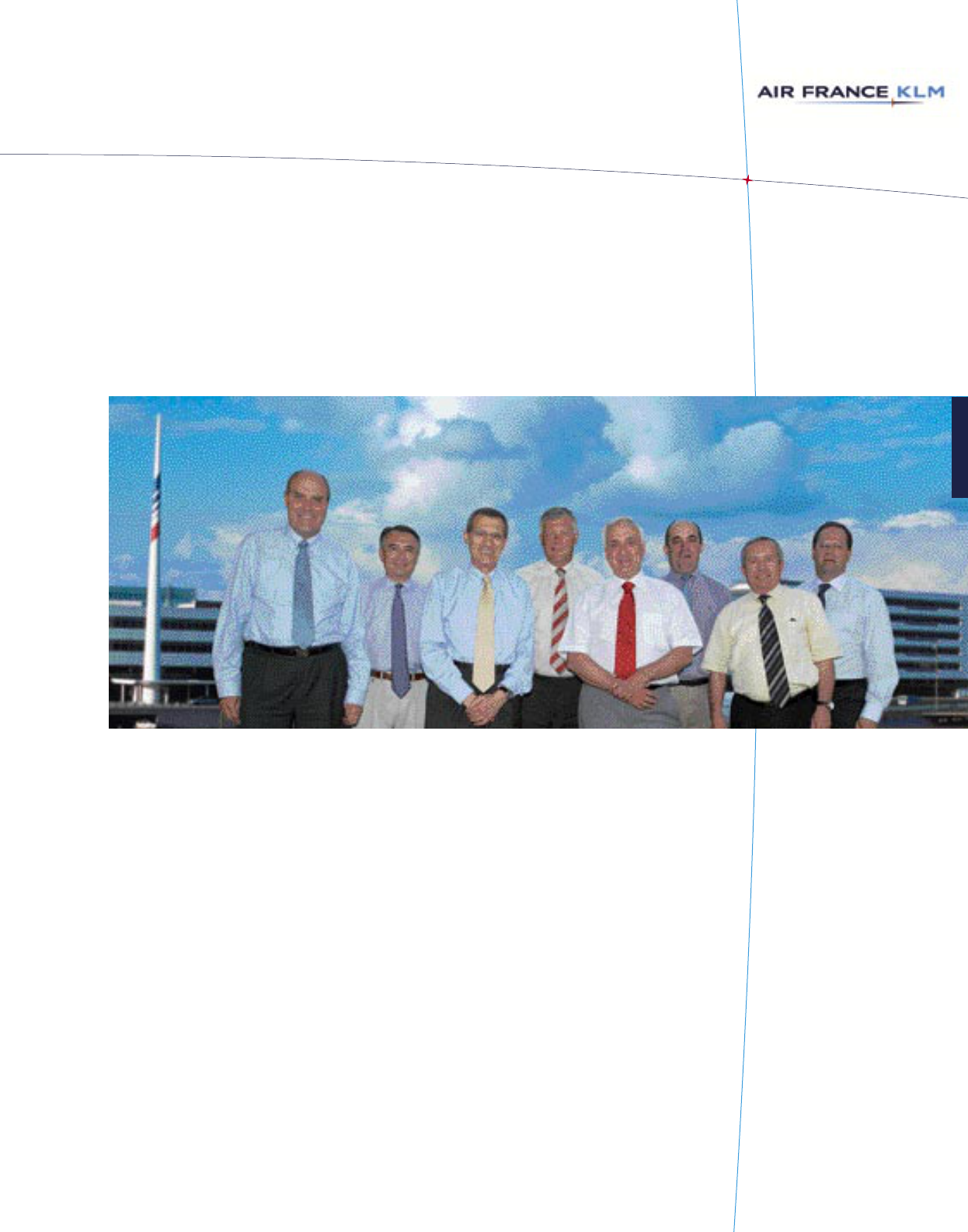
19
From left to right:
Peter Hartman, Philippe Calavia, Jean-Cyril Spinetta,
Leo van Wijk, Cees van Woudenberg, Bruno Matheu,
Pierre-Henri Gourgeon, and Michael Wisbrun
01-MAG UK.indd 19 11/07/05 13:46:08
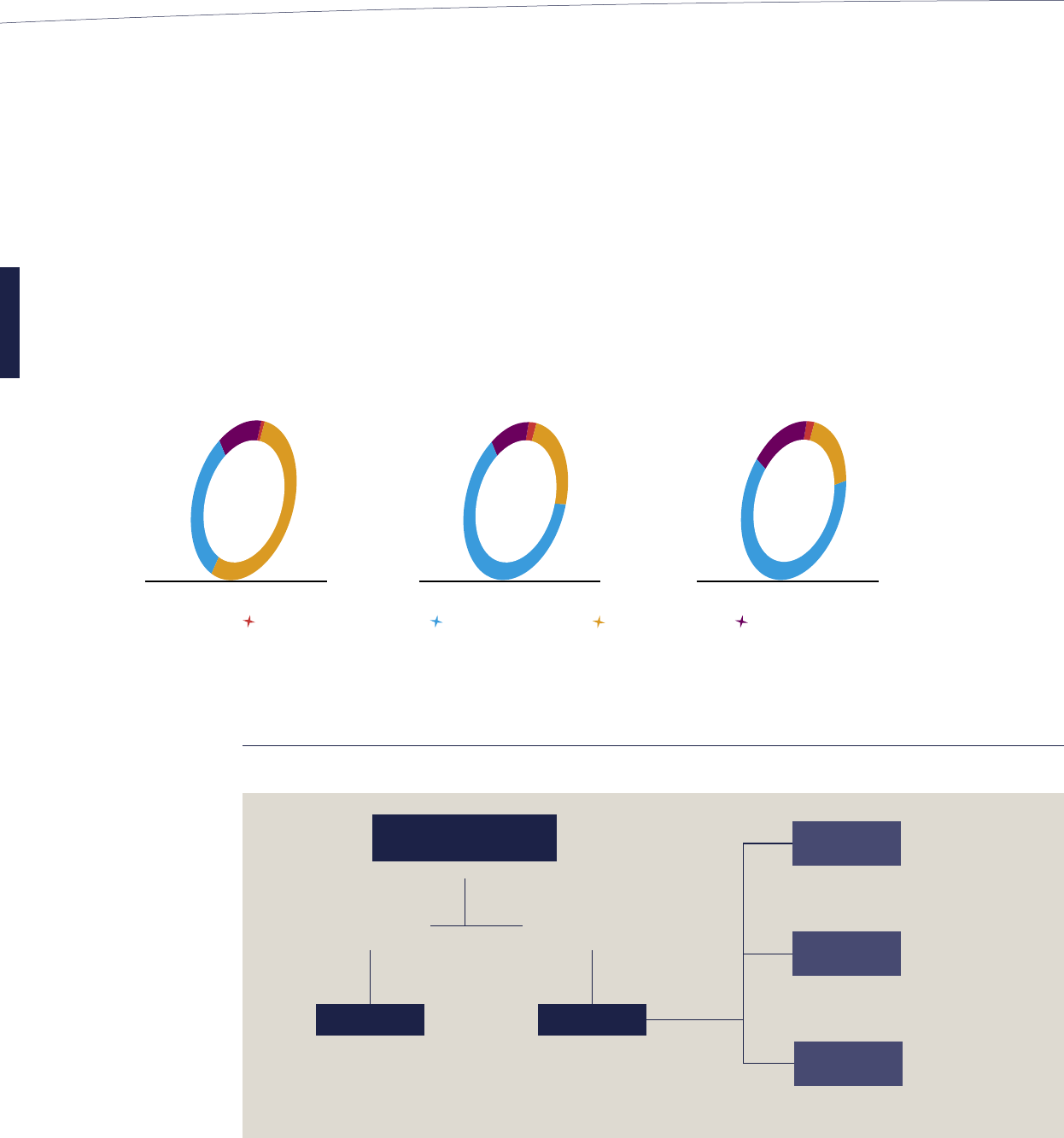
20
Stock market
Change in capital
Treasury stock
French State
Float Employees
32.1%
12.8%
54.0%
1.1%
At 31 March 2004
62.7%
11.7%
23.2%
2.4%
At 31 March 2005
62.7%
16.3%
18.6%
2.4%
At 11 April 2005
The capital of Air France-KLM is represented by 269,383,518
shares with a par value of 8.50 euros.
In May 2004, the French State’s interest was reduced to
44.1% further to the new equity issue reserved for KLM’s
shareholders, who contributed their shares to the offer.
In December 2004, the French State sold 47.7 million shares on
the stock market, reducing its stake in Air France-KLM to 23.2%.
In February 2005, the French State sold 8.4 million shares to
the employees of the Air France group in the offering reserved
for employees, and 12.6 million shares in the wage for share
exchange. These shares were delivered in March and April 2005.
Group shareholding structure at March 31
st
, 2005
AIR FRANCE-KLM
Publicly-traded company
100% of the capital
and voting rights
97.3% of the economic rights
49% of the voting rights
AIR FRANCE
KLM
Dutch
Foundations
Dutch
State
Other
shareholders
34.8%
of the voting rights
14.1%
of the voting rights
2.1% of the voting rights
2.7% of the economic rights
01-MAG UK.indd 20 11/07/05 16:06:21
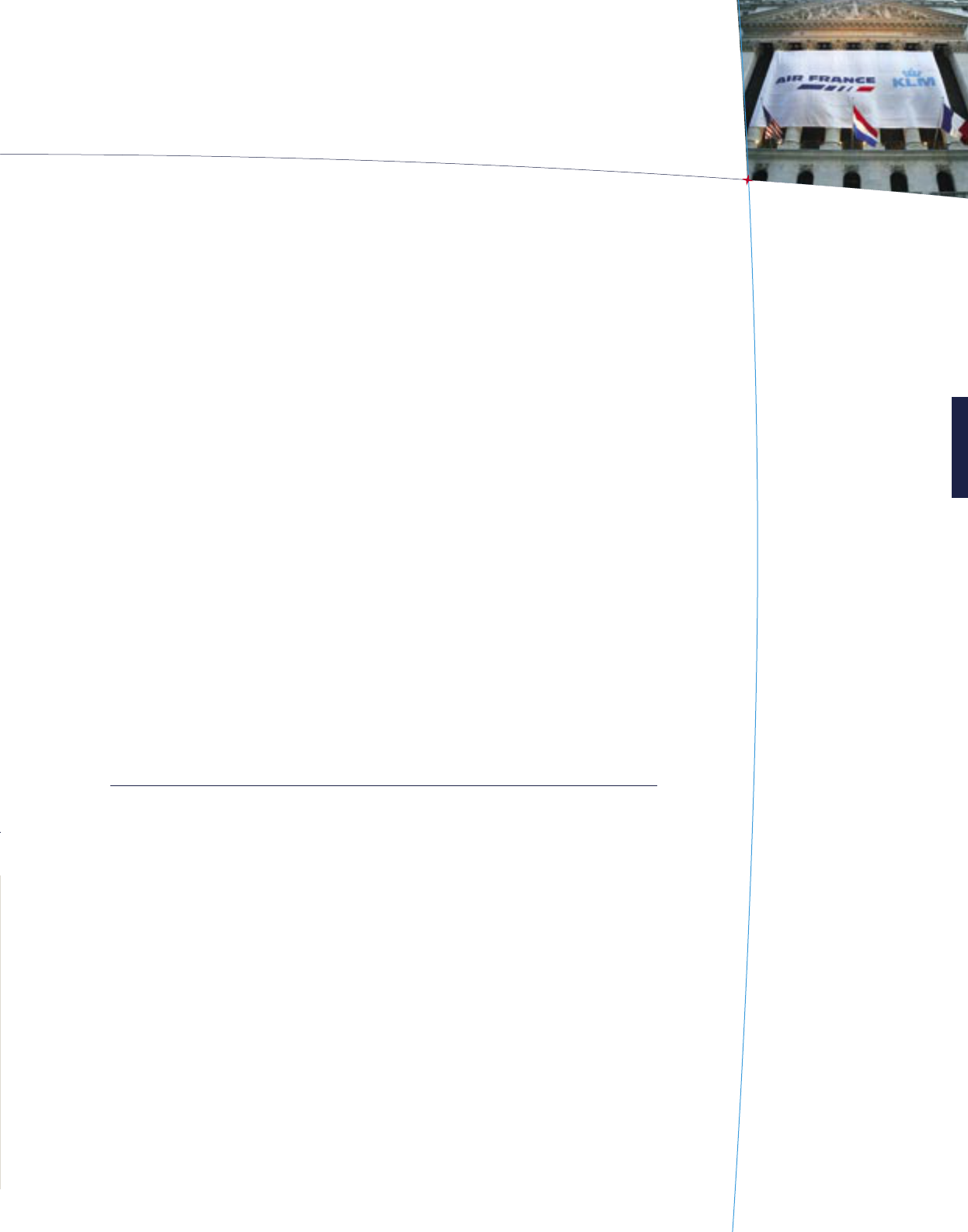
21
Capital structure
To comply with the obligations of air carriers to monitor and
track their shareholders, Air France-KLM identifies its sharehol
-
ders. This operation has been performed every quarter since
the reduction in the State’s interest in December 2004.
Identifiable bearer shares (“TPI”) were analyzed on the basis of
thresholds that allowed the identification of 94.0% of the bea
-
rer shareholders (intermediaries holding a minimum of 141,000
shares and shareholders holding a minimum of 100 shares).
By adding in registered shareholders, the owners of 97.3% of
the capital were identified.
On the basis of the identifiable bearer shares, about 69% of the
Air France-KLM group is held by French shareholders and 21%
by European shareholders. On a corrected data base, the per-
centage of European shareholders drops to 14.7% in favor of
American shareholders, who increase to 13.1% of the capital.
Ownership and declaration rules
Any individual or legal entity, acting alone or with another, who
comes to hold directly or indirectly at least 0.5% of the ca
-
pital or voting rights of Air France–KLM or a multiple of this
percentage up to 5% is required to so inform Air France-KLM
by registered letter with return receipt sent within fifteen days
after the threshold is crossed.
For the rules concerning higher thresholds, refer to the chapter
«Information on the share capital».
On the basis of the thresholds defined above, the float breaks down as follows:
Number of shares As % of capital
Individual shareholders 27,938,595
10.4%
French institutional shareholders 58,083,677
21.6%
Non-resident shareholders: 75,889,407
28.2%
Including:
Great Britain 21,424,506
8.0%
United States
(1)
18,376,622 6.8%
Netherlands 13,879,235 5.2%
Belgium 9,466,276 3.5%
Luxembourg 7,146,610 2.7%
Switzerland 2,145,145 0.8%
Germany 1,239,055 0.5%
Other 1,670,754 2.2%
(1) including 9,019,294 ADS.
01-MAG UK.indd 21 11/07/05 13:46:10
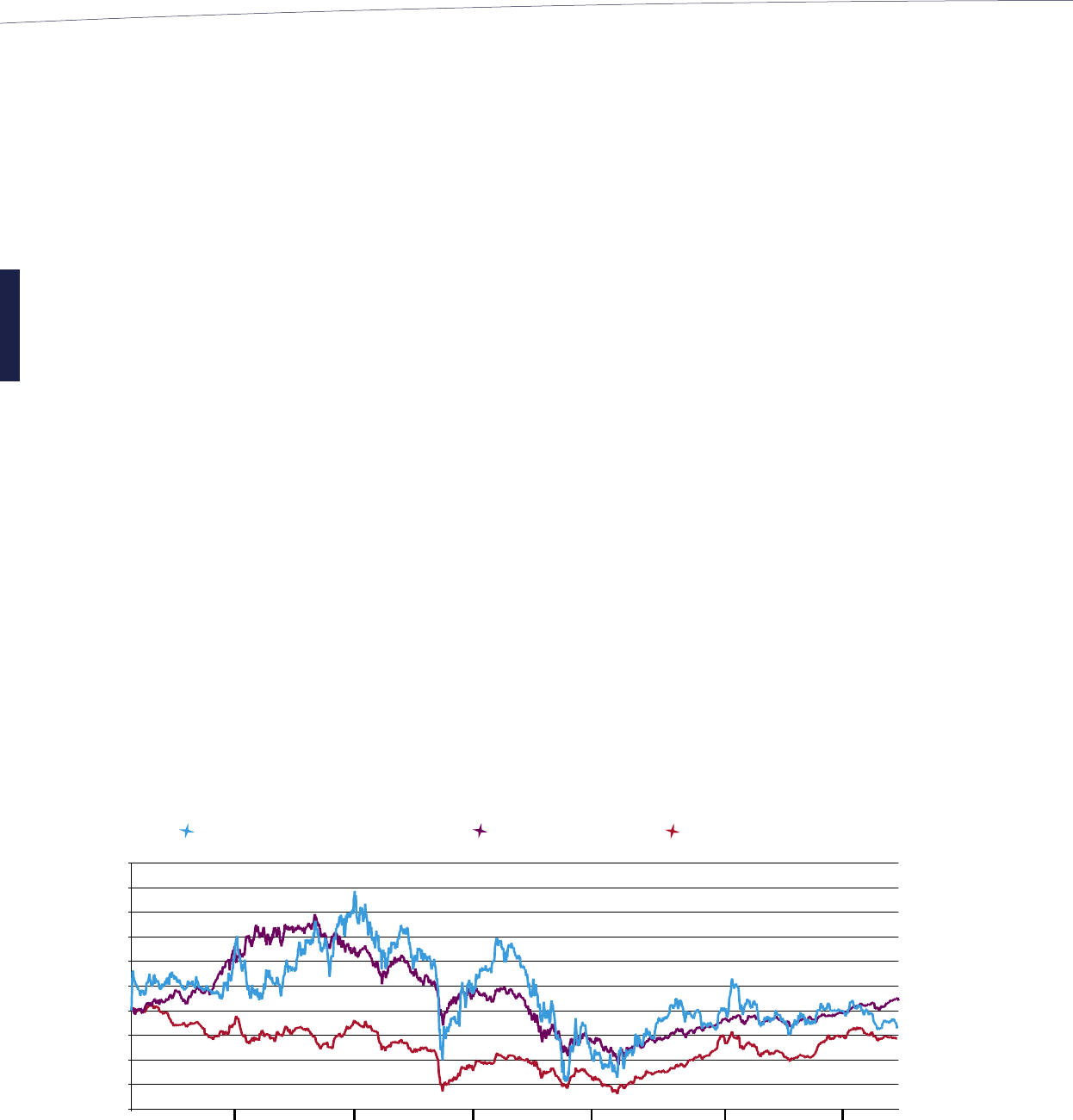
The Air France-KLM share
Air France-KLM has been listed for trading on the Premier
Marché of Euronext Paris since February 22, 1999. Since
May 5, 2004, Air France-KLM has been listed on Euronext
Amsterdam and on the New York Stock Exchange in the form
of ADRs. Because it is listed for trading in the United States,
Air France-KLM publishes Form 20-F, which is available on the
Securities and Exchange Commission website (www.sec.gov).
A reconciliation document presenting the French and
US standards is made available to shareholders on the site
of Air France-KLM (www.airfranceklm-finance.com) or on
request by calling 33 1 41 56 88 85.
Euronext Paris
• ISIN Share Code: FR0000031122
• Reuters Code: AIRF.PA
• Code Bloomberg: AF PA
Euronext Amsterdam
• ISIN Share Code: FR0000031122
• Reuters Code: AIRF.AS
New York Stock Exchange
• Symbol: AKH et AKHWS
Included in the following indices
• Indices: NextCAC20, Euronext 100, DJ Eurostoxx, AMX
• Sector Indices: FTSE Cyclical services, FTSE Transport, FTSE Airlines & Airports
• Sustainable Development Indices: DJSI Stoxx 600, ASPI Eurozone, FTSE4Good
• Other: IAS (French Employee Shareholding Index)
Air France-KLM share price
(Base 100 From February 19, 1999 to June 27, 2005)
40
55
70
85
100
115
130
145
160
175
190
1999
OP
F
2000 2001 2002 2003 2004 2005
SBF 120 (relative)
Air transport index (relative)
Air France-KLM closing
Securities Services
• In France, securities service and coupon payment is provided by Société Générale.
Société Générale: 32, rue du Champ de Tir-BP 81236, 44312 Nantes Cedex 3.
• In the Netherlands, securities service and coupon payment is provided by ABN AMRO.
ABN AMRO Corporate Finance: Gustav Mahlerlaan 10, 1082 PP Amsterdam.
• In the United States, securities service and coupon payment is provided by Citigroup.
Citigroup: 388 Greenwich Street, New York NY 10013.
22
01-MAG UK.indd 22 11/07/05 13:46:11
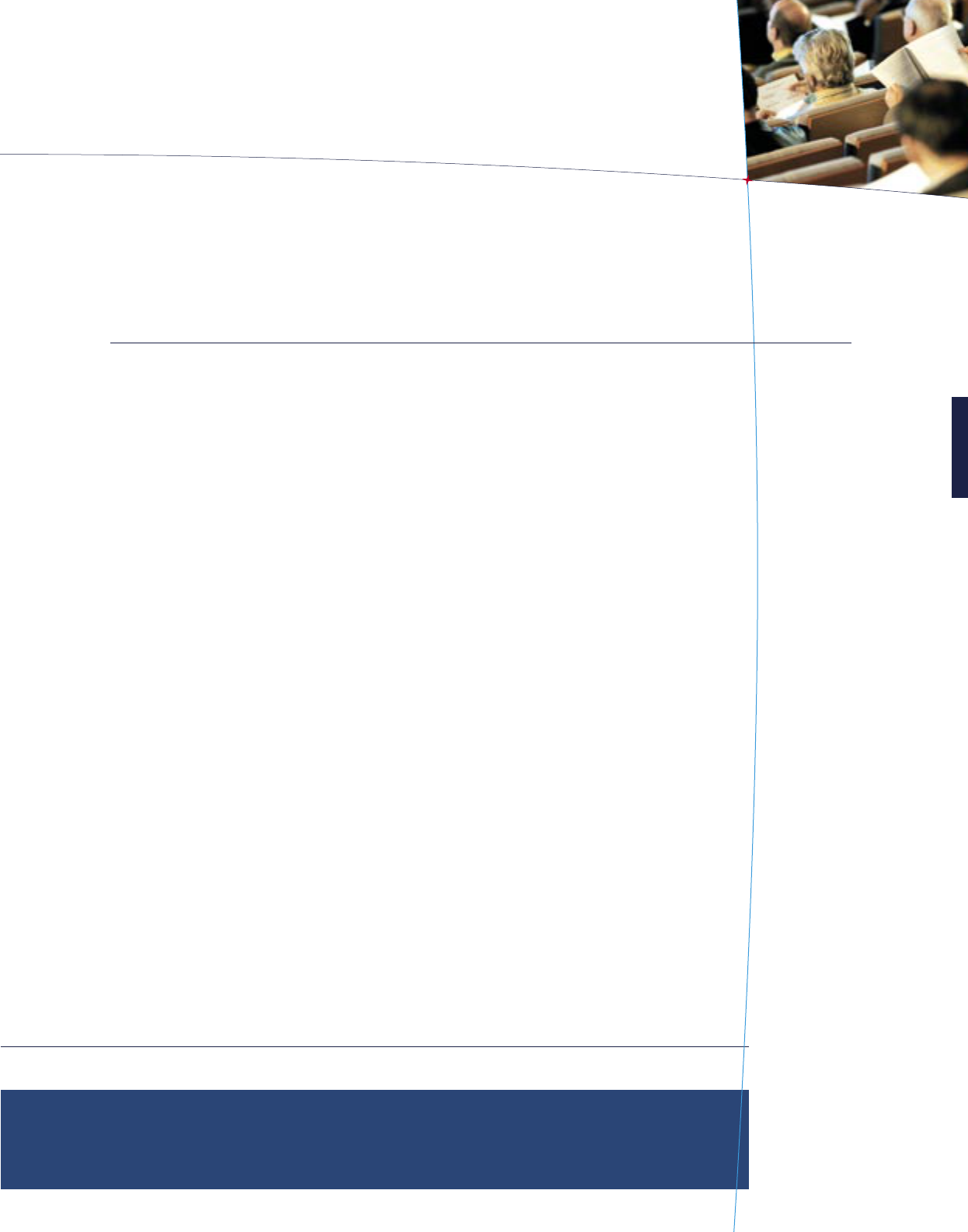
23
Trading
days
Average
Price (€)
Highest and
lowest price
(€)
Volume
Amount
(in € million
)
High Low
2003
November 20 13.37 14.17 12.14 10,866,525 143.9
December 21 12.60 13.06 12.04 8,861,787 112.6
2004
January 21 13.75 14.55 12.18 17,890,336 247.9
February 20 15.44 17.77 13.21 25,665,172 403.0
March
23 14.99 16.77 13.51 22,743,430 341.6
April 20 14.72 15.33 14.10 14,672,225 216.0
May 21 13.24 15.10 12.21 31,247,325 418.5
June 22 13.29 14.07 12.80 18,496,378 246.4
July 22 13.32 14.24 12.70 11,733,971 157.0
August 22 12.40 13.33 11.28 25,231,998 312.1
September 22 13.25 13.98 12.54 28,118,867 372.7
October 21 12.98 13.87 12.52 19,852,525 258.6
November 22 14.20 14.85 13.50 24,276,968 344.5
December 23 14.17 15.00 13.86 29,098,085 413.4
2005
January 21 13.89 14.27 13.36 28,041,883 389.0
February 20 14.52 15.14 13.98 33,033,615 481.6
March
21 14.13 14.66 13.53 28,962,252 409.0
April 21 13.17 14.02 11.98 35,195,326 464.0
Source: Euronext
Stock price and trading volumes
Equity warrants
Since May 2004, equity warrants (“BASA”) have been listed for trading on Euronext Paris and Euronext Amsterdam (ISIN BASA
Code: FR0010068965) and on the New York Stock Exchange (symbole: AKHW).
Bonds
Since April 22, 2005, bonds convertible and/or exchangeable to new or existing shares (OCEANE) of Air France-KLM have been
listed for trading on the Eurolist market of Euronext Paris. (ISIN Code: FR0010185975).
The FTSE4Good index includes more than 800 companies throughout the world, and measures their ac-
tions and initiatives in the areas of social responsibility and the environment. Inclusion in the FTSE4Good
should encourage socially responsible investment in the Group. This selection was announced at the end
of the evaluation conducted by the British organization EIRIS (Ethical Investment Research Service).
Air France-KLM included in the FTSE4Good index
01-MAG UK.indd 23 11/07/05 13:46:14
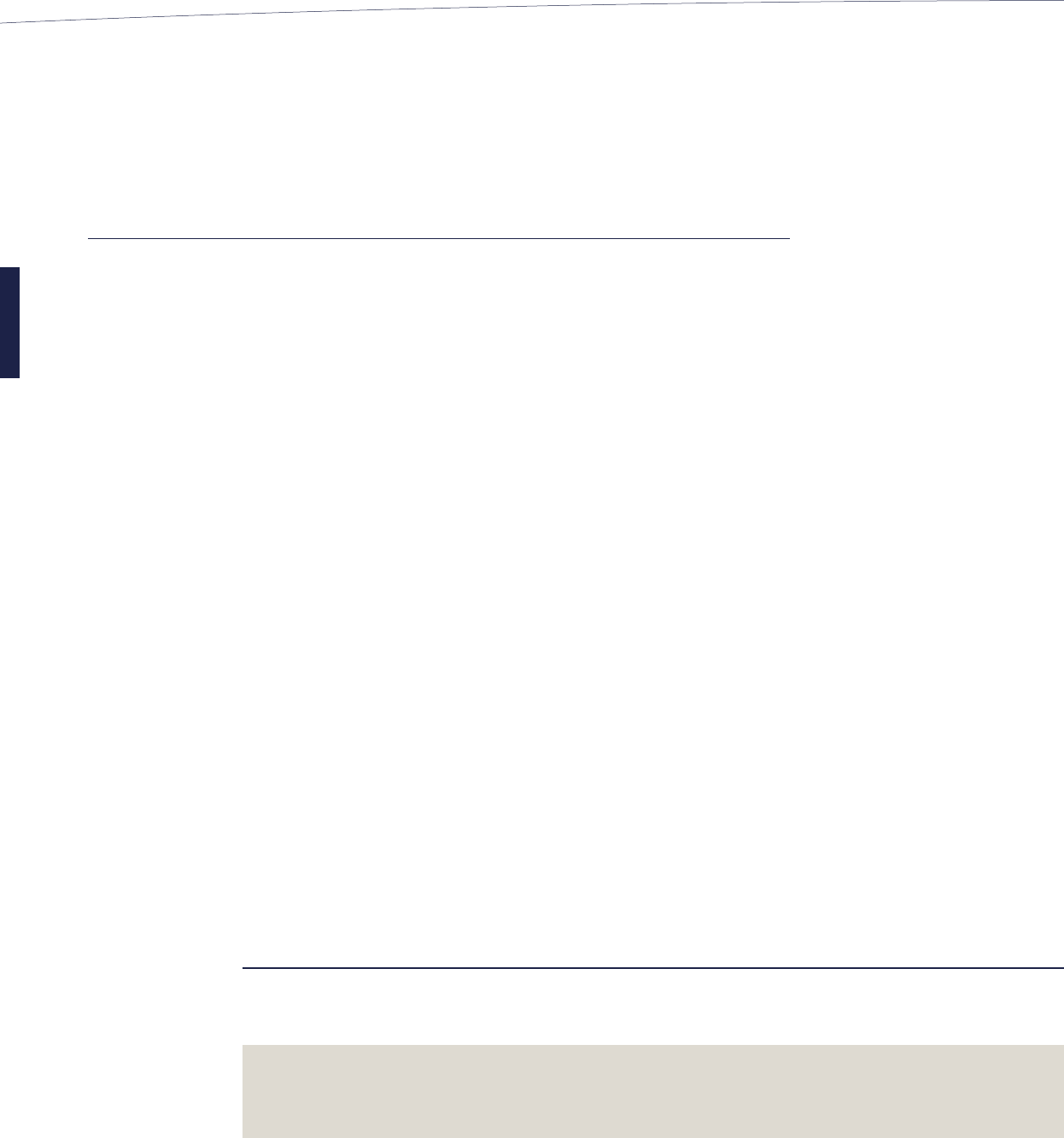
Fiscal year Earnings per share
(1)
(in euros)
Dividend
(in euro cents)
Amount after
tax credit
(in euro cents)
2001-02 0.70 10 15
2002-03 0.55 6 9
2003-04 0.43 5 7.5
2004-05 1.36 15 No tax credit
(1) by the average number of shares over the period.
Dividends paid
In accordance with the provisions of the 2004 French Finance
Law, which ended the system for avoir fiscal tax credits and
the précompte deduction of tax at source, the dividend paid
out for fiscal 2004-05 will not be associated with such a tax
credit. However, for individuals who are subject to income tax
in France, 50% of their amount will be incorporated into the
income tax base, entitling beneficiaries to a tax credit for all
dividends received of up to 115 euros for single, divorced or
widowed taxpayers and 203 euros for couples taxed jointly.
Furthermore, the amount distributed will be subject to an
exceptional deduction of 25% as an exceptional payment to the
French Treasury, which will be charged against or reimbursed
to corporate income tax at a rate of one-third per annum over
the next three years.
Air France won the second prize for employee shareholding in the SBF120 class. This prize, awarded by
the Federation of Employee Shareholders, Synerfil and the daily paper La Tribune, primarily recognizes
the quality of the savings plan, the information provided to employees, and the participation of employee
shareholders in the operations of the company.
Air France recognized for the development
of employee shareholding
24
01-MAG UK.indd 24 11/07/05 13:46:14
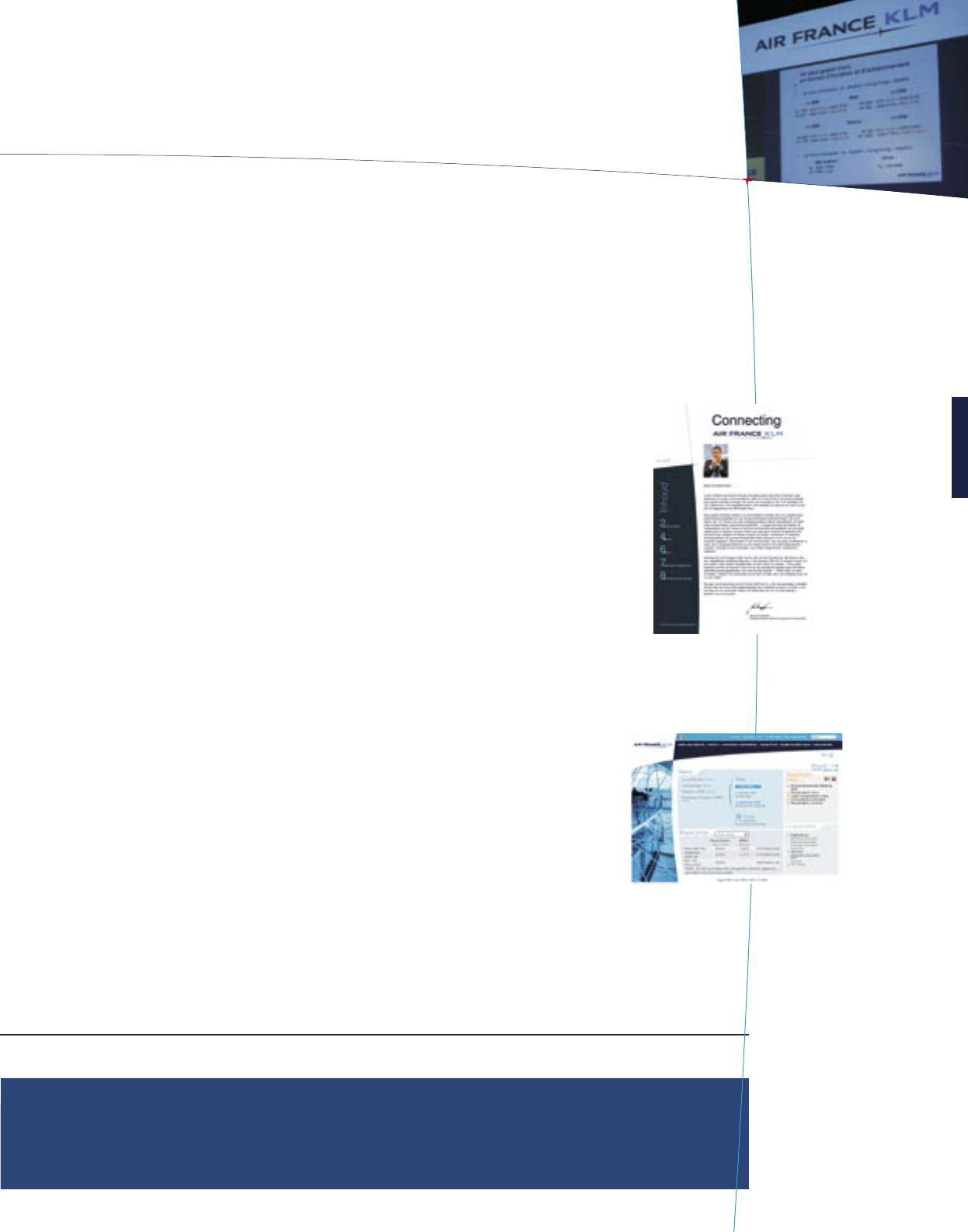
Tentative schedule for Air France-KLM publications for fiscal 2005-06
• Traffic figures: Around the fifth business day of every month
• First quarter results: September 2, 2005
• First half results: November 23, 2005
Shareholders’ Calendar
25
Being a shareholder
Air France-KLM is developing transparent, regular
and interactive information for its shareholders
Air France-KLM publishes monthly traffic figures for its passenger and
cargo activities and quarterly results, which are presented to the press
and financial analysts in a conference call or a meeting in Paris or London.
To present its financial results and the elements of its strategy directly, the
Group’s management regularly travels to meet with institutional investors
at roadshows in Europe, the United States, and Asia.
These quarterly results include financial notices published in the financial
and general press in France and the Netherlands. An eight-page letter to
individual shareholders written in French, English and Dutch is available
on the website. It is sent by mail or e-mail to the members of the
Shareholders’ Club.
In addition, for our employee shareholders, we provide educational
information that places the financial challenges and the group’s strategy
within its macro-economic environment. We offer these shareholders an
introduction to the way the stock market works, forums on themes related
to employee shareholding, a quarterly newsletter, a toll-free number, and
a website.
Air France-KLM has launched a new financial website:
www.airfranceklm-finance.com
Designed primarily for investors, analysts and shareholders, the site
offers the Group’s latest press releases (earnings, traffic, etc.), the
shareholders’ letter, the annual report and all the financial documents
published by Air France-KLM. www.airfranceklm-finance.com is
available in French, English and Dutch.
Regular information
01-MAG UK.indd 25 11/07/05 13:46:18
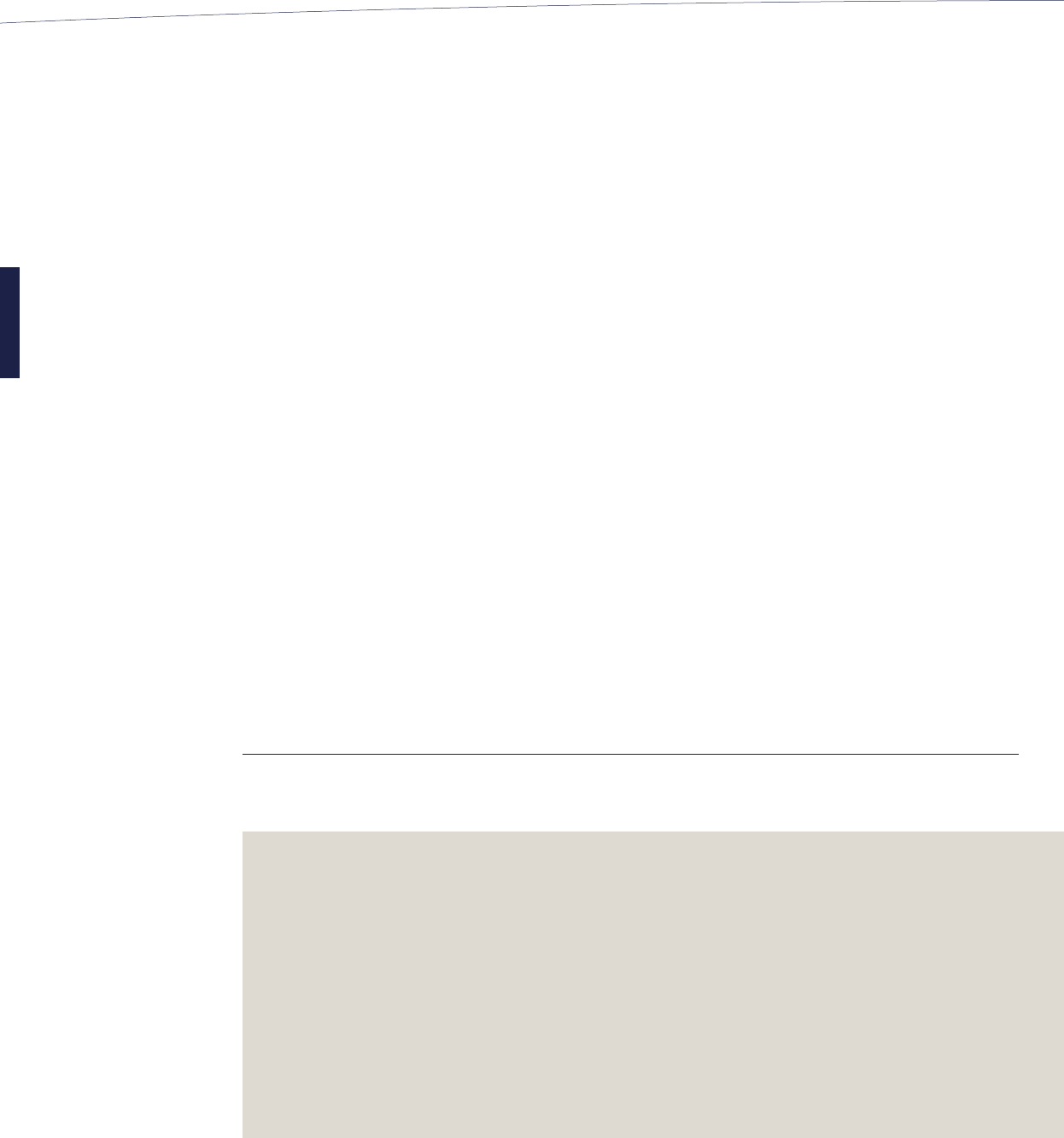
26
Information meetings for individual shareholders are held
regularly. During fiscal 2005-06, meetings will be organized
in Lille, Versailles, Nice, Nantes and Paris. Members of the
Shareholders’ Club who live in the regions visited will be invited
directly by letter.
Shareholders can obtain any additional information by calling
a toll-free number 0800 320 310 or 33 1 41 56 88 85 from
abroad.
Meetings with shareholders
Air France-KLM has created a Club for shareholders who hold at
least 50 shares of Air France-KLM. It has about 8,800 individual
shareholder members who receive Connecting, the quarterly
letter for shareholders, as well as the documents for the
Shareholders’ Meeting, whatever the method of shareholding.
As members of the Club, shareholders can participate in various
site visits. Offers from the Air France Museum are also regularly
available at preferential prices.
During the next fiscal year, the Club will adapt its communication
tools for individual Dutch shareholders who have joined the
Air France-KLM group.
Shareholders’ Club
In February 2005, Air France-KLM conducted a survey with members of its Club to find out
their reasons for becoming shareholders in the Group and their expectations for financial
information.
Over 800 people completed this survey and 96% of the respondents confirmed that they
have a positive image of Air France-KLM. More than 84% of the shareholders surveyed
indicated that they have held their shares since the initial public offering in 1999, and 36%
have purchased more Air France-KLM shares since then.
To learn about the Group, shareholders may consult the print press, the quarterly letter
Connecting and the annual report.
The top reason these shareholders invest in the Group is the image of the company, followed
by the prospects for growth, the value of the share, an interest in the air transport sector,
investment in a French company, and being an Air France-KLM customer
Shareholder survey - 96% have a positive image
of Air France-KLM
To adapt its financial communication to individual
shareholders’ expectations, Air France-KLM has established
an advisory committee representing individual shareholders
(“CCRAI”).
This committee, with 15 French members, meets an average of
four times a year and works on different projects, including the
website, the Shareholders’ Meeting, and the various financial
publications of Air France-KLM (annual report, letter to the
shareholders, etc.) The advisory committee has a page and a
mailbox on the website.
The CCRAI of Air France-KLM was restructured for fiscal 2004-05.
It will be opened to new Dutch representatives during the next
fiscal year.
Individual shareholders advisory committee
01-MAG UK.indd 26 11/07/05 13:46:18
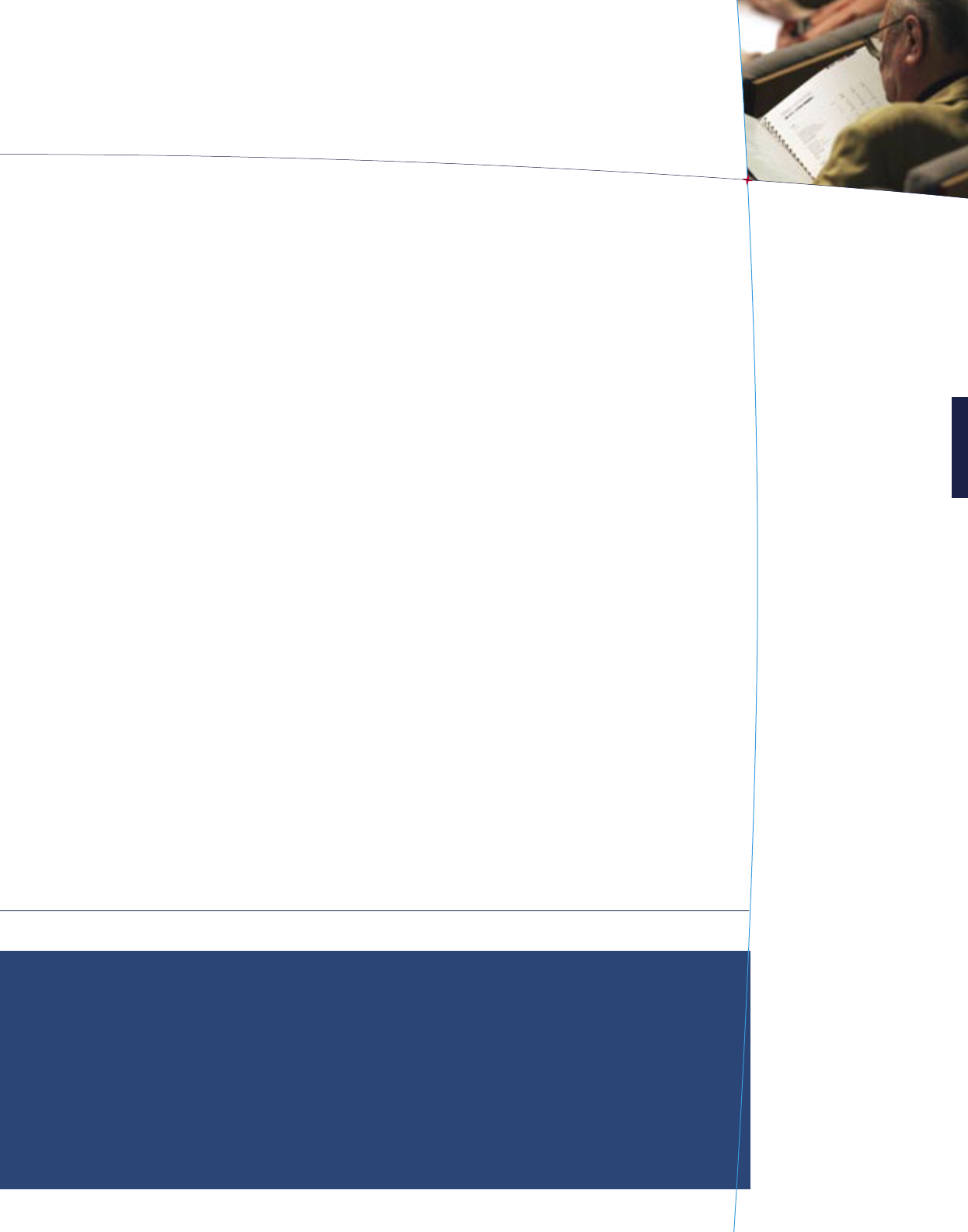
Contact us
27
Every Air France-KLM shareholder, whatever the number of
shares, can participate and vote in the Shareholders’ Meeting.
Each share is entitled to one vote.
Registered shareholders receive all the information to
participate, vote or be represented at the Meeting, directly from
Société Générale, the agent of Air France-KLM.
Members of the Shareholders’ Club receive the documents
sent to registered shareholders, with the exception of the vote
card. These documents as well as the vote card are available
and can be downloaded on www.airfranceklm-finance.com
Bearer shareholders must contact their account manager to
ensure their shares are not transferable for the five days before
the date of the Meeting. They then receive their admission
cards or on request a form to vote or to give proxy by mail.
Admission cards for the Meeting are sent to any shareholder
on request directly, or via his or her account manager, no later
than six days before the date of the meeting by registered mail
with return receipt from the Société Générale.
Shareholders who cannot attend the Shareholders’ Meeting can:
- give their proxy to the Chairman; they just have to send in the
form to vote by mail or by proxy;
- be represented by their spouse or another shareholder;
- vote by mail. Forms to vote by mail can be obtained from
Société Générale. These forms will be counted only if they
reach Société Générale at least three days before the
Meeting.
Contact: Société Générale
Département Titres et Bourse
32, rue du Champ-de-Tir – BP 81236
44312 Nantes Cedex 3
Participate in the Shareholders’ Meeting
by telephone
From France, call 0800 320 310 (toll-free number) – Monday through Friday, from 10:30 a.m. to 12:30 p.m.
and from 2:30 to 5:30 p.m.
From abroad or the French Overseas Territories and Departments, call +33 1 41 56 88 85.
by mail
Air France-KLM
Shareholder Relations
DB-AC
45, rue de Paris
95 747 ROISSY - CDG Cedex
on the Internet
A suggestion form is available on the website www.airfranceklm-finance.com, under Contacts.
For shareholders who want to record their shares as registered
shares, Air France-KLM has appointed Société Générale.
By opting for this form of shareholding, shareholders are not
charged for custodial and management fees.
Société Générale offers registered shareholders of
Air France-KLM interactive services so that they can view
their assets, be informed of transactions made on their
securities account, and place market orders. These services
are accessible by phone, via the Nomilia voice server at
+33 825 820 000 or on the Internet.
Registered shareholders
Entrées de Chapitres UK.indd 9 11/07/05 13:47:59

A
ctivity
report
30
Strategy
36
Market and competitive environment
40
Passenger activity
45
Cargo activity
48
Maintenance activity
50
Other activities
52
SkyTeam
56
Air France-KLM group fl eet
Entrées de Chapitres UK.indd 6 11/07/05 15:40:55
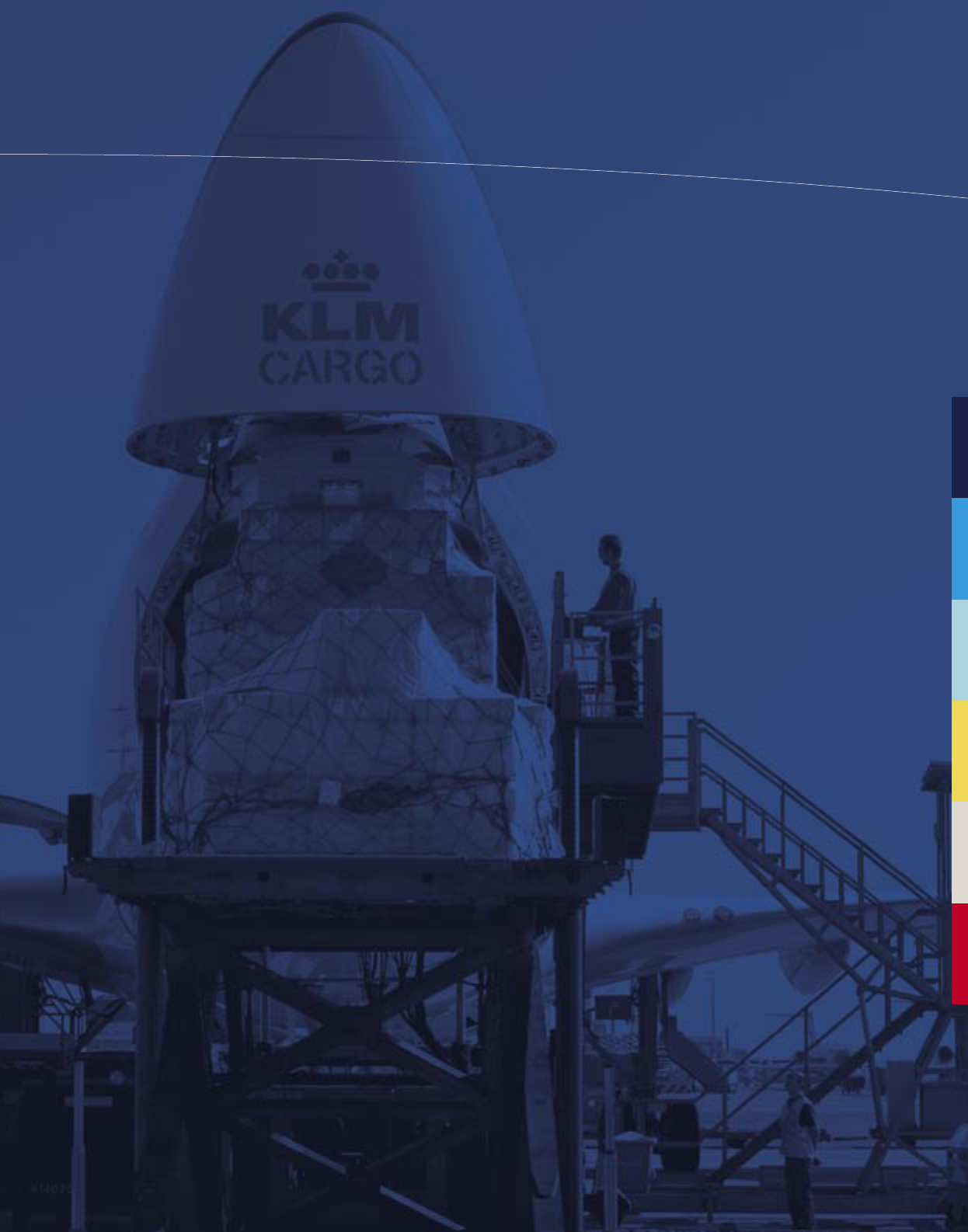
104
Financial report
202
Additional
information
82
Risks and risk
management
62
Environmental and
employment data
Entrées de Chapitres UK.indd 7 11/07/05 15:40:58

Your group is the European leader in air transport. Can
you talk to us about the sector, which seems to have
been beset by many crises?
Jean-Cyril Spinetta
Before answering your question, I would like to emphasize
the important role played by the air transport sector within
our economy. Air transport exists because it fulfills both an
economic and a social demand.
Air transport is a necessity for business, and it serves
the economy. In France, more than one out of every two
passengers travels for business reasons, thereby developing
solid international ties with different markets. According to
a recent report, the air passenger market has grown at an
average rate of 5% over the last ten years, while cargo has
risen by 6 to 7%. This dynamic growth contributes to GDP
growth and job creation: in France, 400,000 jobs are related
directly and indirectly to the air transport sector.
Air transport also meets the social requirement for mobility,
while contributing to opening up and developing the country.
Regrettably, these social and economic benefits are not always
emphasized in the debates about the development of air
transport; too often, it is the negative aspects which receive
the most attention.
Air transport also actively contributes to the international
profile of France. Although it represents only one percent of
the world’s population and 4% of global GDP, France accounts
for 100 million passengers annually or 6% of the World total. It
is also worth remembering that tourism is the World’s largest
industry, and that France is its leader. Foreign tourists visiting
France, who are highly dependent on the airline industry, spent
on average 85 million euros a day in 2003.
Leo van Wijk
Air transport also plays an important role in the Dutch economy.
The position of the Netherlands in air transport is much more
significant than one might expect of a nation of 16 million
people. The Dutch Ministry of Transport recently identified over
120,000 direct and indirect jobs generated by Schiphol Airport.
In addition, the easy air accessibility of the Netherlands has
greatly contributed to the competitiveness of our economy
over the last few decades, facilitating the establishment on our
soil of leading companies in many sectors. For our country, air
transport is a source of national pride, and KLM contributes to
that pride.
What are the cornerstones of your strategy?
Jean-Cyril Spinetta
The strength of the Air France–KLM group is that it is founded
on two of Europe’s largest hubs – Paris and Amsterdam – which
both have strong growth potential.
Moreover, taking Europe and its requirements in terms of
relations with the World’s other major economic regions in the
future, it becomes apparent that there is still enormous scope
for development, particularly in connecting traffic.
Paris and Amsterdam are two of the three or four European
airports best positioned to take advantage of strong demand
in decades to come. That is why our strategy is firmly based
around the development of these two hubs, which each have
the possibility of further expansion while competing platforms
are nearing saturation.
Strategy
Interview with Jean-Cyril Spinetta and Leo van Wijk
30
Entrées de Chapitres UK.indd 8 11/07/05 13:47:57
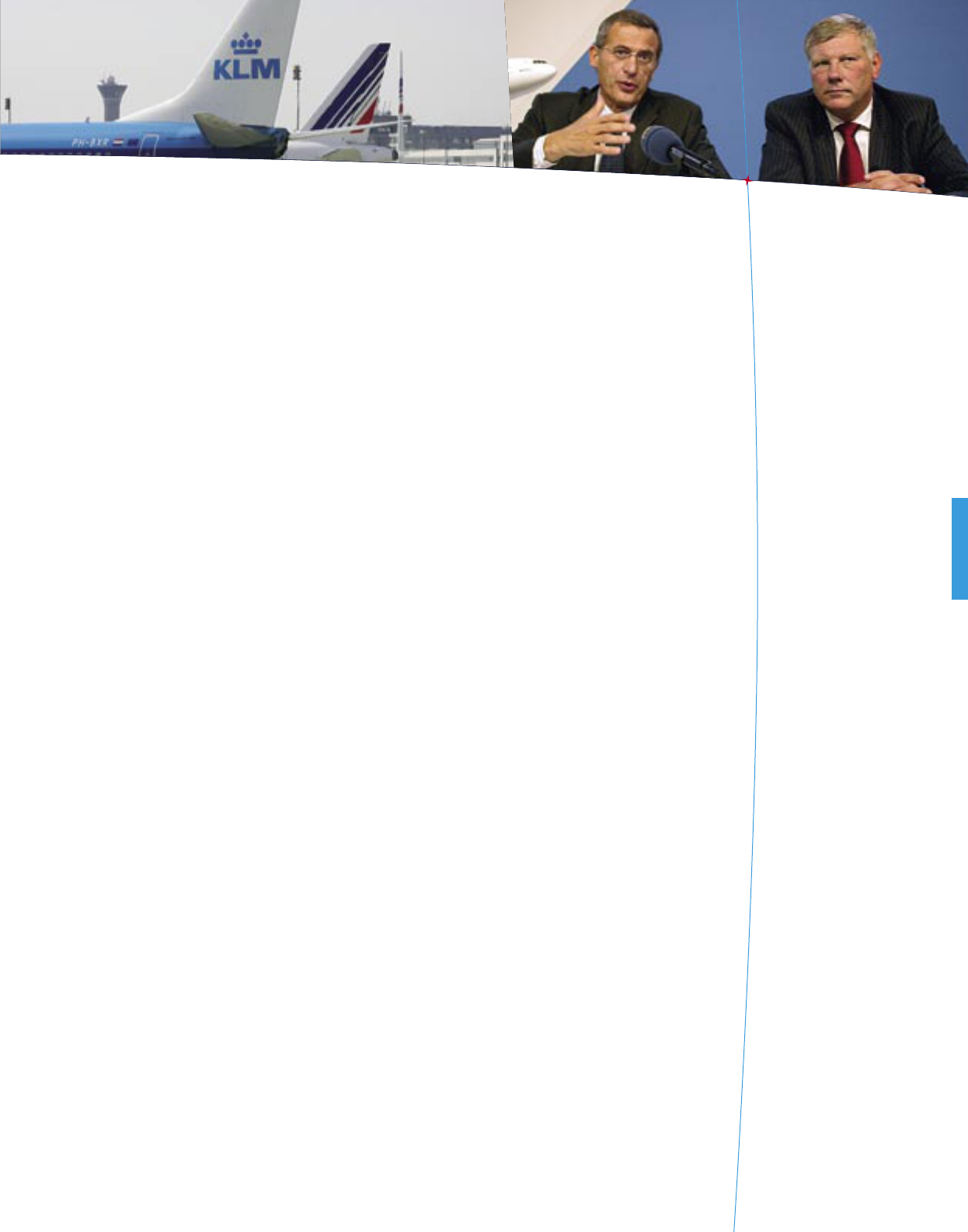
31
Leo van Wijk
In addition, our hub system will help us to take advantage of
the opportunities created by the expansion of the European
Union to the East. Most of the countries that have joined the EU
are relatively small, and have already indicated that they will not
be developing major airport infrastructures. As a result, they will
have to rely on existing hubs such as Paris or Amsterdam.
Moreover, European countries having, historically, restricted
access to their markets, have created the conditions for the
strong development of point-to-point traffic. Today, the Group
is well positioned to combine point-to-point and connecting
traffic.
Is this multi-hub system, which connects the platforms
of Roissy – Charles-de-Gaulle and Schiphol 15 times a
day, profitable?
Jean-Cyril Spinetta
Yes! Not only does the multi-hub system enhance our control
over the costs at each company by streamlining our networks
- which we could not have done without each other - but it
also generates excellent revenues, thereby improving our
profitability.
Some people make the distinction between point-to-point
traffic, which supposedly generates higher revenues, and
connecting traffic, which is regarded as having lower revenue
levels. However, the figures show this is not the case. Last year,
we carried 9% more passengers, even though our offer rose
by only 7%. Our load factor, at 79%, was higher than that of
any of our main competitors. This benefited our unit revenues,
which were up 1.6%. So, as you can see, our multi-hub system
is definitely profitable.
Leo van Wijk
Connecting traffic also has a bright future. In 2004, on the
Europe-North America routes, 56% of passengers were
connecting passengers. This figure was as high as 63% for
Europe-Asia connections. Moreover, according to various
studies, by 2013 the industry is expected to carry approximately
215 million passengers on intercontinental flights, including 115
million connecting passengers. This data justifies and supports
our strategy.
Moreover any increase in point-to-point traffic tends to have
a greater impact on the smaller hubs. Having two of Europe’s
largest hubs within our Group is, therefore, a clear advantage.
We must build on our assets: the two hubs must remain
attractive on the strength of the multiple destinations and the
frequency of the flights they offer. Developing one of the hubs to
the detriment of the other would create imbalances that would
heavily penalize the entire group. One of the main challenges
for our alliance involves balancing growth between KLM and
Air France.
Air France-KLM seems to have ambitious capacity growth
targets of around 5% per annum. Isn’t this risky when
there is a great deal of talk about excess capacity?
Leo van Wijk
I think it is important to emphasize that the Group has
responded to market demand. For the year just ended, the rise
in traffic exceeded that of our offer. Moreover, our load factor
is the highest in Europe. This is reinforced by the statistics
from the AEA showing that traffic has increased faster than the
offer. Currently, we are not witnessing any excess capacity in
Europe.
01-MAG UK.indd 31 11/07/05 13:46:23

Jean-Cyril Spinetta
Given the outlook for World growth, we expect to grow our
offer by 5% per annum in the next few years, slightly below
projected demand. More specifically, we intend to focus on
expanding long-haul traffic, mainly to high growth markets like
Asia and Latin America.
At the same time, we will maintain our flexibility in order to be
able to confront the risks inherent in our sector. The flexibility of
our offer is the result of our balanced network, which provides a
natural hedge against geopolitical and economic risks. Neither
Air France or KLM have ever developed «niche» networks,
and as a result we are not dependent on any single zone. This
balance is a safety factor in our strategy of profitable growth.
Is Air France-KLM synonymous with benefits for your
customers?
Jean-Cyril Spinetta
Of course there are many advantages to being an
Air France-KLM customer. First, the co-ordination of our hubs
at Roissy – Charles-de-Gaulle and Schiphol has enhanced our
network by increasing the range of destinations and connecting
flights. Our passengers now benefit from an expanded schedule
to over 234 destinations, one of the largest networks in the
world. The multi-hub system has therefore made us stronger in
a number of markets.
Second, we have been innovative by allowing passengers to
combine fares. Passengers can select which of the two airlines
offers the best schedule, and swap airline for the outbound
and inbound flights, while maintaining the benefits of a round-
trip fare. So, the competitiveness of our offer has increased,
and our passengers seem to appreciate the flexibility. It is no
longer up to the customer to fit around the airline’s schedule,
but up to the airline to adapt its schedules to the customer’s
requirements!
Leo van Wijk
We have just launched Flying Blue, our joint customer loyalty
program which offers significantly enhanced benefits compared
with the old Fréquence Plus and Flying Dutchman programs.
Now, ten million passengers are able to enjoy the tangible
benefits our alliance. We are also developing our e-services in
order to facilitate booking and check-in with both Air France
and KLM.
You generated 115 million euros in synergies last year,
surpassing your initial target. You have forecast
280 million euros for 2005-06 and more than double
that figure – 580 million euros – by 2008-09. How do you
explain the speed with which you have implemented
these synergies?
Leo van Wijk
With regard to synergies, we have only just started. The
synergies between Air France and KLM will continue to be a
major source of cost-savings in the coming years.
Until now, most of the synergies have been in revenues, although
some cost synergies have been generated. We have mainly
focused on optimizing our respective networks, selecting to
concentrate our flights to certain destinations on the one of our
two hubs which made the most economic sense. Take Caracas
for instance: the final destination for traffic out of Amsterdam
was primarily Southern Europe. Therefore, Paris was the more
logical hub, particularly since this wasn’t a profitable flight for
us. On the other hand, the final destination of most passengers
from Manila was Northern Europe, making Amsterdam the best
solution. This issue also arose when we opened the route to
the new Japanese airport at Nagoya. Should we both fly there
separately, running the risk of excess capacity? In the event,
we decided to offer this destination from Paris only.
32
01-MAG UK.indd 32 11/07/05 13:46:24

33
Gradually, there will be a rebalancing towards cost synergies
and, in five years’ time, the breakdown should be some 60%
for revenue synergies and 40% for cost synergies.
In the course of working together, we have also discovered
new sources of potential synergies that will be implemented
over the coming years.
Jean-Cyril Spinetta
If synergies are being realized faster than projected, this is
because the work of both teams is being undertaken with the full
co-operation of all involved and without hesitation on either side.
We are delighted by this. One of the factors often underestimated
in merger situations is the importance of employee support for
the process. Many mergers have failed because insufficient
attention was paid to employee motivation during the integration
process. In a service industry such as ours, this could have
a particularly devastating effect, and we could easily destroy
many of our opportunities.
In this context, it was crucial to us that our teams work together.
Joint counters were installed, notably in our two hubs at Schiphol
and Roissy – Charles-de-Gaulle; projects are underway in cargo,
maintenance and information systems. Flying Blue, our combined
customer loyalty program is a great example.
We are supporting this co-operation, going beyond cultural
differences. Not only are we not in a hurry to make them disappear,
we positively want to turn them to our advantage. We are learning
from each other and as a result, becoming stronger, more
competitive and more efficient. An exchange for some dozen young
French and Dutch managers from both Air France and KLM took
place from April to June. I found their enthusiasm impressive.
What gives us the most confidence in our decision to merge
our two companies is that, over time our approach has become
increasingly recognized by our employees as being “the right
thing to do”.
In September, KLM and its American partners Northwest
Airlines and Continental joined the SkyTeam alliance.
What role do you see this alliance playing in your
strategy?
Jean-Cyril Spinetta
Alliances are playing an important role in a process of
consolidation in the sector that appears inevitable and
necessary. I believe that the future of the alliance system,
particularly between European and American companies,
will undoubtedly see stronger ties among the various
players. The example of Northwest Airlines and KLM is a
case in point: in Europe, it is clear that the Air France-KLM
model offers an effective response to the complex issues
facing the industry. One of our competitors has already
been inspired by it!
Leo van Wijk
Today, SkyTeam is the world’s second-largest alliance in terms
of passengers, and the number one in cargo following the
inclusion of KLM and its American partners. We are also the
leading alliance on the North Atlantic route, which offers some
interesting prospects.
We are getting ready to welcome Aeroflot and China Southern,
which have signed letters of intent and are expected to
join the alliance by the end of 2005. This will significantly
enhance our presence in the Russian and Chinese markets,
enabling the implementation of code-sharing on domestic
and regional lines.
Within SkyTeam, we have also created the status of associate
member for companies that were previously linked to
Air France and KLM.
01-MAG UK.indd 33 11/07/05 13:46:26

Controlling costs has been a priority at Air France and
KLM for several years now. How do you intend to reduce
your costs in a context of rising fuel and tax charges?
Jean-Cyril Spinetta
There are ambitious programs at both Air France and KLM
aimed at permanently reducing costs to enable us to withstand
the brutal rises in fuel, tax and royalty charges.
For fuel, we have developed an effective hedging policy.
As far as taxes and royalties are concerned, we must make
those who set these charges understand that increasing them
further will be extremely damaging for the European operators.
These taxes seem to be rising inordinately at a time when the
airline industry as a whole is going through a period of economic
turbulence.
Nevertheless, I remain optimistic, even if there is still a long way
to go. Take the air navigation royalties that we pay in respect
of Air France, which fell in 2004 and will continue to be reduced
in 2005. This illustrates a growing awareness of the need to
reduce many of these taxes.
Leo van Wijk
It is wrong to believe that there are no alternatives than to travel
through Paris, Amsterdam, London or Frankfurt. If European
airports continue to ignore the issue of airport transit costs, we
could see airlines make a shift towards less expensive airports,
even outside Europe.
Another issue is security-related costs. We pay them of course,
but at the same time we are vigilant to ensure that the measures
taken are effective and realistic. If we believe they do not meet
these two criteria, we will seek to remedy them, in co-operation
with other air carriers within the AEA or IATA.
Jean-Cyril Spinetta
But at the end of the day, these issues must not distract us from
our prime objective which is to improve our competitiveness
and to reduce those costs over which we have direct control.
If we are unable to offer our customers fares of a level they are
prepared to pay, we will be literally swept away. Therefore, the
main priority is to reduce costs and to improve competitiveness.
We are in a genuine race to avoid being overtaken by other
companies.
Against this backdrop of synergies and cost-reduction,
would you consider modifying your current organization
based on one group, two air carriers, three businesses?
Leo van Wijk
We will undertake organizational changes only if there is a
genuine need. We will not integrate activities just for the sake
of it, particularly since integration can generate heavy costs
and create major risks.
34
01-MAG UK.indd 34 11/07/05 13:46:26

35
Our strategy is to move forward one step at a time. We know
already that certain businesses can generate further synergies
without full integration. Maintenance is a clear example:
specializing the teams in Paris or Amsterdam on a certain type
of engine creates a number of synergies, without the need to
integrate them within a single entity. In the passenger business,
customers are highly attached to the brand image of each of our
companies, and it would be perilous to think about integrating
the two companies.
On the other hand, in cargo, which operates on the basis of
«business to business» relationships, brand is less important.
This is why we launched the European Cargo House, which
combines the commercial offerings of Air France and KLM
under a single management.
So to sum up, we don’t believe that we will suddenly create
more synergies by changing our organization.
Jean-Cyril Spinetta
In the organization that we have built, the ongoing cross-
fertilization between methods, practices, and results is highly
motivating for the teams of Air France and KLM. The risk for
a company is to become blinkered by its certainties. Being
exposed to other ways of operating should lead everyone to
rethink his or her own way of working as part of a continuous
process of improvement. I believe the two teams are learning
a great deal from each other.
Before the merger, what were your hopes and expectations
for the future group? Have they been realized?
Jean-Cyril Spinetta
We have just completed the first successful year of the
merger. We have exceeded expectations in an environment of
increasingly shared objectives.
Our priority was to create confidence in this project both within
the companies and on the part of our customers, shareholders
and all our partners. I believe that we are succeeding in this
goal, and that we are beginning to convince them that our
approach is the right one.
Leo van Wijk
There were many skeptics who doubted that two national air
carriers, with different cultures, could work together. Our model
is based on clear rules and mutual respect. Our first results as
a combined group will reinforce our shared pride at Air France
and KLM in being the Worldwide leader.
How do you see the group in five years?
Jean-Cyril Spinetta
We are currently the market leader, and our goal is to be in this
position in five years’ time. This is not just a question of size.
We will need to demonstrate our ability to improve our results
on a regular basis. Our merger must enable us to build the solid
foundations which will help us to face up to the unforeseen
events which frequently affect our industry.
By building on respect, trust and commitment, we have opened a
new window to the future.
01-MAG UK.indd 35 11/07/05 13:46:28

Market and competitive environment
The air transport sector, an essential asset for economic growth
Air transport is an essential element in global economic
development. More than 1.6 billion passengers used air carriers
worldwide, both for business and recreational travel and
this figure could exceed 2.3 billion in 2010. The air transport
sector has created 28 million jobs worldwide and could create
31 million by 2010. In Europe, every million passengers carried
sustains around 4,000 direct, indirect and induced jobs (source:
IATA – February 2003).
In France, air transport is one of the most dynamic branches
of the French economy, responding to the travel needs of
businesses and consumers. Excluding economic crises, this
sector has recorded annual growth of 5–6% for 20 years, which
is twice global growth and three times French growth. With a
penetration rate of 25%, air transport in France still has room
for growth in comparison with the United States (39%) or Great
Britain (33%) (source: BIPE November 2004).
Air transport makes a substantial contribution to foreign trade
in services, with a positive balance of 1.7 billion euros for air
transport in 2003. In addition, the sector directly employs
more than 115,000 workers with more highly-qualified jobs
for air carriers than for other transportation means. (source:
Transports November-December 2004)
Higher oil prices, the new challenge for the sector
After unprecedented crises—the attacks of September 11, 2001,
the consequences of the war in Iraq in 2002, and the SARS
epidemic in 2003—the sector has been facing an explosion in
oil prices since the spring of 2004.
While the recovery in traffic first seen in the second half of 2003
continued in 2004, with growth of about 11% (source: IATA),
the sector has had to face soaring oil prices, again generating
losses 5 billion for air transport even though the professional
association was projecting a profit of about USD 3 billion for
the same year. The bill for jet fuel reached USD 62 billion,
counteracting all the cost-cutting efforts of the companies and
the impact of the economic recovery. Including the losses for
2004 estimated by the IATA, the total losses over the period
from 2001 to 2004 are expected to reach about USD 36 billion,
the equivalent of the total value created from 1978 to 2000.
An analysis of the sector shows that this year again, the air
carriers in the three major air traffic zones are not in the same
position. The Asian companies, after a year penalized by the
SARS epidemic, have returned to strong growth.
In the United States, most airlines are in very difficult positions
and have not generated profits since 2001. Confronted with
structural problems, including significant wage increases in
2000–01 and competition from low-cost companies which have
conquered about 22% of the North American domestic market,
they must face higher oil prices without the ability to implement
hedging policies, as their financial position is too weakened:
between 2000 and 2002, the weight of the debt of the
leading American companies doubled from USD 27 to 56 billion.
Despite federal assistance of several billion dollars, and
drastic cost-cutting plans and wage concessions, the airlines
accumulated USD 7 billion in losses in 2004 and recorded new
record losses in the first quarter of 2005 (source: IATA).
In Europe, the companies that are members of the Association
of European Airlines (AEA) benefitted from the recovery in traffic
after a spring 2003 marked by the Asian health crisis. During
2004, traffic grew 9.0% with a 7.3% increase in capacity.
Slightly more than 307 million passengers (+4.8% over 2003)
traveled to and from the 49 countries included within the
European perimeter of the AEA.
36
01-MAG UK.indd 36 11/07/05 13:46:29

37
As in 2003, the rebound differed depending on the airline.
Alitalia and Swiss are still in the red and are conducting a total
restructuring or have merged with other airlines. The principal
airlines (Air France-KLM, British Airways, Lufthansa and Iberia)
continued to record positive results thanks to a moderate salary
policy and savings plans conducted since 2001. This economic
resistance has allowed them to win about 3 points in market
share in 4 years to 70% and to meet the competition from the
low-cost companies (source: AEA RB3 pro forma).
The European low-cost sector is characterized by a large
number of companies (about 35 companies in 2004), including
two that dominate the market by representing nearly 50% of the
offer in this segment, while half of these companies represent
no more than 1% of the offer.
The growth of this segment, particularly for Ryanair and
easyJet, was not achieved through a massive transfer of the
traffic from the scheduled airlines, which have maintained a
relatively stable share of the European market (including the
domestic markets), but was driven by the creation of a new
market and by winning a large percentage of the natural growth
in traffic in the segment of very price-sensitive passengers.
Air transport, one of the most competitive sectors
The air transport sector is a highly competitive sector. In
the point-to-point long-haul segment, Air France and KLM
compete with the national carriers serving these destinations.
For the long-haul transfer traffic, their competition intensifies
at the various transfer platforms which offer similar services,
even if the effectiveness of their hubs gives them a competitive
advantage.
On the European network, the scheduled airlines also face
competition from the low-cost carriers and, on some routes,
from high-speed trains (London and Brussels).
The low-cost companies are present in only the five largest
domestic markets, but very unevenly. In the winter of 2004,
30% of the low-cost flights were on domestic routes (16% in
Great Britain, 8% in Germany, and 1% in France) and 70% on
intra-European links, primarily from Great Britain to Germany,
France and Italy.
In the French domestic market, air transport faces specific
competition from the high-speed train. In 2003, the high-speed
train carried 3.5 times more passengers than the air carriers on
domestic links, with a market share of 76%, with 74.1 million
passengers, versus a market share of 19% for Air France with
18.2 million passengers, and a 5% share for the low-cost
carriers with 4.8 million passengers. This very strong presence
of the TGV in France has limited low-cost interest in the French
domestic market. Only easyJet operates to two destinations
from Paris where the train’s market shares is less than 20%
(Toulouse and Nice), after closing its Marseilles service, where
the TGV holds a 60% share, in March 2005. (source: SNCF,
Air France and others).
Air France has been able to meet this rail competition thanks to
its CDG hub, which connects the French provinces to the rest
of the world, to the “La Navette” shuttle service which, with 100
flights per day, connects Paris to the major French cities, and
to its customer loyalty program.
01-MAG UK.indd 37 11/07/05 13:46:30

In a difficult environment, the Group has made a commitment
to a profitable growth strategy based on the fundamental
assets of the two airlines, and their complementary strengths,
which generate substantial synergies. This policy is supported
by strict cost control, which is particularly necessary in a sector
where margins are low and when oil prices represent a real
economic challenge, as the fuel surcharges levied only partially
cover the additional oil bill.
The work prior to the merger valued the synergies at
385–495 million
in the fifth year of the merger. The faster
coordination of the operations and teams of the two companies
accelerated the development of these synergies and they
were revised upwards in September 2004. Initially estimated
at 65–75 million for fiscal year 2004–05, the synergies were
re-estimated at 90 million in September 2004. At year-end,
the amount realized was 115 million euros. For fiscal 2005-06,
the total amount should be about 280 million euros, compared
with the maximum 135 million planned. At the end of the fifth
year, synergies should total 580 million euros, divided between
cost synergies (40%) and revenue synergies (60%).
Each business has contributed to the generation of synergies.
Passenger activity has generated about 73 million euros in
synergies, primarily as a result of adjustments in the long and
medium-haul networks and the implementation of combinable
fares. Cargo generated 12 million euros in synergies through
an exchange of capacities and a streamlined network.
Maintenance synergies total approximately 15 million and are
related to savings on purchasing, growth in revenues, and
the return of maintenance operations that were previously
outsourced. The other synergies totaling about 15 million are
the result of a number of actions.
Both companies have initiated policies designed to control
costs. Since 1998, Air France has implemented three-year
savings plans and KLM initiated a restructuring plan in 2003.
After the 2003 Performance plan, which ended at March 31st
2004 with savings of 300 million euros, at the beginning of this
year, Air France group launched its new three-year plan «Major
Competitiveness 2007», the goal of which is to save 600 million
euros in costs in the third year, representing a 6% improvement
in unit costs.
These plans are extremely important in dealing with the increase
in various charges since 2001, particularly security expenses
and aviation taxes and, latterly, high oil prices.
At March 31
st
, 2005, the Group achieved its goal of
200 million euros realizing 215 million economies. The principal
components driving this achievement were the reorganization
of the medium-haul product, which saved 47 million euros in
line with the business plan, and the optimization of purchasing
and external costs for about 97 million euros.
The target for fiscal year 2005–06 is a total of 590 million in
savings. The new savings will come primarily from the continued
restructuring of the medium-haul product (45 million expected)
and the reorganization of the medium-haul network (50 million
euros), as well as the changeover to the zero commission paid
to travel agencies, with cost savings of about 240 million euros,
a portion of which will be passed on to passengers in the form
of fare reductions.
Air France-KLM, a profitable growth strategy
38
01-MAG UK.indd 38 11/07/05 13:46:31

39
Finally, measures will also be taken to boost productivity
including, for example, the development of automatic check-in,
improved productivity related to the gradual implementation of
the «Nouvel Espace de Voyage» on long-haul flights, optimizing
the ratio of number of seats per cabin crew member.
KLM continued the restructuring plan it initiated in 2003–04
with the target of a total of 650 million euros in savings. The plan
includes the elimination of 4,500 jobs, changes in procedures,
improved productivity (in particular, by replacement of the long-
haul fleet), savings on purchases and the changeover to the
zero commission paid to travel agencies, the latter representing
cost savings of 20 million euros in 2005-06. A fter saving.
200 million in the previous year, the Group achieved total
savings of 520 million at March 31st 2005 compared with the
570 million budgeted.
In addition, the Group continued its oil hedging policy, which
enabled it to achieve hedging gains of 372 million euros or 14% of
the oil bill at March 31, 2005. For the next two years, the Group
has already hedged 81% and 45% of its consumption on the
basis of a jet fuel price of 565 dollars and 562 dollars per ton.
01-MAG UK.indd 39 11/07/05 13:46:32
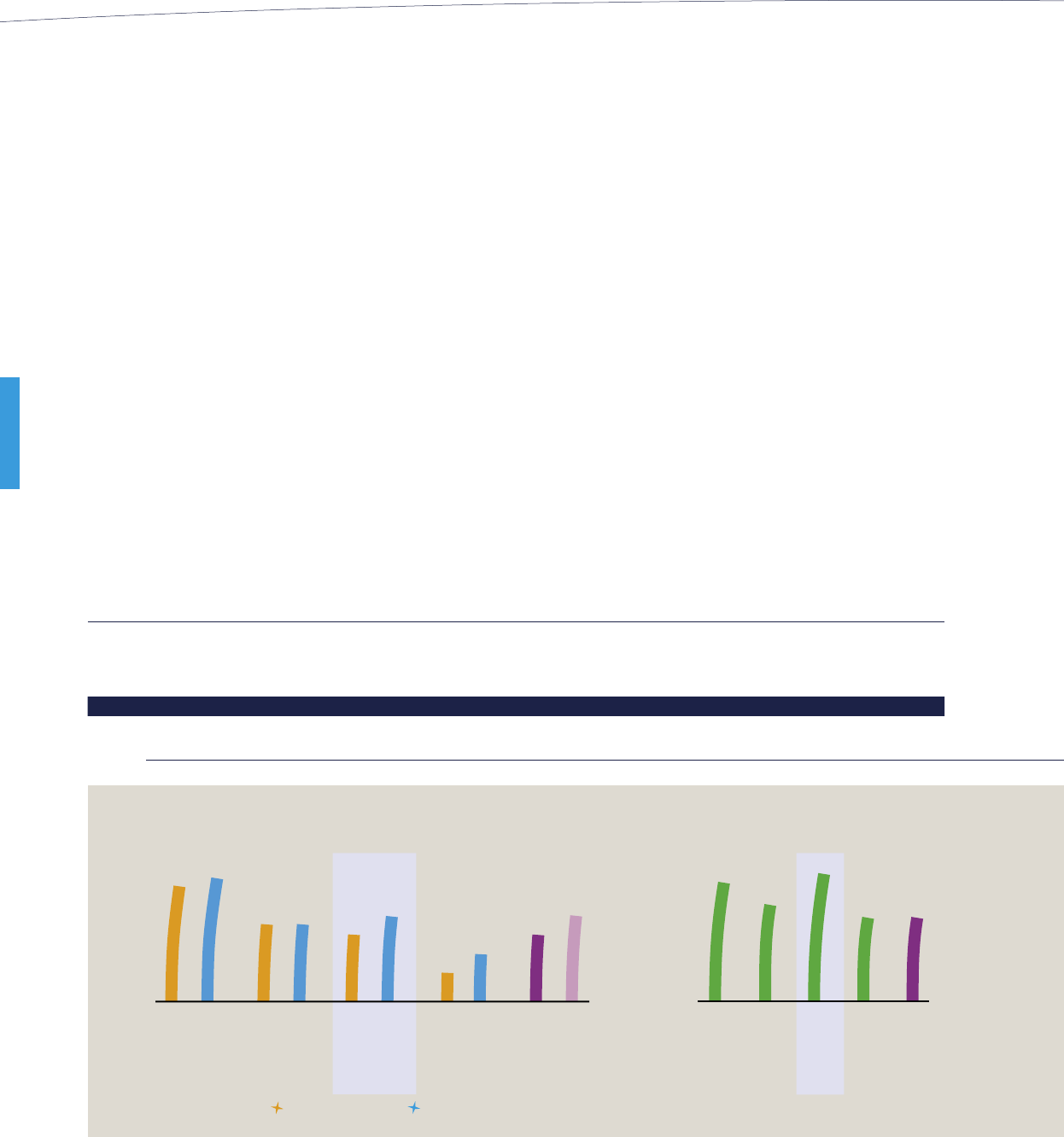
Passenger activity
Good performances based on the complementarity of the networks
Air France-KLM,
a growth in capacity in line with the market
Air France-KLM,
the highest load factor
Source AEA
+12%
+12%
Lufthansa
Iberia
Air France-KLM
British Airways
Association
of European
Airlines
+8% +8%
+7%
+9%
+3%
+5%
+7%
+9%
Capacity in ASK Traffic in RPK
Association
of European
Airlines
Lufthansa
Iberia
Air France-KLM
British Airways
78%
76%
79%
75% 75%
40
A high load factor at 78.7%, up 1.5 point
The Air France-KLM group, relying on the complementary
assets of its long-haul networks and its commercial presence
in Europe strengthened by two powerful hubs, performed
extremely well throughout 2004–05. Traffic was up 8.9% with
capacities up 6.9%. The load factor was 78.7% (+1.5 point).
The group carried 64.1 million passengers, up from 60.6 million
in 2003–04 and reported a turnover of 15 billion euros (up to
6.8%) despite a negative currency effect of 1.4%.
With a network of 234 destinations (2005 summer season)
operated from two of the four main European hubs, connected
by 15 daily flights, and by expansion of the links to the French
and Dutch provinces, the Air France-KLM group became the
leading European air carrier with a market share of 27.7%
(source: AEA) and the first in the world for international
passengers (source: IATA December 2003). To facilitate access
to the expanded network, the group launched innovative
rates, allowing its customers to optimize their travel by flying
with either company on the outgoing leg and using the other
company for the return, while paying round-trip prices.
2004–05
(1)
Capacity
(ASK)
Traffic
(RPK)
Load
factor
Scheduled
passenger
revenues
Million Change Million Change % Change Change
Long-haul 163,216 +7.6% 134,331 +10.0% 82.3% +1.8% +9.2%
Medium-haul 51,390 +4.7% 34,667 +5.1% 67.5% +0.3% +4.3%
Group Total
214,606 +6.9% 168,998 +8.9% 78.7% +1.5% +7.1%
(1) Consolidation of Air France over 12 months and KLM over 11 months
The Air France-KLM group recorded total passenger revenues
of 15.00 billion euros at March 31
st
2005, an increase of 6.8%
over the previous year, despite a negative currency impact
of 1.4%. Operating income for this activity grew 13.9% from
274 million at March 31
st
2004 to 312 million at March 31
st
2005.
01-MAG UK.indd 40 11/07/05 13:46:33

Flying Blue, a unique loyalty program
In June, the frequent flyer programs Fréquence Plus from Air France and Flying Dutchman from KLM
merged to create Flying Blue. The result of 18 months of coordinated work by 300 Air France and KLM
employees, allows its ten million members to acquire and make better use of their Miles on more than
18,000 daily flights, to 900 destinations with 130 air or commercial partners.
This program is intended to become the European leader in terms of customer satisfaction and number
of members. It is segmented into four levels (Ivory, Silver, Gold and Platinum) to ensure better recognition
and rewards for the most frequent flyers.
41
A performing long-haul network all year long
Traffic on the long-haul network was very strong, with an increase of
9.7% in passengers carried (18.8 million). With an increase of 7.6% in
capacities, traffic rose 10%, generating a 1.8 point gain in load factor
to 82.3%. Revenues totaled 8.04 billion euros (+9.5% despite negative
currency effects). Long-haul represented 57.1% of scheduled passenger
revenues, up 1.1 point over fiscal year 2003–04.
The long-haul network covers 112 destinations in 89 countries, including
27 destinations operated by KLM alone and 43 destinations operated by
Air France alone. One-third of the destinations are operated by the two
carriers, but these destinations have a high traffic volume that justifies the
presence of both companies. The network represents 76.0% of capacities
(75.5% in 2003–04) and nearly 80% of the traffic (approximately 79% in
2003–04).
The North and South American networks cover 20 destinations in North
America and 11 destinations in 8 countries of Latin America (2005 summer
season). It represented 29% of total capacities and 32% of total traffic in
2004–05. The weight of this network remained stable from the previous
year. Streamlining began in the summer of 2004, with the shutdown of
KLM flights to Caracas in favor of Air France; Air France added flights to
Caracas which now has a daily service from Paris. Today, the Air France-KLM
is the leading European airline in South America.
Through the SkyTeam alliance, which expanded in September 2004 to
KLM and its American partners Continental and Northwest Airlines, more
than 150 destinations are offered in North and South America.
Turnover
15.0
billion euros
Operating income
312
million euros
01-MAG UK.indd 41 11/07/05 13:46:34

The traffic on this network rose 8.5% over the previous year,
with very strong activity in both North and South America. As
capacities rose only 5.0%, the load factor was up 2.8 points to
85.5%. 7.3 million passengers (+9.0% over 2003–04) traveled
on these lines and revenues totaled 2.94 billion euros (20.9%
of total scheduled passenger revenues). Revenues rose 8.5%
despite a negative currency impact linked to the weak dollar
during the year.
The Asian network covers 20 destinations in 11 countries
(2005 summer season). Since December 1
st
2004, the Group,
in collaboration with Qantas, has offered a full service to
Australia from Singapore. After the health crisis, the Asian
network grew substantially, with an increase of 21.1% in
capacity, generally tracked by traffic (+23.1%). The load factor
also rose 1.3 point to 81.5%. The weight of this network grew,
both in terms of capacity (+2.4 points) and traffic (+2.4 points).
from the previous year, which was marked by the health crisis
in the first quarter. The network represents approximately 20%
of total capacity and 21% of total traffic.
The number of passengers jumped 23.1% to 4 million
(3.3 million at March 31
st
2004) and revenues rose 22.0%
to 2.06 billion. The share of this network in total schedule
passenger revenues increased from 12.8% to 14.6%.
The Africa-Middle East network covers 46 destinations in
31 countries (2005 summer season) and represented
approximately 13% of total capacity and 14% of traffic, as
it did in 2003–04. The Dedicate network, launched in 2004
to facilitate industry travel to construction projects and oil
production sites and activity zones in remote regions, is very
successful on its four destinations.
Both Africa and the Middle East performed very well. Traffic
rose 8.5% with capacity up 7.0%. The load factor was 77.9%
(+1 point). With 4.3 million passengers compared with
3.9 million in 2003–04, revenues totaled 1.92 billion euros
(+9.6%) and represented 13.6% of total scheduled passenger
revenues, a level equivalent to that of last year.
With 15 destinations in 7 countries and 4 French Overseas
territories, the Caribbean and Indian Ocean network
represented about 13% of capacity and 14% of the traffic.
Air France represents about 80% of this sector. The first
nine months of fiscal year 2004–05 were marked by heavy
competition that impacted on both traffic and revenues. The
change in the competitive situation in the final quarter allowed
this network to recover. Traffic fell 1.7% over the year with a
decline of 2.9% in capacities, generating a gain of one point
in the load factor which was 80.9%. A total of 3.15 million
passengers used these lines (-2,6%) and revenues totaled
1.12 billion euros, down 7.5%. The share of this network in
total scheduled passenger revenues fell from 9.2% at March
31
st
2004 to 8.0% at March 31
st
2005.
KLM and Air France ended commission payments to travel agencies in their domestic markets on
January 1
st
and April 1
st
, 2005 respectively. Travel agencies are no longer paid by air carriers and they
invoice service fees directly to their customers. This new system offers passengers greater transparency
about the elements of the ticket price, with the travel agency’s fee adapted to the purchase method
(Internet, telephone, agency, etc.).
Following this change, Air France and KLM adjusted their fares and now invoice service fees at their
own points of sale. In France, Air France also followed the practice of showing separately the prices
of the ticket and service fees. The policies of Air France and KLM in this area reflect market changes,
as 0% commission is gradually becoming standard in North America and Europe.
Reorganization of the system to remunerate travel agencies
42
01-MAG UK.indd 42 11/07/05 13:46:35
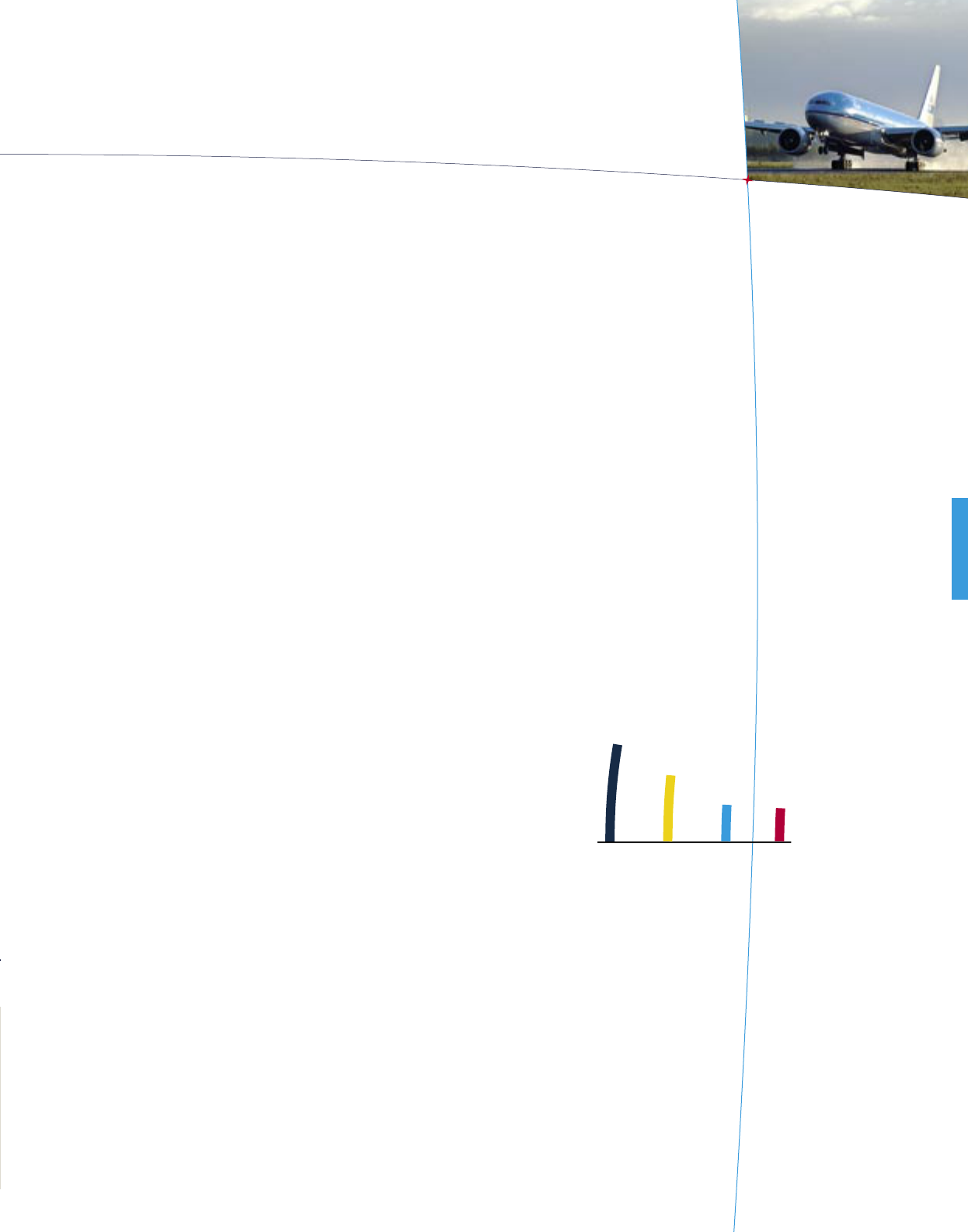
43
The breakdown of revenues by destination shows that the
Air France-KLM group benefits from a balanced network.
The group is not dependent on any specific market, as each
of its markets has a different sensitivity to economic and
political risks.
Today, the hubs are the core of competition in Europe: 75% of
long-haul flights are concentrated on 10 European platforms
and 54% at only four airports: London Heathrow, Paris CDG,
Frankfurt and Amsterdam. Moreover, 60% of the passengers
on long-haul flights are connecting.
In addition, this network is organized around two of the best
hubs in Europe, which allow the group to combine point-to-
point traffic and transfer traffic.
Growth of about 5% per year on the intercontinental market
over the next ten years will bring expansion of the point-to-
point traffic and transfer traffic, thus reinforcing the role of
the major intercontinental hubs. (source: BCG). With its hubs
in Roissy-Charles-de-Gaulle and Schiphol in Amsterdam,
Air France-KLM is well positioned to benefit from this growth.
By offering a large number of weekly connections in less than
two hours both at CDG and at Amsterdam, the group attracts
high-contribution connecting traffic. During the year, the two
connecting platforms performed extremely well. The CDG hub
recorded a 6% increase in passengers, while passengers at
Schiphol rose 10%. Turnover from connecting passengers rose
faster than turnover for the platform at rates of 13% and 11%
for Paris and Amsterdam respectively.
The international medium-haul network includes Europe
(including France and North Africa). It covers 122 destinations
in 30 countries (2005 summer season). It is served by both
Air France and KLM, but also by their regional subsidiaries,
Régional, Brit Air and CityJet for Air France, KLM Cityhopper
and KLM Cityhopper UK for KLM.
Activity on this network improved from last year. Traffic was up
5.1% with capacity up 4.7%, generating a stable load factor of
67.5% (+0.3 point). 45.3 million passengers traveled with the
group (+4.1%) and generated revenues of 6.04 billion euros
(+4.3%), including 35% on the French domestic market. This
network represented 42.9% of total scheduled passenger
revenues, down from 44.1% one year earlier.
Strong competition and structural changes in customer demand
in the European market led Air France to consider a revision of
the product on its European lines by introducing greater ground
flexibility and efficiency while simplifying and standardizing the
flight product with a simple and segmented price policy, while
optimizing aircraft space. The gradual implementation of this
change began in April 2004.
At the same time, KLM expanded its capacity to France from
Amsterdam, Rotterdam and Eindhoven. The two carriers also
began to streamline their medium-haul network. Air France
stopped its flights to Bristol and Glasgow in favor of KLM, while
KLM stopped its service to Casablanca and Turin to the benefit
of Air France.
The European medium-haul network: the progressive implementation of a simplified offer
A well-balanced network sustained by efficient hubs
17,900
11,993
Ai
r
F
r
an
c
e
Ro
is
sy -
C
DG
Luf
t
ha
n
sa
Fr
a
n
kf
ur
t
B
ri
t
is
h
Ai
r
w
a
ys
Lo
nd
o
n
- Heathro
w
KL
M
Amsterda
m
6,619
6,572
Number of weekly connecting flights
(in less than 2 hours between
medium and long–haul)
01-MAG UK.indd 43 11/07/05 13:46:36
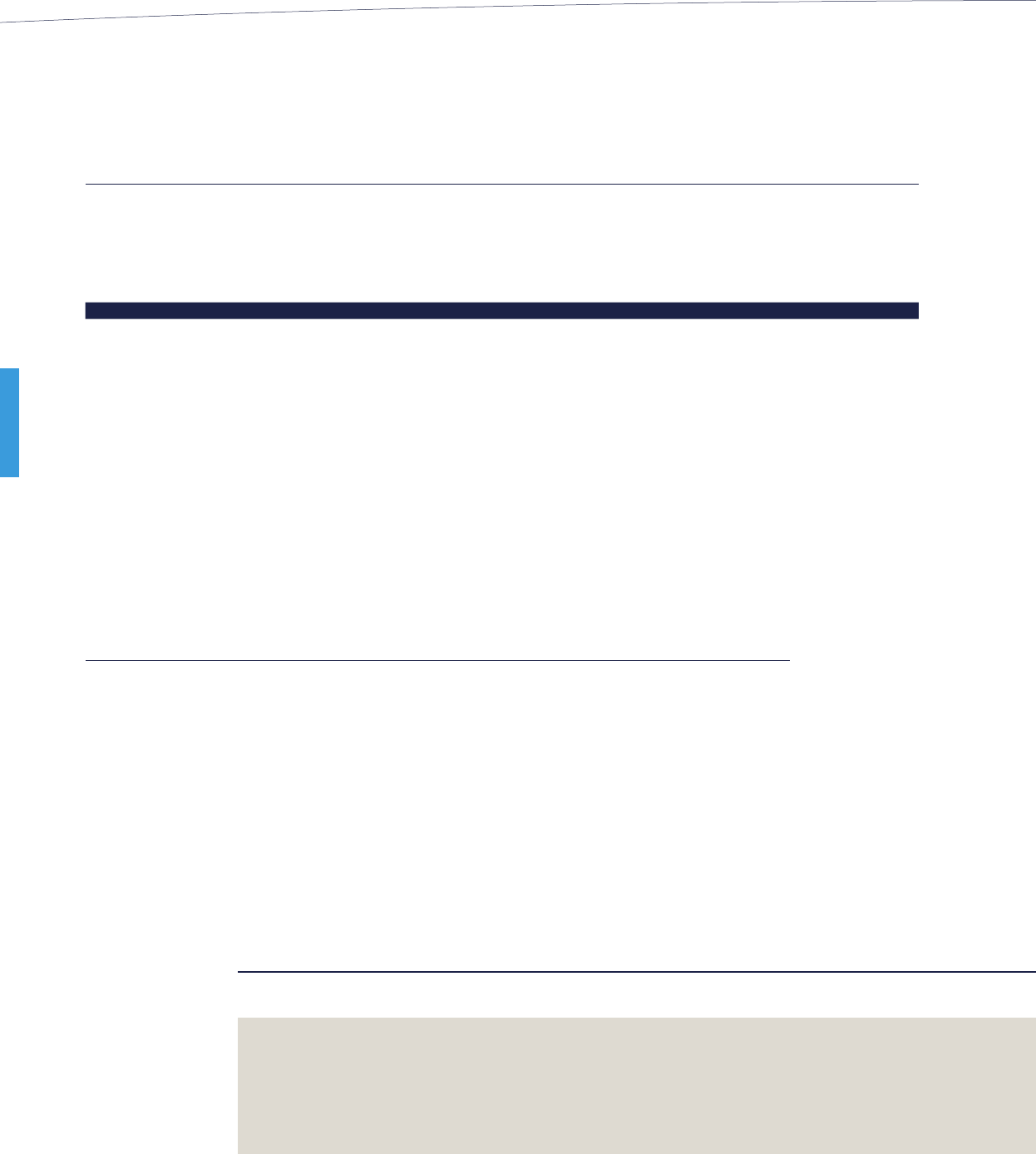
Fiscal year at
Consolidated Financial Data
March 31
st
2004
March 31
st
2004
Change
Scheduled passenger revenue (in € million) 14,085 13,156 +7.1%
Unit revenue per ASK (in
€ cents) 6.56 6.55 +0.1%
Unit revenue per RPK (in
€ cents) 8.33 8.48 -1.7%
Unit revenue per ASK (in
€ cents) 6.34 6.34 +0.0%
A growing unit revenue
As a result of higher fuel prices, the group implemented fuel
surcharges. In May, the two companies introduced a surcharge of
3 euros per flight coupon for Air France and 4 euros per coupon
for KLM. In August, an additional surcharge was levied, based
on destination, varying between 2 and 12 euros per coupon at
Air France and of 3 euros per coupon at KLM. A third surcharge
was introduced in October of 2004 in the amount of 11 euros
per long-haul coupon at Air France and 7 euros per long-haul
coupon at KLM.
Unit revenue per available seat-kilometer rose 1.6% excluding
currency effect, and unit revenue per passenger-kilometer was
down slightly, excluding the currency effect (-0.3%). The unit cost
of the passenger activity measured per available seat kilometer
was down 2.3% on a constant currency and fuel basis.
2004–05 By destination By sales area
(million euros) % of total Change (million euros) % of total
Change
Europe (including France) 6,044 42.9% +4.3% 9,711 68.8% +6.9%
North and Latin America
2,939 20.9% +8.5% 1,994 14.2% +11.7%
Asia 2,058 14.6% +22.0% 1,095 7.8% +8.6%
Africa-Middle East 1,920 13.6% +9.6% 937 6.7% +4.7%
Caribbean and Indian Ocean 1,124 8.0% -7.5% 348 2.5% -10.8%
Total 14,085 100.0% +7.1% 14,085 100.0% +7.1%
Scheduled passenger revenue by destination and by sales area
Air France selected couturier Christian Lacroix to design the company’s new uniform. On April 5, the 36,000
plus men and women of Air France donned the new uniform in the company’s agencies, airports and on
board all Air France flights. The new uniform elegantly reflects the spirit of Air France and demonstrates
the company’s ambition to serve all its passengers.
An elegant new Air France uniform
44
01-MAG UK.indd 44 11/07/05 13:46:36
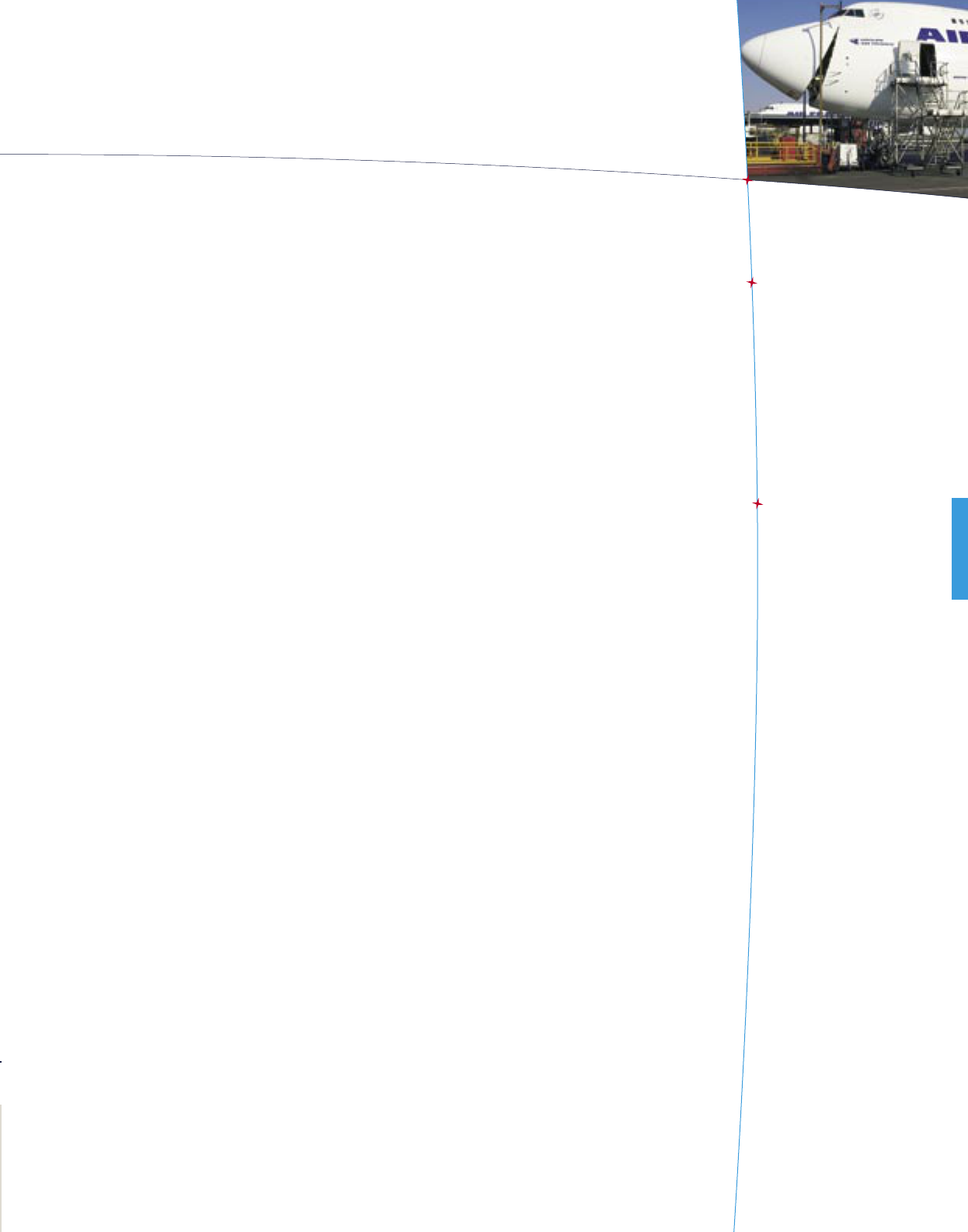
45
Cargo activity
A performing year in a contrasted environment
The Group’s cargo activity was dynamic in fiscal 2004-05, recording
revenues of 2.49 billion euros, an increase of 9.4%. The very strong
performance for the year can be seen in the 61% surge in operating
income to 95 million euros at March 31
st
2005 compared with 59 million
at March 31
st
2004.
Traffic grew by 8.8% with an offer up 9.4%, resulting in a slight decline in
the load factor to 68.2% (-0.4 point). The Group carried 1.33 million tons
of cargo, half of which was carried in its fleet of 15 cargo planes and
17 combo cargo-passenger planes, and half in the holds of passenger
planes.
The year was marked by two phenomena: higher oil prices, which had
a heavier impact on the cargo activity and led to an increase in fuel
surcharges, and the currency imbalance that intensified, particularly
between Asia and Europe, due to the appreciation of the euro and the
end of quotas in the textile industry. On the other hand, the imbalance
between Europe and the United States seen last year improved.
The North and Latin American network represented 35% of traffic
and 34% of capacities. It recorded an increase of 8.7% in traffic, with
capacity up 4.7%. The cargo load factor rose 2.6 points to 69.7%.
500,000 tons of freight were carried, an increase of 9.2%. Revenues
rose 13.4% to 652 million euros. The network represented 28.3% of
freight transport revenues (27.6% at March 31
st
2004).
The Asian network, although dynamic, recorded a decline of 4.1 points
in the load factor to 73.8%. Traffic, which rose 10.1%, did not follow the
16.2% increase in capacity. 600,000 tons were carried by the Group
(+9.8%) and generated revenues of 999 million euros, an increase of
13.7%. This network represented 43.5% of freight revenues (42.2% at
March 31
st
2004) and 50% of traffic and 46% of capacities.
The African and Middle East network, which represented 9% of traffic
and 10% of capacity, performed very well after a year in 2003–04
marked by international tensions. Traffic rose 7.3% with a 4.2% increase
in capacity. The load factor climbed 1.8 points to 61.8%. The number
of tons transported grew 7.5% to 165,000 tons. Revenues were up
9.4% to 279 million euros and represented 12.1% of cargo transport
revenues, the same level as the previous year.
Turnover
2.49
billion euros
Operating income
95
million euros
01-MAG UK.indd 45 11/07/05 13:46:38
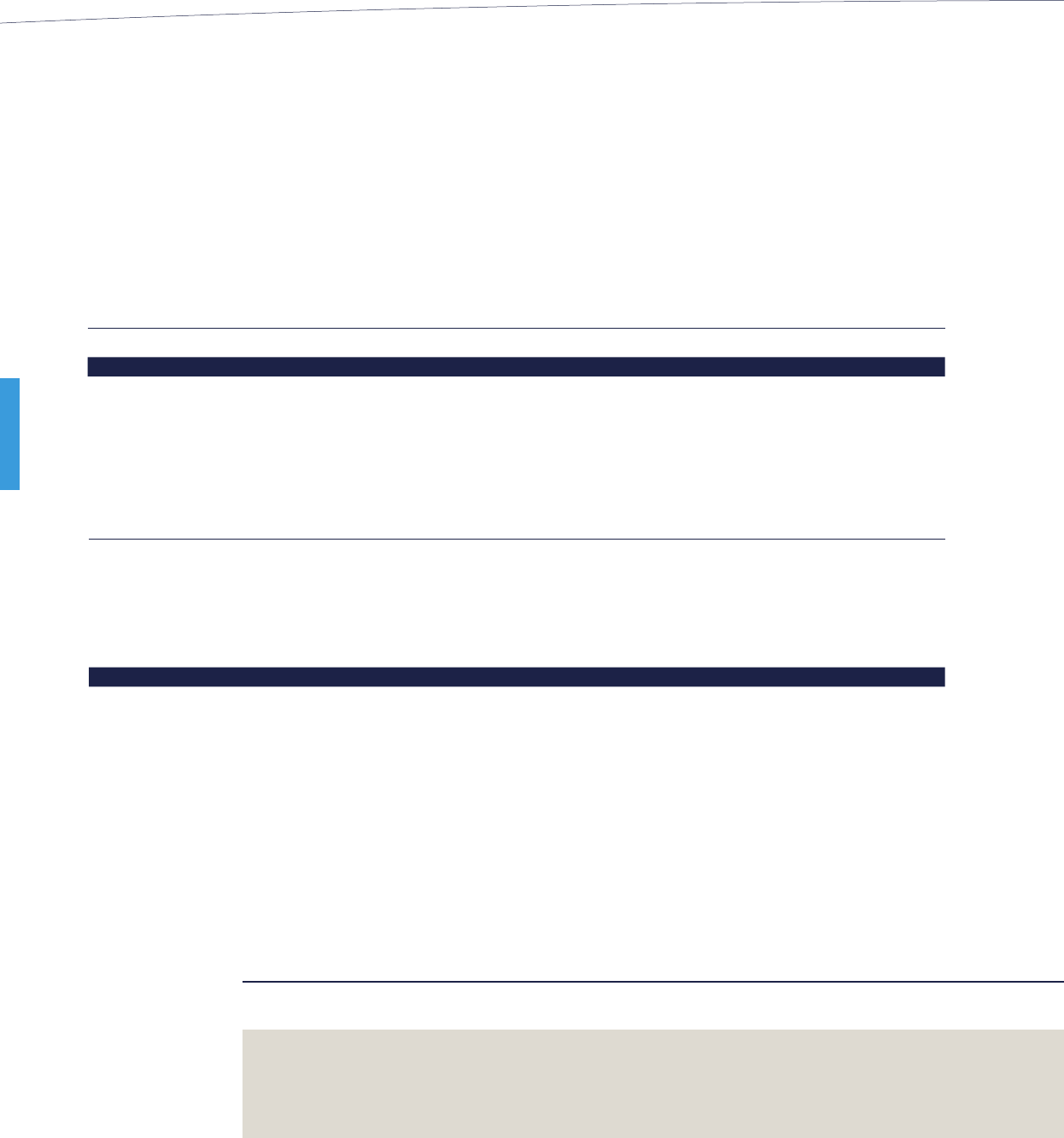
According to a survey conducted with Air France Cargo and KLM Cargo customers, 75% of them had a
positive perception of the merger of the two airlines. The positive benefits included the expansion of the
network and the fleet, the improvement in the price structure and the quality of service. Customers also
indicated that they would watch to make sure that too large a structure does not damage either their
relationship with the two entities or the quality of the service provided.
75% of customers satisfied with the Air France-KLM merger
Cargo revenue by destination and by sales area
2004-05 By destination By sales area
(million euros)
% of total Change
(million euros)
% of total Change
North and Latin America 652 28.3% +13.4% 266 11.6% +12.7%
Asia 999 43.5% +13.7% 755 32.8% +20.9%
Africa-Middle East 279 12.1% +9.4% 157 6.8% +9.7%
Caribbean and Indian Ocean 178 7.7% +5.3% 41 1.8% -4.7%
Europe
192 8.4% -6.8% 1,081 47.0% +4.1%
TOTAL
2,300 100.0% +10.4% 2,300 100.0% +10.4%
2004-05
(1)
Capacity (ATK) Trafic (RTK) Load factor Cargo
revenues
Million
Change
Million
Change
%
Change
Change
Cargo activity 14,774 +9.4% 10,078 +8.8% 68.2% -0.4% +10.4 %
The Caribbean and Indian Ocean network remained stable
with an increase of 2.1% in capacity and growth of 1.2% in
traffic. The load factor was 53.5% (-0.5 point). Revenues totaled
178 million at March 31
st
, 2005 (+5.3%) for 73,000 tons, an
increase of 2.2%. This network represented 5.6% of capacity and
7.3% of the traffic.
As cargo transport in Europe is primarily operated by truck, the
activity of the European network of the Air France-KLM group is
relatively limited and represents only 10% of the cargo activity.
Capacities rose 3.2% with traffic up 2.2%. The cargo load factor
was stable at 21.7% (-0.2 point). Revenues were 192 million
euros, a decline of 6.8%. 76,000 tons were shipped (-3.1%).
46
01-MAG UK.indd 46 11/07/05 13:46:39
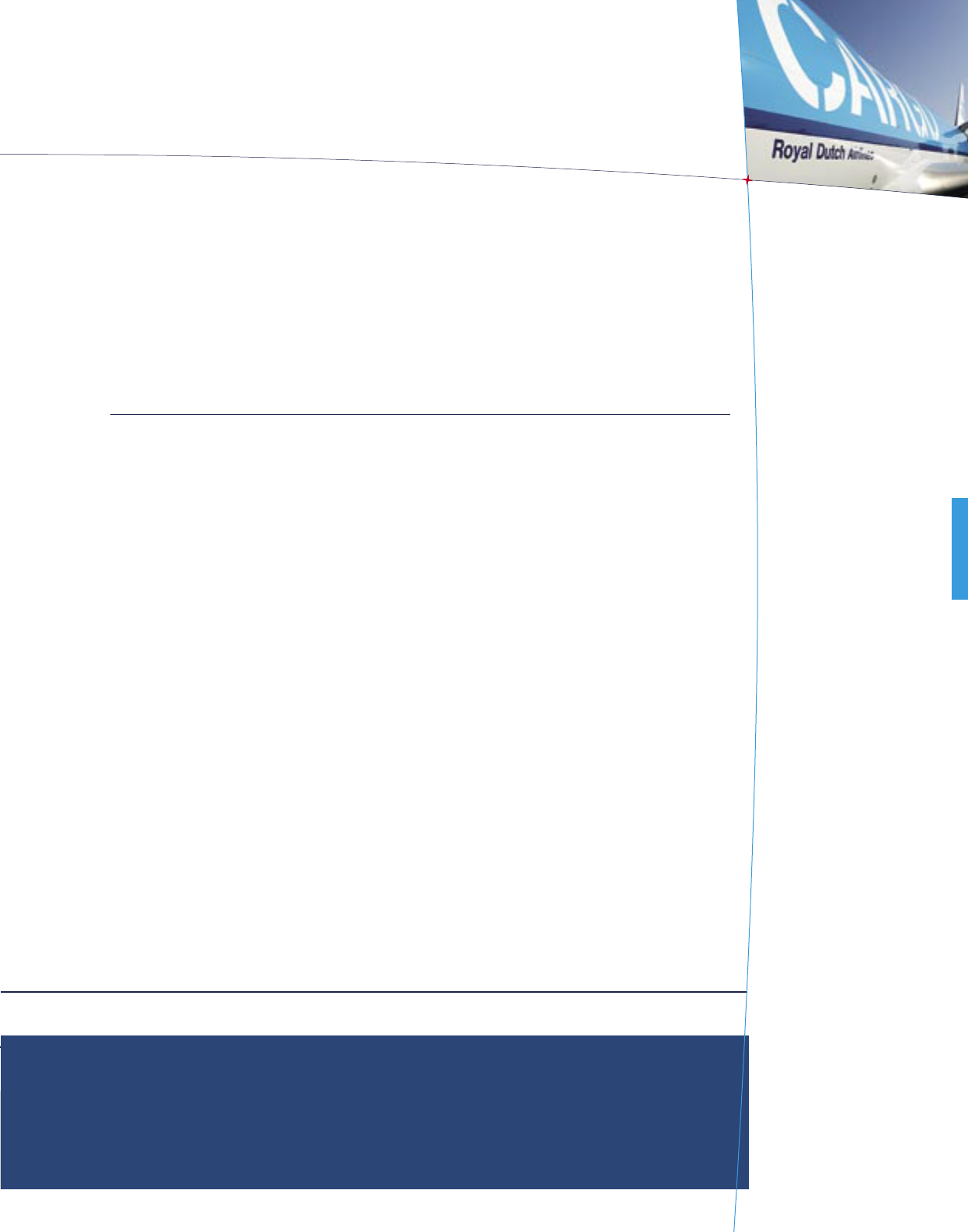
From the end of 2005, Air France Cargo and KLM Cargo will provide customers with a single offer in
the cargo segment. The European Cargo House will manage the freight network of the two airlines,
and marketing and sales on behalf of Air France and KLM. Each company will, however, continue to be
responsible for its own operations.
The size of Air France-KLM, the expertise of both airlines, and the responsiveness of their respective
teams should be strong assets for improving productivity, maintaining the level of unit revenues, enhancing
service quality, and developing very strong sales positions in a highly competitive environment.
Creation of the European Cargo House
47
Fiscal year at
Consolidated Financial Data
(1)
March 31
st
2005 March 31
st
2004
Change
Revenues from cargo transport (in € million) 2,300 2,084 +10.4%
Unit revenue per ATK (in € cents) 15.58 15.42 +1.0%
Unit revenue per RTK (in
€ cents) 22.83 22.48 +1.6%
Unit cost per ATK (in
€ cents) 14.75 14.81 -0.4%
(1) Consolidation of Air France over 12 months and KLM over 11 months.
Unit revenue per available ton-kilometer rose 3.8% on a constant currency basis. The unit cost per available ton-kilometer fell 4.7%
on a constant currency and oil price basis.
A joint Air France Cargo and KLM Cargo offer
In the framework of the merger of Air France and KLM, the two
airlines synchronized their networks around the two hubs of
Roissy-CDG and Schiphol and have proceeded to share holds.
Since 2000, Air France Cargo has been developing an offer
adapted to the various expectations of air cargo customers.
This offer, which is now common to KLM Cargo and the
members of the SkyTeam Cargo alliance, consists of four
families of products:
- Dimension offers standard airport-to-airport transport that
does not require special handling. This generic product
primarily concerns groupings and all shipments in general.
- Cohesion is a custom product for regular import and export
shipments and just-in-time shipments integrated within a
logistics chain. This product is formalized by a reciprocal
contractual commitment between a loader, transit agent, and
Air France Cargo or KLM Cargo.
- Variation offers a solution for the transport of one-off
merchandise, from live animals to oversized packages, from
hazardous products to high added-value products.
- Equation offers express shipment and guarantees priority
handling, within shorter time frames, for shipments that
are loaded without prior reservation on the first available
departing flight.
Good performance of the unit revenue
01-MAG UK.indd 47 11/07/05 13:46:39
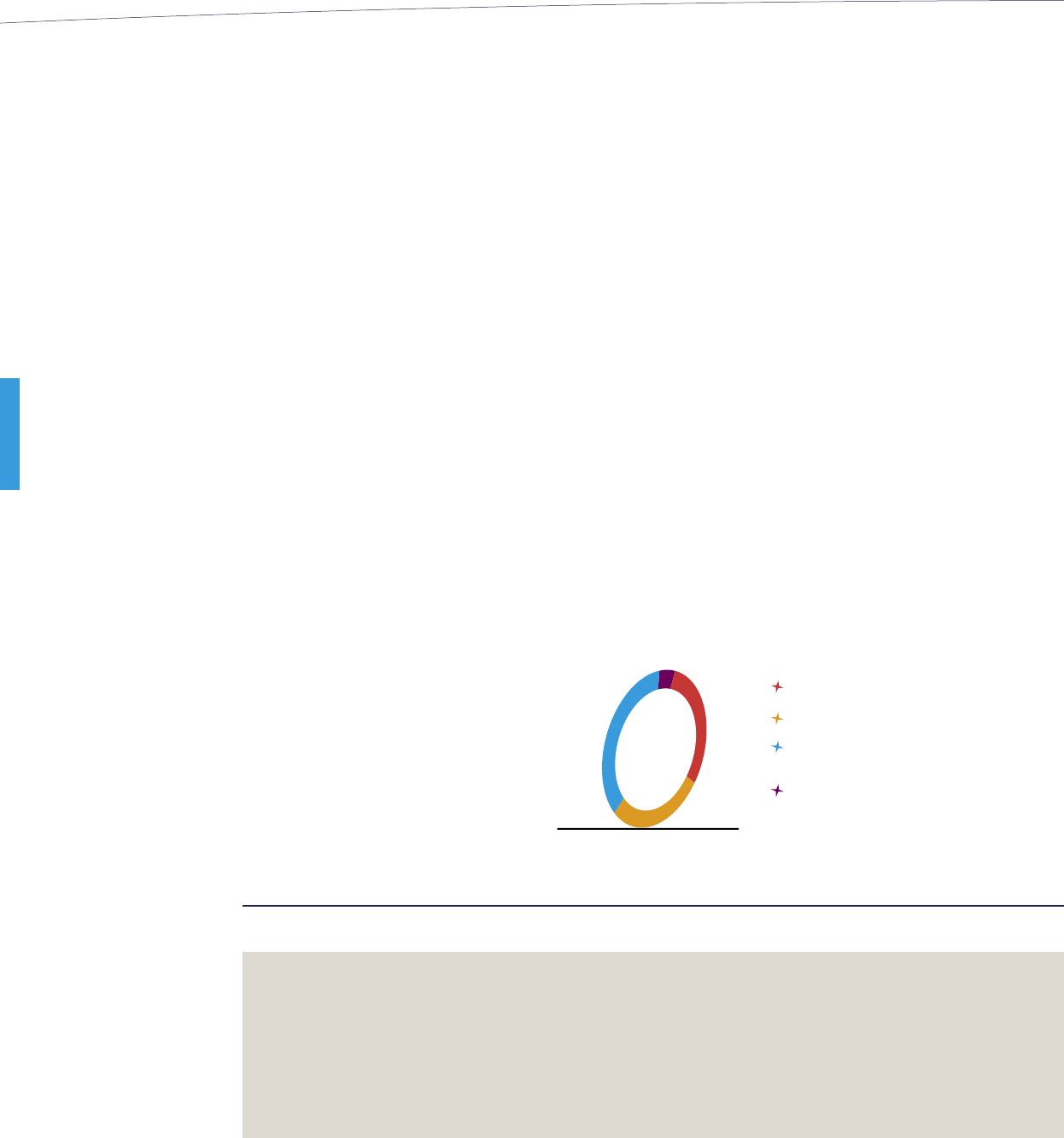
Maintenance activity
In order to provide support for equipment on the future Airbus A 380, Air France Industries and Lufthansa
Technik have joined forces to create Spairliners GmbH. This 50:50 joint venture between the two
companies will make it possible to offer a comprehensive range of equipment support for all A 380
operators following the introduction of this new aircraft. This support will include maintenance, repairs,
spare parts inventory management and all the associated logistics services. Spairliners will have its own
stock of A 380 equipment in order to guarantee the availability of equipment while optimizing costs. Not
only small-scale fleets but also segments of the Airbus A 380 fleets of major airlines will be able to benefit
from significant economies of scale thanks to the integrated equipment support service and permanent
access to stocks of spare parts offered by Spairliners. The company will be headquartered in Hamburg,
with its operational centre based in Paris.
Spairliners: a dedicated business unit for A 380 maintenance
First synergies between Air France Industries and KLM Engineering & Maintenance
The maintenance activity generated 777 million euros in third-
party revenues, representing an increase of 4.0% despite the
negative exchange rate fluctuations seen over the year (2.6%).
Operating income came out at 48 million, down -10.9% from
55 million at March 31
st
, 2004.
The business combination between Air France and KLM has
enabled the Group to strengthen its position as the world
leader in multi-product aircraft maintenance by combining
the complementary features of the maintenance activities of
Air France, known under the Air France Industries (AFI) brand,
and those of KLM’s Engineering & Maintenance division. In
addition to the maintenance of the Group’s two fleets, the
two companies are responsible for maintaining the fleets of
around 100 clients.
Driven by the development of centers of technical excellence,
the technical support and follow-up activities have been split
between the two companies. This has made it possible to
rationalize investments, with each one benefiting from the
improvements achieved. In this way, the GE 90 engines used
on the Boeing B 777 and the CF6-80E1 engines used on the
Airbus A 330 are now managed by joint Air France and KLM
teams. The fact that their skills and know-how dovetail so
well with one another has also made it possible to limit the
outsourcing of certain activities to third parties.
The two companies have also set up a joint sales management
structure, giving one dedicated contact for each customer.
Lastly, a number of projects have been rolled out in order to
optimize the inventories and equipment required to meet the
various needs. In line with this joint work, there are also plans
for staff exchanges in the event of peaks in the activity for one
of the companies.
38%
5%
28%
30%
Engines
Equipment
Large-scale maintenance
and specific fleets
Small-scale maintenance
and other activities
Breakdown of third-party revenues
by core business
Range of services designed for the customer
The range of services includes:
- Large-scale maintenance visits and specific fleets
- Daily small-scale maintenance for fleets worldwide
- Engine servicing
- Equipment servicing and logistics
Aircraft maintenance activities can only be carried out by companies
that have been accredited by the national authority governing the
operator. In Europe, the rules are set by the European Aviation
Safety Agency (EASA). In 2004, Air France Industries further
extended its range of accreditations, obtaining the EASA 21, which
authorizes it to design and fit aircraft equipment in the same way
as a manufacturer.
KLM Engineering & Maintenance is also ISO
14001 and EMAS certified.
48
01-MAG UK.indd 48 11/07/05 13:46:40
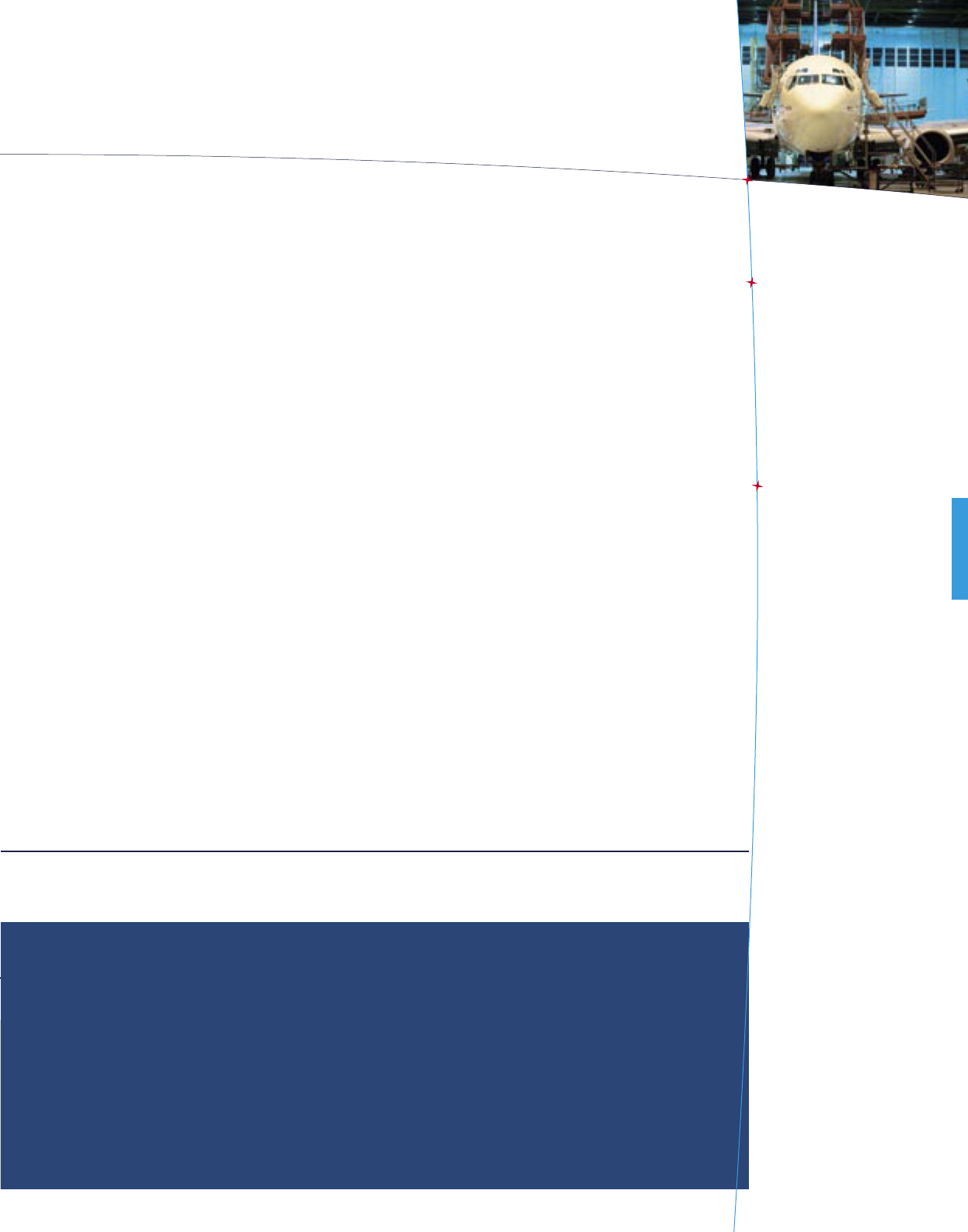
With the EOLE factory at Orly and the new engine shop at Schiphol, Air France Industries and KLM
Engineering & Maintenance are adapting their industrial sites to the requirements of the maintenance
market in order to face the competition more effectively.
Set on a 12.7 hectare site, the new EOLE industrial equipment unit is dedicated to operational equipment
support and repairs, with five key areas of expertise: avionics, pneumatics, hydraulics, repairs and surface
processing as well as cabin equipment. A European centre of excellence, this 84 million euro investment
has made it possible to cut equipment processing times by 50% and optimize inventories and logistics
circuits, setting a new standard for the industry.
At Schiphol, the new engine shop used for engine maintenance complies with the latest standards for
working conditions, ergonomics, health and safety and environmental protection. This new engine shop
will strengthen KLM E&M’s position on the engine maintenance market by making it possible to handle
350 visits a year compared with 200 previously. To safeguard this investment, KLM E&M has sealed a
partnership with General Electric, which supplies the three most used engines at both Air France and
KLM, guaranteeing it the maintenance of around 20 engines per year.
New maintenance sites to meet market demand
49
The activity is spread out over six main sites: four Air France Industries sites
and two KLM sites. The two companies’ maintenance services are also
present at 200 airports for Air France and 50 for KLM.
Air France Industries is based in Toulouse-Blagnac for large-scale
maintenance on small-range aircraft, Orly for large-scale maintenance on
long-haul craft, engines and equipment, Roissy for small and medium-scale
maintenance and Le Bourget for special fleets. Air France Industries is the
world leader for large-scale maintenance on the Airbus A 319, A 320 and
A 321, for equipment support on the Airbus A 320, A 330, A 340 and Boeing
B 777, and for the maintenance of CFM56-5 engines for the Airbus A 320
and A 340. During the year, Air France inaugurated the 41,000 square-
meter EOLE factory (Entretiens et Opérations Logistiques Équipement
- equipment maintenance and logistics operations) in Villeneuve-le-Roi
as well as its new Blagnac industrial centre with 35,700 square meters
dedicated to large-scale maintenance for small-range aircraft, replacing the
Montaudran factory.
KLM’s maintenance activity is run out of two main sites at Schiphol Airport
in Amsterdam and Norwich in the UK. In 2004, KLM inaugurated a new
engine shop in Schiphol.
New generation sites
Third-party revenues
777
million euros
Operating income
48
million euros
01-MAG UK.indd 49 11/07/05 13:46:43

Other activities
Other activities primarily include KLM’s charter business through
its subsidiary Transavia.com and the group’s catering activity
through its subsidiaries Servair and KLM Catering Services.
These activities posted revenues of 805 million euros, an
increase of 12.7%, and operating income before aircraft
disposals of 34 million euros, compared with 17 million at
March 31
st
2004.
Transavia.com
Amadeus is the world leader in technologies and the distribution of services to the travel and tourism
industry. It is 23.4%-owned by Air France, its principal shareholder. Amadeus has developed its activity
in three segments: travel distribution to travel agencies and airline sales offices, e-commerce, and
information technology services.
Amadeus has more than 6,000 employees throughout the world. The Group has been listed for trading on
the Madrid, Barcelona, Paris and Frankfurt stock exchanges since 1999. At December 31
st
2004, Amadeus
recorded revenues of 2.1 billion euros, up 6.6%. Operating income rose 6.9% to 343 million euros.
Air France, along with Iberia and Lufthansa, the principal shareholders of Amadeus, have accepted the
tender offer from the investment funds BC Partners and Cinven for all Class A shares of Amadeus stock
at a price of 7.35 euros per share.
The tender offer will be executed through a new company, WAM, in which the principal shareholders
will hold a stake. This operation took place from May 25
th
to June 27
th
2005, after being approved by the
European Commission, the American antitrust authorities and CNMV, the Spanish market authority.
Amadeus
Transavia.com had a very good year in 2004-05 with the
number of passengers up 6% to 4 million with a fleet of
26 planes. Revenues were 419 million euros (up +5.8%) and
the company recorded operating income of 31 million euros.
In 2004, KLM merged the operations of its charter company
Transavia with its Basiq Air subsidiary to form Transavia.com,
«the digital travel shop that stands out for its customer care».
The new company operates charter flights for businesses
or tour operators departing from Amsterdam and Rotterdam
as well as «low-cost» flights to more than 70 destinations
in Europe and the Mediterranean basin. The new company
intends to become a leading operator in the low-cost travel
market in the Netherlands, selling most of its seats via its
website. During the year, Transavia.com launched seven
new scheduled destinations departing from Rotterdam.
Transavia.com also leases its aircraft capacities to other air
carriers, offering them crew or technical support if needed.
In this sector, a number of initiatives have been introduced
by the tour operators and Transavia.com to raise load factors
and reduce costs.
50
01-MAG UK.indd 50 11/07/05 13:46:43
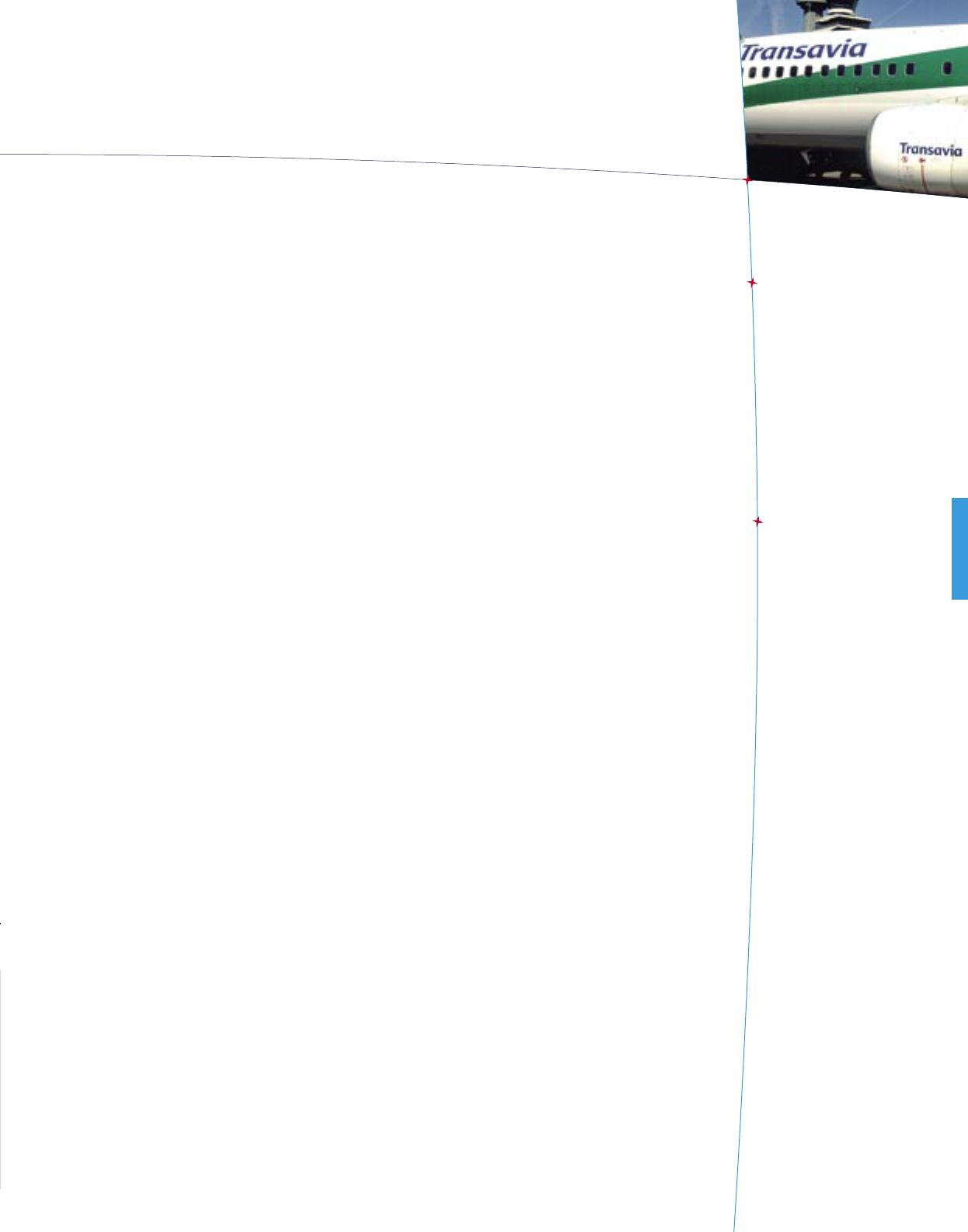
51
Catering
The catering business organized around Servair, a subsidiary of the
Air France group, and KLM Catering Services, a KLM subsidiary,
also performed well last year. With 386 million revenues, this activity
recorded operating income of 11 million euros. The consolidation of
Servair over 15 months had an impact of 44.4 million on revenues and
– 0.6 million on operating income.
Servair and KLM Catering Services provide Air France, KLM and third party
airlines, with a broad range of services adapted to their needs 7 days a
week: food production, flight meals for the various classes and the crew,
aircraft fueling, cabin cleaning and supplies. The two companies are leaders
in their domestic markets, and prepare over 164,000 meals daily.
Created in 1971 by Air France, Servair has 7,724 employees. The Servair
network, composed of Servair, its partners (Alpha, Flying Food Group,
Servair Air Chef and Eurest Servair) and its technical crews, ranks third
in the world and has more than 80 locations throughout the world. This
strategy of alliances enables it to build a global network that respects local
requirements and the personality of each company.
KLM Catering Services employs 1,350 persons. KCS has provided its
services for more than 70 years on two sites at Schiphol airport. It has
earned various certifications for the quality of its service.
Turnover
805
million euros
Operating income
34
million euros
(excluding aircraft sales)
01-MAG UK.indd 51 11/07/05 13:46:45
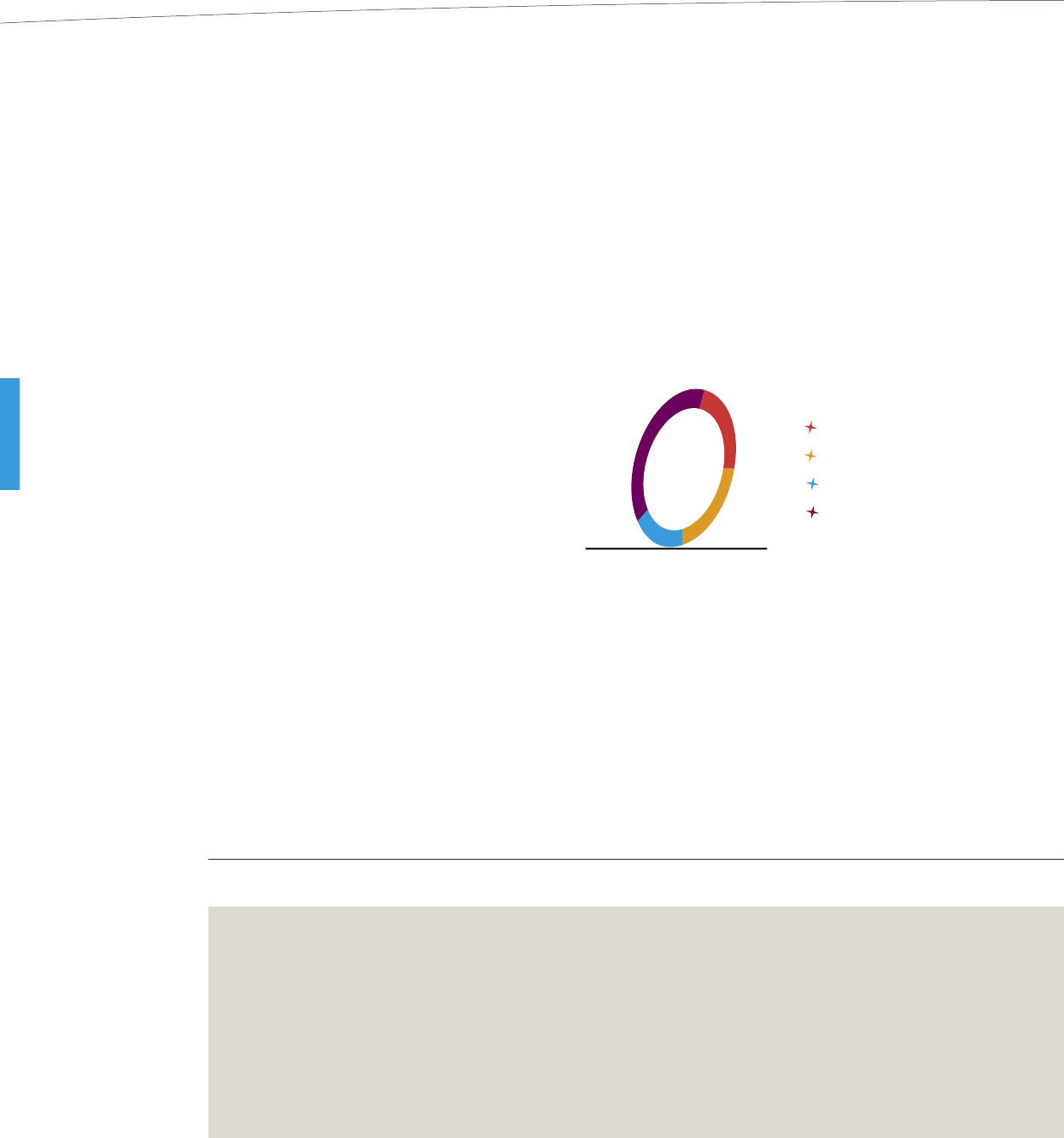
The membership of KLM Cargo in SkyTeam Cargo reinforces its position as the leading alliance in the
air cargo segment. The alliance currently includes Aeromexico Cargo, Air France Cargo, Alitalia Cargo,
CSA Cargo, Delta Air Logistics, KLM Cargo and Korean Air Cargo.
These seven companies serve 500 destinations in 114 countries. They share a global network and a
combined offer. SkyTeam Cargo also offers harmonized handling procedures through single points of
sale where some or all of the members are housed under the same roof. These features ensure perfect
logistical coordination, from cargo acceptance to delivery, over the entire network. Air France Cargo,
KLM Cargo, Delta Air Logistics and Korean Air Cargo have a centralized reservation center in the United
States, in the form of a joint venture.
For the next fiscal year, the alliance is committed, in particular, to improving its cargo product offering
through a common quality program.
SkyTeam Cargo, the leading global alliance
SkyTeam
A global alliance to meet the market’s needs
Inclusion of KLM, Northwest Airlines and Continental
The major event for the alliance in fiscal 2004-05 was the
integration of KLM and its American partners, Northwest Airlines
and Continental. These three new members increased the size of
the alliance by 60%, bringing to SkyTeam 141 new destinations,
an additional 5,500 daily flights, 100 new lounges and 9 hubs.
The agreements for reciprocal membership in lounges and
cross partnerships in frequent flyer programs were established
when these new partners joined SkyTeam.
This newly strengthened alliance is one consequence of the
merger of Air France and KLM in May 2004. Since 1989, KLM
had been affiliated with Northwest Airlines and had formed
a joint venture on the North Atlantic. Continental joined this
alliance in 1999. In addition, in August 2002, Delta Airlines had
signed an alliance with Continental and Northwest Airlines for
cooperation in the American domestic market.
In a market that is becoming increasingly globalized, it is
necessary to have a global and powerful offer. Only an alliance
gathering European, American and Asian partners is able to
answer the market’s needs, for the passenger as well as for the
cargo businesses.
Five years after it was formed, SkyTeam is the second largest
global alliance with a market share of 21%. Its strategy is
geared to making it the preferred alliance of its customers.
The nine member airlines are developing their service in both
the passenger and cargo segments, particularly by offering
a constantly improving network, sharing their lounges, and
combining their activities in airports.
One of the challenges
of the alliance in the next year will be the implementation of an
electronic ticket common to all member companies.
SkyTeam offers global coverage to its customers by serving
a network of 658 destinations in 137 countries with a choice
of over 14,000 daily flights, thanks to its system of hubs
distributed throughout the world:
- In Europe: Amsterdam, Paris, Milan and Prague;
-
In the USA: Atlanta, Cincinnati, Cleveland, Detroit, Houston,
Memphis, Minneapolis-St Paul and New York (JFK and
Newark);
- In Asia: Guam, Seoul-Incheon and Tokyo; and;
- In South America: Mexico City.
Positioning of SkyTeam
among the alliances
17%
40%
22%
21%
SkyTeam
Star Alliance
Oneworld
Others
Source IATA 2003
52
01-MAG UK.indd 52 11/07/05 13:46:45

53
A simple operating method
SkyTeam is directed by a Governing Board and a Steering Committee.
Consensus (except in a limited number of very specific cases) is the rule for
decision-making. Each member participates equitably in preliminary debates and
final decision-making.
The Governing Board is composed of the Chairmen, CEOs and Alliance Directors
from all member companies. It meets twice a year and defines the general
strategic positions. It sets the amount of resources and promotes the alliance
externally. The Governing Board appoints the Chairman and Vice-Chairman of
the Steering Committee for a two-year term of office.
The Steering Committee, composed of the Alliance Directors, meets four times a
year. It implements the strategic decisions adopted by the Governing Board and
ensures the proper internal operation of SkyTeam.
Antitrust immunity for better commercial coordination
The SkyTeam alliance enjoys antitrust immunity on the North Atlantic for Air France,
Delta Airlines and its European partners Alitalia, CSA Czech Airlines as well as for
KLM and Northwest Airlines. This antitrust immunity allows better coordination of the
sales teams, the pricing policies and the capacity management.
Air France, KLM, Delta and Northwest Airlines have initiated processes to benefit
from a global antitrust immunity.
On the Pacific, Delta Airlines and Korean Air also enjoy antitrust immunity.
On November 13
th
2004, Air France and Continental Airlines obtained a code sharing
agreement from the American authorities.
Extension of the alliance
In 2004, Aeroflot and China Southern signed a pre-agreement to join SkyTeam, for
full integration at the end of 2005 or early in 2006. Their membership in the alliance
will significantly strengthen the penetration of the Air France-KLM group in the
Russian and Chinese markets, primarily allowing the implementation of code sharing
on domestic or regional lines. With Aeroflot and China Southern, SkyTeam should
become the leading global alliance in terms of passengers.
During the next year, SkyTeam will implement a program of stronger cooperation
with small or mid-size airlines. These “associate” companies will be sponsored
by one of the members, will contribute to the alliance budget, but will not participate
in governance. To be an associate member, these airlines will have to meet additional
requirements for their information systems and merge their frequent flyer program with
the program of one of the member companies. Air Europa, Tarom, Kenya Airways,
and Copa Airlines have adopted this associate status in June 2005.
9
airlines
(Aeromexico, Air France, Alitalia, Continental,
CSA Czech Airlines, Delta Airlines,
KLM, Korean Air, Northwest Airlines)
14.320
daily flights
343
million passengers
658
destinations
137
countries
01-MAG UK.indd 53 11/07/05 13:46:46
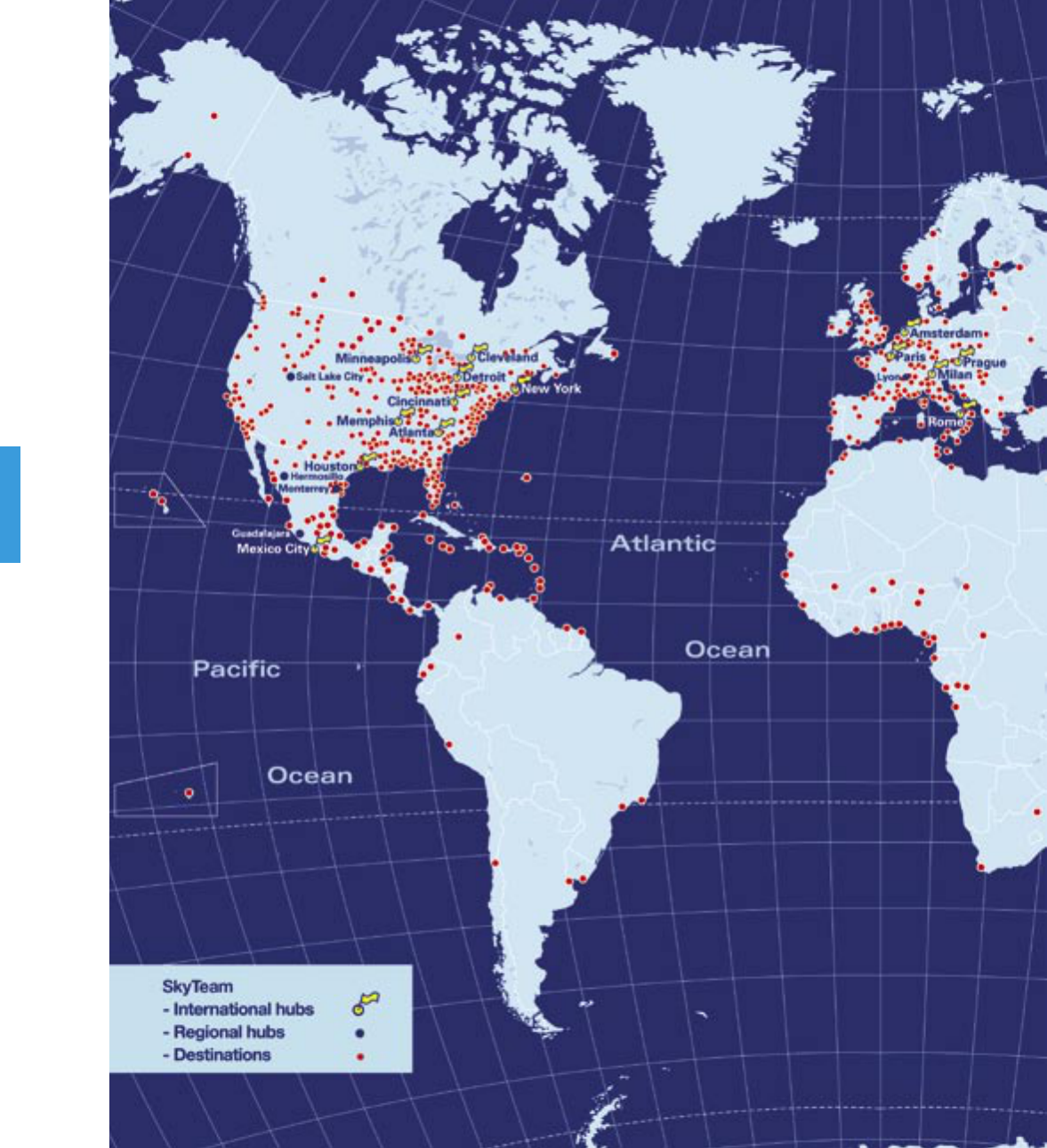
54
01-MAG UK.indd 54 11/07/05 13:46:49
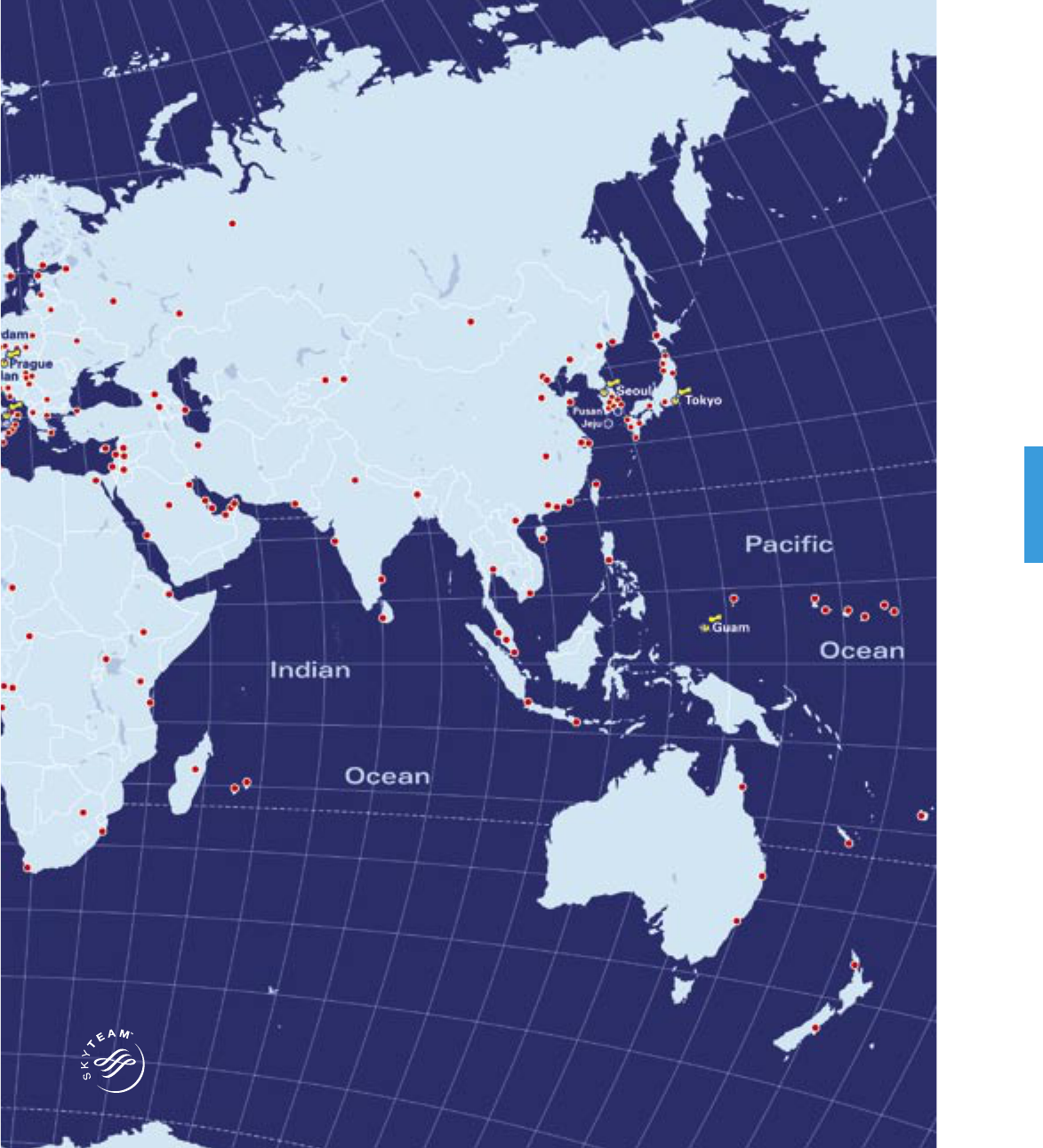
SkyTeam Network
July 2005
55
01-MAG UK.indd 55 11/07/05 13:46:51
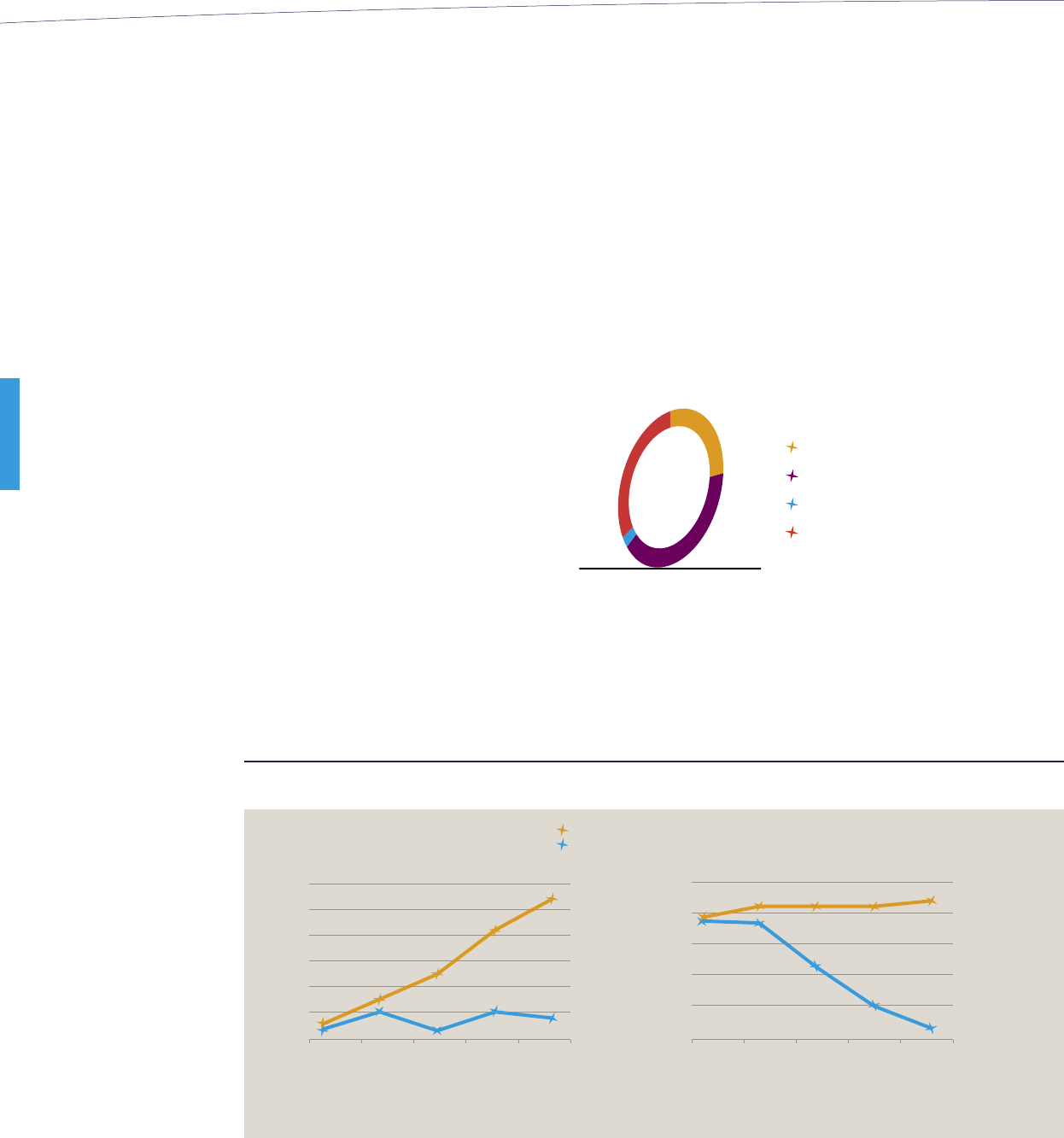
Air France-KLM group fleet
At March 31
st
2005, the Air France-KLM group fleet consisted
of 568 aircraft, including 551 planes in operation. There were
orders for 48 planes and options on 32 aircraft. 212 planes
were fully owned (37% of the fleet), 136 were under financial
leases (24% of the fleet), and 220 under operating leases
(39% of the fleet). In addition to the main fleet, there are four
aircraft operated by Air Ivoire, 3 are under financial lease and
1 under operating lease.
Air France and KLM made the same choice of long-haul
planes, selecting the Boeing B 747-400 ERF cargo, the
Boeing B 777-200 and Airbus A 330-200. While continuing to
manage separate fleets, these joint choices have accelerated
the dialogue between the two companies to define common
technical specifications for future aircraft in terms of flight
decks, engines and avionics. Only the cabins will be specific
to each company.
There are many advantages to joint specifications: they will
harmonize industrial strategies by preventing duplication of
skills and reducing inventories of maintenance parts, improve
training resources for flight deck crews and, in addition, ensure
more attractive commercial terms.
The regional fleet was inventoried, resulting in optimized
capacities by leasing KLM regional planes to City Jet (2 BAE 146)
and to Brit Air (2 Fokker 100). Future needs have been reviewed
to implement a coordinated action plan with aircraft companies,
engine and other manufacturers.
15
218
144
174
Long-haul
Medium-haul
Regional Fleet
Cargo
4-year plan
down flexibility
54,000
50,000
46,000
42,000
Summer 2005
Summer 2006
Summer 2007
Summer 2008
Summer 2009
36,000
32,000
28,000
Summer 2005
Summer 2006
Summer 2007
Summer 2008
Summer 2009
+4%
+2%
+2%
+2%
+3%
+2%
-1%
-1%
-9%
-16%
-20%
+2%
+1%
+8%
+15%
+20%
Long-haul fleet
(in number of seats)
Medium-haul fleet
(in number of seats)
Fleet management flexibility
Composition of the Air France-KLM group fleet
56
01-MAG UK.indd 56 11/07/05 13:46:52
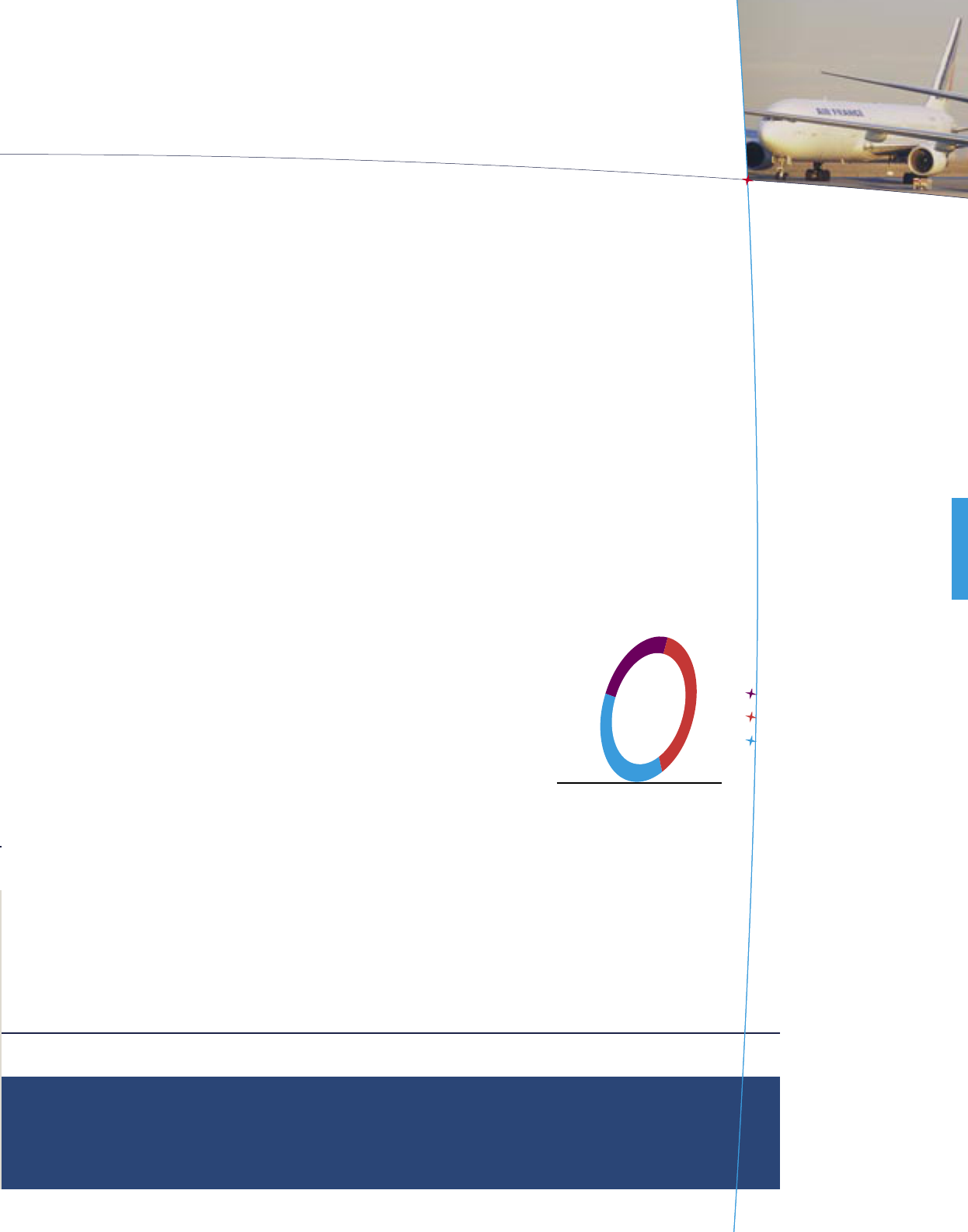
Professional magazine Airfinance Journal elected Air France-KLM as the ‘airline of the year’ in the ‘Deals of
the year award” . The trophy, awarded by finance people in the air transport industry. This award confirms
the positive perception of the merger by the American financial community.
Air France had already received a prize in 2004 awarding the securitization of a plane portfolio in its fleet.
Air France-KLM
“
Deal of the year
”
in the USA
57
Flexibility in managing the fleet is an important management
tool in a sector subject to considerable and rapid change.
It also allows adjustment to the fleet to adapt most closely to
the demands of the program. This flexibility is achieved either
through contract clauses that allow for the possibility, within
the limits of contractual notice periods, to adjust the schedule
of deliveries and/or modify the model delivered within a family
of aircraft, or through operating lease agreements, which are
renewable periodically and allow rapid adjustments in the size
or type of aircraft.
Thus, over the next four years, the fleet plan measured in
number of seats may vary upwards or downwards based on
needs compared with the situation in summer 2005. For the
long-haul fleet, the number of seats in summer 2009 may have
increased by 20% to match growth or by only 1% if there is
a slowdown in traffic. For the medium-haul fleet, the flexibility
will be between +3% and –20% of seats in summer 2009
depending on economic conditions.
In addition, the two companies are accelerating the
reorganization of their fleets under the combined effects of
very high oil prices and a weak dollar. Air France decided to
replace the Boeing B 747-200 and 300 in its Caribbean and
Indian Ocean network with Boeing B 777-300ER and the
cargo Boeing B 747-200 aircraft with Boeing B 747-400ERF
and Boeing B 777F. KLM decided to replace its Boeing B 767
300ER with Airbus A 330 and Boeing B 777-200. Air France
will complete these replacements in the summer 2010 and KLM
in summer 2009. On the basis of oil at USD 40 per barrel, the
decrease in the unit operating cost varies between 6% and
23% depending on the type of aircraft.
By renewing its fleet, Air France-KLM also reduces the impact of its
activity on the environment. For example, the Boeing B 777-300
are using 50% less fuel than the Boeing B 747-300 they are
replacing, the gas emissions and thus the impact on the greenhouse
effect are reduced. Besides, the Boeing B 777-300 generate six
times less sound energy than the Boeing B 747–200.
37%
24%
39%
Company-owned
Operating lease
Financial lease
A flexible fleet plan: a key asset
Financing of the Air France-KLM group fleet
(at March 31
st
, 2005)
01-MAG UK.indd 57 11/07/05 13:46:54

The regional division has a fleet of 133 planes with 100 seats or
fewer, with 121 in operation and 10 aircraft leased from third-party
companies. This fleet is primarily organized around four families:
the Embraer family at Régional, the Bombardier family with Brit Air,
the Fokker family at both Régional and Brit Air (capacity of 79 and
100 seats), and City Jet has a fleet of BAE.
The average age of aircraft in the operating fleet is 7.4 years for
Brit Air, 18.4 years for City Jet and 8.5 years for Régional.
The changes in the fleet over the period are as follows: for Brit
Air, 1 CRJ700 added; for City Jet, 2 BAE 146-300 from the group
were added to its fleet ; for Régional, 2 Fokker 70, 1 Fokker 100
(placed in operation on April 1
st
2005) and 1 ERJ 145 were added;
in addition, 1 EMB 120 was withdrawn from the fleet.
Investments in flight equipment came to 61.1 million euros for
the year. There were firm orders for 8 aircraft at March 31
st
2005,
without options.
The regional fleet
The new company Air Ivoire, a subsidiary of Air France, serves
Africa from Abidjan with 3 Fokker 28. During the year, it added
one Airbus A 321 to serve the Abidjan-Paris route. Following
the events in the Ivory Coast, this line was suspended and the
plane was subleased in March 2005.
Other fleets
The Air France group fleet
At March 31
st
2005, the Air France group fleet comprised
387 planes, including 254 in the Air France fleet, 133 in the
regional fleet plus 4 at Air Ivoire. 43% of the group’s fleet is
owned, 15% are under financial leases, and 42% are operated
under operating leases.
The Air France fleet
Air France operates a fleet of 254 aircraft, with 249 in operation,
including 147 medium-haul aircraft, 90 long-haul and 12 cargo.
The aircraft in the fleet have an average age of 8.6 years, with
6.6 for the long-haul fleet, 9.4 for the medium-haul fleet and
13.9 for the cargo fleet.
Over the year, 23 aircraft were added to the fleet and 14 were
withdrawn.
In the medium-haul fleet, 4 Airbus A 318, 4 Airbus A 319,
2 Airbus A 320 and 1 Airbus A 321 were added. One
Airbus A 320 and 9 Boeing B 737 (3 Boeing B 737-300 and
6 Boeing B 737-500) were withdrawn. In the long-haul fleet,
4 Boeing B 747-200 were withdrawn (2 passenger planes
and 2 cargo planes) and 12 aircraft were added, including
1 Boeing B 747-400 passenger plane, 1 Boeing B 747-400
cargo, 9 Boeing B 777-300 and 1 Airbus A 330-200. This
plane was previously stored and carried by an ad hoc company,
which was consolidated as the result of a change in accounting
standards. It was placed on line in April 2005.
Investments in flight equipment over the year came to 1.39 billion
euros (including advances on orders and capital maintenance
operations). At March 31
st
2005, there were firm orders for
31 aircraft and options on 21.
58
01-MAG UK.indd 58 11/07/05 13:46:54

59
The KLM group fleet
KLM’s regional fleet consists of 53 aircraft divided between two
families: Fokker and BAE. The average age of aircraft in the
operating fleet is 12.6 years.
Over the year, 2 Fokker 50 and 100 were added and 5 BAE
146-100/300 were withdrawn.
During the year, no investment was made for the regional fleet.
There is no option on aircraft intended for the regional fleet.
As of March 31
st
2005, the KLM group fleet included
181 aircraft, all of which are operational. There are orders
for 8 aircraft and options on 11. 24% of the planes are
owned in full, 43% under financial leases, and 33% under
operating leases.
The KLM fleet
The KLM fleet has 128 aircraft in operation, with 71 medium-haul
planes, 57 long-haul planes, which includes 17 Boeing B 747
passenger/freight combos and 3 cargo Boeing B 747-400 FR
planes. The average age of aircraft in the fleet is 9.6 years;
9.5 years for the long-haul fleet and 7 for the medium-haul fleet.
Six planes were added to the fleet and one was withdrawn
during the year. In the medium-haul fleet, 1 Boeing B 737-400
was removed and 1 Boeing B 737-800 and 1 Boeing B 737-900
were added. In the long-haul fleet, 4 Boeing B 777-200 were
added.
Investments in flight equipment over the year came to 261 million
euros (including advances on orders and capital maintenance
operations). At March 31
st
2005, there were firm orders for
9 aircraft and options on 11.
The regional fleet
01-MAG UK.indd 59 11/07/05 13:46:57

Air France regional fleet at 31 March 2005
Company-
owned
Finance lease Operating
leases
Total
In operation
2005 2004 2005 2004 2005 2004 2005 2004 2005 2004
Brit Air
Canadair Jet 100 2 2 11 11 6 6 19 19 19 19
Canadair Jet 700 2 1 9 9 - - 11 10 11 10
F100-100 1 1 - - 9 9 10 10 10 10
Total Brit Air
5 4 20 20 15 15 40 39 40 39
Régional
Embraer RJ 145 2 1 8 9 18 17 28 27 28 27
Embraer RJ 135 2 3 3 2 4 4 9 9 9 9
Embraer 120 7 3 3 3 3 8 13 14 10 12
Fokker 100 1 - - - 6 - 7 - 6 -
Fokker 70 - - - - 5 9 5 9 5 9
Beech 1900 6 6 1 1 1 1 8 8 - -
SAAB 2000 - - - - 6 6 6 6 6 6
Total Régional
18 13 15 15 43 45 76 73 64 63
City Jet
BAE 146-200 5 1 - - 12 14 17 15 17 15
Total City Jet
5 1 - - 12 14 17 15 17 15
Total
28 18 35 35 70 74 133 127 121 117
Air France fleet at 31 March 2005
Company-
owned
Finance lease Operating
leases
Total
In operation
2005
2004 2005 2004 2005 2004 2005 2004 2005 2004
Airbus A 340-300 8 8 6 6 8 8 22 22 22 22
Airbus A 330-200 4 3 1 1 9 9 14 13 13 12
Boeing B 777-200/300 16 14 4 2 14 9 34 25 34 25
Boeing B 747-400 8 9 1 1 7 5 16 15 16 15
Boeing B 747-200/300 7 7 - - - 2 7 9 5 9
Boeing B 767-300 1 1 - - - - 1 1 - -
Boeing B 747-200 Cargo 5 5 1 1 2 4 8 10 8 10
Boeing B 747-400 Cargo 1 1 - - 3 2 4 3 4 3
Long-haul fleet
50 48 13 11 43 39
106
98 102 96
Airbus A 318-200 9 5 - - - - 9 5 9 5
Airbus A 319-100 18 17 4 4 21 18 43 39 43 39
Airbus A 320-100/200 49 44 3 5 15 17 67 66 67 65
Airbus A 321-100/200 11 8 - 2 2 2 13 12 13 12
Boeing B 737-300/500 4 6 3 3 9 16 16 25 15 23
Medium-haul fleet
91
80
10
14
47
53
148
147
147
144
Total
141 128 23 25 90 92 254 245 249 240
60
01-MAG UK.indd 60 11/07/05 13:46:57

61
KLM fleet at 31 March 2005
Company-
owned
Finance lease Operating
leases
Total
In operation
2005
2004
2005
2004
2005
2004
2005
2004
2005
2004
Boeing B 777-200 - - 4 3 6 3 10 6 10 6
Boeing B 747-400 6 6 16 16 - - 22 22 22 22
Boeing B 767-300 - - - - 12 12 12 12 12 12
MD11 - - 8 8 2 2 10 10 10 10
Boeing B 747-400 Cargo - - 3 3 - - 3 3 3 3
Long-haul fleet
6 6 31 30 20 17 57 53 57 53
Boeing B 737-300 6 6 1 1 7 7 14 14 14 14
Boeing B 737-400 6 5 - 2 7 7 13 14 13 14
Boeing B 737-700 - - 4 4 5 5 9 9 9 8
Boeing B 737-800 6 6 20 19 4 4 30 29 30 29
Boeing B 737-900 - - 2 1 3 3 5 4 5 5
Medium-haul fleet
18
17
27
27
26
26
71
70
71
70
Total
24 23 58 57 46 43 128 123 128 123
KLM regional fleet at 31 March 2005
Company-
owned
Finance lease Operating
leases
Total
In operation
2005
2004
2005
2004
2005
2004
2005
2004
2005
2004
KLM Cityhopper
Fokker 70 18 16 - 1 3 3 21 20 21 20
Fokker 50 - - 6 6 4 4 10 10 10 10
Total KLM Cityhopper
18 16 6 7 7 7 31 30 31 30
KLM Cityhopper UK
Fokker 50 - - - - 6 6 6 6 6 6
Fokker 100 1 1 14 14 1 - 16 15 16 15
BAE 146 100/300 - - - - - 5 - 5 - 5
Total KLM Cityhopper UK
1 1 14 14 7 11 22 26 22 26
Total
19 17 20 21 14 18 53 56 53 56
Entrées de Chapitres UK.indd 13 11/07/05 13:48:03

E
nvironmental and
employment data
64
Employees and labor policy
74
Environment
80
First Air France-KLM sustainability report
Entrées de Chapitres UK.indd 10 11/07/05 15:41:31
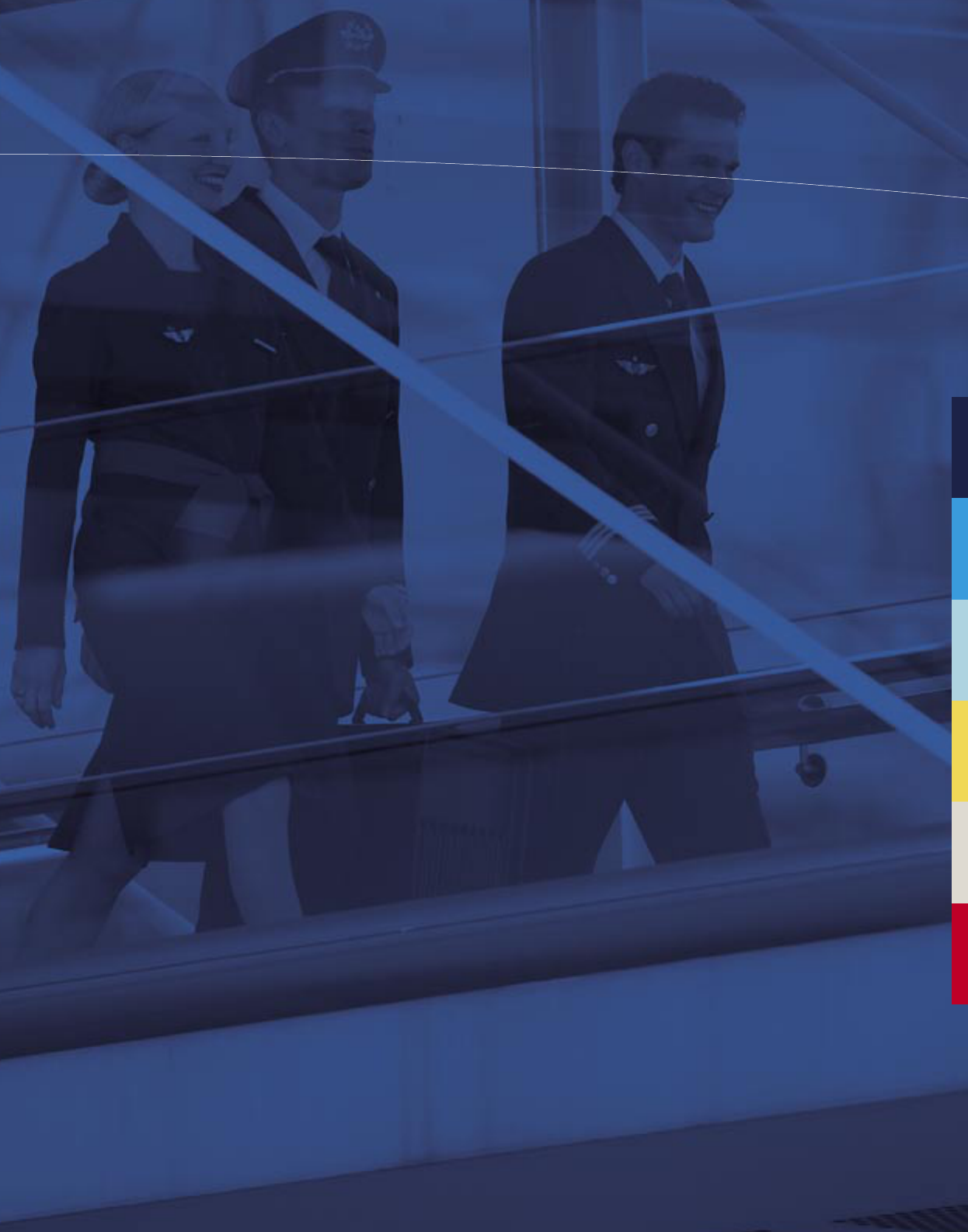
104
Financial report
202
Additional
information
82
Risks and risk
management
Entrées de Chapitres UK.indd 11 11/07/05 15:41:34
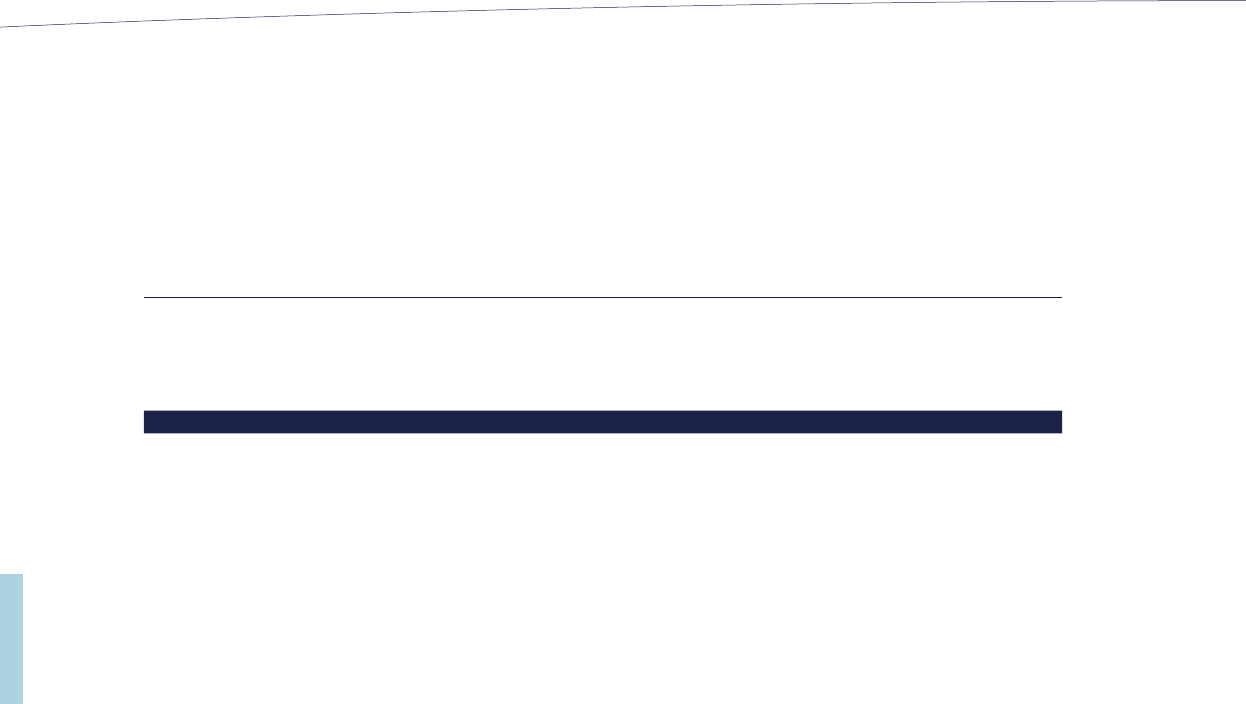
Employees and labor policy
Employees of the Air France-KLM group
The weighted average number of employees of the Air France-KLM group was 102,077 people for fiscal 2004-05.
Air France-KLM group
March 31
st
2004
proforma
March 31
st
2005 Change
Ground Staff 75,349 74,462 -1.2%
Cabin Crew
19,574 19,829 +1.3%
Cockpit Crew
7,799 7,786 -0.2%
Total
102,722 102,077 -0.6%
Because of the differences between Dutch and French social
legislation, and under the terms of the merger, each company
will pursue its own separate human resources management
policy while facilitating cooperation through a limited number of
initiatives, under a common Air France-KLM umbrella:
- Bridging cultures, through intercultural training sessions
to help managers work together and make the combination
effective.
- Group-wide social dialogue structures with the works
council representative bodies. An ad-hoc “Holding Forum”
took place in 2004 to frame exchanges until the special
negotiating body completes the creation of the European
Works Council in 2006. The members of the Forum are
representatives of the current employee representation bodies
at KLM and Air France. The Forum has already met twice to
discuss general issues and the Strategic Plan. Besides these
group structures, Air France and KLM will each retain their
own employee participation structures.
- Internal Perception Monitor. This initiative aims to monitor
employee assessment of the merger. A total of 2,090
Air France-KLM people answered the questionnaire during
the last quarter of 2004. They perceive the merger as positive
for both the airlines and their customers but express their
need to enhance their skills to work together with different
corporate cultures and languages. In addition, the group
asked the universities of Tilburg and Lyon to study over a
three-year period how the two independent airlines join forces
and implement synergies.
- Manager Exchange program. This initiatives allows talented
young managers, through exchange, to gain experience
during two years in one or two different positions in all core
activities at both airlines.
Air France Human Resources and Employment Policy
Air France is fully integrating human resources into the major
projects to change the company (Horizon and Diapason in
France Sales, Passenger Target and Aircraft Target in Ground
Operations, G1XL 2004 in Cargo, Latitude in IT systems, etc.) in
order to identify and assist the changes in the businesses and
skills. A «managerial approach» project was launched during
the year with the goal of defining and implementing programs
to develop the skills and management expertise needed to
direct future changes.
In 2004, Air France continued to pursue the policy to control
staffing and stabilize the work force. The total Air France
workforce fell from 59,458 to 59,296 full-time equivalent
between March 2004 and March 2005: 37,100 ground staff
(including 36,587 permanent employees), 12,406 cabin crew,
and 4,089 flight deck crew. Local personnel represented
5,701 people.
64
Entrées de Chapitres UK.indd 12 11/07/05 13:48:02

65
This control was primarily reflected in the priority given to
internal resources, specific hiring follow-up, and a special
emphasis on the policy of professional and geographic
mobility. For 2004, there were 1,176 new employees hired in
France: 637 ground staff, 152 flight deck crew, and 387 new
cabin crew. These figures were down from 2003 in all three
groups. At the same time, the year 2004 also saw a sharp
increase in retirements for ground staff to 737, up from
317 in 2003.
The first priority for the aviation sector is safety. Technical and
regulatory training (45% of the training programs) guarantee
that employees maintain the expertise required to perform
their jobs under the best safety conditions, for themselves
and for Air France customers.
The training policy is also one of the principal means to
ensure ongoing improvement in the organization and the
work and the quality of customer service. Expenses for the
2004-05 training program totaled over 200 million euros,
which is 9.5% of payroll. The training plan deals with all steps
in professional life and assists transfers. This year was also
marked by the application of the provisions of the law on
continuing professional training (professional development
period and contract, individual right to training). The
implementation of this law will not generate an increase in
the training investment.
Continuation of the contract policy and modernization of corporate dialogue
For several years, Air France has been pursuing a contract
policy with labor organizations. This policy is reflected, in
particular, in multi-year agreements: the «Accord Pour
Progresser Ensemble 2002-05» agreement for ground
personnel, the 2003-08 collective agreement for cabin
crews, and the 2003-2005 collective agreement for flight
deck crews.
In fiscal 2004–05, amendments to the two cabin and flight
deck crew agreements were signed. Two agreements
were with ground staff. Finally, the 2004-07 protocol for
all employees (ground and flight) concerning the exercise
of union rights was signed on March 8
th
2004, and an
amendment to the incentives agreement was signed on
September 30
th
2004.
In 2004, the company continued the work to develop
corporate conventions to replace the status of Air France in
May 2006 (a joint convention and 3 specific conventions for
each personnel category—ground, cabin and flight deck).
This work is conducted within the framework of a goals
and method agreement signed in January 2003 and all the
themes of this transposition are being discussed during a
number of meetings with the ground and flight crew union
organizations.
In fiscal 2004–05, a new division for the works’ committees
was set up. It is based on the organization of the company,
rather than on geographic location. There are now
8 Works Committees corresponding to the major divisions
of the company: France Sales, International Sales, Ground
Operations, Air operations, Industrial, Air France Cargo,
Information Systems, Headquarters and support. This new
organization is designed to allow the Works Committees to
play their full role in assisting in the modernization of the
company, and ensure consistency within each division. The
union elections of March 10
th
2005 were held in the context
of these new perimeters.
01-MAG UK.indd 65 11/07/05 13:47:00

Compensation and sharing the value created
This year, in accordance with the memorandum of understanding
on salary measures of April 9
th
2004 (Ground and Cabin crews),
the general measures represented an average increase of 2.1%,
plus individual measures (promotion, seniority).
Pursuant to the incentive agreement of September 26
th
2002
and its amendments, the results for the year ended March 31
st
2005 made it possible to pay 7.3 million euros in incentive-
payments distributed among all Air France employees.
In EUR million
Incentive-payments
(1)
Company’s contribution
(2)
Fiscal 2000-01 36.2 6.3
Fiscal 2001-02 29.4 4.6
Fiscal 2002-03 - -
Fiscal 2003-04 4.6 1.9
Fiscal 2004-05 7.3 -
(1) For the year indicated.
(2) The company’s contribution for a year is expensed in the following year.
In addition, as the State sold a portion of its stake in Air France-KLM,
as planned, current and former employees of Air France and its
subsidiaries were able to purchase shares of Air France-KLM
under preferential terms in February 2005. This acquisition was
executed within two mechanisms:
- the Offering Reserved for Employees (Offre Réservée aux
Salariés-ORS) of 8,414,273 shares, allowing the employees
to take advantage of various advantages offered by the State
and the company;
- the Wage for Shares Exchange (Echange Salaire contre
Actions-ESA) for 12,612,671 shares, giving employees the
possibility of accepting salary cut over six years in order to
receive a fixed number of shares in return.
Health and safety in the workplace
Expand safety and protect the health of its employees are major
requirements for the company. In 2004, the safety expenditures
made at Air France totaled
€18.2 million in France.
The number of work accidents with work stoppage was 3,029
in 2004 for Air France. The work accident frequency rate
(number of work accidents/number of employees * 100) dropped
from 5.91 in 2002 to 5.45 at the end of 2004, but this masks
certain disparities by employee category: Ground staff 3.56%;
Cabin crews: 12.12%; Flight deck crews: 2.15%.
At Air France, the absentee rate in 2004 was as follows:
4.2% for ground staff (3.4% excluding maternity), 10.5% for
cabin crews (6.6% excluding maternity leave), and 2.5% for
flight deck crews (2.3% excluding maternity).
66
01-MAG UK.indd 66 11/07/05 13:47:00

67
Social cohesiveness and respect for diversity
For several years, Air France has conducted an employment
policy based on integration through employment and a respect
for diversity. This policy is applied particularly in the following
five areas: equality for men and women, employment of
handicapped workers, seniors, employment of young people
and territorial employment.
Professional equality for men and women is the subject of a
specific agreement adopted in 2002. This policy is organized
on the basis of four major commitments: to develop the ratio
(the percentage of women has risen from 31% in 1991 to 41%
in 2004, from 26% to 36% for ground staff, from 63% to 65%
for cabin crews, and from 1% to 5% for flight deck crews), to
improve the balance between professional life and family life, to
promote equality of opportunity in career development, and to
perfect measurement indicators.
Under a specific agreement, Air France made a commitment in
1991 to initiate a program to hire people with a disability. As a
result of this voluntary policy, which includes hiring plans (31 new
hires in 2004) and training and information programs, Air France
exceeded the legal obligation in 2004 with an employment
rate of 6.2% (up from 2.9% in 1991), corresponding to 1,553
disabled employees.
Anticipating the rise in the number of employees over the age of
50, in 2002, the company signed the Accord Pour Progresser
Ensemble (APPE), an agreement designed to encourage
the development of professional opportunities to ensure the
successful second phases of careers. The training tools, career
assessments and professional interviews were increased in
2004. The end-of-career part-time mechanism (80% part-time
paid at 88%) was selected by nearly 80 employees.
Social responsibility
Air France is working to establish a dialogue with its various
social partners, is communicating about the wealth created
by its business, and is mobilizing to assist the regions where
it operates, particularly in jobs and economic development.
Air France continues to play a dominant role in local
employment in the Roissy and Orly areas, where it is the
largest employer. The company employs more than 48,000
people in Ile-de-France, through its commitment to various
partnerships intended to facilitate information, training and
employment for the young residents of the surrounding
communities.
For a number of years, Air France has paid particular attention
to the employment of young workers. About 400 trainees
are welcomed every year, 90% of whom receive permanent
employment in the company. Internships represent one-
third of new employees with permanent contracts and are
covered by a charter negotiated with the social partners and
has been systematically renewed since 1997.
Air France was involved in the initiative to create several
organizations, which it actively continues to support: the
Jérémy association of nine companies at Roissy – Charles-
de-Gaulle promotes the hiring of young job seekers from
the area by combining formal and on-the-job training;
Afmaé, which creates a pool of expertise and qualification
programs in aviation through the Apprentice Training Center
(CFA) and, finally, the AirEmploi association, which provides
information and assistance in the training required to enter
the airline industry. The company also participates in several
local organizations to develop jobs, such as the GIP Emploi
Roissy-CDG.
In its second year of existence, the «Pays de Roissy-CDG»
association, the mission of which is to help the area take
advantage of the wealth generated by the air industry, now
has nearly 200 members - both socio-economic players and
local residents. Its achievements include the signature of
a tripartite agreement signed by the association, financing
participates and a housing operator.
In Africa, Air France has initiated a project to transfer skills
in Bamako with the African Institute of Aviation Businesses
(IAMA). The first cornerstone was laid in March 2005.
In line with its commitment to the principles of the UN Global
Compact, which it signed in April 2003, Air France promotes
a policy of social responsibility with its subcontractors
and suppliers. Since September 2004, the company has
implemented a Sustainable Development Charter which is
attached to its bid tenders. This procedure is being tested for
one year and will allow Air France to determine for the future
the relevant criteria and procedures for its suppliers which
01-MAG UK.indd 67 11/07/05 13:47:01

are consistent with its goal to improve their environmental
and social standards. In addition, the first experiments were
conducted to move certain purchases to local suppliers.
Air France has been involved for a long time in assisting
disadvantaged groups, particularly children. The Air France
Foundation, created in 1992 to assist children who are sick,
disabled, or living in poverty or danger, financed 34 new
projects in France, Angola, Peru and Romania in 2004. Last
year, the Foundation created the network of «Friends of the
Foundation» with 1,500 employee members, a structure
intended to enhance the humanitarian commitment of our
employees.
Air France has also supported for many years «Aviation
without borders», a group that provides transport logistics
for medication and sick children and which has partnered
since 1999 with the French National Health Institute (Inserm)
to provide humanitarian assistance to children suffering from
serious illness by providing free travel for consultation and
treatment in specialized centers, often a long way from their
homes.
KLM Human Resources policy in 2004-05
As one of the largest employers in the Netherlands, KLM
employed, at December 31
st
2004, a workforce of 28,105. A
little over 25,000 worked in The Netherlands and around 2,700
abroad. The population in The Netherlands comprises 10,151
women and 15,226 men with a part-time percentage of 35%.
In KLM’s subsidiaries worked about 6,500 people on a long-
term contract.
Fiscal 2004-05 was a transitional year. The ‘structural
measures’ program of 2003-04 is still being implemented.
The program led to the loss of 4,500 jobs. Some of the staff
left of their own accord, some positions were not filled when
they became vacant, fixed-term contracts were not renewed,
agency staff was not hired and a limited number of positions
became redundant. For the last group, KLM set up the ‘Work
to Work’ Center to help staff during a period of one year to find
alternative employment. As of January 1
st
2005, the Center had
mediated on behalf of 548 employees. More than two third of
them have been relocated either internally or externally.
A further 150 people are currently taking part in the ‘Work to
Work’ process.
While this process was still ongoing, operations began to
grow slowly in mid 2004 due notably to the merger with
Air France. More people were needed for ground services and
in the cabin and cockpit, in departments were there had been
no redundancies. Surplus staff could therefore not always fill
the vacancies. KLM therefore took the necessary decisions
and adopted a transparent communication.
KLM’s human resources strategy has two main dimensions.
One is to improve employee satisfaction by accommodating for
more individualism i.e. personal development, job opportunities,
paying attention to people’s well being and health. The
second is to create competitive labor cost levels by increasing
productivity and managing people-related costs.
68
01-MAG UK.indd 68 11/07/05 13:47:02

69
According to this strategy, the efforts in this direction are
translated into five main areas of thrusts:
Flexibility
- Broaden the set of tasks that people can perform
- Build more flexibility into contracts
- Allow for more flexible working-hours, especially in rosters
Mobility
- Stimulate mobility, both within the company and out of the
company
- Encourage personal development and learning (KLM Academy
and e-learning)
Simplification
- Standardize HR procedures
- Facilitate self-service (e-HR)
Health
- Increase mobility where jobs are physically extremely
strenuous
- Increase attention for preventive measures (e.g. exercise,
healthy food)
Diversity
- Improve flexibility to cater for the elderly and handicapped
- Stimulate a culture that will result in more women in senior
management positions
- Encourage the participation of ethnic minorities.
Initiatives will be aligned with KLM’s core values: Reliable,
Dynamic, Committed and Team spirit.
These issues are also important subjects in the current CLA
negotiations.
Social dialogue
Within the framework of its savings and cost-cutting program
‘structural measures’, KLM and the unions agreed on June
14th, 2004 on a new collective agreement for a period from April
to December 2004. Under the terms of this new agreement, a
bonus of 1% of the annual salary was paid to KLM ground staff
in August 2004. Because the budget objectives for the first half
of 2004-05 were achieved, a further bonus equal to 0.75% of
annual salary is paid in November 2004.
In 2004 the Dutch government has taken initiatives in many
policy fields that have made welfare benefits more austere,
and changed the implementation of welfare schemes through
privatization. These measures have led to rebalance the need
for cost control and employee satisfaction. This is an important
pillar in the collective bargaining round in 2005.
Health and security at work
The average rate of absenteeism decreased slightly in 2004
to 6.0% (6.1% in 2003). The number of new incapacity benefit
claimants fell further in the past fiscal year. The downward
trend is expected to continue in 2005. The active stance taken
by managers and the individuals will be continued.
KLM has recently decided to integrate occupational safety
and environment into the safety and quality assurance policy
at the highest level in the KLM organization. In the field of
occupational safety the risk of accidents is being reduced by
embedding compliance with health and safety rules more firmly
in the organization. The system requires the environment to
encourage safe behaviour by not accepting unsafe working
conditions. That role and responsibility are clearly placed with
the management. The right structure, procedures and climate
are already in place. Industrial accidents and other incidents
are reported, analysed and action is taken where necessary. In
2004 there were no fatal injuries involving KLM employees or
contractors.
01-MAG UK.indd 69 11/07/05 13:47:03

Social responsibility
As a company that is alive to Dutch and international social
considerations, KLM also provides educational and development
opportunities for young people and children in developing
countries. In 2004, KLM spend nearly €350,000 on social and
charity expenses.
Since 1999 KLM has participated in aid programs for less
fortunate children through its AirCares program. Every quarter,
KLM allows a selected project to use its communication
channels to reach a large international audience. Through the
KLM media, including the in-flight video and in-flight magazine,
passengers are asked to donate cash or frequent flyer miles to
the charity selected.
The four projects selected in 2004 were:
- Close the Gap International, an organization that collects and
refurbishes used computers from businesses and uses them
in educational projects in Africa.
- Right to Play, an organization set up by former Olympic
skating champion Johan Olav Koss to provide children in
refugee camps with sport and games training.
- UNICEF, the UN Children’s Fund, which collected donations
for the child victims of the earthquake in Bam, Iran.
- Coco, an initiative of former Olympic champion Steve Cram
to open a care home for orphans with Aids.
Just days after the tsunami hit Southeast Asia at the end
of December, KLM AirCares decided to provide help in two
phases. Immediately after the disaster, support was provided
for emergency aid. KLM Cargo carried goods free of charge or
at cost for the Dutch Interchurch Aid organization. In addition,
staff working for this organization was allowed to take surplus
baggage free of charge. In April 2005 an orphanage will be
adopted in Medan, Indonesia, for handicapped victims of the
tsunami. AirCares is working on this with Wings of Support
(the voluntary charity organization set up by KLM’s staff), Pilots
Without Borders (an organization of pilots from various airlines
who use their professional knowledge to provide logistics
assistance) and the Liliane Fund/ Sharing Success.
Many charities also raised funds and recruited donors during
the Open House in October 2004.
Over the past five years, KLM AirCares has raised nearly
€500,000 and more than 32 million airmiles.
In compliance with European guidelines KLM keeps detailed
records of cosmic radiation and informs all crew about their
individual exposure on a monthly base. In 2004, approximately
9,500 records, were below two third of the Dutch (and
European) maximum allowed annual dose.
KLM sponsored an endowed chair in working conditions at
the Free University of Amsterdam for several years. Through
occupational health services, employees and employers in
the Netherlands and abroad benefit from the education about
work and health provided by the University and the research
conducted. A research project conducted at KLM in 2004 led
to a treatment for lumbar problems that considerably reduces
time off work.
70
01-MAG UK.indd 70 11/07/05 13:47:04
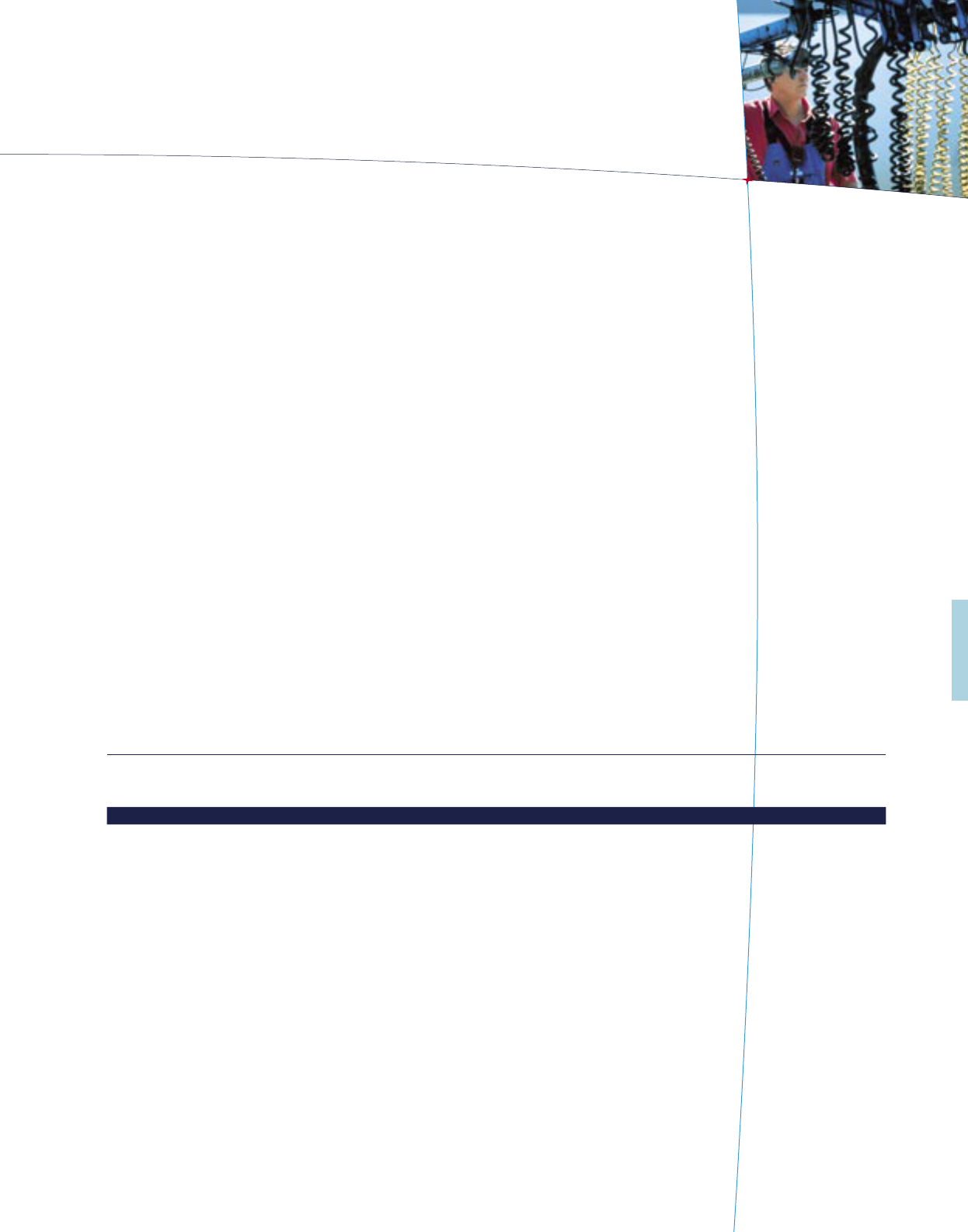
71
Social report
Reporting coverage
For Air France, most of the numeric data concerning the
workforce in France are drawn from the Social Report, which
uses the calendar year as its basis and therefore refers to the
twelve months ending 31
st
December 2004. Data concerning
Air France subsidiaries are gathered by consolidating data
from the nine most important companies employing a total
of around 10,000 staff. These data do not take into account
23 small companies which together employ almost 1,950 staff.
Air France subsidiaries do not constitute an entity, either from
the point of view of group organization (principle of independent
management of subsidiaries), or from that of their activity.
KLM’s standard reporting coverage is over fiscal year
April – March. Shown figures in this report are recalculated
to January – December. The information shown is drawn
from financial systems, the salary system/ Social Dashboard
in KLM.
Headcount
Total Air France-KLM group headcount with permanent employment contracts amounts to 108,051 staff including 73,405 for
Air France group and 34,646 for KLM group as at 31
st
December 2004:
Employees
number on
31
st
Dec. 2004
Air France-KLM
group
Air France
in France
(2)
Air France
outside
France
Air France
Subsidiaries
KLM in the
Netherlands
(1)
KLM
outside the
Netherlands
KLM
Subsidiaries
Ground Staff
76,942 39,206 6,181 8,665 15,649 2,728 4,513
Cabin Crew
22,820 13,483 99 671 7,458 - 1,109
Cockpit Crew
8,289 4,187 0 913 2,270 - 919
Total 108,051 56,876 6,280 10,249 25,377 2,728 6,541
(1) Incl. KLM Cityhopper cockpit- and ground staff
(2) Including 388 expatriates
01-MAG UK.indd 71 11/07/05 13:47:05
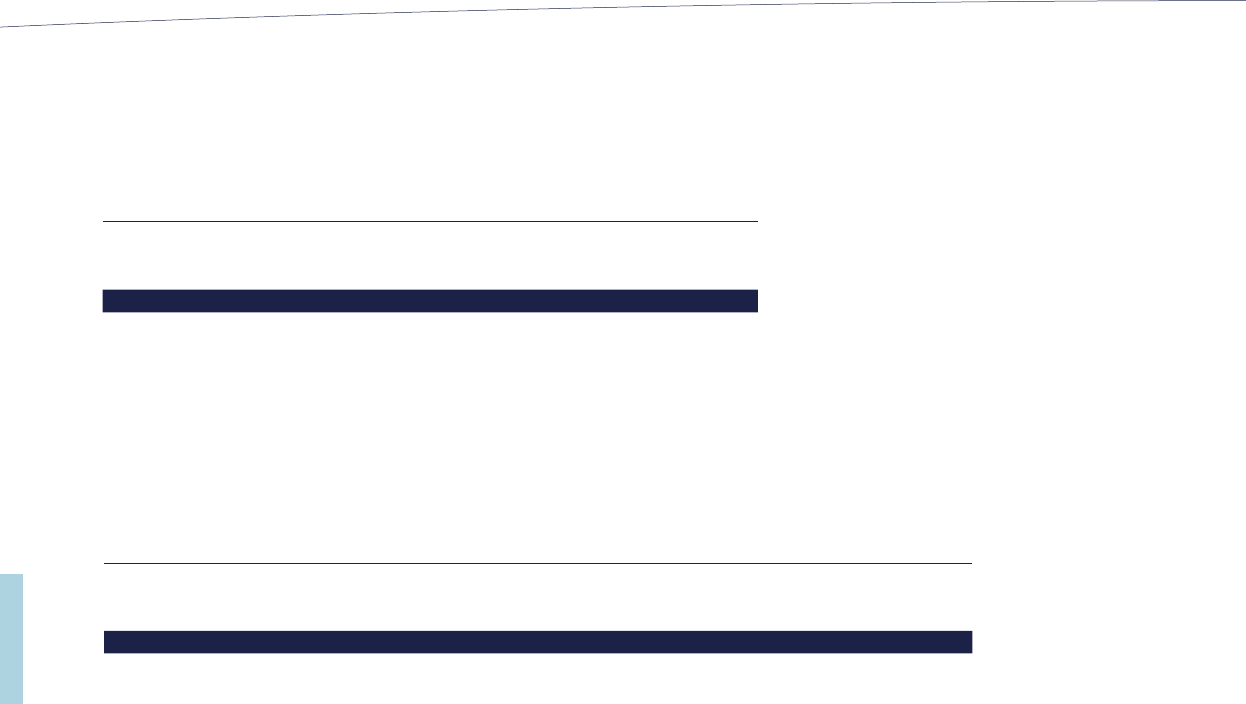
In 2004, the leavings in France and the Netherlands are distributed as followed:
Air France-KLM group
in 2004
Number of leavings in France and in The Netherlands
(1)
Retirements Redundancies
(incl. economic)
Resignations Deaths
Ground Staff
865 270 404 78
Cabin Crew
200
6
208 15
Cockpit Crew
139 58 5 5
Total
1,204 334 617 98
(1) long term contracts
Air France-KLM group appeal to temporary staff, employing a total of 2,651 full time equivalents per month on average
(1,777 for Air France and 874 for KLM).
Working time organization
At Air France, working hours are as follows:
- Ground staff: 35h per week
- Cabin crew: 75h of flight per month
- Pilots: 75h of flight per month.
At KLM, the three CLA’s (Ground Staff, Pilots and Cabin Crew)
are all based on a workweek of 40 working hours in 5 days.
The Air France-KLM group has also implemented specific
measures to help employees reconcile personal events or
projects and their career development: parental leave, part-time
working and so on. An analysis of the distribution of part-time
among the different populations reveals significant differences.
At Air France group, part-time employees total 12,015: 10,307
work in France (18% of total workforce), 938 are local personnel
(15%) and 770 at the subsidiaries (8%). Among those within
Air France, part-time staff account for 15% of ground staff
(included progressive pre-retirements), 30% of cabin crew and
13% of pilots.
At KLM in the Netherlands, part-time employees total 8,882
(35%), distributed as follows: 4,216 (28%) of ground staff,
4,112 (52%) of cabin crew and 554 (23%) of pilots.
In 2004, the policy of limiting and stabilizing staffing levels for Air France-KLM group was continued.
Number of recruitments in 2004
(1)
Air France-KLM group total
(worldwide)
Ground Staff
2,170
Cabin Crew
1,083
Cockpit Crew
258
Total
3,511
(1) long term contracts, excluding KLM subsidiaries
72
01-MAG UK.indd 72 11/07/05 13:47:05

73
Men - Women equality
For several years, the Air France-KLM group has pursued a
social policy based on integration through respect for diversity.
The proportion of female employees in the Group has been
rising for several years. Women accounted for 44% of the
total in 2004 (42% at Air France group and 51% at KLM in the
Netherlands).
At Air France-KLM, there are no significant differences
between the salaries paid to men and women in equivalent
jobs, in equivalent seniority and in equivalent working time
organization.
Disabled staff
At Air France, the employment rate of handicapped workers
was 6.2% and at KLM, the percentage of handicapped workers
was 5.4% on 31
st
December 2004.
01-MAG UK.indd 73 11/07/05 13:47:07

Environment
Environmental issues have been high on Air France’s and KLM’s
agendas for long. The Group is committed to continuously im
-
prove its environmental performances in order to conciliate the
growing demand for air transport with the need to protect our
planet’s future.
Environmental Management
Organization
Each airline has its own organization managing Environment.
Air France set up an Environment and Sustainable Development
Department which is responsible for the Environmental policy of
the company. It is its responsibility to enforce this policy for air
operations and to cross-functionally oversee ground operations
carried-out in the other Departments of the company.
Those Departments are responsible for applying the company’s
environmental policy via a dedicated action plan ensuring
regulatory compliance of their activities and for limiting their
environmental impact.
KLM establishes it’s environmental policy at the Management
board level and this policy is put into practice via annual
environmental programs. At the highest level, a member of the
Board of Managing Directors is responsible for environmental
issues. Every organizational unit has an environmental liaison
officer to coordinate environmental issues and advise the line
management. The Environmental Services Department acts as
Corporate Environmental Center to assist the Board of Managing
Directors and the organizational units. It also monitors internal
and external developments relating to the environment.
Line management ensure that sufficient information and training
opportunities on environment are available, which is annually
checked on KLM side as part of its ISO 14001 certification. An
effort is on-going at Air France to harmonize this local training
throughout the company.
Environnemental evaluation or certification programs
KLM is ISO 14001 and EMAS certificated.
Air France is committed to an environmental management
obeying the ISO 14001 rules, consistently with its QSE
(Quality-Safety- Environment) program.
Orly (engineering and maintenance department) and Le
Bourget sites of Air France Industries are already ISO 14001
certificated. The sites in Toulouse-Blagnac (in 2005), Villeneuve-
le-Roi (in 2005), Roissy (2006), Orly (surface treatment of the
engine activity in 2006) will soon be certificated. Air France
Industries retains its objective to have 70% of its sites ISO
14001 certificated by 2006.
A preliminary audit of stations in metropolitan France is
currently under way at Air France Operations. This internal
assessment programme will enable to take overall stock of
the situation and to launch an appropriate action plan in the
framework of regulatory compliance.
Similarly, Air France Cargo has embarked on a review of its
various sites during the present fiscal year designed to draw
up environmental assessments for summer 2005.
Air France Industries’ CRMA subsidiary has been ISO 14001
certificated since 1999. Servair (catering) has deployed a
system of preliminary environmental diagnostics at its sites.
Its ACNA cleaning subsidiary has also embarked on an ISO
14001 program.
74
01-MAG UK.indd 74 11/07/05 13:47:07

75
Measures designed to guarantee an activity’s compliance with legal and regulatory requirements
Air transport is subject to a wide range of national and
EU regulations.
Air France is duty-bound to exhaustively monitor the legal
and regulatory texts impacting its activity. At present, each
individual company sector monitors regulatory developments
on a limited basis with respect to issues directly concerning
it. To ensure greater consistency within the company and
guarantee exhaustive coverage of the regulatory corpus, it has
been decided to set up a centralized (but locally accessible)
monitoring tool, to be carried out by the Huglo Lepage
consultancy, which specializes in environmental law.
As part of its ISO 14001 system, KLM has extensive procedures
to identify amendments to legislation or regulations that might
be relevant for KLM’s operation. If KLM implements process
changes the competent authority are notified to check if the
environmental licenses need revision
Environmental Risk Management
Air France set up a Risk Management and Environmental
Protection unit within the QSE (Quality-Safety-Environment)
Department. It has a cross-functional remit and it is underpinned
by a network of coordinators.
Activities of the Industrial Department that generate risks that
could have a significant environmental impact are monitored
via a three-year action plan designed in particular to stay
abreast or ahead of regulatory developments. Risks are initially
identified through audits or inventory programs. A mapping is
established describing the risks’ parameters: gravity, frequency
of occurrence and detectability.
KLM has two systems to manage risks. First, ISO 14001 pro-
actively identifies risks and required action because of the
execution of audits, management reviews and the regular
update of all environmental registers.
Further, KLM applies a company wide risk management system.
Every quarter, risks are inventoried KLM wide, the likelihood
and impact assessed and the proposed action is discussed at
Board level.
Amount of environmental risk prevention provisions and guarantees
None.
01-MAG UK.indd 75 11/07/05 13:47:10

Amount of indemnities paid and actions carried out to repair environmental damage
The Air France-KLM group is liable for the “noise” tax at
Amsterdam and France’s ten main airports.
From April 2004 to March 2005, Air France paid out 8.5 million
euros in noise tax, of which 7.9 million euros for its activities in
the Paris region.
Air France takes part in the Environmental Advisory Committee/
Advisory Committee for Resident assistance, responsible for
ensuring that the funds collected under the noise tax are put
to the most effective use so that residents in designated noise
areas are properly sound-proofed as rapidly as possible. The
company supports the program which is designed to optimise
protection around airport zones, while doing its utmost to
restrict the inflow of additional residents in zones where noise
pollution from airports is deemed penalizing.
This year, Air France also deposited 72,000 euros for its
infractions to the Environmental Protection Volume policy
which regulate the trajectory deviations in the vicinity of French
airports and for its infractions to night departures policy. During
2004-05, Air France was not convicted to pay any indemnity by
any decision of justice linked to environment matters.
The main action carried out to repair pollution related to ground
activities regards the clean-up of the Air France Industries
Montaudran site, which has been vacated after more than
five decades of maintenance activity. In conjunction with the
Toulouse DRIRE (Regional Industry, Research and Environmental
Agency) Air France carried out preliminary studies and is
financing soil rehabilitation work. Most of 2004 was devoted to
carrying out studies on pollution identified on the northern part
of the maintenance site and the possible related risks.
The overall clean-up program, describing the technical solutions
to deal with the problems flagged, was presented to the DRIRE
in April.
In parallel, the ground water is being continually monitored in
the southern area of the site. The measured content of the
main pollutants is, to date, below the regulatory thresholds.
KLM publishes annually an overview of the environmental costs
on internet (www.klm.com/sustainability). The main costs items
are extra fuel consumption due to noise procedures, waste
disposal and costs of KLM’s environmental staff.
Soil use conditions and measures to limit environmental damage
Air France’s property department has newly adopted the
precautionary principle. From this year onwards, before any
new construction on a site, sub-soil samples will be taken to
check for the possible presence of underground pollutants. This
principle guarantees that future buildings and their occupants
will be safe from possible health risks that could otherwise have
emerged over time.
In a related development, Air France, although a tenant on
most of its premises, has decided to apply the latest regulatory
recommendations applying to owners on their asbestos. An
appropriate technical document for asbestos has been issued
for each of the 356 buildings it occupies and expertises are in
process. They will finish by the end of 2005.
KLM has remedied all relevant soil or ground water
contaminations outside buildings. Where the remediation has
been partial, containment measures have been implemented and
are functioning properly. KLM has no obligation to perform soil
investigations under the floors of buildings. In the Netherlands,
the levels of allowable contamination and remediation for soil
or groundwater are determined on the basis of possible risks
for humans, ecology or environment. Different use of terrain
has different remediation obligations and levels. If remediation
is deemed necessary by the authorities they will usually allow
this to be combined with building activities.
76
01-MAG UK.indd 76 11/07/05 13:47:10

77
Main environmental indicators
Ground operations (99% of continental France premises and 95% of Netherlands premises)
From April 2004 to March 2005, the Air France-KLM group
continued to reduce its environmental impact on all its operating
sites (maintenance and operational sites) by integrating
environmental impact management to its industrial processes.
Air France has been committed for long to promoting selective
sorting at source (to date, 90% of its sites have implemented
this), limiting the volume of waste it generates, and building
environmental impact management into its industrial
processes.
KLM concluded in 2005 a second Multiyear Energy Agreement
on the energy efficiency of its buildings with the Ministry of
Economic Affairs and local authorities. Since 1989, KLM
has actively sought energy saving and has raised its energy
efficiency by 45%. During 2004-05, KLM achieved a 31%
separation rate for its industrial waste.
Air France-KLM group consumption
and waste indicators
GRI
Article
FY 2004 FY 2003 Change
like-for-like
Total water consumption (m
3
) EN5 1,057,786 1,168,613 -9.5%
Total electricity consumption (MWh)
EN3 367,386 354,399 +3.7%
Energy consumption (MWh)
Superheated water
EN4
406 004
(1)
156,371
388,902 -3.8%
Iced water 3,020
DFO
EN3
10,204
Gas 236,409
CO
2
emissions from heating plants linked
to energy consumption (tons) EN8 31,681 33,130 -5.8%
Total quantity (tons) of ordinary industrial waste
EN11 48,960 49,144 -0.4%
Total quantity (tons) of hazardous waste EN11 4,452 4,371 +1.9%
Volatile organic compounds contained
in products used (1000 tons)
EN8 262 276 -5.1%
Raw materials consumption (1000 tons) EN1 0 0
Persistent organics compounds emissions 0 0
Toxic metals emissions
Not available Not available
(1) Includes Servair’s energy consumption (31,910 MWh) that was not provided last year.
{
}
}
01-MAG UK.indd 77 11/07/05 13:47:12

Waste water (for Air France only)
Emissions
Air France-KLM group indicators 2004-05
(1)
2003-04 Change like-for-like
Fuel consumption (000 tons)
(2)
7,645 7,315 4.5%
Total emissions (000 tons)
(2)
CO
2
24,147 23,080 4.5%
NOx 120.26 112.05 7.3%
CO 12.96 12.40 4.5%
HC 3.40 3.82 -11.1%
Of which low altitude emissions
(< 3000 ft) (000 tons)
(3)
CO
2
1,592 1,560 +2.1%
NOx 6.7 6.4 +4.1%
CO 5.8 5.9 -2.2%
HC 1.1 1.1 -0.5%
(1) Figures on a calendar year basis for Air France, and on a IATA year basis for KLM
(2) Doesn’t include Air France subsidiaries. Includes KLM subsidiary Cityhopper
(3) Includes Air France subsidiaries turbojets and KLM subsidiary Cityhopper
The Air France-KLM group has restricted the rate of increase
in its carbon dioxide (CO
2
), emissions (a greenhouse gas) to
only a portion of the rate of growth in its passenger traffic. This
has meant a reduction of 22% per kilometre and per passenger
since 1991 for Air France. This result is the outcome of initiatives
in three areas:
- Fleet renewal, which has led to a reduction in specific carbon
dioxide emissions of around 2% per year;
- Networks optimisation, with the organization of Paris-CDG as
a hub, thereby improving seat-load factors;
- Operational measures such as the reduction of loads.
Other measures, such as the shortening of approach and
climbing paths following a reorganization of Paris air space in
2002 helped as well.
Flow and organics from 1
st
January 2004 to 31
st
December 2004
FLOW SS COD DBO5 Total Nitrogen Phosphorus
116,723 m
3
18,493 mg 43,606 mg 2,744,094 mg 93,732 mg 372,083 mg
Phenols Index Fluorures Nitrites Cyanides Organic Compounds of CI
32,322 mg 60,733 mg 19,821 mg 826 mg 2 mg
Metals from 1
st
January 2004 to 31
st
December 2004
Cr VI Cr III Cr Total Cd Ni Cu
3,734 mg 860 mg 5 811 mg 2,332 mg 24,179 mg 25,507 mg
Zn Sn Pb Fe Al Fe+Al
49,731 mg 19,173 mg 7,863 mg 12,730 mg 178,376 mg 233,505 mg
78
01-MAG UK.indd 78 11/07/05 13:47:12

79
Noise energy
Air France-KLM group indicators FY 2004 FY 2003 Change like-for-like
Global
Global noise energy indicator (1012 kJ)
(1)
1.81 1.87 -2.9%
(1) Dataset includes Air France subsidiaries and chartered flights and Cityhopper for KLM. This dataset was computed on a calendar year basis for
Air France and on a IATA year basis for KLM.
Since 1997, Air France has pursued a policy of reducing the
number of flights at Roissy-CDG between midnight and 5am.
In 2004-05, Air France maintained its efforts to minimize non-
scheduled departures during this period.
The Air France-KLM group aims for continued growth without
increasing the overall noise energy generated. Until now this
ambitious objective has been achieved as a result of substantial
investment in fleet renewal.
This year again, the traffic rose by 2.4% whereas the global
noise energy decreased by 2.9%.
01-MAG UK.indd 79 11/07/05 13:47:13
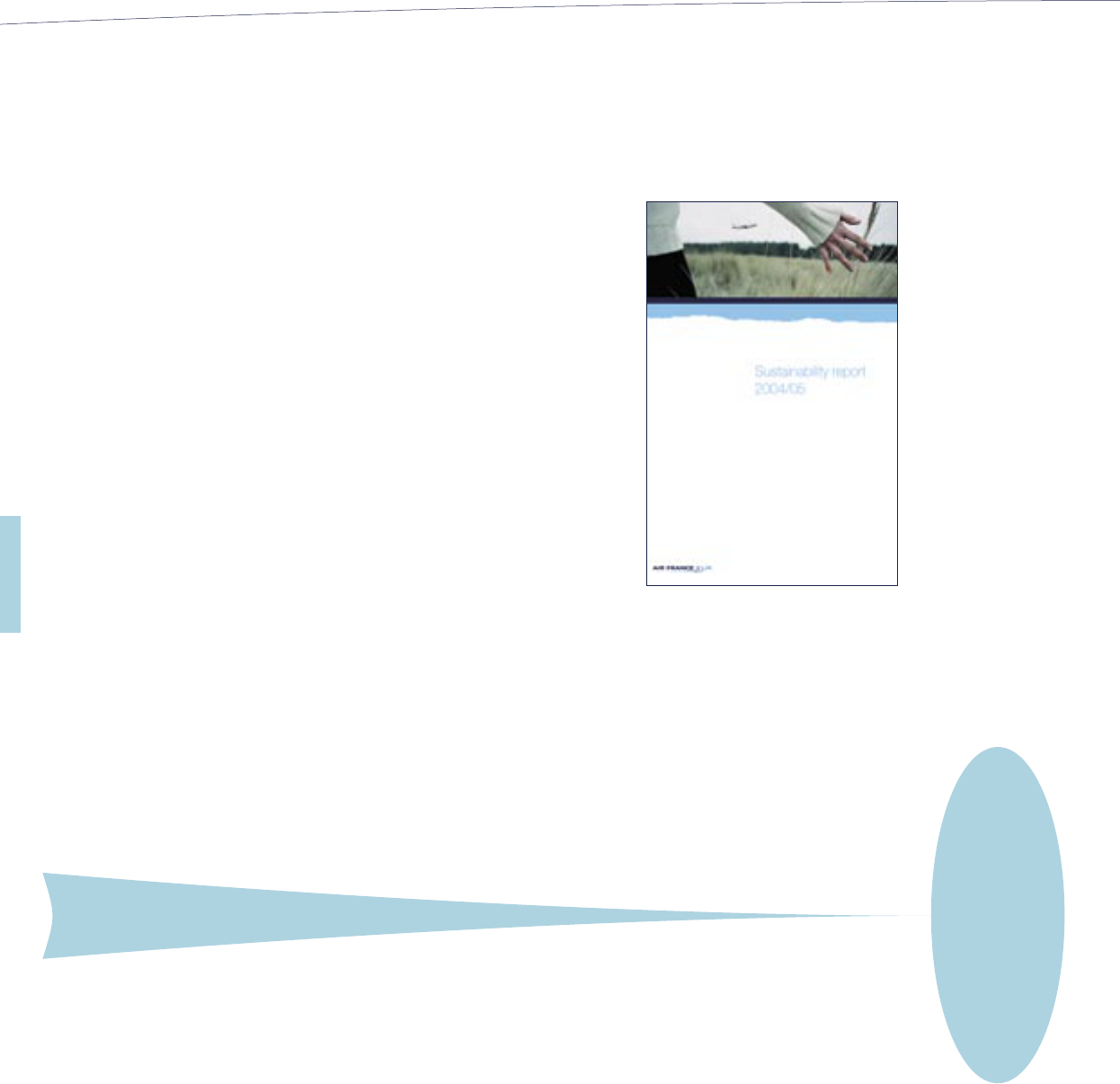
First Air France-KLM sustainability report
A commitment anchored at the core of both companies
The air transport business has an impact on the economy,
society, and the quality of the environment. Air France and KLM’s
awareness of all these problems is reflected in a steady
commitment to sustainable development.
Air France and KLM share the same vision for their economic,
employment, social and environmental responsibilities: the two
companies must achieve their commercial objectives while
respecting the interests of future generations. The actions of
the two companies and the results achieved, which have been
published by both Air France and KLM in environmental and
sustainability reports since 1996, attest to this commitment.
The publication for fiscal year 2004-05 of the first joint
sustainability report again highlights the place of sustainable
development at the very core of the Air France-KLM strategy.
Air France–KLM
2005
• Integration
in FTSE4Good
ethical index
• KLM to sign
United Nations
Global Compact
1986
1990
1993 1996 1999
2000
2001
2002 2003
2004
• KLM’s 2nd waste
and wastewater
treatment faciliy
• Environmental
position paper,
launch of KLM’s
environmental
management team
• Industry award
E&M for environ
-
mental leadership
• 1
st
environmental
report
• ISO 14001
certificate for all
operations in the
Netherlands
• Corporate
environmental
management
center
• Launch of the
AirCares program
• EMAS
certification
•
1
st
verification of
the sustainability
report
• ACC Awards
for the best envi-
ronmental report
(2000 and 2001)
• KLM quoted
N°1 airline by SRI
• Implementation of
Environmental
Good Practices
of 4 outstations
• Purchase
of 200 LPG
vehicles
• Participation in
Mozaic research
program
• Creation of
Air France Foundation
• 1
st
environmental
report
• ISO 14001
certification
of CRMA
(maintenance
subsidiary)
• ISO 14001
certification for
Air France Industries
Department in Orly
• Launch of the
Saphir service
(assistance to
passengers with
reduced mobility)
• Ethics and Social
Rights Charter
• Quotation in
ASPI ethical index
• Signature of UN
global compact
• Charter for the
Prevention of
Harassment
at Work
• ISO 14001
certification at
Le Bourget
maintenance site
• Sustainability
Charter
for Suppliers
KLM
Air France
80
01-MAG UK.indd 80 11/07/05 13:47:15

81
Clear and transparent reporting
Improving the information provided on the Group’s economic
performance and the social and environmental values of the
company is the main objective of this first sustainability report.
The report, which was prepared in accordance with the
recommendations of the Global Reporting Initiative (GRI), is the
result of coordinated efforts of the Air France and KLM teams.
This report is also intended to stimulate constructive dialogue
with all participants: customers, employees, shareholders,
local authorities and residents, public authorities, suppliers and
every reader. The report presents the major challenges of the air
industry along with the key economic, social and environmental
indicators used by Air France-KLM to measure its sustainable
development performance.
The report details the four areas of responsibility for
Air France-KLM: corporate, economic, social (employment
and to society), and environmental.
At the corporate level, its responsibility includes the commitments
made to ensure the safety and security of flights to all its partners,
customers and employees. At the economic level, the report
presents the wealth created globally and locally by air transport
in general, and by the activity of Air France-KLM in particular.
The employment and social section details the principal elements
of the human resources policies of Air France and KLM, and
the actions developed for the neighboring communities of both
hubs: Roissy–Charles-de-Gaulle and Schiphol.
In its discussion of the environment, the Group describes the
actions conducted to meet the major challenges posed by
global warming, and noise, air quality and ground pollution.
In addition to describing the many programs and initiatives
launched after the merger of the two companies, this first
joint report from Air France and KLM provides an update of
the progress made on the three elements of sustainable
development and on the improvements expected.
To obtain a copy of the Air France-KLM sustainability report,
contact:
• Air France – 45, rue de Paris – 95747 Roissy-CDG cedex
• KLM – Postbus 7700 - 1117 ZL Luchthaven Schiphol
The report is also available on the following websites:
www.airfranceklm-finance.com
www.airfrance.com
www.klm.com/sustainability
Entrées de Chapitres UK.indd 17 11/07/05 13:48:06

R
isks and
risk management
84
Risks
89
Risk management
94
Report of the Chairman of the board of directors on internal control
103
Statutory Auditors’ report
Entrées de Chapitres UK.indd 14 11/07/05 15:43:57
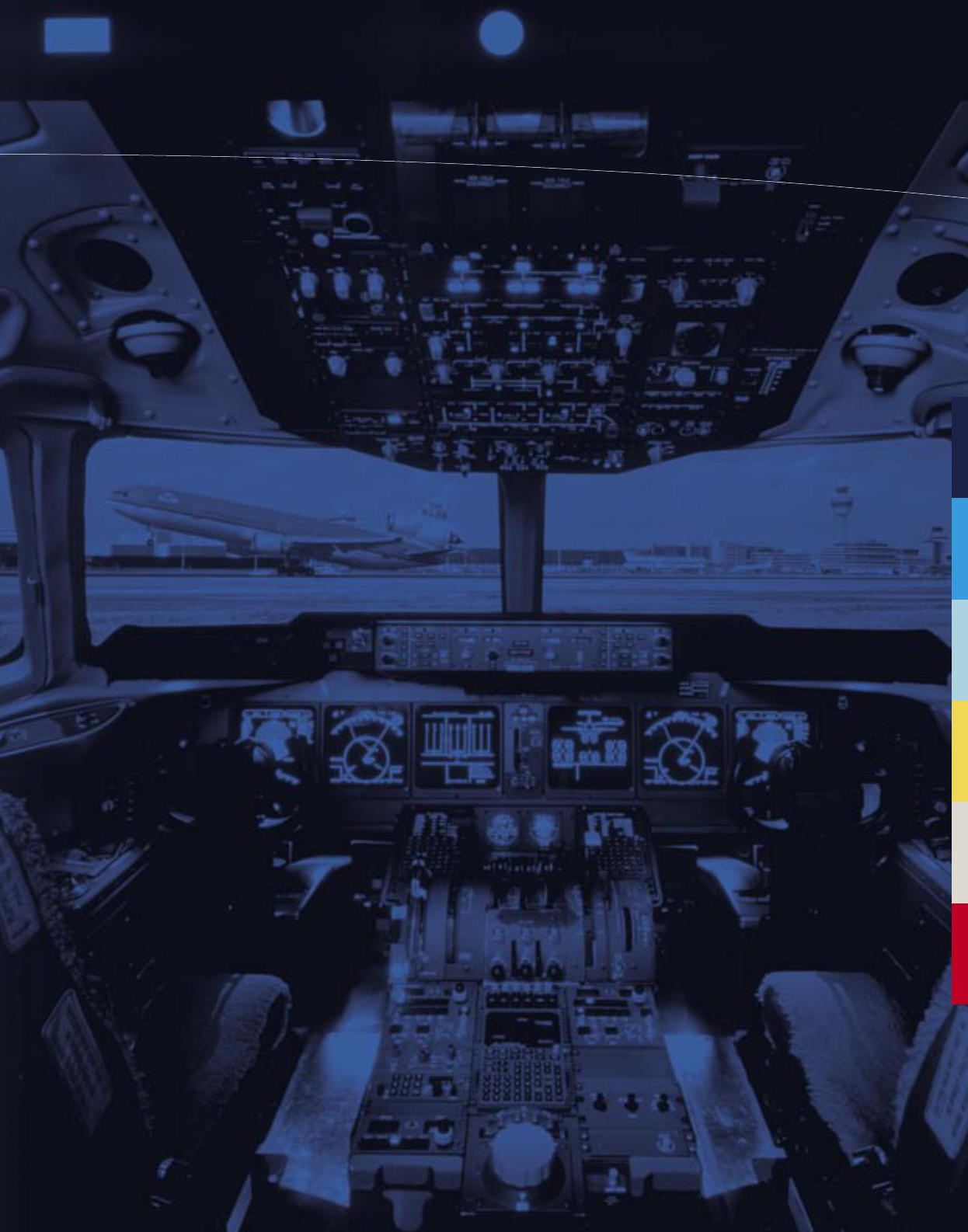
104
Financial report
202
Additional
information
Entrées de Chapitres UK.indd 15 11/07/05 15:43:58

Risks
Risks linked to the air transport industry
Risks linked to the cyclical and seasonal character of the air transport industry
The Group’s activities are affected by local, regional and
international economic conditions. Periods of sluggish
economic activity are likely to affect demand for transport,
both for tourism and for business travel, and have an
impact on the Group’s financial results. Furthermore, during
such periods, the group may have to accept the delivery of
new aircraft or may be unable to sell off unused aircraft on
acceptable financial terms.
Risks linked to changes in international, national or regional regulations and legislation
The Group’s activities are highly regulated, notably with regard
to traffic rights, pricing policies, operating standards (with the
most important concerning security, aircraft noise, airport
access and the allocation of time slots). Additional laws and
regulations and tax increases (aeronautical and airport) could
lead to an increase in operating expenses or reduce the group’s
revenues. The ability of transporters to operate international
lines is liable to be affected by amendments to agreements
between governments. As such, future laws or regulations
could have a negative impact on the group’s activity.
Risks linked to terrorist attacks, threats of attacks, geopolitical instability,
epidemics or threats of epidemics
The attacks of September 11, 2001 in the United States have
had a major impact on the air transport sector. Airlines have
seen falling revenues and rising costs linked notably to the fall
in demand and to higher insurance and security costs. Certain
aircraft have also seen their value drop. The SARS epidemic
resulted in a sharp fall in air traffic and revenues in Asia. Any
future attack, threat of an attack, military action, epidemic or
perception that an epidemic could occur, could have a negative
impact on the group’s passenger traffic.
Risks linked to the Group’s activity
Risks linked to the integration of the activities of Air France and KLM
The development of the Group requires the integration of two
major and complex activities that were run separately up until
the beginning of fiscal 2004-05. The Group may encounter
difficulties with the integration of the activities of Air France and
KLM and may not be able to achieve all the objectives and
synergy targets set.
84
Entrées de Chapitres UK.indd 16 11/07/05 13:48:06

85
Risks linked to the dilution of Air France-KLM’s stake in KLM
The Dutch State has an option to subscribe to a certain
number of preferential KLM B shares, enabling it to hold
a majority of voting rights in KLM. The Dutch State can
exercise this option if another country (included on a set list
of countries) considers that a significant percentage of KLM
shares are no longer held by Dutch shareholders and, as
such, could impose significant restrictions on KLM’s airline
operations on its territory. If the Dutch State were to exercise
its option, Air France-KLM’s economic rights in KLM would
remain the same, but its percentage of voting rights would
be diluted.
For further information on the Dutch State’s option with
regard to KLM’s share capital, refer to “Additional Information
- Agreements concluded in connection with the combination
between Air France and KLM“.
Risks linked to assurances given to KLM and the Dutch State
In connection with their combination, Air France and KLM
have given certain assurances to the Dutch State in order to
maintain the quality of the KLM network at Schiphol, involving
certain obligations for both Air France and KLM. In addition,
Air France has given KLM certain other assurances with a
view to safeguarding some of the founding principles of their
combination.
For further information on the assurances given to KLM and the
Dutch State by Air France-KLM, refer to “Additional Information
- Agreements concluded in connection with the combination
between Air France and KLM“.
Risks linked to competition from other air and rail transport operators
The air transport industry is highly competitive. The deregulation
of the European market on April 1
st
, 1997 and competition
between transporters have led to a reduction in prices and an
increase in the number of competitors.
On its short and medium-haul flights to and from France,
the Netherlands and other European countries, the Group
is in competition with alternative means of transport. More
specifically, the high-speed TGV train system in France is
competing directly with the Navette Air France, a shuttle
service between Paris and the main French cities. Air France
and KLM’s flights to London are in direct competition with the
Eurostar train service. An enlargement of the high-speed train
networks in Europe is likely to have a negative impact on the
activity and economic results of the Group.
Today, Air France and KLM are also facing competition from
low-cost airlines. The percentage of lines on which Air France
and KLM are in competition with these airlines has risen
sharply over the last ten years. This competition is expected
to continue or even intensify. On another level, the use of the
Internet has made it possible for customers to compare prices
on a given line. This competition could have a negative impact
on the Group’s business and economic situation.
02-RISQUES UK.indd 85 11/07/05 13:47:31

86
Risks linked to changes in commercial alliances
The maintenance and development of strategic relations
and alliances with partner companies will be critical for the
Group’s activity. Air France and KLM are members of the
SkyTeam alliance, which is made up of Aeromexico, Alitalia,
CSA Czech Airlines, Continental, Delta Airlines, Korean Air
and Northwest. The success of this alliance depends in
part on the strategies pursued by the various partners, over
which Air France and KLM have a limited level of control. The
lack of development of an alliance or the decision by certain
members not to fully participate in or to withdraw from the
alliance could have a negative impact on the activity and
financial position of the Group.
Furthermore, the airline sector is expected to see a rise in
consolidation, notably through alliances. As such, the loss
of or failure to develop these strategic alliances could have
a negative impact on the Group’s business and financial
position.
Risks linked to financing
Air France and KLM have been able to finance their capital
requirements by securing loans against their aircraft, which
represented attractive collateral for lenders. This may not be the
case in the future. Any prolonged obstacle preventing the raising
of capital would reduce the Group’s borrowing capabilities and
any difficulty in finding financing under acceptable conditions
could have a negative impact on its activity and economic
results.
Risks linked to personnel costs, the negotiation of collective agreements
and labor relations conflicts
Personnel costs account for around 30% of the operating
expenses of Air France-KLM. As such, the level of salaries
has an impact on operating results. The profitability of
the Group could be affected if it were unable to conclude
collective agreements under satisfactory conditions.
Any strike or cause for work to be stopped could have a
negative impact on the Group’s activity and economic
results.
Risks linked to the use of third-party services
The Group’s activities are dependent on services provided by
third parties, such as air traffic controllers and public security
officers. The Group also uses sub-contractors over which
it does not have any direct control. Any interruption in the
activities of these third parties (as a result of a series of strikes
or any increase in taxes or service prices) could have a negative
impact on the Group’s activity or economic results.
02-RISQUES UK.indd 86 11/07/05 13:47:32

87
Risks linked to the closure of Terminal 2E at Roissy-CDG
Following the collapse of part of the boarding area in the
departure hall in Terminal 2E and its subsequent closure,
Air France was obliged to reorganize its program using the
various terminals that it leases at CDG from Aéroports de Paris.
The prolonged closure of Terminal 2E, despite the
compensation that Air France may obtain from Aéroports de
Paris, could have a negative impact on the Group’s activity
and economic results
Risks linked to commitments made by Air France-KLM in relation to the European Commission
For the European Commission to authorize Air France’s
combination with KLM, Air France and KLM had to make
a certain number of commitments, notably with regard to
making landing and takeoff slots available to rival airlines at
certain airports. The implementation of these commitments
is not expected to have a significant negative impact on the
activities of Air France and KLM, although it is difficult to
determine the corresponding financial impact.
On June 14, 2004, easyJet submitted an appeal against
the ruling handed down by the European Commission
authorizing the combination. If this ruling were to be repealed
in full or part, the Commission would have to re-examine the
combination between Air France and KLM in line with the
conditions set under the first ruling.
Unfair competition risks between EU and US airlines
Following the events of September 11, 2001, most govern-
ments took measures to help airlines supplement their cover
for damage caused to third parties on the ground in the event
of terrorist acts, with such coverage capped by the insurance
market at a uniform amount of 50 million dollars. This
additional coverage was granted in return for premiums paid
by airlines.
European governments terminated these measures at the
end of 2002 and European airlines were required to take out
additional policies on the insurance market. The United States,
however, passed legislation to allow the federal authorities to
maintain State guarantees for US airlines for cover against
damage caused to third parties on the ground, passengers,
crew and aircraft at costs that are significantly lower than
those applicable to European airlines.
Added to the substantial subsidies received from the US
federal authorities since the events of September 11, 2001,
the lower insurance costs paid by US air transport companies
are likely to give these companies a significant competitive
advantage over their European competitors, particularly on
North Atlantic routes.
02-RISQUES UK.indd 87 11/07/05 13:47:32

88
Risk of loss of flight slots
Due to the saturation at major European airports, all air carriers
must obtain flight slots, which are allocated in accordance with
the terms and conditions defined in Regulation 95/93 issued by
the EC Council of Ministers on January 18, 1993. Under this
regulation, at least 80% of the flight slots held by air carriers
must be used during the period for which they have been
allocated. Failing this, the slots will be lost by this carrier and
transferred into a “pool”. The regulation does not provide for
any exemptions for situations in which, due to a dramatic drop
in traffic caused by exceptional events, air transport companies
are required to reduce activity levels substantially and do not
use their flight slots at the required 80% level during the period
in question.
Like many other European airlines, Air France and KLM had to
scale down their capacity following the outbreak of hostilities in
Iraq, and as a result, no longer used certain flight slots at their
airport platforms on a temporary basis. Following the terrorist
attacks on September 11, 2001, airlines were faced with a similar
risk of losing flight slots. In light of these factors, the European
Commission decided to amend Regulation 95/93 with a view to
temporarily suspending the rule governing the loss of unused
flight slots (Regulation 894/2002 of May 27, 2002). The same
measures were taken in response to the conflict in Iraq and the
SARS epidemic (Regulation 1554/2003 of July 22, 2003).
Environmental risks
The air transport industry is governed by numerous environmental
regulations and legislation, focusing on various issues such as
noise exposure, gas emissions, the use of dangerous substances
and the handling of waste products and contaminated sites.
Over the last few years, the French, Dutch, European and US
authorities have adopted various regulations, especially regarding
noise pollution and the age of aircraft, introducing numerous
taxes on air transport companies and obligations for them to
ensure the compliance of their operations. Compliance with the
various environmental regulations could lead to additional costs
for the Group and impose new restrictions on its subsidiaries
with regard to their equipment and facilities, which could have
a negative effect on the Group’s activity, financial position or
results.
Risks linked to the application of new accounting standards
Air France-KLM draws up its consolidated financial statements
in accordance with generally accepted accounting standards in
France (French GAAP), whereas KLM’s financial statements are
based on the generally accepted standards in the Netherlands
(Dutch GAAP). Air France-KLM and KLM are preparing for the
reconciliation of some of their financial information in line with
US GAAP. The Group’s consolidated financial statements for
fiscal 2004-05 have been drawn up based on French GAAP,
such as the Group’s pro forma 2003-04 consolidated financial
statements.
Under European regulations, all companies listed in Europe
are required to apply the International Financial Reporting
Standards (IFRS) to their financial statements as of January 1
st
,
2005. The IFRS system focuses on the fair value of assets and
liabilities and is likely to have a significant impact on certain key
items, notably the booking of goodwill, the shares-for-salary
scheme, depreciation of assets, profit-sharing schemes for staff,
intangible fixed assets and credit derivatives, debt instruments
and equity securities and their accounting classification. The
valuation methods used by analysts to measure and assess the
performance of Air France-KLM and its listed securities could
be affected by this transition.
02-RISQUES UK.indd 88 11/07/05 13:47:32

89
The majority of the Group’s revenues are generated in euros.
However, because of its international activities, the Group
incurs a foreign exchange risk on the main global currencies,
particularly the US dollar, yen, pound sterling and Swiss
franc. Therefore, any changes in the exchange rates for these
currencies in relation to the euro will have an impact on the
Group’s financial results.
With regard to the US dollar, since expenditures (such as fuel
costs, operating lease costs for part of the fleet and a portion of
maintenance costs) exceed the level of income, any significant
appreciation in the dollar against the euro could have a negative
effect on the Group’s activity and financial results. The Group
estimates that its net exposure to the dollar (i.e. the difference
between income and expenditures in dollars) will represent
approximately USD 2.2 billion for the current year. For the yen,
Swiss franc and pound sterling, the level of revenues is higher
than expenditures. As a result, any significant decline in these
currencies against the euro could have a negative effect on the
Group’s activity and financial results.
In order to reduce their currency exposure, Air France and KLM
have both adopted policies to hedge the exchange risk.
For the US dollar, both companies have a systematic hedging
policy designed to cover approximately 30% of their net
exposure over a sliding 12 months. This percentage may be
increased based on market conditions and forecasts. For
other currencies, depending on market conditions, hedging
levels may be between 30% and 70% of expected revenues
for the following year and, in certain cases, the next two or
three years.
As far as investments are concerned, the Group has a high
level of exposure to an increase in the dollar against the euro.
Indeed, all of the Group’s aircraft and spare parts are purchased
in dollars. In this area, the procedure for hedging the currency
risk provides for a minimum systematic hedging of 30% at the
beginning of the year. During the year, the Group continued to
take advantage of the still low level of the dollar to continue
its program of hedging its aircraft investments. On March 31,
2005, the Group purchased USD 2.5 billion in order to partially
hedge its investments over the next five years.
The exchange risk on the Group’s financial debt is relatively
limited at present. At March 31
st
, 2005, 89% of the Group’s
net debt, after taking into account derivative instruments, was
issued or converted into euros, thereby sharply reducing the
risk of currency fluctuations on the debt.
Currency risk
Market risk management
Risk management
The cash and cash equivalents of Air France and KLM are
tracked daily and are the subject of monthly reports to the
financial divisions of the two Groups. These reports include,
among other items, interest rate and currency positions, the
portfolio of hedging transactions, a summary of investments
and financing by currency, and a statement of limits by
counterparty.
Regular meetings are organized between the two treasury
departments in order to exchange information concerning
the hedges in place, the hedging instruments used, and the
strategies planned.
Meetings are also held with the executive management teams of
each subsidiary to report on interest rate and currency positions.
Hedging decisions are made during these meetings (amounts
to be hedged, hedging instruments, etc.), then implemented
by the treasury departments of each subsidiary in compliance
with the procedures governing the delegation of powers. Each
quarter, a harmonized Group report is presented to a risk
committee attended by the Chief Financial Officers of the two
subsidiaries, and is also brought to the attention of the SMC.
The use of rate and currency hedges is intended to reduce the
exposure of Air France–KLM and, therefore, to protect budgeted
margins. The instruments used are forward contracts, swaps
and options. In-house procedures governing risk management
prohibit the use of instruments that can be classified as trading.
Generally, trading and speculation are strictly prohibited.
02-RISQUES UK.indd 89 11/07/05 13:47:33

90
Interest rate risk
When Air France and KLM use financial investments to manage
their respective cash resources, in the form of purchases of
SICAV/OPCVM or equivalent investments, they systematically
give priority to short-term money market instruments in order to
limit the risks. As a result, they are not exposed to a significant
equity risk for cash management.
Furthermore, at March 31
st
, 2005, Air France-KLM directly or
indirectly held a portfolio of shares issued by publicly traded
companies for a net total of 125 million euros. A global decline
of 1% would represent a risk of 12.5 million euros.
Equity risk
At both Air France and KLM, most financial debt is based
on floating-rate instruments in line with market practices.
However, the companies are working to reduce their exposure
to the interest rate risk. For this purpose, capitalizing on the
historically low level of fixed rates over the last two years,
Air France and KLM have developed strategies to swap part of
their variable-rate debt for fixed rates.
As of March 31
st
, 2005, the net exposure to interest rates,
after taking into account floating-rate cash investments, was
1.14 billion euros in net financial debt at variable interest rates.
Any change of 1% in the variable interest rate over 12 months
has an impact of 18.47 million euros taking into account the net
short-term position (less than one year) to be replaced.
Despite this active hedging policy, not all exchange rate risks
are covered, notably in the event of a major devaluation of
a currency. The Group and its subsidiaries may encounter
difficulties in managing currency risks, which could have
a negative impact on the Group’s business and financial
results.
Currency (in million) Operating exposure
US Dollar
(USD)
Pound sterling
(GBP)
Yen
(JPY)
Swiss Franc
(CHF)
Net position before management
(2,227) 561 62,000 324
Currency hedge
1,207 (173) (15,000) (89)
Net position after management (1,020) 388 47,000 235
02-RISQUES UK.indd 90 11/07/05 13:47:33

91
Fuel price risks
Aircraft fuel represents the second-largest operating expense
for the Air France–KLM group after personnel costs: the Group
purchased approximately 10.4 million cubic meters of fuel for
2.65 billion euros in 2004-05 and 11 million cubic meters for
1.99 billion euros in 2003-04.
In order to ensure that the Air France-KLM group has a
consistent risk management strategy for fuel prices, the two
subsidiaries have initiated an action plan to develop a common
reporting system, compare their methods, and progressively
define a common fuel hedging strategy.
In order to limit the impacts of any fluctuations in fuel prices, the
Group has set up an oil price hedging policy structured around
Brent IPE, Gasoil IPE, and jet fuel. This policy is implemented
at Air France by the fuel purchasing department and is decided
at regular meetings chaired by the Chief Executive Officer, and
attended by the Chief Financial Officer, the Vice-President
for Purchasing and the Director of the Fuel Department.
The dollar risk linked to the oil risk is managed by the Treasury
Department.
On the basis of a policy of systematic operations, the minimum
hedging level is 60% to 90% over the first 12 sliding months,
40 to 60% over the following twelve months, 10 to 30% over
the next twelve months, and 0 to 20% over the fourth year.
The hedging instruments used are exclusively swaps and
options. The choice of counterparties is validated by the
finance department. A weekly report is submitted to executive
management. All the transactions contracted are compatible
with the new IFRS accounting norms.
KLM also uses derivatives to hedge against prices for fuel
purchases in order to reduce its exposure to the risk of oil price
fluctuations. To do this, KLM uses swaps and knock-out options
based on a representative basket of jet fuels (Rotterdam,
Singapore, US Gulf Coast). Thus, KLM hedged 67% of its fuel
consumption for fiscal 2004-05. These hedging transactions
generated a positive result of 49 million euros over the year.
Despite the measures taken by Air France and KLM to reduce
their exposure to the risk of fluctuations in oil prices (and
therefore fuel prices) and the possibility of passing on financial
“surcharges” to passengers during high-price periods, rising
oil prices could have a negative effect on the Group’s business
and financial results.
Liquidity risks
For the Air France-KLM group, the balance of the cash flows
tied to capital expenditure activities is largely covered by the
cash flows from operating activities. This coverage of net
investments by cash flows from operating activities has reduced
the Group’s net debt ratio from 1.21 at March 31
st
, 2004 to
1.06 at March 31
st
, 2005.
At March 31
st
, 2005, Air France had a syndicated loan for
1 billion euros; this syndicated loan was fully available at March
31
st
, 2005. It was renewed early in April 2005 for an amount
of 1.2 billion euros from an expanded pool of 19 banks. This
loan carries an obligation to meet two financial ratios reflecting
the capacity to assure the interest payments or the amount of
non-pledged assets.
These ratios are calculated every six months and were largely
respected as at March 31
st
2005. Air France also conducted
various financing operations for aircraft (mortgage on planes,
sale with reservation of ownership, French tax financial lease).
The company also issued Convertible or Exchangeable
Bonds for New or Existing Shares (OCÉANE) in April 2005 in
the amount of 450 million euros. These bonds bear interest
at an annual rate of 2.75% and are redeemable at par, which
is 20.50 euros per bond. They give the right to the allotment
of existing or new Air France-KLM shares, at a parity of one
share for one bond.
In addition, Air France should generate a cash gain of
800 million euros before taxes in the context of the public
offer for Amadeus GTD in which the company holds 23.6%.
02-RISQUES UK.indd 91 11/07/05 13:47:33

92
Investment risks
The cash resources of Air France and KLM are primarily
invested in liquid, short-term instruments, such as OPCVMs,
money market and dynamic money market funds, cash notes
or certificates of deposit rated A1/P1.
A portion of KLM’s liquid assets is invested in currencies on
AAA-rated, longer-term bonds, in order to reduce the currency
risk on the debt.
To finance its aircraft, KLM is able to access the export
financing system, which enables the company to benefit from
the guarantee of leading export credit agencies for its loans to
finance Boeing aircraft in the US and Airbus aircraft in Europe.
Despite a general reluctance from the financial markets to
support air carriers in general, KLM and Air France continue to
benefit from financing at attractive interest rates. The average
apparent cost of the Group’s debt after swaps was slightly
above 4% at March 31, 2005.
Overall, the Group believes that (i) the conditions for access to
financial markets for its main subsidiaries Air France and KLM,
(ii) cash levels of 2.6 billion euros at March 31, 2005 and (iii) the
full availability of the cash line of 1.2 billion euros available to
Air France at the end of April 2005 reflect prudent liquidity risk
management by the Air France-KLM group.
In the coming years, the Group will give responsibility for
financing policy to each of the two subsidiaries. This strategy
will enable each of the subsidiaries to fully capitalize on the
relationships they have built up with their partner banks.
Moreover, this segmentation ensures that KLM can continue to
make use of export credit financing facilities. For this reason,
the Group plans to set up ad hoc committees to exchange
information on each company’s financing strategy and the type
of operations used.
02-RISQUES UK.indd 92 11/07/05 13:47:33

93
Insurance policies taken out at Group level and the Group’s insurance strategy
As of December 1, 2004, Air France and KLM pooled their airline risks on the insurance market in order to capitalize on the size
of the Group.
Insurance and risk coverage
Insurance policies taken out by Air France
In connection with its air transport activities, Air France has
taken out an airline insurance policy on behalf of itself and its
French and European airline subsidiaries, covering damage to
aircraft, liability in relation to passengers and general liability to
third parties.
In accordance with French legislation, this policy has been taken
out with a leading French underwriter, La Réunion Aérienne,
and co-insurers which include the French insurers AXA and
AFA and an international reinsurance company.
The policy covers the civil liability of Air France for up to 1.5
billion dollars. The company and its French subsidiaries have
also taken out an additional civil liability policy for 500 million
dollars, as well as specific cover against terrorist acts for
damage caused to third parties for up to 1 billion dollars.
Lastly, in line with its risk management and financing policy to
improve the protection of its activities, employees and assets,
Air France has taken out a number of policies to insure its
industrial sites, equipment pool and other activities relating
to the air transport business, with different levels of coverage
depending on the guarantees available on the market and on
the quantification of risks that can reasonably be anticipated.
Air France has also taken out a number of specific or local
policies in order to comply with the regulations in force in the
countries in which it has a representative office.
After the World Trade Centre tragedy, airline premia increased
significantly, notably to cover terrorist and related risks,
generating an additional cost of 1.95 dollar per passenger
transported. The renewal of insurance policies since December
2002 enabled a reduction in these premia by incorporating
part of this additional cost into the global premium.
Insurance policies taken out by KLM
KLM has taken out suitable competitive polices to cover its
operational risks. Thanks to a centralized purchasing operation,
under which several policies are taken out for the same Group,
KLM has been able to negotiate the least expensive premia on
the market.
KLM has also taken out an airline insurance policy on behalf of
itself and its subsidiaries, covering damage to aircraft, liability
in relation to passengers and general liability to third parties in
connection with its activity.
It covers KLM’s liability for up to 1.5 billion dollars. KLM has
also taken out a policy for 500 million dollars in excess of this
amount.
Lastly, in line with its risk management and financing policy
to improve protection for its activities, employees and assets,
KLM has set up a range of policies to insure its industrial sites,
equipment pool and other activities relating to the air transport
business, with different levels of coverage depending on the
guarantees available on the market and on the quantification of
risks that can reasonably be anticipated.
Exceptional events and disputes
In connection with the normal performance of their activities,
Air France-KLM and its subsidiaries are involved in disputes,
for which they are not necessarily required to book provisions
in their accounts.
(See Note 30.3 of the Group’s consolidated financial
statements.)
02-RISQUES UK.indd 93 11/07/05 13:47:34

94
Report of the Chairman of the board
of directors on internal control
See “Corporate governance”
1. Conditions for the preparation and organization of the work of the board
of directors
2. Rules and principles for the governance and organization
of the two companies of the Air France-KLM group
See “Additional information - Information on the agreements concluded in connection with the combination between
Air France and KLM “
3. Internal control procedures
Definition and goal of internal control
Air France-KLM has chosen COSO standards to define the
internal control for the Group and the two Air France and KLM
sub-Groups.
According to this standard, internal control represents a
system defined and implemented by the Group’s Executive
Management, managers and employees that is designed
to provide a reasonable level of assurance that the following
objectives are achieved:
- The performance and optimization of operations
- The reliability of the accounting and financial information
- Compliance with the laws and regulations in force
The standards are based on the following principal
components:
- the control environment;
- the risk assessment;
- the control operations;
- the information and communication;
- the monitoring of internal control.
The standards correspond to a specific set of actions, tasks,
practices and controls for each of the company’s functions.
One of the objectives of the internal control system is to prevent
and control the risks linked to the company’s activities, as well
as the risks of error or fraud, notably in the areas of accounting,
finance and revenue management.
As with any control system, it is unable to provide an absolute
guarantee that such risks have been totally eliminated.
02-RISQUES UK.indd 94 11/07/05 13:47:34

95
Internal control project
To ensure that the internal control process complies with the
new legal obligations, two projects were initiated in 2004:
- one at KLM, known as the SOX program; and
- an internal control project at Air France.
These are specifically to meet the requirements of the Sarbanes-
Oxley Act because the shares of Air France-KLM are traded on
the NYSE, and of the French Financial Security law.
The existence of these two projects reflects the features of the
Air France-KLM group composed of a holding company and
two major subsidiaries: Air France and KLM.
A coordinating committee ensures consistent approaches and
schedules for the two projects.
The mission assigned by the Chairman and Chief Executive
Officer of Air France-KLM, in addition to compliance with laws,
is to improve management efficiency through broader use of
internal control by all players in both companies.
In April 2005, an internal control and internal audit division was
created within the holding company.
General internal control structure
The structure described below is a summary of the
organization set up in each of the two sub-groups, as
discussed in the Chairman’s reports on internal control of
Air France and KLM. At the request of the Air France-KLM
holding company, the Dutch company, KLM, has established
a report on internal control in accordance with the French
Financial Security law.
This organization takes into consideration the structure
of each of the two companies of the Group, which is
characterized by the existence of three principal businesses:
passengers, cargo and maintenance; the subsidiaries
represent a minority percentage of the business and revenue
of the two companies; this structure is reflected by a number
of transverse and sometimes complex processes, because of
the interdependence of each of the businesses
• The Board of Directors is the corporate body that
directs and controls the management of the Group; for this
purpose, the Board works with the Strategic Management
Committee (SMC) to ensure the successful operation of the
Air France-KLM group, relying on advice from the specialist
committees described in Chapter 1 above, entitled «Conditions
for the preparation and organization of the work of the Board
of Directors».
• The Strategic Management Committee is tasked with
defining joint strategic decisions on commercial, financial,
technical and operational issues for the two companies; the
organization and operations of this Committee are described in
“Information on the agreements concluded in connection with
the combination between Air France and KLM”.
• Financial responsibilities
These are performed by each of the two companies within the
organization that was in place at the time of the merger and
they report to the Strategic Management Committee.
However, in April 2005, a financial division was created for the
holding company. This division is responsible for consolidation
operations (accounting rules and principles and consolidation
of Air France-KLM results), financial reporting (management
reporting, estimates, budgets, investment plans, medium-term
plan), and financial communications (preparation of annual
report, quarterly publications, press releases, relations with
investors and market authorities).
• Internal audit
The management of a group such as Air France is based on the
principle of a broad delegation of responsibilities. This principle of
delegation necessarily implies stronger internal control functions
in order to provide Executive Management with the assurance
that this autonomy is being used correctly by each entity.
02-RISQUES UK.indd 95 11/07/05 13:47:34

96
Air France and KLM each have internal audit departments that
existed prior to the creation of the Air France-KLM group.
Given the governance rules of the Group, each company will
retain its internal audit; the coordination of the internal audit at
Group level, currently under preparation, will be effective at the
beginning of fiscal 2005-06.
Operations in the field will be organized within a work program
that will be validated prior to implementation.
Corrective action plans are then established and follow-up is
conducted.
The internal audit department reports on its work to the
Chairman, to the executive committee of Air France, to the
Managing Board of KLM, as well as to the audit committee of
the Air France and KLM holding company.
The schedule of missions for fiscal 2005-06 was presented to
the Audit Committee in February 2005.
In April 2005, an internal audit department was created within
the holding company.
• The legal departments of each of the two companies
perform a consulting mission for their management and
decentralized organizations in legal matters, transport law,
corporate law and insurance law.
They systematically draw up an inventory of the disputes
in process in order to assess the corresponding provisions
booked as liabilities.
In April 2005, a legal department was created within the
holding company.
• The insurance departments are responsible for identifying
vulnerabilities of the Group that might impact the operations
and financial results in order to reduce or transfer them either
to insurers through insurance policies, particularly aviation
policies, or to third parties under contractual mechanisms.
They also manage claims and advise entities of the Group on
limiting and controlling their risks.
An aviation insurance policy for the entire Air France-KLM
group was contracted at the end of 2004 covering civil liability,
aircraft and risks of war, which are the major financial and legal
risks of any airline.
4. Standards
Organization of responsibilities
The organizational structure of each company has been defined
to ensure compliance with the principles of secure and efficient
operations, factoring in regulatory requirements governing air
transport, notably with regard to air transportation, ground
operations, industry and aircraft maintenance as well as catering
and safety.
The managers of the entities and subsidiaries concerned are
required to apply these principles and organization at their level,
and ensure updating of organizational charts, job definitions
and the procedures defined by business process.
They must ensure that their organizational structure is coherent
and adequate, that it is taken into account in the information
systems that are vital to the companies’ operations and that it is
appropriately integrated within the organization.
02-RISQUES UK.indd 96 11/07/05 13:47:34

97
Charters and manuals
The Air France group has a corporate and ethical charter that
reflects its commitment to be a socially responsible enterprise,
basing its corporate and ethical policy on respect for people at
the professional, social and citizenship levels.
Chapter 9 of this charter on «Equality» restates the general
provisions of the employee rules for equality, which include
provisions governing the ethical behavior of the employees with
respect to the company and in relations with third parties.
The Air France group has also published a charter for the
prevention of harassment in the work place, which complies
with French legislation and is part of a contractual approach
through employee agreements; the legal purpose is to set forth
the principles of prevention, define the actions, stress the legal
and human responsibility of everyone, and establish internal
preventive procedures.
Internal audit charter
The internal audit charter, at both Air France and KLM, defines
the mission, objectives and responsibilities of the department and
guarantees the conditions under which the department functions.
In accordance with the international and national professional code
of ethics, it formalizes the position of the Audit Department within
the company and defines its sphere of action.
It also specifies the methods for its operations and the various
stages in the audit process as well as a summary of the missions
carried out.
Quality system
Air France and KLM’s quality systems are based on the following
principal internal and external standards:
External standards
- Regulations: national regulations (based on European
regulations) and applicable general laws;
- Management and environment: the ISO 9000 and 14000
standards.
Internal standards
These represent the application of the external standards,
tailored to the processes of each company.
- Regulations: operating, maintenance and safety manuals,
and the related general procedures, which are mostly subject
to formal validation by the administrative authorities issuing the
authorizations (DGAC, IVW-DL, FAA, etc.)
- Management systems: quality manual of each company, and
related general procedures:
Air France has covered the entire customer service chain
leading to certification of the services.
Procurement quality manual
The procurement quality manual describes for both
Air France and KLM the purchasing processes and the
related procedures applicable in each company, which are
designed to ensure an impartial and objective selection of
suppliers and service providers.
It also includes the purchasing ethics charter which defines the
rules of conduct for all employees when dealing with suppliers or
service providers, and informs all those involved in the process
of the limits that must not be crossed.
02-RISQUES UK.indd 97 11/07/05 13:47:35

98
These procedures are based on the organization and structure
of the Group’s companies.
The following businesses are common to each of the two
companies:
- The passenger business, which includes all operations
contributing to the transport of passengers, including the
network, marketing, sales and production departments that
provide the services required for air and ground operations;
- The cargo business that conducts cargo marketing and
operations;
- The industrial business that is responsible for maintenance
and industrial operations for the aircraft, equipment, and
engines.
Only KLM operates a «low cost/charter» business; this includes
the leisure and charter activities of KLM performed by Transavia,
its wholly owned subsidiary.
Each company also includes the central support departments of
Human Resources, Finance in the broad sense, Administrative
Services and Information Systems.
Strategic decisions in the commercial, financial, technical and
operational areas are coordinated by the Strategic Management
Committee, which is the major governance body described in
Chapter 2; in April 2005, this governance body was completed
by departments at the holding company level, providing financial,
legal/administrative services for the Board of Directors, internal
control/audit, and relations with the European agencies and
coordination of the SkyTeam alliance.
Air France and KLM each control nearly 70 subsidiaries and
sub-subsidiaries; 10 of the Air France subsidiaries and 3 of the
KLM subsidiaries represent more than 90% of the revenues for
all subsidiaries.
The provisional management of the Air France-KLM group is
organized on the basis of three structural approaches:
- The broad strategic goals of the Air France-KLM group are
defined and prioritized in the context of a «Group Strategic
Framework» (GSF) that brings together the executives of
Air France and KLM at a seminar held in September/
October.
- The Medium-Term Target (MTT), which represents the
expression of this vision, with a three-year horizon for each
of the two companies in terms of growth, investments and
the associated human resources; comprehensive economic
figures are presented and discussed in December at the
Strategic Management Committee, with a definition of action
plans for revenues and costs.
- The budgets for the IATA year, which use the first year of
the Medium-Term Target (MTT) and are established by cost
centers and consolidated at the level of each company, and
then at the level of the Air France-KLM group.
Management procedures and processes
5. Summary information on internal control procedures
02-RISQUES UK.indd 98 11/07/05 13:47:35

99
Finance processes
- Investments are managed by each company in accordance
with its own procedures. Major investments, particularly
aircraft, are subject to the approval of the Strategic
Management Committee (fleet, acquisitions, disposals, etc.).
- The coverage of risks is continually monitored in both
companies.
Cash is tracked daily and reporting is periodically presented
to an ad hoc committee that includes the CFOs of both
companies; this committee defines and updates interest rate
and currency hedging; the Strategic Management Committee
is informed periodically.
To limit the impacts of variations in oil prices, the Group applies
a price hedging policy; there is coordination between the two
companies and joint objectives are set for the two companies;
periodic reporting is made to the Strategic Management
Committee.
The quality of the counterparties is checked.
Accounting processes and production of accounts
The consolidated financial statements of the Air France-KLM
group are prepared on the basis of the data transmitted by
the financial departments of the holding company and its
subsidiaries.
The Group is primarily composed of the two operational
sub-groups Air France and KLM, which prepare their own
consolidated statements prior to their consolidation within
Air France-KLM.
The accounting information provided by the various departments
of the company and subsidiaries must comply with the Group’s
accounting rules, methods and standards defined by the parent
company, and the financial statements must be presented in
accordance with the format defined by the Group.
As part of their legal mission, the auditors of the parent company
conduct a complete review of the information provided by the
various consolidated entities.
The consolidated and individual statements are submitted to
Management, then reviewed by the auditors before they are
closed.
They are then presented to the Audit Committee, which meets
quarterly to close the accounts.
Air France-KLM, which is listed in France, the Netherlands,
and the United States, is also required to prepare and
file consolidated financial statements in accordance with
US accounting standards.
As is the case for the financial statements prepared according
to French standards, the statements prepared using
US standards are presented to the Audit Committee and are
then submitted to the auditors for certification.
Under European Regulation 1606/2002 adopted on July
19, 2002, publicly traded European companies are required
to use international accounting standards to prepare their
consolidated financial statements for financial years beginning
on or after January 1, 2005. For the Air France-KLM group, the
new standards will therefore be applied as of April 1, 2005.
The adoption of these standards makes it mandatory to
publish a year of comparative figures, setting the date for the
changeover from the current standards to the IAS/IFRS system
as of April 1, 2004, the date on which a restated balance sheet
must be prepared.
To prepare for this changeover, the Group has divided its
conversion project into three phases:
- The first stage of the project, the “diagnosis”, was designed
to identify the principal differences in accounting treatments
between the new standards and those currently applied
within the Group. This stage was completed in line with the
schedule initially set;
- In the second phase, a training program for IFRS was
conducted for all the employees concerned;
- The third and final phase consisted of preparing the opening
balance sheet at April 1, 2004 and restating transactions for
fiscal 2004-05.
This gradual conversion was facilitated by the fact that the
Air France-KLM group adopted certain IFRS provisions ahead
of schedule over the last few years when they were compatible
with French standards.
In particular, this was the case for the adoption of the component
method for property plant, and equipment (IAS 16), and for the
valuation of pension commitments (IAS 19).
Financial procedures and processes and year-end
02-RISQUES UK.indd 99 11/07/05 13:47:35

100
Although the Group does not yet have a complete, finalized
and audited set of accounts, as of this date, given the State
of progress of this project, the Group does not anticipate any
difficulties in the adoption of these new accounting standards.
Revenue reporting process
This process is performed in each of the companies and
transmits weekly revenues to management; Air France has also
implemented a «progressive revenues» process that gives the
estimated amount of passenger revenues, with only a two-day
time lag.
In addition, departments for passenger and cargo activities in
each company analyze the results by market and by line (unit
revenues, per passenger-kilometer, available seat- kilometer,
ton-kilometer, etc.).
Management reporting process
The management control departments coordinate the
reporting process and establish at the beginning of month
m+1 a management estimate on the basis of the information
available. Then, once the accounting results are known, they
produce a monthly document that summarizes key operational
and financial data, and analyzes the result. In addition, they
also regularly analyze with the principal departments and
subsidiaries of the companies the economic performances for
the past month, and evaluate the results for the coming months
until the end of the current fiscal year.
A monthly reporting is presented to the Strategic Management
Commitee.
In April 2005, a Group management reporting unit was
created.
Operational procedures and processes
Quality system management
The quality manuals of both Air France and KLM describe all
the general provisions of the quality system implemented in
each of the two companies, i.e. the organization, management
processes, procedures and resources required to manage
quality and satisfy customers.
In each management unit at the two companies, a quality review
reports on the operation of the quality management systems
and measures the performances of the principal processes
directed by management.
In addition to the regulatory agreements that enable each
company to conduct its business, the recognition of progress
made is reflected in certifications obtained from independent
bodies, notably:
- ISO 9001 certification (2000 version) for the efficiency of
the management systems (60 entities certified at Air France
at March 31, 2005);
- IOSA certification for KLM anticipated in 2005; the audit
was conducted in March 2005;
- ISO 14001 certification for the validation of the environmental
systems.
Quality assurance
Control over operational processes is based primarily on three
means of supervision:
Internal monitoring: conducted by the quality assurance
services, which includes:
- A program of audits (focusing on the areas of organization
and management, air transportation, flight preparation,
ground and cargo operations, dangerous goods, engineering
and maintenance),
- Regular monitoring of operations, with an analysis of incidents
and systematic feedback on experiences,
- Proactive prevention processes.
External monitoring: conducted by the civil aviation authorities
(IVW-DL, DGAC, FAA, etc.) and organizations specializing in
certification, with audits of the operating principles and internal
monitoring system. Air France and KLM are also regularly audited
by their customers or their partners.
02-RISQUES UK.indd 100 11/07/05 13:47:35

101
Monitoring of partners - both subcontractors and suppliers. In
particular, the chartered, franchised or shared-code companies
are subject, without exception, to a preliminary and then
bi-annual audit.
The effective implementation of preventive/corrective actions
resulting from this global monitoring system is supervised by the
quality assurance departments, coordinated by the Corporate
Quality Department. Monthly meetings are held, notably
making it possible to validate the correct implementation of this
surveillance system and its impacts.
Support procedures and processes
Information systems
The control processes cover the information and
telecommunications systems and are based on formalized
procedures which have earned ISO 9001 certification at
Air France, and are based at KLM on a special modeling of
the information system processes (Management Enterprise
Architecture/MEA Babylon).
The systems implemented seek to guarantee:
- The reliability of the IT and telecommunications resources;
- The integrity of the data through dedicated resources,
infrastructures and controls;
- The continuity of IT services and the availability of data
on the production sites with a common local contingency
strategy, secure architecture and a security system covering
external access points;
- The confidentiality of information and the security of IT
infrastructures by setting up an access system that is
secure, monitored and effective.
The managements of the two companies ensure that the
resources and expertise required by the IT systems to meet
strategic objectives are developed.
Project management and development application tools
are deployed: the Tempo method for Air France and the
Prince 2 (project management) and Stemband (development)
methodologies at KLM.
The work conducted within the internal control projects and
the project to progressively implement a coordinated and
optimized organization have resulted in the initiation of action
plans to strengthen internal control with regard to certain
risks, such as continuity of the operations.
02-RISQUES UK.indd 101 11/07/05 13:47:36

102
6. Current projects
The actions conducted in 2004 and continued in 2005 are
designed to create a dynamic that will effectively mobilize the
staff to achieve the two objectives of compliance with the law
and improved management for the company.
The internal control project, which is designed to meet the
requirements of the Sarbanes-Oxley Act, is based on the
following structural components:
- Definition of the enterprise business model based on the financial
statements, the scope (principal entities and subsidiaries) and,
in particular, the processes and sub-processes used to establish
the accounts and financial statements;
- Documentation of the processes, the key controls, monitoring
and verification tests;
- Performance of corrective actions at each stage in the project.
At the end of March 2005, an initial general evaluation of
the internal control of each company was conducted on the
basis of a complete questionnaire structured according to the
5 components of the COSO control standards.
Action plans were defined to complete this mechanism.
The work was preceded by an initial diagnosis of the internal
control of the Air France company through the development
of risk mapping produced by an interview with the principal
managers within the company. A summary of the work was
presented to the Executive Committee on October 19, 2004.
A review and update were conducted early in 2005 by all the
managers involved.
With regard to risk management, KLM implemented a risk
management system in 2002, which tracks the principal risks,
and allows it to take appropriate measures if necessary; this
process is performed by each business, with quarterly reporting
to the Management Board. The KLM Supervisory Board is
advised of significant risks.
A program has been initiated to converge these approaches
within the Air France-KLM group and ensure that the Strategic
Management Committee is informed of significant risks.
The work conducted within each company has already achieved
good risk control, particularly for regulated activities.
For Air France, vectors for improvement have been identified
and action plans initiated, which include:
- broad distribution of information about internal control;
- regular circulation of ethical rules and codes;
- updating of delegations of powers;
- strengthening of certain plans to ensure continuity of the
business;
- improvement in managing authorizations.
The existing processes and the work in progress both at
Air France and at KLM reflect the Group’s desire to strengthen
internal control, particularly for financial results; the cur
-
rent implementation of an internal control division within
Air France-KLM is designed to ensure the convergence and
consistency of the actions required to achieve optimized
control of risks and the Group’s compliance with regulatory
requirements.
Procurement
The activity of the Procurement department is based on a
purchasing policy designed to provide adequate products
and services at the required time to the entities at the best
possession cost possible.
This is achieved by applying a purchasing policy focused on
the expertise of the buyers, with separation of responsibilities
(buyer, prescriber, supplier), the preparation of contracts and
the use of Internet technologies.
The Heads of purchasing at Air France and KLM manage the
network of buyers for each company through regular meetings
and a presentation of purchasing indicators for the companies.
A Procurement coordinating committee periodically brings
together the purchasing departments of Air France and KLM to
develop joint programs and share best practices.
02-RISQUES UK.indd 102 11/07/05 13:47:36

103
Statutory Auditors’ report
Statutory Auditors’ report, prepared in accordance with article L. 225-235 of the Commercial Code, on the report prepared by
the President of the Board of Air France–KLM S.A. on the internal control procedures relating to the preparation and processing
of financial and accounting information
In our capacity as statutory auditors of Air France–KLM S.A.
and in accordance with article L. 225-235 of the Commercial
Code, we report to you on the report prepared by the President
of your company in accordance with article L. 225-37 of the
Commercial Code for the year ended March 31, 2005.
It is for the President to give an account, in his report, notably
of the conditions in which the duties of the board of directors
are prepared and organized and the internal control procedu-
res in place within the company.
It is our responsibility to report to you our observations on the
information set out in the President’s report on the internal con-
trol procedures relating to the preparation and processing of
financial and accounting information.
We performed our procedures in accordance with professional
guidelines applicable in France. These guidelines require us
to perform procedures to assess the fairness of the informa
-
tion set out in the President’s report on the internal control
procedures relating to the preparation and processing of
financial and accounting information. These procedures
notably consisted of:
• obtaining an understanding of the objectives and general
organization of internal control, as well as the internal con-
trol procedures relating to the preparation and processing of
financial and accounting information, as set out in the Pre
-
sident’s report;
• obtaining an understanding of the work performed to sup
-
port the information given in the report.
On the basis of our procedures, we have no matters to report
in connection with the information given on the internal con
-
trol procedures of the Company relating to the preparation and
processing of financial and accounting information, contained
in the President of the Board of Directors’ report, prepared in
accordance with article L. 225-37 of the Commercial Code.
To the shareholders,
On the basis of our procedures, we have no matters to report in connection with the information given on the internal control
procedures of the Company relating to the preparation and processing of financial and accounting information, contained in the
President of the Board of Directors’ report, prepared in accordance with article L. 225-37 of the Commercial Code.
Pascal Pincemin
Partner
The Statutory Auditors
Paris La Défense and Neuilly-sur-Seine, June 21, 2005
Jean-Paul Vellutini
Partner
Jean-Luc Decornoy
Partner
KPMG Audit
Department of KPMG S.A.
Deloitte & Associés
Entrées de Chapitres UK.indd 21 11/07/05 13:48:10

F
inancial
report
106
Comments on the fi nancial results
110
Investment and fi nancing
112
Subsequent events and Outlook
113
Consolidated income statement
114
Consolidated balance sheet
116
Consolidated statements of changes in stockholders’ equity
117
Consolidated statement of cash fl ows
118
Notes to the consolidated fi nancial statements
185
Adoption of International Financial Reporting Standards (IFRS)
187
Parent company fi nancial statements
194
Statutory Auditors’ report on the fi nancial statements
197
Simplifi ed consolidated accounts of Amadeus GTD
Entrées de Chapitres UK.indd 18 11/07/05 15:44:34
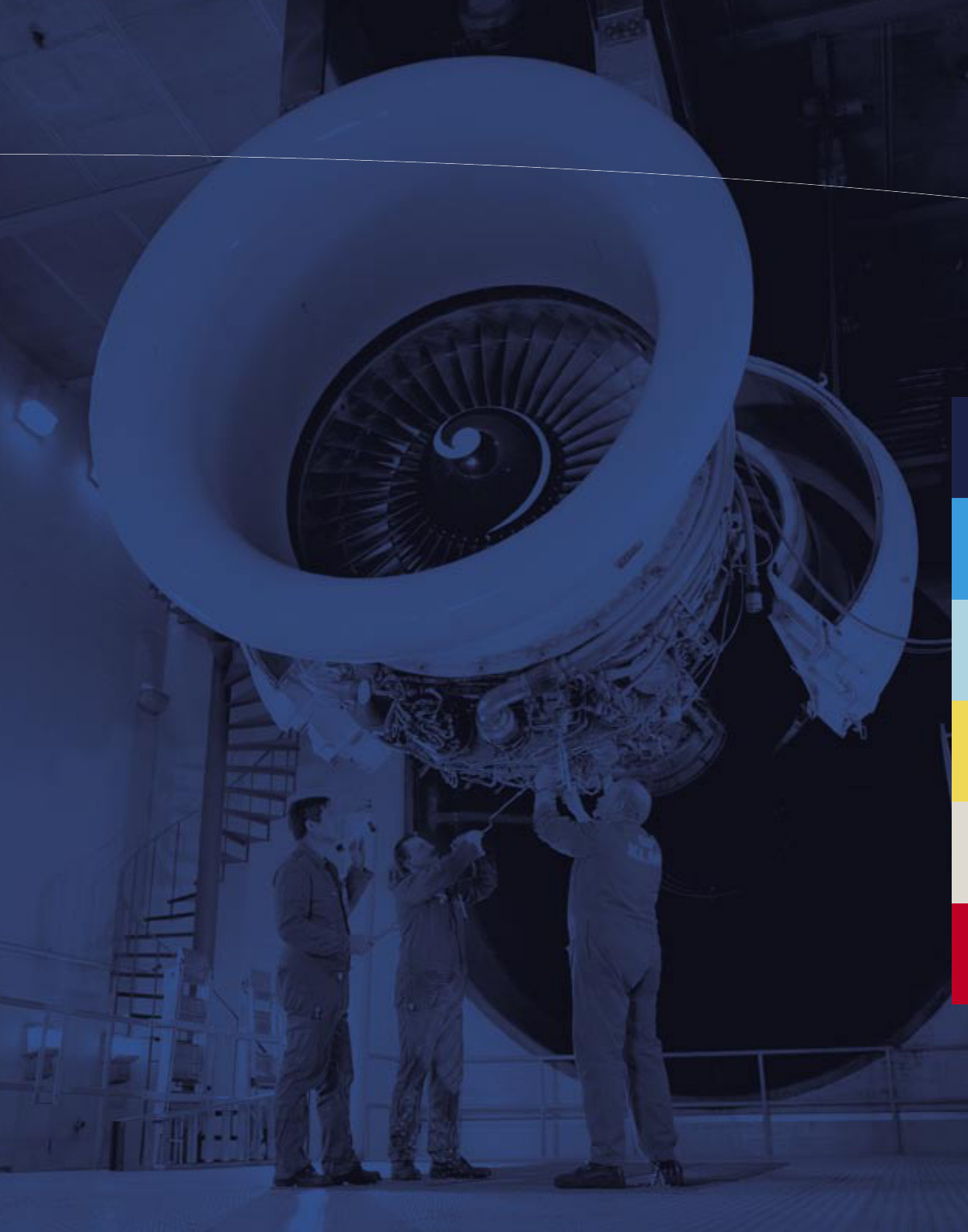
202
Additional
information
Entrées de Chapitres UK.indd 19 11/07/05 15:44:36

Comments on the financial results
Air France, which became Air France–KLM, launched a public
exchange offer for the shares of KLM in May 2004. At the end
of this offer and taking into account the additional purchases
made during the year, the stake in KLM was 97.3% at March
31
st
2005.
The scope of consolidation of the Air France-KLM group
includes KLM and its consolidated subsidiaries, which
have been fully consolidated since May 2004 (11 months of
activity).
To enable the comparison of data, unaudited pro forma
consolidated financial statements were prepared for the
year ended March 31
st
2004, based on a consolidation
identical to that used at March 31
st
2005.
1. Results for the year ended March 31
st
2005
1.1 Operating revenues
Consolidated revenues for the period totaled 19.1 billion euros, up
7.3% from the previous year on a pro forma basis.
All sectors recorded growth, particularly the passenger and cargo
segments which grew 6.8% and 9.4% respectively.
As of March 31,
In EUR million
2005
Air France-KLM
2004
unaudited
pro forma
Variation
2004
Air France
published
Operating revenues 19,078 17,782 + 7.3% 12,337
Gross operating income before
operating leases
2,873 2,716 +5.8% 1,776
Operating income before aircraft
disposals
489 405 + 20.7% 132
Aircraft and financial disposals 8 9 NA 7
Income (loss) before income tax
and minority interests
455 341 + 33.4% 100
Net income group share 351 292 + 20.2% 93
Net earnings per share (in
€) 1.36 1.13 +20.4% 0.43
The comments hereafter are the result of the comparison of data of March 31
st
, 2005 with pro forma consolidated financial
statements for the year ended March 31
st
2004.
106
Entrées de Chapitres UK.indd 20 11/07/05 13:48:09

107
1.2 Operating income and charges
Operating income and charges rose 7.0% from 17.4 billion
euros to 18.6 billion. This change, although lower than the
growth in revenues, primarily reflects fuel costs which jum
-
ped significantly because of higher oil prices.
Group unit costs per equivalent available seat-kilometer were
stable (+0.1%) and declined 2.8% with constant currency and
oil prices.
External expenses rose from 9.8 billion euros to 10.8 billion
euros – an increase of 3.1% excluding the impact of higher oil
prices as described above.
They break down as follows:
As of March 31,
In EUR million
2005
Air France-KLM
2004
unaudited
pro forma
Change
%
Aircraft fuel 2,653 1,990 33.3%
Chartering costs 558 502 11.2%
Aircraft operating leases
630 608 3.6%
Landing fees and en route charges
1,460 1,373 6.3%
Catering 402 376 6.9%
Handling charges 1,067 1,078 (1.0)%
Aircraft maintenance costs
621 616 0.8%
Commercial and distribution costs
1,399 1,439 (2.8)%
Other external expenses
1,897 1,797 5.6%
Total
10,687 9,779 9.3%
• Aircraft fuel
Fuel costs increased 33.3% to 2.65 billion euros from 1.99
billion at March 31
st
2004. Options and hedges represen-
ted a gain of 375 million euros.
This rise was due to a 5.2% increase in volumes, a 44.6%
increase in oil prices, a favorable currency effect of 6.5%,
and hedging gains of 12.4%.
• Chartering costs
Chartering costs rose 11.2% to 558 million euros compared
with 502 million euros at the previous March 31, driven by an
increased use of code sharing with certain partners (such as
Korean Air, Japan Airlines, Vietnam Airlines) and the introduc
-
tion of the new «Dedicate» product from Air France, which
required chartering of special A 321 aircraft.
• Aircraft operating leases
Aircraft operating leases amounted to 630 million euros, a 3.6%
increase from 608 million euros in the previous period.
03-FINANCIER UK.indd 107 11/07/05 13:48:30

108
• Landing fees and en route charges
Landing fees and en route charges rose 6.3% to 1.46 billion
euros from 1.37 billion at March 31
st
2004. This change reflects
the increase in traffic and route fees in the Africa region and
landing fees in Africa and France.
• Catering
With the increase in passenger numbers, catering costs rose
6.9% to 402 million euros (376 million at March 31
st
2004).
• Handling charges
Handling charges declined 1% to 1.07 billion euros.
• Aircraft maintenance costs
These costs totaled 621 million euros, virtually unchanged from
March 31
st
, 2004.
• Commercial and distribution costs
At 1.40 billion euros, commercial and distribution costs were
down 2.8% (1.44 billion euros at March 31
st
2004).
• Other external expenses
Other external expenses totaled 1.90 billion euros at March
31
st
2005 compared with 1.80 billion at March 31
st
2004.
Personnel costs came to 5.9 billion euros compared with
5.7 billion euros at March 31
st
2004, representing an increase
of 4.2%, while the work force declined 0.6% to 102,077
employees. This increase is mainly the result of changes in the
French social security system, whereby the working week was
reduced to 35 hours; a charge of 16 million euros corresponding
to the employer’s contribution was made in the offering reser
-
ved for employees by the French state following the sale of a
portion of the state’s interest.
Taxes other than income tax totaled 226 million euros
versus 210 million euros in the previous year.
Gross operating result before aircraft operating leases
came to 2.87 billion euros, up from 2.72 billion euros at March
31
st
2004, an increase of 5.8%.
Gross operating result totaled 2.24 billion euros at March 31
st
2005, up 6.4% from 2.11 billion euros at March 31
st
2004.
Amortization, depreciation and provisions remained stable
at 1.72 billion euros at March 31
st
2005.
Operating income rose 83 million euros to total 497 million
euros from the previous year’s 414 million euros.
In EUR million
2005 2004
Operating
revenues
Operating
income
Operating revenues
Operating income
Pro forma
Published Pro forma Published
Passenger 15,004 312 14,044 10,260 274 67
Cargo 2,492 95 2,277 1,412 59 15
Maintenance 777 48 747 508 55 50
Other 805 42 714 157 26 7
Total
19,078 497 17,782 12,337 414 139
The breakdown of revenues and operating income by activity is as follows:
03-FINANCIER UK.indd 108 11/07/05 13:48:30

109
Net financial charges came to 219 million euros at March
31
st
2005, an increase of 32 million euros over March 31
st
2004. This change is mainly due to currency effects and
financial provisions.
Pre-tax income totaled 324 million euros, a substantial
improvement of 114 million over 210 million euros at March
31
st
2004.
Share in net income of equity affiliates was 73 million
euros at March 31
st
2005, identical to the amount at March
31
st
2004.
Amortization of goodwill amounted to 58 million euros.
This positive net amount was primarily due to the reversal
of the negative goodwill amortized over a 5-year period and
recognized at the time of the first consolidation of the KLM
group.
Income tax was 96 million euros, up from 40 million at March
31
st
2004, giving an apparent effective tax rate of 29.6%
compared with 19.0% the previous fiscal year.
Net income Group share rose to 351 million euros at March
31
st
2005 compared with 292 million at March 31
st
2004.
This result breaks down by quarter as follows: 95 million euros
in the first quarter, 201 million in the second quarter, 61 million
euros in the third quarter, and (6) million euros in the fourth.
2. Parent company financial results
The agreements for the merger of Air France and KLM provided
for the formation of a holding company Air France-KLM that
holds the two operational companies Air France and KLM.
The group’s holding company was formed from Air France’s
contribution (which then became Air France-KLM) of almost all
its assets and liabilities to the operational company Air France,
now known as Société Air France.
The contribution operations were approved by the Sharehol-
ders’ General Meeting of September 15
th
2004.
As a holding company, Air France-KLM has no operational
activity. The operating result was a loss of 30 million euros, pri-
marily representing the costs to purchase the shares of KLM,
the auditors’ fees, and the percentage of payroll and related
costs reinvoiced by Air France for corporate officers.
The net loss was 33 million euros after interest and income
taxes.
For the 2004–05 financial year, the Shareholders’ General Mee
-
ting will be asked to approve a dividend of 15 euro cents.
Over the last three years, the following dividends were paid
out:
- Fiscal year 2001-02 dividend of 10 euro cents (15 cents with
tax credit).
- Fiscal year 2002-03 dividend of 6 euro cents (9 cents with
tax credit).
- Fiscal year 2003–04 dividend of 5 euro cents (7.5 cents with
tax credit).
03-FINANCIER UK.indd 109 11/07/05 13:48:30

110
Investment and financing
Capital expenditures on tangible and intangible assets and
acquisitions of subsidiaries and equity interests totaled
1.63 billion euros, an increase of 27.3% on the previous year
(1.28 billion euros).
Investments for acquisitions of subsidiaries and equity
interests for fiscal 2004-05 show a positive cash flow in
the amount of 506 million euros. They primarily reflect the
cash and cash equivalents of the KLM group on the date of
acquisition for 575 million euros, and the exercise of options on
Air France-KLM shares under the pilots’ option program
(32 million euros). They also include the additional shares in the
Servair group in the amount of 7 million euros. Investments for
the year ending March 31, 2004 primarily reflect the purchase of
additional Servair stock (for 6 million euros) and the subscription
to the new Opodo cash call (for 4 million euros).
Regarding investments in property, plant and equipment,
the Air France group took delivery of four Airbus A318,
one Airbus A319, five Airbus A320, one Airbus A321 and
four Boeing 777. The KLM group took delivery of one Boeing
B737-900, one Boeing B737-800 and one Boeing 777.
Air France’s regional companies took delivery of four
Embraer 120, one Embraer 145, one CRJ 700, and four
BAE146. KLM’s regional companies took delivery of one Fokker
70 and one Fokker 100. Installment payments continued on
future acquisitions planned for the fleet in the coming years
(Airbus A318, A319, A330 and A380, and for the B737,
B777-200/300 and B747-400ER Cargo).
Notable among ground investments were the completion of the
new E.O.L.E. industrial unit in the Paris region, the construction
of the new flight crew residence at the Roissy complex, and
the initial studies on the hangars to house the Airbus A380.
Other ground investments and intangible investments were
purchases of software applications and computer equipment.
KLM spent 124 million euros on non-aircraft investments. They
were primarily related to a new shop for engine maintenance
and new buildings specifically designed for maintenance.
Disposals of subsidiaries and equity interests totaled
109 million euros and disposals of tangible and intangible
assets amounted to 131 million euros (391 million euros in
2003-04). The Group recorded the sale of the equity interests
and aircraft listed in the previous sections «disposals of aircraft»
and «disposals of subsidiaries and equity interests». In addition,
this item includes a capital repayment of 5 million euros by
AFPL. Dividends received in the amount of 27 million euros
consisted mainly of the dividends from the Amadeus group
(15 million euros) and other unconsolidated subsidiaries.
Overall, cash flows used in investing activities show a net
disbursement of 1.36 billion euros, compared with 849 million
euros in fiscal 2003-04, an increase of 60%.
This net disbursal of cash used in investing activities was largely
covered by cash flows from operating activities, which totaled
1.95 million euros.
The Group’s net financial liabilities, which were 2.53 billion
euros in March 2004, totaled 5.55 billion euros in March
2005. This increase is due primarily to the consolidation of the
KLM group on May 1, 2004. On that date, the net debt of the
KLM group was 3.38 billion euros; it was 3.02 billion euros at
March 31, 2005, a decline of 11.9% over fiscal year 2004-05.
As a result, the gearing ratio (net debt to equity) rose from 0.62
at March 31, 2004 to 1.06 at March 31, 2005.
Concerning funds raised, Air France-KLM continued its active
policy of reimbursing debt maturing in the year ended March
31, 2005 and supporting its investment program.
03-FINANCIER UK.indd 110 11/07/05 13:48:30

111
Debt repayments totaled 645 million euros, primarily covering:
- financial debt in the amount of 285 million euros;
- liabilities for financial leases of 360 million euros, which
represent 167 million euros for the Air France group and 193
million euros for the KLM group.
To cover refinancing needs, the Air France-KLM group raised
858 million euros over the year ending March 31, 2005, primarily
through financing secured by assets (mortgages and financial
leases) with the Group’s commercial banking partners.
Overall, Air France-KLM conducted a proactive refinancing
policy in a context that continues to be particularly sensitive in
terms of the financial markets’ receptiveness to the air transport
sector. Generally, the financing terms were not affected by this
environment and enabled Air France-KLM to keep the interest
rate on its debt just slightly above 4%.
The Group’s liquidity position has improved: at the end of the
year, it had 2.3 billion euros in marketable securities, including
655 million euros from the consolidation of the KLM group, plus
the credit line of 1 billion euros, renewed in the amount of 1.2
billion euros in April 2005 and still available and undrawn
03-FINANCIER UK.indd 111 11/07/05 13:48:31

112
In April 2005, Air France successfully placed 450 million in
bonds convertible or exchangeable for Air France-KLM shares
(OCEANE) on the capital markets. The 21,951,219 Air France
bonds with a unit face value of 20.50 euros give the right to the
allotment of new and/or existing shares of Air France-KLM on
the basis of one share per bond. This allotment may be made
at any time on or after June 1
st
2005 and no later than March
25
th
2020.
During fiscal year 2004–05, Air France and the other air carriers
that are shareholders of Amadeus initiated negotiations with
private equity funds in order to launch, through a company in
which they will be shareholders, a tender offer for Amadeus at a
price of 7.35 euros per share. This LBO will allow Air France to
externalize its potential gain, while remaining a shareholder of
Amadeus, and to obtain gross cash of about 800 million euros.
The documents required to obtain authorization of the offering
were filed with the Spanish Financial Markets Commission on
April 8
th
2005. The offer takes place from May 25, 2005 until
June 27, 2005 included.
For the current year, the Air France-KLM group has made the
following assumptions:
• an average increase in capacity of 5% on the initial program
planned for 2004–05;
• a stable unit revenue per available seat-kilometer excluding
currency impact;
• a euro/dollar exchange rate of 1.30;
• an oil bill of 3.37 billion euros on the basis of a final purchase
price of USD 553 dollars per ton of jet fuel;
• synergies of 165 million euros from the merger;
• capital investments of 2.4 billion euros, the financing of which
will generally be provided by cash flow from operations and the
800 million in cash earned from the Amadeus operation.
Based on these assumptions, and assuming cost control efforts
continue, the target of the Air France-KLM group is to record an
operating income comparable to that of the previous year.
Subsequent events and Outlook
03-FINANCIER UK.indd 112 11/07/05 13:48:31

113
Consolidated income statement
As of March 31,
In EUR million
Notes
2005
Air France-KLM
2004
Pro forma
unaudited
2004
Air France
published
2003
Air France
published
Operating revenues
4
19,078 17,782 12,337 12,687
External expenses
5
(10,687) (9,779) (6,754) (7,174)
Salaries and related costs
6
(5,922) (5,685) (4,079) (3,856)
Taxes other than income tax
(226) (210) (186) (187)
Gross operating result
2,243 2,108 1,318 1,470
Charge to depreciation/amortization
7
(1,586) (1,587) (1,184) (1,195)
Charge to operating provisions
7
(134) (88) (46) (115)
Gain on disposal of flight equipment
8 9 7 30
Other operating income and charges
8
(34) (28) 44 2
Operating income 497 414 139 192
Restructuring costs
9
(21) (22) (22) (13)
Net financial charges
10
(219) (187) (60) (85)
Gains on disposals of subsidiaries and affiliates
11
67 5 5 4
Pre-tax income (loss)
324 210 62 98
Share in net income of equity affiliates
16.1
73 73 53 29
Amortization of goodwill
14 et 22
58 58 (15) (16)
Income (loss) before income tax and minority interests
455 341 100 111
Income tax
12
(96) (40) (2) 13
Income (loss) before minority interests
359 301 98 124
Minority interests
(8) (9) (5) (4)
Net income (loss) 351 292 93 120
Earnings (loss) per issued share as of March 31
1.30 1.08 0.42 0.55
Earnings (loss) per share
- basic
13
1.36 1.13 0.43 0.55
- diluted
1.36 1.13 0.43 0.55
2004 pro forma: consolidation of the Air France group, including KLM and its subsidiaries over 11 months, identical to the
method used at March 31, 2005.
03-FINANCIER UK.indd 113 11/07/05 13:48:31

Consolidated balance sheet
Assets
As of March 31,
In EUR million
Notes
2005
Air France-KLM
2004
Air France
published
2003
Air France
published
Consolidation goodwill
14
83 95 112
Intangible fixed assets
14
159 149 171
Flight equipment
15
10,917 6,951 7,284
Other property and equipment
15
1,837 955 878
Investments in equity affiliates
16.1
564 336 316
Other investments
16
548 268 260
Total fixed assets
14,108 8,754 9,021
Inventory
17
389 151 220
Trade accounts receivable
18
2,272 1,651 1,432
Income tax receivable
19
97 101 111
Other accounts receivable
18
2,001 494 592
Marketable securities
20
2,254 1,478 1,039
Cash 386 330 193
Total current assets
7,399 4,205 3,587
Total assets
21,507 12,959 12,608
114
03-FINANCIER UK.indd 114 11/07/05 13:48:32

115
Liabilities and stockholders’ equity
As of March 31,
In EUR million
Notes
2005
Air France-KLM
2004
Air France
published
2003
Air France
published
Common stock
21.1
2,290 1,868 1,868
Additional paid-in capital
21.5
390 261 261
Retained earnings (accumulated deficit)
21.6
2,490 1,942 1,862
Cumulative translation adjustment (9) (9) 3
Stockholders’ equity 5,161 4,062 3,994
Minority interests
65 23 33
Stockholders’ equity and minority interests
5,226 4,085 4,027
Provisions for liabilities and charges
22
2,265 1,039 1,095
Financial debt
23
8,268 4,380 4,147
Trade payables
1,905 1,226 1,375
Income tax liability
24
81 21 5
Advance ticket sales and loyalty program
25
1,656 1,008 901
Other payables
26
2,106 1,200 1,058
Total liabilities
16,281 8,874 8,581
Total liabilities and stockholders’ equity
21,507 12,959 12,608
03-FINANCIER UK.indd 115 11/07/05 13:48:32

116
In EUR million
Before allocation
of income
Number
of shares
comprising
common
stock
Common
stock
Add’l
paid-in
capital
Retained
earnings
Treasury
stock
Cumulative
Translation
adjustement
Total
stockholders’
equity
Minority
interests
Total
stockholders’
equity and
minority
interests
March 31, 2002
219,780,887 1,868 261 1,813 - 19 3,961 29 3,990
Dividends paid (28) (28) (2) (30)
Treasury stock
(25) (25) (25)
Impact of changes in
accounting policies
(18) (18) (18)
Translation differences
(16) (16) (1) (17)
Current year net income
120 120 4 124
Changes in scope of
consolidation - 3 3
March 31, 2003
219,780,887 1,868 261 1,887 (25) 3 3,994 33 4,027
Dividends paid (17) (17) (3) (20)
Treasury stock
1 7 8 8
Impact of changes in
accounting policies
(4) (4) (4)
Translation differences
(12) (12) (3) (15)
Current year net income
93 93 5 98
Changes in scope of
consolidation - (9) (9)
March 31, 2004
219,780,887 1,868 261 1,960 (18) (9) 4,062 23 4,085
Issuance of common
stock 49,602,631 422 346 768 768
Contribution of assets (206) 206 - -
Exchange offer costs
(11) (11) (11)
Dividends paid (17) (17) (1) (18)
Treasury stock
9 (1) 8 8
Translation differences
- -
Current year net income
351 351 8 359
Changes in scope of
consolidation - 35 35
March 31, 2005
269,383,518 2,290 390 2,509 (19) (9) 5,161 65 5,226
Dividend proposed
40 40
Consolidated statements of changes
in stockholders’ equity
03-FINANCIER UK.indd 116 11/07/05 13:48:32

117
As of March 31,
In EUR million
Notes
2005
Air France-KLM
2004
Air France
published
2003
Air France
published
Gross operating result 2,243 1,318 1,470
Other income (expenses) received (paid)
(102) (23) (50)
Foreign exchange gains (losses)
2 3 (9)
Operating cash flows
2,143 1,298 1,411
Changes in working capital 181 54 (150)
Restructuring expenditure
(49) (18) (12)
Interest paid
(352) (163) (189)
Interest received
56 36 58
Income tax paid (received)
(24) (6) (3)
Cash flows from operating activities
1,955 1,201 1,115
Acquisitions of subsidiaries and affiliates
31.2
506 (10) (46)
Purchase of tangible and intangible fixed assets
(2,131) (1,269) (1,410)
Disposals of subsidiaries and affiliates
109 24 8
Proceeds on disposal of tangible and intangible assets
131 391 357
Dividends received
27 15 17
Cash flows from investing activities
(1,358) (849) (1,074)
Issuance of common stock - - 5
New debts 858 901 834
Repayments of debts (285) (345) (745)
Repayments of capital lease obligations (360) (152) (508)
Net decrease (increase) in loans
(79) (29) (29)
Net decrease (increase) in short-term investments
116 35 62
Dividends paid (24) (24) (34)
Cash flows from financing activities
226 386 (415)
Translation differences
(4) (5) (1)
Increase (decrease) in cash and cash equivalents
819 733 (375)
Opening cash and cash equivalents
31.1
1,405 672 1,047
Closing cash and cash equivalents
31.1
2,224 1,405 672
Consolidated statement of cash flows
03-FINANCIER UK.indd 117 11/07/05 13:48:33

118
2.1 Change in accounting methods
No change in accounting method was made during the fiscal
year.
It should be noted that, as of March 31, 2004, the Group has
applied the National Accounting Board recommendation of
April 1, 2003, which excludes seniority bonuses from the scope
of the rules governing pensions, and attaches them to text No.
2000-06 on liabilities. The impact of this first application was
reflected in shareholders’ equity for an amount, net of tax, of
4 million euros.
Note that the Group has also adopted the component-based
approach for recording large-scale maintenance operations on
airframes and engines at April 1, 2002.
Until March 31, 2002, the Company accrued in advance for
estimated costs of major airframe maintenance. Engines main
-
tenance, including the change of parts with limited useful lives,
was incurred as expensed.
In accordance with the CNC (“Conseil National de la Comp
-
tabilité”) statements of July 25, 2002 and January 15, 2003
following the CRC (“Comité de la Réglementation Compta
-
ble”) regulation on liabilities applicable to fiscal years as from
January 1, 2002, and the regulation on the depreciation,
amortization and write-down of assets applicable to fiscal
years as from January 1, 2003, the Group (Air France-KLM
and its air transport subsidiaries) adopted the component
approach in its consolidated financial statements for the
recognition of maintenance operations on airframes and
engines (excluding parts with limited useful lives) under full
ownership and capital leases. The retrospectively assessed
impact of this change in method was recorded in retaining
earnings at the beginning of the period. The impact of this
change in method resulted in a decrease in stockholders’
equity as of April 1, 2002 of 18 million euros (including
tax effect) and an increase in net income for the period of
13 million euros (including tax effect).
Notes to the consolidated financial statements
2. Accounting policies
The consolidated financial statements of the Company are
prepared in accordance with French accounting regulations
applicable for the year ended March 31, 2005.
The term “Air France-KLM” used hereafter refers to the public
limited company (société anonyme) incorporated under French
law, without its consolidated subsidiaries. The term “the Group”
refers to Air France-KLM and its consolidated subsidiaries.
The Group is headquartered in France and is one of the world’s
leading airlines. The Group’s core business is the air transport
of passengers, with other activities including the air transport of
cargo, aircraft maintenance and any other activity linked to air
transport, principally catering and air transport on demand.
1. Business description
2.2 Change in estimate
The combination of the Frequent Flyers loyalty Programs
(cf. §2.8.) and the valuation of new air miles’ redemption as
-
sumptions starting in June 2005 led the Group to adjust the
estimate of the corresponding debt. These changes in esti
-
mates had a positive impact of 10 million euros after tax on
earnings for the financial year ended March 31, 2005.
03-FINANCIER UK.indd 118 11/07/05 13:48:33

119
2.3 Consolidation principles
Companies under the Group’s exclusive control are fully
consolidated.
Companies jointly controlled by a limited number of parties
including the Group are proportionally consolidated.
Companies over which the Group has significant influence in
terms of management and finance policy are accounted for
under the equity method ; significant influence in this case
is deemed to exist where the Group holds 20% or more of
voting rights.
Entities that meet the above defined criteria, but that the Group
does not intend to hold in the long term, are not consolidated.
Are also excluded from the consolidation scope entities in ban
-
kruptcy and those located in countries which do not allow the
funds transferring toward the mother entity. These interests are
valued at their historical cost, depreciated if necessary.
Affiliates over which the Group no longer has significant influen
-
ce are deconsolidated at the lower of their carrying value at the
date of removal from the scope of consolidation and their fair
value to the Group.
All intercompany transactions, including significant asset and
liability transfers between fully-consolidated companies, are
eliminated. The same treatment applies to internal Group items
such as dividends and capital gains. Gains and losses on inter
-
nal transfers between equity affiliates are eliminated up to the
effective percentage interest of the Group in such affiliates.
The fiscal year of certain subsidiaries and affiliates, which are
listed in note 34, ends on December 31. These subsidiaries
and equity affiliates are consolidated by the Group with a time
difference of 3 months, with the exception of Amadeus GTD for
which an interim statement is established. There have been no
significant transactions for such subsidiaries for the period from
January 1, 2005 to March 31, 2005.
The consolidated income statement includes the income sta
-
tements of all companies acquired during the year from the
date of the acquisition. It also includes the income statements
of companies disposed of during the year up to the date of
disposal.
The portion of the earnings or losses of consolidated subsi-
diaries that represent ownership interests other than those of
Air France-KLM (i.e. subsidiaries that are not wholly-owned)
is reflected as a deduction from the determination of consoli-
dated net income as minority interests.
The portion of the Group’s consolidated stockholders’ equity
that is attributable to outside owners of subsidiaries that are
not wholly-owned is reflected in the consolidated balance
sheets as minority interests.
2.4 Translation of financial statements of foreign operations
The financial statements of foreign entities, the activities of
which are not an integral part of those of the reporting enter
-
prise, are translated into euros on the following basis:
• the balance sheet is translated using the exchange rate pre-
vailing at year-end,
• the income statement is translated at the average exchange
rate for the year,
• translation differences resulting from differences between
the opening and closing exchange rates, as well as between
the closing rate and the average exchange rate for the year,
are recorded as Translation differences within Consolidated
stockholders’ equity.
The financial statements of foreign operations, the activities of
which are an integral part of the reporting enterprise, are trans-
lated into euros at historical rates of exchange.
03-FINANCIER UK.indd 119 11/07/05 13:48:33

120
2.6 Exchange rate and interest rate financial instruments
The Group uses a number of financial instruments to limit its
exposure to interest and exchange rate risks. These instru
-
ments are traded on organized markets or on an over-the-
counter basis.
Gains and losses arising on financial instruments used for
hedging purposes are recognized in symmetrical fashion to
the items hedged.
Financial instruments used to hedge future transactions that
are certain or likely to materialize are considered hedging ins
-
truments.
2.7 Operating revenues
For air transportation transactions, revenues are recognized
as and when transportation is completed. Transportation is
also the trigger for the recognition of external charges such
as commissions paid over to agents. These revenues include
a fuel surcharge paid by passengers to offset the increase in
fuel prices.
Upon issue, both passenger and cargo tickets are recorded as
liabilities under «Advance tickets sales».
Revenues representing the value of tickets that have been
issued, but which will never be used, are recognized as
operating income at the date the tickets are issued on a
statistical basis that is regularly updated.
In the industrial maintenance and major maintenance business,
the revenues on flat-rate flight time excluding engines contracts
is booked on the basis of the number of flight hours declared
by the customer. For contracts in industrial activity other than
those described above, the Group records the revenues based
on the costs incurred method. Since April 1, 2004, the flat-rate
contracts for engine flight time have been recorded as costs
are incurred instead of on the basis of flight hours; the impact
of the change is not significant.
2.8 Frequent flyer program
As at March 31, 2005, both Air France and KLM offer their own
frequent flyer loyalty programs (respectively Fréquence Plus
and Flying Dutchman) which enable members to accumulate
air miles when travelling on Air France flights, KLM flights and
certain airline partners. These air miles entitle members to a
variety of benefits such as free Air France or KLM flights.
Due to the combination of the two companies, a new joint
program Flying Blue will be launched in June 2005, which
will accumulate air miles from both current programs.
The probability of converting air miles into Award tickets is esti
-
mated according to a statistical method resulting in a so-called
“redemption” rate that is prudently assessed.
The value of air miles is estimated on the basis of the specific
terms and conditions of use of free tickets. This estimate takes
into consideration the discounted marginal cost of the passen
-
ger concerned (catering, fuel, ticket administration and issue
costs, etc.) and discounted cost of the miles used on partici
-
pating partner companies.
The estimated value of air miles is deducted from revenues and
recorded under the caption “Advance tickets sales and loyalty
program” of the balance sheet, as and when revenue from the
qualifying flight for which air miles are awarded is recognized.
The Group also sells mileage credits in its frequent flyer pro-
grams to participating partners such as credit card companies,
2.5 Foreign currency transactions
Foreign currency transactions are translated at the exchange rate
prevailing on the date of the transaction or at the hedging rate.
Assets and liabilities denominated in foreign currencies are
translated at the year-end rate or, where applicable, at the
hedging rate. All corresponding differences are reflected in the
income statement.
03-FINANCIER UK.indd 120 11/07/05 13:48:34

121
2.9 Information by activity and geographical area
The Group’s activity involves three major sectors: passenger
activities, cargo services and aircraft maintenance.
The Group has defined five discrete geographical sectors, in
which revenues are broken down on the basis of origin of sale
and destination.
• Origin of sale:
Revenues from air transport operations are broken down by
geographical area, based on ticket issuing locations.
Where a third party is responsible for issuance of the ticket,
revenues are allocated to the appropriate location of the
issuing airline.
• Destination:
Revenues for air transport operations are broken down on the
basis of the following:
- Non-stop flights: revenues are allocated to the geographical
network to which the route belongs.
- Stop-over flights: revenues are split between the various sec-
tions of the route in accordance with IATA standards (based
on a weighting of passenger-kilometers).
The Group’s fixed assets mainly consist of flight equipment lo
-
cated in France and in the Netherlands.
2.10 Calculation of earnings per share
Basic earnings per share (before dilution) is obtained by dividing
attributable net income for the year by the average number
of shares outstanding during the year. The average number
of shares outstanding during the current and prior years does
not include treasury stock and is adjusted retrospectively in
respect of bonus share issues or discount share issues.
2.11 Distinction between net income on ordinary activities and extraordinary items
Net income on ordinary activities includes all income and
expenses arising within the Group’s ordinary activities, whether
such income and expenses are recurring or non-recurring.
Unusual items defined as non-recurring income and expenses
by virtue of their incidence, nature and amount (such as
restructuring costs) are recorded within net income on ordinary
activities.
The definition of extraordinary items is restricted narrowly to
unusual income and expenses of major significance.
hotels and car rental agencies. The Group allocates a portion
of the revenues received from the sale of mileage credits to
a component representing the value of the subsequent travel
award to be provided in a manner consistent with the determi
-
nation of the liability for earned flight awards. The remainder is
recognized as income immediately.
03-FINANCIER UK.indd 121 11/07/05 13:48:34

122
2.14 Impairment of goodwill and other intangible fixed assets
The Group records impairment charges on goodwill and other
intangible assets when events and circumstances indicate that
the assets are impaired and the discounted cash flow estima
-
ted to be generated by those assets are less than the carrying
amount of those assets. Measurement of any potential impair
-
ment on goodwill and other intangible assets is based on dis
-
counted cash flows.
2.15 Tangible fixed assets
Tangible fixed assets are stated at historical cost of acquisition
or manufacture.
From April 1, 1997, interest incurred in connection with the
financing of capital expenditure (including flight equipment) du
-
ring the period prior to commissioning is capitalized within the
overall cost of the asset concerned and depreciated over the
useful life of the related asset. The interest rate adopted is the
average interest rate for debts outstanding at the end of the
year in question unless capital expenditure or advance pay
-
ments are themselves funded by specific loans.
The Group accounts for lease arrangements as capital lease
when such arrangements include a bargain purchase option
provision. The related assets are recorded in the balance sheet
at historical cost and depreciated over the useful life of the
related asset. Obligations arising under the lease are recorded
as liabilities in the consolidated balance sheet.
Maintenance costs are expensed, with the exception of those
major maintenance programs which extend the useful life of the
asset or increase its overall value, and which are, as a result,
capitalized (maintenance on airframes and engines excluding
parts with limited useful lives).
A) Flight equipment
Flight equipment is acquired in foreign currency and translated
at prevailing exchange rates or hedging rates where a hed
-
ging instrument has been used. Manufacturers’ discounts are
usually deducted from the value of the asset in question.
Aircraft are depreciated using the straight-line method over
their average estimated useful life. From April 1, 1997, this
useful life has been estimated at 18 years, with an estimated
residual value of 10% of original cost.
Aircraft fixtures and fittings acquired from April 1, 1997 are
separated from the total acquisition cost of the aircraft and
2.12 Goodwill and negative goodwill
Goodwill is recognized upon first-time consolidation after
allocation to the various identifiable assets and liabilities.
Amounts of goodwill are amortized on a straight-line basis
over periods determined in each case but which do notexceed
20 years.
Negative goodwill is recognized in the income statement over
the period of time that the Group deems reasonable conside-
ring the expected synergies and the costs incurred in achieving
them.
2.13 Other intangible fixed assets
Business goodwill (“Fonds de commerce”) acquired in con-
junction with the acquisition of UTA in 1990 is being amortized
on a straight-line basis over a period of 20 years.
Software and licenses are amortized on a straight-line basis
over periods of between one and four years.
03-FINANCIER UK.indd 122 11/07/05 13:48:34

123
2.16 Investments
Investments in non-consolidated companies and other long-
term equity investments are stated in the balance sheet at cost
net of provisions for impairment in value. A provision for im
-
pairment is recorded where the fair value at the reporting date
is lower than acquisition cost. Increases and decreases in this
provision are recorded in the consolidated income statements.
The fair value of investments corresponds to the utility value to
the Group. This value is determined based on the Group’s sha
-
re of net equity (subject to fair value adjustments), profitability
forecasts and, for listed companies, changes in stock prices.
Other financial assets which are primarily comprised of depo-
sits, are valued at the lower of cost or market value.
2.17 Inventories
Inventories consist primarily of expendable parts related to
flight equipment and are initially recorded at cost. A provision
is recorded to reduce inventory values at the lower of cost or
realizable value.
Cost represents acquisition cost or manufacturing cost, the
latter including direct and indirect production costs incurred
under normal operating conditions.
Inventories are valued on a weighted average basis. A provi-
sion for obsolescence is recorded based on respective inven
-
tory ages.
depreciated using the straight-line method over a period of five
years, corresponding to their average useful lives.
Fixtures and fittings related to aircraft acquired prior to April 1,
1997 are depreciated over the same period as the aircraft to
which they relate (18 years). Following the change in method
described in note 2.1, beginning April 1, 2002, airframe and
engine potential (excluding parts with limited useful lives) is se
-
parated from the acquisition cost of aircraft and amortized over
the period until the next scheduled maintenance operation.
In addition, the estimated costs of major maintenance opera
-
tions (airframes and engines excluding parts with limited useful
lives) to be performed according to specifications and schedu
-
les defined by manufacturers and government authorities are
capitalized and amortized over the future period separating the
maintenance operations.
Spare parts, other than consumables, are recorded in the con
-
solidated balance sheet as fixed assets. Useful lives vary from
3 to 18 years depending on the technical characteristics of
each. Furthermore, depending on estimated use and conside
-
ration of retirement decisions pertaining to the specific fleet to
which the spare parts relate, the Group revises the depreciation
period accordingly.
B) Other property and equipment
Other property, plant and equipment is depreciated using the
straight-line method over its estimated useful life as follows:
Buildings 30 years
Fixtures and fittings 8 to 15 years
Flight simulators 10 to 20 years
Equipment and tooling 5 to 15 years
C) Impairment of flight equipment
When events and circumstances indicate that these assets
need to be impaired, the Group assesses the existence of
impairment losses at the entire aircraft fleet level under full
ownership or capital leases and capitalized spare parts in
comparison with the higher of their recoverable value or the
discounted cash flows expected from their use.
03-FINANCIER UK.indd 123 11/07/05 13:48:34

124
2.21 Provisions for restitution for aircraft under operating leases
The Group accrues for restitution costs related to aircraft under
operating leases as soon as the asset does not meet the return
condition criteria set as per the lease arrangement between
the Group and the lessor. When the condition of the aircraft
exceeds the return condition criteria set as per the lease
arrangement, the company capitalizes the related amount in
excess. Such amount is further amortized on a straight-line
basis over a period ending when the restitution criteria is met.
2.20 Retirement benefit and similar obligations
The Group’s obligations in respect of defined benefit pension
schemes and lump-sum termination payments on retirement
are calculated using the projected credit method, taking into
consideration specific economic conditions prevailing in the
various countries concerned. These obligations are covered
either by pension and/or plan assets.
The company recognizes a portion of its actuarial gains or los
-
ses as income or expense if the net cumulative unrecognized
actuarial gains or losses at the end of the previous reporting
period exceeded the greater of:
- 10% of the present value of the defined benefit obligation at
that date (before deducting plan assets); and
- 10% of the fair value of any plan assets at that date.
The portion of actuarial gains or losses recognized directly is
the excess determined above, divided by the expected ave-
rage remaining working lives of the employees participating
in the plan.
Provisions for these plans are valued and recorded in accor
-
dance with IAS 19 Employee Benefits.
2.19 Treasury stock
The acquisition cost of interests in the common stock of
Air France-KLM held other than temporarily by consolida
-
ted companies is deducted from consolidated stockholders’
equity. Gains and losses on disposal of such securities are
taken to stockholders’ equity.
Treasury stock held for future allocation related to stock op
-
tions and stock compensation plans is recorded at cost in
marketable securities. A provision is recorded to reduce these
shares to the lower of cost or market value.
2.18 Marketable securities
Marketable securities are stated in the consolidated balance
sheet at the lower of cost or market value. For listed securities,
market value is determined using the stock market price at
balance sheet date.
Investments in debt securities are recorded upon acquisition
at nominal value, adjusted for any issue premium or discount.
Accrued interest receivable is also recorded under this heading.
Investments in mutual funds («SICAVs») are recorded at
acquisition cost excluding any entrance charges. Thereafter, they
are stated at net realizable value as of the reporting date. If net
asset value is lower than acquisition cost, a provision is raised.
Negotiable debt securities (deposit certificates and bonds from
financial companies) are recorded at acquisition cost. Interest
income is recognized using an effective interest rate method.
03-FINANCIER UK.indd 124 11/07/05 13:48:35

125
2.22 Other provisions for risks and charges
The Group accounts for provisions for risks and charges when
the occurrence of a risk is estimated to be likely and its amount
can be reliably estimated. The Group evaluates provisions based
on facts and events known at the closing date, from its past
experience and to the best of its knowledge.
2.23 Equity and debt issuance costs - redemption premiums
Debt issuance costs are amortized over the term of the debts
using an effective interest rate method. Common stock is
-
suance and merger costs are deducted from additional paid-in
capital.
Debts are recorded at redemption value. Redemption and issue
premiums are recorded under debts in the balance sheet and
charged to income under net financial items over the term of
the debts.
2.24 Deferred tax
The Group records deferred tax using the liability method for all
timing differences between the tax and book values of assets
and liabilities shown in the consolidated balance sheet, with
the exception of consolidation goodwill and UTA purchased
goodwill.
Net deferred tax balances are determined on the basis of each
entity’s tax position based on tax jurisdiction and taking into
consideration consolidated tax returns when applicable.
Net deferred tax assets relating to timing differences and carry
forward losses are only recognized to the extent that the tax en
-
tity is expected to generate sufficient taxable income in the fu
-
ture to absorb such carry-forward losses or timing differences.
No tax is provided on the undistributed reserves of consolidated
entities unless a distribution is expected in the short term or the
Group has no control over the distribution of reserves.
2.25 Cash flow
Cash and cash equivalents include cash, short-term deposits and
bank overdrafts initially established for less than three months,
and without risk of significant change in valuation.
2.26 Use of estimates
The preparation of financial statements in conformity with
generally accepted accounting principles requires mana
-
gement to make estimates and assumptions that effect the
amounts reported in the consolidated financial statements
and accompanying notes. Actual results could differ from
those estimates.
03-FINANCIER UK.indd 125 11/07/05 13:48:35

126
3.2 Comparability
For the purposes of comparison, a pro forma consolidated sta-
tement of income at March 31, 2004 has been prepared using
methods and consolidation scope identical to those used at
March 31, 2005. The unaudited pro forma income statement
does not necessarily give an indication of the earnings that
would have been achieved by Air France-KLM if the merger
with KLM had actually taken place on the date adopted for
preparing the pro forma income statement.
On the basis of these (still provisional) estimates of the assets and
liabilities as valued on the date of acquisition, the first consolidation
of the KLM group shows “negative goodwill” of 915 million euros.
This has been determined on the basis of an acquisition price
of798 million euros and a share of the shareholders’ equity acqui
-
red of 1,713 million euros. Shareholders’ equity specifically inclu
-
des the adjustment to market value of the KLM group’s fleet for
a total of 924 million euros and the recognition in the item “Other
debtors” of the surplus value of the funds earmarked to cover em-
ployee retirement commitments for a total of 976 million euros.
As some valuations are still in process, this negative goodwill
may be adjusted during the appropriation period available to
the Group, which runs to the end of the fiscal year following the
year of acquisition. This is the case for the value of the funds
allocated to cover pension commitments.
An in-depth review of this accounting standard is currently
being carried out in order to determine whether this item may
be recorded on the balance sheet.
Pending the definitive position from the international accoun
-
ting interpretation committee to whom the issue was sent, the
Group considers that according to accounting standards, this
surplus may be recognized.
However the Group has, as a precautionary measure, chosen
not to amortize the portion of negative goodwill relative to the
excess fund value, after the first quarter of the fiscal year ended
as of March 31
st
, 2005.
The estimated amount of this portion came to 622 million euros
at March 31, 2005. The impact of this amount on income,
had it been amortized in the second, the third and the fourth
quarters, would have generated an increase of approximately
93 million in net income (see note 22.2).
The amortization period retained is five years, reflecting the
length of time that the Group considers reasonable for implemen-
ting the anticipated synergies, and the costs incurred in achie
-
ving them. The allocation for the period totaled 73 million euros
at March 31, 2005.
Negative goodwill is recognized in the item “Provisions for liabili-
ties and charges” on the liabilities side of the balance sheet.
3.1 Scope of consolidation
As of March 31, 2005, the Group comprised 159 companies, of
which 135 are fully consolidated, 3 proportionally consolidated
and 21 were recorded as equity affiliates. The list of companies
within the scope of consolidation is shown in note 34.
As the Exchange Offer closed in May 2004, the Group’s re
-
sults include KLM’s results over a period of eleven months (May
2004 to March 2005). At this date, the Group holds 97.3 % of
the common shares of KLM stock.
Servair group was consolidated with one quarter difference
until March 31, 2004. To make up for this difference, the Ser-
vair group was consolidated over 15 months (January 2004
-March 2005) in the period ended March 31, 2005. In addi
-
tion, the Group increased its stake in the Servair group by 3.1
points, from 94.5% to 97.6%. This additional stock purchase
had no significant impact on the consolidated accounts closed
at March 31, 2005.
During this period, Servair group sets up 2 subsidiaries: Lyon
Air Traiteur and Martinique Catering. Carbag merged with Acna,
a subsidiary of Servair.
Air France transferred on 30 December 2004 all its stake in
Amadeus France to Amadeus GTD. The net income of Ama
-
deus France and its subsidiary Amadeus France Services have
been consolidated within the Group until 30 December 2004.
In addition, the financial companies Nogues and GIE Schiphol
were consolidated as of April 1, 2004.
Proteus Developpement and Proteus Finance merged with
Air France Finance.
3. Changes in the scope of consolidation
03-FINANCIER UK.indd 126 11/07/05 13:48:35

127
4.1 Information by sector of activity
4. Information by activity and geographical area
The various sources of the company’s operating revenues are
described below:
Passenger: Passenger operating revenues consist of sche
-
duled passenger and other passenger revenues. Scheduled
passenger operating revenues are derived from passengers
transported on flights which have the company’s code, inclu-
ding flights that are operated by other airlines pursuant to code
sharing agreements. Other passenger operating revenues are
derived from commissions from SkyTeam alliance partnership
arrangements, revenues from block-seat sales, information
systems revenues and excess baggage receipts.
Cargo: Cargo operating revenues are subdivided into freight
transportation and other cargo operating revenues. Operating
revenues from freight transportation consist of the transpor-
tation of cargo on flights which have the company’s code,
including flights that are operated by other airlines pursuant
to code sharing agreements. Operating revenues from other
cargo transportation are derived principally from sales of cargo
capacity to third parties.
Maintenance: Maintenance operating revenues are generated
by maintenance services to other airlines companies and other
clients throughout the world.
Other: Other operating revenues currently consist of catering
and handling revenues provided by the Group to other compa
-
nies and to the on request air transport mainly made by Tran
-
savia.
Consolidated sales revenues, for the period ended March 31,
2005, totaled 19.1 billion euros, an increase of 7.3% over
revenues for the previous pro forma period. This increase was
generated by all activity sectors, particularly passengers and
cargo.
Operating income rose from 83 to 497 million euros against
414 million euros at March 31, 2004 with pro forma data. All
activities made a positive contribution to this result; passenger
activity grew from 274 million euros to 312 million euros.
2005
Air France-KLM
2004
Pro forma unaudited
2004
Air France published
As of March 31,
In EUR million
Operating
revenues
Operating
income
Property
and
equipment
Operating
revenues
Operating
income
Operating
revenues
Operating
income
Property
and
equipment
Passenger 15,004 312 9,262 14,044 274 10,260 67 6,688
Cargo 2,492 95 972 2,277 59 1,412 15 371
Maintenance 777 48 1,300 747 55 508 50 759
Others 805 42 1,220 714 26 157 7 88
Total
19,078 497 12,754 17,782 414 12,337 139 7,906
03-FINANCIER UK.indd 127 11/07/05 13:48:35

128
4.2 Analysis of operating revenues by geographical area of sale
In EUR million
Europe
North Africa
Caribbean
French Guiana
Indian Ocean
Africa
Middle East
Americas
Polynesia
Asia
New Caledonia
Total
Year ended March 31, 2005
Scheduled passenger 9,711 (68.8%) 348 (2.5%) 937 (6.7%) 1,994 (14.2%) 1,095 (7.8%)
14,085
Other passenger revenues
672 (73.1%) 57 (6.2%) 36 (3.9%) 54 (5.9%) 100 (10.9%)
919
Total passenger
10,383
(69.2%)
405
(2.7%)
973
(6.5%)
2,048
(13.6%)
1,195
(8.0%)
15,004
Scheduled cargo 1,081 (47.0%) 41 (1.8%) 157 (6.8%) 266 (11.6%) 755 (32.8%)
2,300
Other cargo revenues
132 (68.7%) 4 (2.1%) 7 (3.6%) 22 (11.5%) 27 (14.1%)
192
Total cargo
1,213
(48.6%)
45
(1.8%)
164
(6.6%)
288
(11.6%)
782
(31.4%)
2,492
Maintenance 769 (99.0%) - - - - - - 8 (1.0%)
777
Others 773 (96.0%) 21 (2.6%) 11 (1.4%) - - - -
805
Total 13,138
(68.9%)
471
(2.5%)
1,148
(6.0%)
2,336
(12.2%)
1,985
(10.4%)
19,078
Year ended March 31, 2004 (Pro forma unaudited)
Scheduled passenger 9,078 (68.9%) 390 (3.0%) 895 (6.8%) 1,785 (13.6%) 1,008 (7.7%)
13,156
Other passenger revenues
697 (78.4%) 29 (3.3%) 47 (5.3%) 69 (7.8%) 46 (5.2%)
888
Total passenger
9,775
(69.6%)
419
(3.0%)
942
(6.7%)
1,854
(13.2%)
1,054
(7.5%)
14,044
Scheduled cargo 1,038 (49.8%) 43 (2.1%) 143 (6.9%) 236 (11.3%) 624 (29.9%)
2,084
Other cargo revenues
135 (69.9%) 5 (2.6%) 7 (3.6%) 21 (10.9%) 25 (13.0%)
193
Total cargo
1,173
(51.5%)
48
(2.1%)
150
(6.6%)
257
(11.3%)
649
(28.5%)
2,277
Maintenance 740 (99.1%) - - - - - - 7 (0.9%)
747
Others 698 (97.8%) 11 (1.5%) 5 (0.7%) - - - -
714
Total
12,386
(69.6%)
478
(2.7%)
1,097
(6.2%)
2,111
(11.9%)
1,710
(9.6%)
17,782
Year ended March 31, 2004 (Published)
Scheduled passenger 6,734 (71.1%) 348 (3.7%) 577 (6.1%) 1,169 (12.4%) 637 (6.7%)
9,465
Other passenger revenues
633 (79.7%) 28 (3.5%) 40 (5.0%) 56 (7.0%) 38 (4.8%)
795
Total passenger
7,367
(71.8%)
376
(3.7%)
617
(6.0%)
1,225
(11.9%)
675
(6.6%)
10,260
Scheduled cargo 676 (53.5%) 40 (3.2%) 86 (6.8%) 134 (10.6%) 328 (25.9%)
1,264
Other cargo revenues
115 (77.7%) 5 (3.4%) 4 (2.7%) 15 (10.1%) 9 (6.1%)
148
Total cargo
791
(55.9%)
45
(3.2%)
90
(6.4%)
149
(10.6%)
337
(23.9%)
1,412
Maintenance 501 (98.6%) - - - - - - 7 (1.4%)
508
Others 143 (91.1%) 11 (7.0%) 3 (1.9%) - - - -
157
Total
8,802
(71.3%)
432
(3.5%)
710
(5.8%)
1,374
(11.1%)
1,019
(8.3%)
12,337
03-FINANCIER UK.indd 128 11/07/05 13:48:36

129
In EUR million
Europe
North Africa
Caribbean
French Guiana
Indian Ocean
Africa
Middle East
Americas
Polynesia
Asia
New Caledonia
Total
Year ended March 31, 2005
Scheduled passenger 6,044 (42.9%) 1,124 (8.0%) 1,920 (13.6%) 2,939 (20.9%) 2,058 (14.6%)
14,085
Scheduled cargo 192 (8.4%) 178 (7.7%) 279 (12.1%) 652 (28.3%) 999 (43.5%)
2,300
Total
6,236
(38.1%)
1,302
(7.9%)
2,199
(13.4%)
3,591
(21.9%)
3,057
(18.7%)
16,385
Year ended March 31, 2004 (Pro forma unaudited)
Scheduled passenger 5,794 (44.1%) 1,215 (9.2%) 1,752 (13.3%) 2,708 (20.6%) 1,687 (12.8%)
13,156
Scheduled cargo 206 (9.9%) 169 (8.1%) 255 (12.2%) 575 (27.6%) 879 (42.2%)
2,084
Total
6,000
(39.4%)
1,384
(9.1%)
2,007
(13.2%)
3,283
(21.5%)
2,566
(16.8%)
15,240
Year ended March 31, 2004 (Published)
Scheduled passenger 4,525 (47.8%) 1,023 (10.8%) 1,058 (11.2%) 1,850 (19.5%) 1,009 (10.7%)
9,465
Scheduled cargo 181 (14.3%) 153 (12.1%) 154 (12.2%) 342 (27.1%) 434 (34.3%)
1,264
Total 4,706
(43.9%)
1,176
(11.0%)
1,212
(11.3%)
2,192
(20.4%)
1,443
(13.4%)
10,729
4.3 Analysis of traffic revenues by geographical area of destination
Changes in sales revenues varied by geographic region; thus,
the change on a pro forma basis included a 0.8 point increase
from Asia and 0.3 point from the Americas, while the Europe, the
Africa-Middle East region and the West Indies-Caribbean-Indian
Ocean markets fell by 0.7, 0.2 and 0.2 point respectively.
Changes in revenues by network on a pro forma basis also
showed variations. Asia’s share of revenues rose 1.9 points,
Africa-Middle East gained 0.2 and America gained 0.4, while
the share of the markets in the West Indies-Caribbean-Indian
Ocean, Europe fell by 1.2 and 1.3 point respectively.
03-FINANCIER UK.indd 129 11/07/05 13:48:37

130
5. External expenses
External expenses were up 9.3 % at March 31, 2005, increasing
from 9.8 billion euros to 10.7 billion euros. This change, close
to the growth in the Group’s available seats (+ 7,3 % in EASK),
is due primarily to fuel costs which rose significantly because
of the surge in oil prices. Excluding fuel, the growth in external
expenses was limited to 3.1%.
Chartering costs rose 11.2 % to 558 million euros at March 31,
2005, up from 502 million euros in the previous year, due to
greater use of code shares with some of our partners (such as
Korean Air, Japan Airlines, and Vietnam Airlines) and as a result
of the implementation of Air France’s new «Dedicate» product.
“Other external expenses” primarily correspond to leasing and
insurance expenses.
As of March 31,
In EUR million
2005
Air France-KLM
2004
Pro forma
unaudited
2004
Air France
published
Variation
Aircraft fuel
2,653 1,990 1,302 33.3%
Chartering costs 558 502 414 11.2%
Aircraft operating lease costs
630 608 458 3.6%
Landing fees and en route charges
1,460 1,373 913 6.3%
Catering 402 376 296 6.9%
Handling charges and other operating costs 1,067 1,078 756 -1.0%
Aircraft maintenance costs
621 616 381 0.8%
Commercial and distribution costs
1,399 1,439 1,051 -2.8%
Other external expenses
1,897 1,797 1,183 5.6%
Total
10,687 9,779 6,754 9.3%
Excluding Aircraft fuel
8,034 7,789 5,452 3.1%
03-FINANCIER UK.indd 130 11/07/05 13:48:37

131
6. Salaries and number of employees
Personnel costs increased to 5.9 billion euros compared with
5.7 billion euros at March 31, 2004 based on pro forma data,
representing an increase of 4.2%, with personnel on a constant
structural basis down by 0.6% at 102,077 employees (pro forma
data). This increase is primarily the result of a reduction in the
allowances for social costs that had been granted, in France, for
the change to the 35-hour working week.
6.1 Salaries and related costs
As of March 31,
In EUR million
2005
Air France-KLM
2004
Pro forma
unaudited
2004
Air France
published
Variation
By cost category
Wages and salaries
4,402 4,258 2,955 3.4%
Pension contributions 429 411 248 4.4%
Other social contributions 1,091 1,016 876 7.4%
Total
5,922 5,685 4,079 4.2%
6.2 Average number of employees
As of March 31,
2005
Air France-KLM
2004
Pro forma
unaudited
2004
Air France
published
Variation
Total
102,077 102,722 71,654 -0.6%
Flight deck crew
7,786 7,799 5,041 -0.2%
Cabin crew
19,829 19,574 13,044 1.3%
Groundstaff
74,462 75,349 53,569 -1.2%
Management 12,996 12,676 9,159 2.5%
Supervisors 29,364 29,369 21,126 0.0%
Other staff
32,102 33,304 23,284 -3.6%
Pilots and cabin crew
25,995 25,640 17,140 1.4%
Instructors 956 1,037 620 -7.8%
Management 664 696 325 -4.6%
The above number of employees is calculated on a weighted average basis based on actual paid presence.
03-FINANCIER UK.indd 131 11/07/05 13:48:37

132
6.3 Compensation paid to members of the board of directors and executive committee
The total compensation of the 3 main executives of the Group
was 2.5 million euros for the period ended as at March 31, 2005
(excluding compensation for attendance at Board Meetings). It
was 1.8 million euros for previous pro forma period.
No compensation for attendance at Board Meetings was
disbursed to the Board Members as at March 31, 2005.
7. Depreciation and amortization
8. Other income and charges, net
Other incomes and charges correspond mainly to results of joint
operation of passenger and cargo lines for – 61 million euros
for 2004-05 (- 67 million euros for pro forma previous year) and
to compensation on slot swaps for 7 million euros for 2004-05
(50 million euros for the previous year).
As of March 31,
In EUR million
2005
Air France-KLM
2004
Pro forma
unaudited
2004
Air France
published
Variation
Net charge to depreciation/amortization
1,586 1,587 1,184 -0.1%
- Intangible fixed assets
48 50 37 -4.0%
- Flight equipment
1,300 1,302 996 -0.2%
- Other property, plant and equipment
238 235 151 1.3%
Net charge to operating provisions
134 88 46 N.S
- Fixed assets
3 3 3 N.S
- Inventories
- - - N.S
- Trade receivable
6 16 12 N.S
- Liabilities and charges
125 69 31 N.S
Total
1,720 1,675 1,230 2.7%
03-FINANCIER UK.indd 132 11/07/05 13:48:38

133
9. Restructuring costs
As for fiscal year 2004-05, KLM decided to outsource a part
of its Traffic registration, Interline registration and sales control
activities to third parties in the course of 2005. KLM also de
-
cided to outsource their maintenance activities with respect to
the regional Fokker fleet to third parties. Furthermore, a part of
the operations of KLM subsidiary KLM Cityhopper needs to be
relocated to the Netherlands. For these reasons, KLM accoun
-
ted for a restructuring provision of 11 million euros.
As of March 31, 2003, KLM recorded a restructuring provision
of 75 million euros to cover redundancy costs associated with
the execution of KLM’s cost cutting program. As of May 4,
2004 the provision related to this program amounted 56 million
euros, of which 39 million euros was utilized in the period May
4, 2004 through March 31, 2005 to cover redundancy costs
incurred under KLM’s social Plan. As of March 31, 2005 the
remaining provision amounts to 17 million euros.
Restructuring charges also include Servair restructuring project
based on 3 main objectives in order to improve its performance:
at the work shop level, it is intended to optimize the organisa
-
tion and to improve production management; at the “functional”
level, gains are expected in terms of task rationalisation and
externalisation of a few functions; and finally, savings should be
achieved on purchases following the intensified coordination of
the various operators. The provision totaled 8 million euros at
March 31, 2005.
As for fiscal year 2003-04, the restructuring costs primarily cor
-
respond to the second early-retirement plan (Plan de Préretraite
Progressive, PRP) implemented at Air France. This agreement
provides for the progressive retirement of 1,000 people and
the hiring of 500 new employees. This plan, offered to full-time
employees aged 55 and over, involves an adjustment to the
working time of employees for the duration of the PRP (five
years) while complying with an average working time of 50%.
Over this period, employees receive 80% of their salary, with
50% paid by Air France and 30% by the Fonds National pour
l’Emploi (FNE). Air France contributes to the financing of the
FNE and pays higher contributions into the supplementary
pension funds for the duration of the PRP. Charges for the fiscal
year 2004/05 are up to 5 million euros. As of 31 March 2005,
the provision as for this plan amounts 8 million euros.
As for fiscal year 2002-03, restructuring charges (13 million euros)
related mainly to the closing of commercial flying employees site
based in Noumea further to the discontinuation of Air France
routes/flights between New Caledonia and Japan. The costs ba
-
red amounted 7 million euros as for fiscal year ended 31 March
2004. This costs were fully funded as of 31 March 2003. As
of 31 March 2004, a provision of 1 million euros remained as
regards the closing of Noumea site and there is no more related
provision as of 31 March 2005.
As of March 31,
In EUR million
2005
Air France-KLM
2004
Pro forma
unaudited
2004
Air France
published
Variation
Net charge to depreciation/amortization
1,586 1,587 1,184 -0.1%
- Intangible fixed assets
48 50 37 -4.0%
- Flight equipment
1,300 1,302 996 -0.2%
- Other property, plant and equipment
238 235 151 1.3%
Net charge to operating provisions
134 88 46 N.S
- Fixed assets
3 3 3 N.S
- Inventories
- - - N.S
- Trade receivable
6 16 12 N.S
- Liabilities and charges
125 69 31 N.S
Total
1,720 1,675 1,230 2.7%
03-FINANCIER UK.indd 133 11/07/05 13:48:38

134
10. Net financial charges
The interest rate used in the calculation of capitalized interest for
the year ended March 31, 2005 was 3.80% (4.10% for the year
ended March 31, 2004).
Foreign exchange losses for the period include an unrealized net
gain of 1 million euros (against a net gain of 31 million euros for
the year ended March 31, 2004).
The item “Other financial income” includes a financial gain of 37.9
million euros arising from the financing contract for two of the
Air France aircraft. The realization of this gain and the determi-
nation of its amount were subject to the outcome of a financial
agreement between Air France and the financial organization at
a date close to the debt’s maturity. These final agreements were
reached on July 21, 2004 and on March 31, 2005.
“Other financial income” includes dividends received from non
consolidated companies in the amount of 8 million euros for the
year ended March 31, 2005 (compared with 3 million euros for
the year ended March 31, 2004).
As of March 31,
In EUR million
2005
Air France-KLM
2004
Pro forma
unaudited
2004
Air France
published
Variation
Financial expenses (308) (281) (139) 9.6%
- Loan interest
(136) (140) (98) -2.9%
- Lease interest
(193) (160) (52) 20.6%
- Capitalized interest
26 28 20 -7.1%
- Other financial expenses
(5) (9) (9) -44.4%
Financial income 106 53 38 100.0%
- Interest on securities
3 3 3 0.0%
- Net gains on securities
33 24 24 37.5%
- Other financial income
70 26 11 169.2%
Net charges (202) (228) (101) -11.4%
Foreign exchange losses, net
3 45 35 N.S
Net (charge) release to provisions
(20) (4) 6 N.S
Total
(219) (187) (60) 17.1%
03-FINANCIER UK.indd 134 11/07/05 13:48:38

135
11. Disposals of subsidiaries and affiliates
The gains of disposals of subsidiaries and affiliates (67 million
euros) are mainly due to the transfer of Amadeus France and
its subsidiary Amadeus France Service to Amadeus GTD at De
-
cember 30, 2004.
During the period ended March 31, 2004, disposals of subsidia
-
ries and affiliates (5 million euros) essentially involved the sale of
“Société immobilière 3F” shares held by Air France.
12. Income tax
Air France–KLM, previously named Air France, elected to file
a consolidated tax return for Group tax consolidation as of
April 1, 2002. The scope of consolidation mainly includes
Air France–KLM, Air France, Air France Finance, French regional
airline companies. The scope includes the French subsidiaries
of Servair group as from January 1
st
, 2005.
The current tax charge relates to amounts paid or payable in the short term to the tax authorities in respect of the current year, in
accordance with the regulations prevailing in various countries and any applicable treaties.
12.1 Analysis of the income tax charge
As of March 31,
In EUR million
2005
Air France-KLM
2004
Pro forma
unaudited
2004
Air France
published
Current tax charge (8) 10 10
Deferred tax credit (charge)
(88) (50) (12)
Total tax credit (charge)
(96) (40) (2)
03-FINANCIER UK.indd 135 11/07/05 13:48:38

136
During the course of the financial year ended March 31, 2004,
Air France came to an amicable agreement in its dispute with
the German tax authorities.
The settlement of the tax dispute concerns the territoriality
of taxation of the capital gains generated on the disposal of
Amadeus KG, which were taxed in France, in accordance with
the analysis that had previously been confirmed by the French
tax authorities (Service de la Législation Fiscale). The German
tax authorities claimed that these capital gains should have
been taxed in Germany. The case was submitted to the com-
bined Franco-German commission and a compromise was
found in the second half of the year. The German tax authori
-
ties agreed to scale their request down to 50% of the amount
initially claimed and cancel all interest for late payment char
-
ged to Air France. The impact on the consolidated financial
statements represents 38 million euros in net income and can
be analyzed as follows:
- reversal of the provision for liabilities: 33 million euros corres
-
ponding to the initial tax and 8 million euros corresponding to
interest for late payment;
- tax charge of 17 million euros corresponding to the tax due
in Germany;
- 14 million euros of deferred tax income corresponding to the
activation of the deferred tax deficit granted a posteriori by
the French Tax Office.
As of March 31,
In EUR million
2005
Air France-KLM
2004
Air France
published
Net income (loss) 351 93
Minority interests
8 5
Amortization of goodwill (58) 15
Share in net income of equity affiliates
(73) (53)
Income tax 96 2
Taxable income - current rate
324 62
Current rate of tax
34.93% 35.43%
Theorical tax (113) (22)
Permanent differences
- (24)
Income taxed at non-current tax rates
11 5
Impact of unrecognized tax asset reductions
7 15
Unrecognized tax assets
(6) (4)
Differences in France / foreign tax rates
7 -
Settlement of tax dispute 2 33
Other (4) (5)
Consolidated tax charge (96) (2)
Effective tax rate
29.63% 3.23%
12.2 Effective tax rate
The difference between the standard rate of tax in France and the effective rate incurred breaks down as follows:
03-FINANCIER UK.indd 136 11/07/05 13:48:39

137
Net tax assets are restricted according to the capacity of each tax entity to recover its assets in the near future.
12.3 Deferred tax recorded on balance sheet
As of March 31,
In EUR million
2005
Air France-KLM
2004
Air France
published
Tax losses 375 383
Long-term capital losses 2 15
Pension provisions and other employee benefits
228 214
Deferred charges
(66) (64)
Maintenance overhaul provisions
(239) (263)
Provisions for restitution for aircraft under operating leases
87 97
Capital gains on intra-group disposals
30 32
Tax-driven provisions
(370) (367)
Difference between the tax bases
and consolidated values of fixed assets
41 35
Other 2 14
Net deferred tax assets (note 19)
90 96
Tax losses
(90) -
Long-term capital losses - -
Pension provisions
310 -
Deferred charges
- -
Maintenance overhaul provisions
37 -
Provision for restitution for aircraft under operating leases
- -
Capital gains on intra-group disposals
- -
Tax-driven provisions
- -
Difference between the tax bases
and consolidated values of fixed assets
(136) -
Other (48) -
Net deferred tax liabilities (note 24)
73 -
03-FINANCIER UK.indd 137 11/07/05 13:48:39

138
12.4 Unrecorded tax assets
Unrecorded tax assets relating to timing differences and carry forwards may be carried forward as follows:
These unrecognized deferred tax assets represent future tax gains, and as of March 31, 2005, are mainly due to subsidiaries tax
loss carry forwards prior to the Group’s tax integration, as well as tax loss carry forwards of KLM group’s British subsidiaries.
In accordance with Article 89 of the French Finance Law (loi de finances) for 2004, approved on December 18, 2003, tax losses
may now be carried forward for an unlimited period of time. These new provisions will be applied to financial years starting as of
January 1, 2004, as well as to losses to be carried forward at the end of the financial year preceding January 1, 2004.
13. Earnings per share
Because the price of Equity Warrants for new and/or existing shares (BASA) amounts to 20 euros, they are not be taken into
account for the calculation of diluted earnings per share.
As of March 31,
In EUR million
2005
Air France-KLM
2004
Air France
published
Net timing differences - assets 15 7
Carryforward tax losses for utilization
- -
From Y+1 to Y+3
From Y+4 to Y+5
6 years and beyond
Losses for carryforward indefinitely
373 244
Total at standard rate
388 251
Reduced rate tax credits
106 114
As of March 31,
In number of shares
2005 2004
Weighted average of:
- Ordinary shares issued
264,898,897 219,780,887
- treasury stock held regarding stock option plan
(4,440,889) (1,249,464)
- treasury stock held to regulate stock market price
(1,752,865) (1,621,935)
Number of shares used in the calculation of basic earnings per share
258,705,143 216,909,488
Number of shares used in the calculation of diluted earnings per share
258,705,143 216,909,488
03-FINANCIER UK.indd 138 11/07/05 13:48:39

139
14. Consolidated goodwill and intangible fixed assets
As of March 31,
In EUR million
2005
Air France-KLM
2004
Air France published
Gross
value
Amortization
& depreciation
Net book
value
Gross
value
Amortization
& depreciation
Net book
value
Consolidation goodwill 218 135 83 214 119 95
Purchased goodwill
364 264 100 363 246 117
Other intangible fixed
assets
181 122 59 157 125 32
Total
763 521 242 734 490 244
Consolidated goodwill essentially concerns the Air France group regional airlines acquired between March and September 2000
and is amortized over a ten-year period, with accelerated amortization of 47 million euros for the year ended March 31, 2001.
As of March 31,
In EUR million
2005
Air France-KLM
2004
Pro forma
unaudited
2004
Air France
published
Income used to calculate basic net eanings per share
351 292 93
Income used to calculate diluted net eanings per share
351 292 93
Basic earnings (loss) per share
1.36 1.13 0.43
Diluted earnings (loss) per share
1.36 1.13 0.43
Income used to calculate earnings per share breaks down as follows:
03-FINANCIER UK.indd 139 11/07/05 13:48:39

140
The movement in the net book value of intangible fixed assets are as follows:
As of March 31,
In EUR million
2005
Air France-KLM
2004
Air France
published
Opening balance 244 283
Additions 27 17
Charge to amortization of goodwill (15) (15)
Charge to amortization of other intangible fixed assets
(48) (37)
Disposals - (3)
Impact of changes in scope of consolidation 34 -
Exchange fluctuations
- -
Transfers
- (1)
Closing balance 242 244
03-FINANCIER UK.indd 140 11/07/05 13:48:40

141
15. Property and equipment
The net book value of aircraft acquired subject to a reservation of ownership clause totaled 380 million euros as of March 31, 2005
(358 million euros as of March 31, 2004).
The net book value of other property and equipment financed under capital lease amounts to 152 million euros as of March 31, 2005
(172 million euros as of March 31, 2004). Over the course of the 2003-04 financial year, Air France refinanced its head office.
In EUR million
Flight equipment Other property and equipment
Owned
aircraft
Leased
aircraft
Other Total Land
and
buildings
Equipment
and
fittings
Other Total
Total
Gross value
as of March 31, 2003
7,788 2,229 1,802 11,819 1,049 593 731 2,373 14,192
Additions 405 94 527 1 026 118 34 90 242 1,268
Disposals (863) (86) (371) (1,320) (28) (17) (54) (99) (1,419)
Changes in scope of consolidation - - - - - 2 - 2 2
Exchange fluctuations
- - - - - - - - -
Transfers
358 (177) (167) 14 26 (18) (10) (2) 12
Gross value
as of March 31, 2004
7,688 2,060 1,791 11,539 1,165 594 757 2,516 14,055
Accumulated depreciation
as of March 31, 2003
3,340 691 504 4,535 600 435 460 1,495 6,030
Charge to depreciation 556 155 285 996 59 34 58 151 1,147
Releases on disposal (538) (62) (370) (970) (18) (16) (53) (87) (1,057)
Changes in scope of consolidation - - - - - 2 - 2 2
Exchange fluctuations
- - - - - - - - -
Transfers
105 (95) 17 27 (1) (19) 20 - 27
Accumulated depreciation
as of March 31, 2004
3,463 689 436 4,588 640 436 485 1,561 6,149
Net book value
as of Mach 31, 2004
4,225 1,371 1,355 6,951 525 158 272 955 7,906
Gross value
as of March 31, 2004
7,688 2,060 1,791 11,539 1,165 594 757 2,516 14,055
Additions 439 168 1,176 1,783 100 80 169 349 2,132
Disposals (454) (68) (358) (880) (65) (66) (41) (172) (1,052)
Changes in scope of consolidation 1,026 2,022 540 3,588 551 150 95 796 4,384
Exchange fluctuations
- - - - - (3) (1) (4) (4)
Transfers
327 172 (500) (1) 85 7 (95) (3) (4)
Gross value
as of March 31, 2005
9,026 4,354 2,649 16,029 1,836 762 884 3,482 19,511
Accumulated depreciation
as of March 31, 2004
3,463 689 436 4,588 640 436 485 1,561 6,149
Charge to depreciation
546 399 372 1,317 103 69 66 238 1,555
Releases on disposal (406) (59) (327) (792) (38) (55) (33) (126) (918)
Changes in scope of consolidation - - - - (2) - (22) (24) (24)
Exchange fluctuations
- - - - - - - - -
Transfers
147 (197) 49 (1) - (1) (3) (4) (5)
Accumulated depreciation
as of March 31, 2005
3,750 832 530 5,112 703 449 493 1,645 6,757
Net book value
as of March 31, 2005
5,276 3,522 2,119 10,917 1,133 313 391 1,837 12,754
03-FINANCIER UK.indd 141 11/07/05 13:48:40

142
16. Investments
Investments in non-consolidated companies consist of securities which the Group considers of strategic interest and which it intends
to hold long-term, together with equity interests in companies over which the Group does not exercise any significant influence.
The item “Other financial assets” is constituted by the fair value of the KLM group hedges in existence at the acquisition date and
not unwound at March 31, 2005, for an amount of 279 million euros, as well as guarantee and loan collateral (1% housing, Central
Works Council Comité, personnel, etc.)
16.1 Equity affiliates
The Group’s share in the net equity and net income of equity affiliates is as follows:
As of March 31,
In EUR million
2005
Air France-KLM
2004
Air France
published
Investments in equity affiliates 564 336
Investments in non-consolidated companies 138 128
Loans and receivables relating to investments
(1)
143 142
Other financial assets
380 89
Other investments, gross
661 359
Provisions for impairment
(113) (91)
Other investments, net 548 268
Of which less than one year 309 11
(1) including 1,600,000 Air France-KLM shares loaned to a third party for a net book value of 23 million euros at March 31, 2005 (see note 20).
In EUR million
Amadeus GTD Alpha plc Martinair Others Total
As of March 31, 2003
230 44 - 42 316
Translation adjustments
- (6) - (3) (9)
Distributions (7) (2) - (9) (18)
Change in structure
- - - (2) (2)
Share in net income of equity
affiliates
45 2 - 6 53
Transfers
- - - (4) (4)
As of March 31, 2004
268 38 - 30 336
Translation adjustments
- (1) - 1 -
Distributions (8) (2) - (6) (16)
Change in structure
- - 146 27 173
Share in net income of equity
affiliates
50 0 9 14 73
Transfers
- 2 - (4) (2)
As of March 31, 2005
310 37 155 62 564
03-FINANCIER UK.indd 142 11/07/05 13:48:41

143
As of March 31, 2005, the ownership structure of the Ama-
deus Group was as follows: Air France (23.4%), Iberia (18.3%),
Lufthansa (5%) and the public (53.3%).
Alpha PLC is held 27% by Servair, 31% by institutional inves-
tors and 42% by the public.
Martinair is held by KLM (50%) and P&O Nedlloyd (50%).
16.2 Simplified accounts of equity affiliates
The published accounts of the major equity affiliates are
presented below.
As part of the consolidation of the Group’s financial statements,
adjustments are made to the accounts of equity affiliates, main
-
ly in respect of internal transactions within the Group.
Income statement
As of December 31,
In EUR million
2004 2003
Operating revenues 2,057 1,929
Operating income 343 321
Including net charges to depreciation, amortization and provisions
(206) (212)
Net income 208 160
Balance sheet
Year ended December 31
In EUR million
2004 2003
Fixed assets 1,037 998
Current assets
638 539
Total assets
1,675 1,537
Stockholders’ equity 942 759
Financial debt 210 280
Other liabilities 523 498
Total liabilities and stockholders’ equity
1,675 1,537
• Amadeus GTD (consolidated accounts)
The simplified consolidated accounts include Amadeus Global
Travel Distribution SA., domiciled in Spain and its consolidated
subsidiaries (the “Group”).
The Group is a leader in information technology, serving the
marketing, sales and distribution needs of a global travel and
tourism industry. Its world-wide data network and database of
travel information are used by travel agencies and airlines sa
-
les offices. Today travel agencies and airline offices can make
bookings with airlines, hotel chains, car rental companies and
newer groups of providers such a ferry, rail, cruise, insurance
and tour operators.
The Group provides the above-mentioned services through
a computerized reservation system (“CRS”). Additionally, the
Group provides services through its new e-commerce channel
of distribution and through information technology (IT) services
and solutions to airline industry which includes inventory mana-
gement and passenger departure control.
03-FINANCIER UK.indd 143 11/07/05 13:48:41

144
Income statement
As of January 31,
In EUR million
2005 2004
Operating revenues 746 662
Operating income 23 33
Including net charges to depreciation, amortization and provisions
(15) (15)
Net income 6 14
Balance sheet
Year ended January 31
In EUR million
2005 2004
Fixed assets 114 107
Current assets
122 89
Total assets
236 196
Stockholders’ equity 83 83
Financial debt 45 11
Other liabilities 108 102
Total liabilities and stockholders’ equity
236 196
• Alpha Airports PLC (consolidated accounts)
The simplified consolidated accounts include Alpha Airports
PLC, domiciled in England, and its consolidated subsidiaries
(the “Group”).
The Group provides retailing and catering services for airlines and
airports. The Group operates from over 150 retailing and catering
outlets in 74 airports in 13 countries across 5 continents.
The Group flight services serves airline companies by offering
a comprehensive range of catering logistics, flight catering and
management services for over 100 airlines. The Group also pro
-
vides In-flight retail management services.
Alpha Retail serves airport customers by offering purpose-de-
signed retailing and catering services. The Group operate sto
-
res at 26 airports in United Kingdom and Ireland, 2 airports in
Turkey, 2 airports in North America and 3 airports in the Indian
Sub-Continent.
03-FINANCIER UK.indd 144 11/07/05 13:48:41

145
Income statement
As of December 31,
In EUR million
2004 2003
Operating revenues 959 894
Operating income 23 21
Including net charges to depreciation, amortization and provisions
(101) (80)
Net income 13 9
Balance sheet
As of December 31
In EUR million
2004 2003
Fixed assets 499 621
Current assets
183 161
Total assets
682 782
Stockholders’ equity 318 303
Financial debt 104 150
Other liabilities 260 329
Total liabilities and stockholders’ equity
682 782
16.3 Group transactions with equity affiliates
The major transactions by the Group with equity affiliates were as follows:
• Martinair (consolidated accounts)
Simplified consolidated financial statements presented hereunder include the Martinair entity, located in the Netherlands, and its
subsidiaries. Martinair’s core business is the air transport of passengers and freight from Amsterdam.
As of March 31,
In EUR million
2005
Air France-KLM
2004
Air France published
In the accounts of Air France group
Amadeus GTD Martinair Amadeus GTD
Income statement
Operating revenues
100 60 115
External expenses
226 70 189
Balance sheet
Other accounts receivable
10 - 25
Other payables 33 3 34
03-FINANCIER UK.indd 145 11/07/05 13:48:41

146
• Fees paid and received in respect of reservation
systems (Amadeus):
Amadeus GTD SA, through its subsidiaries, markets, develops
and manufactures a computerized reservation system.
The Group receives fees for the distributor services performed
on behalf of Amadeus, as well as in respect of on-line assis-
tance and travel agency training. These services are rendered
by the Group’s subsidiary Amadeus France, a distributor on the
French market. Furthermore, the Group receives commissions
from Amadeus for issues made with its own agencies. These
fees and commissions totaled 100 million euros for the year
ended March 31, 2005 (115 million euros for the year ended
March 31, 2004).
Furthermore, the Group pays Amadeus GTD SA booking fees
in connection with use of the Amadeus reservation system.
These fees totaled 226 million euros for the year ended
March 31, 2005 (compared to 189 million euros in the year
2003-04).
16.4 Investments in non-consolidated companies
The breakdown of net book value of investments in non consolidated companies (73 million euros) is as follows:
As of March 31, 2005
In EUR million
Net book value % holding Equity Net income (loss) Year end
Opodo 16 8.3% (15) (64) December 03
Alitalia 16 2.0% 1,264 (520) December 03
Austrian Airlines 9 1.5% 631 40 December 04
Voyages Fram
9 8.7% 142 (15) December 03
Others 23 - - - -
These movements are mainly due to KLM’s scope entry for 15 million euros and the depreciation of Alitalia’s and Opodo’s
shares.
As of March 31, 2004
In EUR million
Net book value % holding Equity Net income (loss) Year end
Opodo 26 22.9% 31 (88) December 02
Alitalia 23 2.0% 1,768 93 December 02
Austrian Airlines 9 1.5% 604 46 December 03
Voyages Fram
9 8.7% 159 4 December 02
Others 14 - - - -
• Operations between the Group and Martinair:
The Group and Martinair have mutual aeronautical maintenance
operations. The Group also delivers Martinair with jet fuel.
03-FINANCIER UK.indd 146 11/07/05 13:48:42

147
17. Inventory
18. Trade and other accounts receivable
As of March 31,
In EUR million
2005
Air France-KLM
2004
Air France
published
Aeronautical spare parts 305 136
Other supplies 127 60
Production work in progress
60 3
Gross value
492 199
Valuation allowance
(103) (48)
Net book value 389 151
As of March 31,
In EUR million
2005
Air France-KLM
2004
Air France
published
Passenger operations 977 693
Cargo operations 330 200
Maintenance operations 382 401
Airlines 439 308
Other trade receivables
246 143
Valuation allowance
(102) (94)
Trade accounts receivable
(1)
2,272 1,651
Suppliers with debit balances 153 120
State 87 56
Group and associates
14 5
Other 419 169
Prepayments and accrued income
(3)
1,333 149
Valuation allowance
(5) (5)
Other accounts receivable
(2)
2,001 494
(1) Due > 1 year
(2) Due > 1 year
(3) including KLM pensions gross surplus: 1,178 million euros (see note 22.2)
- -
1
-
«Other receivables» at March 31, 2005 include 220 million euros in receivables from the group’s employees under the Offer
Reserved for Employees and the Salary-Share Swap (SSS) (see notes 26 and 33).
03-FINANCIER UK.indd 147 11/07/05 13:48:42

148
19. Income tax receivable
20. Marketable securities
The breakdown of tax asset is as follows:
As of March 31,
In EUR million
2005
Air France-KLM
2004
Air France
published
Current tax 7 5
Deferred tax (note 12.3)
90 96
Total
97 101
Portion > 1 year 90 96
The market value of marketable securities is disclosed in note 27.5 below.
Net value
As of March 31,
In EUR million
2005
Air France-KLM
2004
Air France
published
Original maturity more than three months
and/or subject to exchange rate risk
Treasury shares (note 21.3)
27 19
Negotiable debt securities 29 2
Options 10 -
Mutual funds (Sicav) 2 -
Bank deposits 85 93
Sub-total 153 114
Original maturity less than three months with
no exchange rate risk
Negociable debt securities 31 30
Mutual funds (Sicav) 1,416 1,332
Bank deposits 654 2
Sub-total cash equivalents 2,101 1,364
Total
2,254 1,478
03-FINANCIER UK.indd 148 11/07/05 13:48:42

149
21. Stockholders’ equity
The change over the year is primarily due to the capital increase
of 768 million euros, income over the period of 351 million euros,
dividends of 17 million euros paid out, and the recognition of 8
million euros for the purchase price of treasury shares for the
period. Group share of equity totaled 5,161 million euros as of
March 31, 2005.
21.1 Common stock
The public exchange offer for KLM shares to Air France-KLM
shares took place in May 2004. A total of 49,602,631 new
shares were issued, representing a capital increase of 422 million
euros, with paid-in capital of 346 million euros against which
were charged the costs incurred in the public exchange offer of
11 million euros after tax. At March 31, 2005, the share capital
of Air France-KLM was divided into 269,383,518 shares. Each
share is entitled to one vote.
As of March 31,
number of shares
2005 2004
Opening 219,780,887 219,780,887
Stocks issued following the exchange offer
49,602,631 -
Closing 269,383,518 219,780,887
The Combined Shareholders’ Meeting on September 28,
1999 adopted a plan for purchasing the company’s own sha
-
res to provide flight deck crews with up to 3,525,000 shares.
Under this program, Air France holds 1,916,596 shares of
Air France-KLM stock classified as marketable securities, and
1,600,000 Air France–KLM shares loaned to a third party (see
note 16).
In addition, KLM holds 1,659,269 shares of Air France-KLM
stock classified as marketable securities following the public ex-
change offer closed in May 2004.
03-FINANCIER UK.indd 149 11/07/05 13:48:42

150
21.3 Treasury stock
At March 31, 2005, the group held 5,183,732 shares of its
own stock under stock option programs (including 1,600,000
loaned to a financial institution). These shares are booked
as “Other marketable securities”. Moreover, the Group held
1,299,538 shares of its own stock (0.5% of the capital) without
a specific allocation to date, which are classified as a reduction
of equity in the amount of 19 million euros.
21.4 Other securities giving access to common stock
Following the Exchange Offer, 45,093,299 Equity Warrants for
new or existing shares [Bons d’Acquisition et/ou de Souscrip
-
tion d’Actions (BASA)] were issued. Three BASA will give the
right to purchase and/or subscribe to two new or existing sha
-
res of Air France-KLM stock, with a par value of 8.50 euros, at
an exercise price of 20 euros per Air France-KLM share. BASA
holders will have the option, at any time during a 24-month
period beginning November 2005, to obtain new or exis-
ting shares, at the company’s discretion, in exchange for the
BASA. The maximum potential increase in the equity capital of
Air France-KLM is 601 million euros. Because the exercice
price of the BASA is over to the Air France-KLM stock price,
they are not taken into account for the calculation of the diluted
earning per share.
21.5 Additional paid-in capital
Additional paid-in capital represents the difference between the nominal value of equity securities issued and the value of
contributions in cash or in kind received by Air France-KLM.
21.2 Breakdown of stock and voting rights
As of March 31, 2005 and 2004, the percentage of shares and voting rights owned by members of the Group’s executive
committee was less than 0.5% of the outstanding shares.
% stock % of voting rights
As of March 31,
2005 2004 2005 2004
French State 23.2 54.0 23.8 54.6
Employees and former employees (1) 11.7 12.8 11.7 12.9
Treasury shares
2.4 1.1 - -
Other 62.7 32.1 64.5 32.5
Total
100 100 100 100
(1) Personnel and former employees identified in funds or by a Sicovam code.
03-FINANCIER UK.indd 150 11/07/05 13:48:43

151
21.6 Retained earnings
As of March 31,
In EUR million
2005
Air France-KLM
2004
Air France
published
Distributable reserves 1,129 366
Accumulated deficit
- -
Other reserves
1,029 1,501
Treasury stock
(19) (18)
Net income (loss) 351 93
Total
2,490 1,942
Distributable reserves mainly comprise that part of parent com-
pany reserves appropriated to reserves by annual stockholder
meetings and special reserves of long-term capital gains taxed
at reduced rates.
Other reserves include the aggregate results of consolidated
subsidiaries. Distributable reserves as of March 31, 2005 corres-
pond to these of Air France–KLM (March 31, 2004: Air France),
company that holds the shares of Air France and KLM.
French company law requires that Air France–KLM allocate 5%
of its unconsolidated statutory net result (as determined on a
parent company basis) for each year to its legal reserves before
dividends may be paid with respect to that year. Net profits must
be so allocated until the amount in the legal reserve is equal to
10% of the aggregate nominal value of the issued and outs-
tanding share capital of Air France-KLM. This restriction on
the payment of dividends also applies to each of French sub
-
sidiaries on an individual statutory basis. At March 31, 2005,
Air France-KLM’s legal reserve is 45.7 million euros, or 2% of the
aggregate nominal value of issued and outstanding capital.
The legal reserve of any company subject to this requirement
may only be distributed to shareholders upon liquidation of the
company.
22. Provisions for liabilities and charges
As of March 31,
In EUR million
2005
Air France-KLM
2004
Air France
published
Provisions for pensions and for termination payments on retirement 823 636
Provisions for restitution for aircraft under operating leases
354 275
Restructuring provisions
71 13
Provisions for third party litigations
26 23
Other provisions for liabilities and charges
149 92
Negative goodwill
(1)
842 -
Total
2,265 1,039
Of which short-term 173 261
(1) Details of this item are given in paragraph 3.2 – Comparability.
03-FINANCIER UK.indd 151 11/07/05 13:48:43

152
The movement in the book value of the provisions for liabilities and charges are as follows:
During the course of the financial year ended March 31, 2004, Air France came to an amicable agreement in its dispute with the
German tax authorities. The details of this agreement and its impact on the financial statements are presented in note 12.2.
As of March 31,
In EUR million
2005
Air France-KLM
2004
Air France
published
Opening balance 1,039 1,095
Charges
- Operating
302 248
- Gain on disposal of flight equipment
6 -
- Financial
1 -
- Restructuring
17 10
Releases for consumption
- Operating
(116) (228)
- Other operating income and charges
(49)
- Financial
- (8)
- Restructuring
(45) (8)
- Tax
- (17)
Releases of provisions no longer required
- Operating
(61) (10)
- Financial
- (20)
- Tax
- (16)
Negative goodwill amortization (73) -
Impact of changes in accounting policies - (7)
Difference of change
7 -
Transfers
- -
Change in group structure
(1)
1,237 -
Closing balance 2,265 1,039
(1) including negative goodwill: 915 million euros
03-FINANCIER UK.indd 152 11/07/05 13:48:43

153
22.1 Pension schemes for employees in France
The Air France Company previously maintained an independent
pension plan for its ground staff administered by the Caisse de
Retraite Air France (CRAF). This plan was terminated and in
-
corporated into the AGIRC-ARCCO national retirement fund as
at January 1, 1993. Upon incorporation, current pensions and
entitlements were made subject to a formal company agree-
ment, under whose terms:
- Retirees as of December 31, 1992 continue to benefit from an
overall guarantee of income, revalued in terms of Air France
pension points, from which external pensions are deducted
at actual value (social security, as well as ARCCO and AGIRC
at their reconstituted values).
- Employees and former employees in service as of December
31, 1992 were granted an additional pension benefit, ex
-
pressed in terms of Air France pension points, independent
from all other external pension plans.
CRAF is therefore still responsible for the benefits with respect
to employees who contributed up to December 31, 1992.
As the pension fund created by Air France was insufficiently
funded, a top-up plan was introduced. This plan, administered
by CRAF is jointly funded by Air France and CRAF, under the
following terms:
- From January 1, 1993 and until the existing pension fund
is exhausted, CRAF bears 50% of the cost of any shortfall
between pensions paid and fund revenues.
- Air France undertakes to offer an identical contribution and,
as soon as the existing pension fund has been used up, to
bear the full cost of pensions payable under the initial CRAF
pension plan.
Air France is under no additional obligation with regard to enti-
tlements for the period after January 1, 1993.
In addition, a supplemental pension plan was set up during
the fiscal year ending March 31, 2005 for 39 executives of
Air France, which represents a charge of 14 million euros.
The following table reconciles the valuation of the pension commitments under the CRAF and the executive plan with the provi
-
sions recorded in the consolidated financial statements:
The charge for CRAF obligations and the executive plan is 27 million euros for the year ending March 31, 2005 (compared with
14 million euros for the year ending March 31, 2004).
As of March 31,
In EUR million
2005
Air France-KLM
2004
Air France
published
Defined benefit obligation 981 911
Fair value of plan assets (620) (613)
Projected benefit obligation in excess of plan assets
361 298
Unrecognized net actuarial gains (losses)
(26) 21
Provisions for pensions
335 319
Of which short-term 7 18
As of March 31,
In EUR million
2005
Air France-KLM
2004
Air France
published
Interest cost on projected benefit obligations (44) (44)
Amortization of actuarial gains (losses) - -
Amortization of prior services cost (14) -
Expected return on plan assets
31 30
Net charge (27) (14)
03-FINANCIER UK.indd 153 11/07/05 13:48:43

154
The effective return on the CRAF plan assets is 9.7% for the
year ended March 31, 2004 (13.2% for the prior year).
Amounts paid by Air France to the CRAF totaled 11 million
euros for the year ended March 31, 2005 and 8 million euros
for the prior year.
The assumptions used in the valuation of pension commitments are as follows:
22.2 Foreign pension schemes and termination benefit schemes in France and abroad
The commitments of the KLM group totaled 8.5 billion euros
at March 31, 2005, which are covered by funds constituted in
accordance with Dutch regulations and the company’s collec
-
tive agreement.
With regard to the level of coverage of the commitments,
particularly for the pilots program, significant «safeguard»
constraints force the company to be always in a position of
«over-coverage».
The value of the assets constituted to cover the commitments
was 9.7 billion euros at March 31, 2005.
This surplus of funds over pension commitments, which
was 1.2 billion euros at March 31, 2005, amounted to
1.4 billion euros on the date KLM was acquired by the
Group, i.e. May 1, 2004.
The Group’s pension commitments are valued and accounted
for in compliance with international accounting standard IAS 19.
This is the standard that will be mandatory for all European
publicly traded groups on changeover to IFRS.
With respect to recording the value of the surplus funds on the
balance sheet, IAS 19, which is not very specific on this issue,
is subject to interpretation.
IFRIC, the technical body of the IASB (International Accoun
-
ting Standard Board) responsible for interpretation of the stan
-
dards, has been asked about this situation, particularly for cer
-
tain Dutch companies.
To date, IFRIC has not yet issued its conclusions; the Group is
therefore still waiting for a definitive position.
As of March 31,
2005 2004
Gross discount rate
4.50% 5.00%
Rate of increase of CRAF points
1.40% 1.20%
A – KLM group
1- Summary of the situation
2- Accounting doctrine
03-FINANCIER UK.indd 154 11/07/05 13:48:44

155
After studying the standard, the Group believes that a surplus
may be recognized and it booked this in its accounts.
The amount recorded on the balance sheet was also limited
pursuant to the provisions of the standard, which provides for
a cap rule when certain criteria are met.
The amount of unrecognized assets on the acquisition date is
0.4 billion euros.
However, pending clarification and as a measure of prudence,
the Group has decided to defer all the effects induced by this
recognition on the balance sheet (write-back of the negative
goodwill attributable to it, change in the cap related to the
change in the value of the funds for the year).
The accounting consequences, depending on whether IFRIC
confirms or rejects the recognition of the value of the surplus
funds on the balance sheet, are described below.
4- Accounting position for the future
The Group believes that IFRIC’s opinion will not be known befo-
re sometime in the fourth quarter of 2005, which for the Group
means at the close of the third quarter of fiscal 2005-06.
When the opinion is issued, the accounting treatment will be
applied retrospectively.
The Group will re-estimate the acquisition balance sheet, which
will result, if applicable, in the determination of new negative
goodwill and an adjustment in the result for the 2004-05 period;
the accounts for the 2005-06 period are not in any event due to
bear these adjustments.
The fraction of negative goodwill related to this surplus value
disappears as a contra to the cancellation of the value of the
assets recorded.
The impact on the result would lead to cancellation of the reversal
of the negative goodwill taken over the first quarter (the freeze
on the operation occurred as of closing the half-year accounts),
which is a reduction of 25 million euros in net income.
In addition, the annual pension charge accounted for in the in
-
come statement, which reflects the normative charge pursuant
to IAS 19, would be increased in order to match the amount
paid during the year by KLM to the surplus fund management
institutions.
The resulting additional operating charge would be about
50 million euros, generating a reduction in net income of ap
-
proximately 33 million euros.
The total of these operations would be reflected in a decline of
58 million euros in net income.
3.2- Non-recognition of the surplus value of the funds on the balance sheet
The fraction of negative goodwill related to this surplus value
was 622 million euros after tax impact at March 31, 2005.
Confirmation of the recognition of the surplus on the balance
sheet would have resulted in an additional reversal of negative
goodwill, increasing net income by 93 million euros.
The actuarial assumptions used for closing have changed since
the KLM acquisition date (primarily the discount rate).
These changes affect two principal elements—the amount of
the cap and the value of the commitments. For the value of
the commitments, the variation known as «actuarial gains and
losses» is amortized over the expected residual average working
life of the personnel affected by these regimes.
The accounting treatment that results from these provisions
would have resulted in an increase of about 138 million euros
in operating income and an increase in net income of 94 million
euros after the tax impact.
The total of these operations would be reflected by an increase
in net income of 187 million euros.
3.1- Recognition of the surplus value of the funds on the balance sheet
3- Accounting position of the Group for closing
03-FINANCIER UK.indd 155 11/07/05 13:48:44

156
The following table shows the amount recorded in the balance sheet:
Furthermore, KLM group has three provisions for a total of 129 million euros as at March 31, 2005:
• 99 million euros for health insurance payable in respect of retired employees. 68 % of this provision relates to domestic staff and
the remainder to former employees in United States and Canada. The provision is calculated in accordance with IAS 19 employee
Benefits based on a discount ranging from 4.5% to 6.25% and an annual increase rate of benefits ranging from 2% to 5%;
• 16 million euros for retirement indemnities for employees based in Italy and Japan;
• 14 million euros for the existing early retirement entitlements.
Retirement charges include the following components:
As of March 31,
In EUR million
2005
Air France-KLM
Fair value of plan assets 9,757
Defined benefit obligation
(8,496)
Plan assets in excess than projected benefit obligations
1,261
Unrecognized net actuarial gains (losses)
(229)
Unrecognized prior services cost
Unrecognized surplus
452
Net obligation in the balance sheet 1,038
As of March 31,
In EUR million
2005
Air France-KLM
Current service cost (246)
Interest cost
(362)
Amortization of actuarial gains (losses) (57)
Amortization of prior services cost -
Expected return on plan assets
473
Net retirement charge
(192)
03-FINANCIER UK.indd 156 11/07/05 13:48:44

157
The assumptions used in the valuation of retirement benefit are as follows:
B – Air France group
In addition to defined benefit pension schemes for employees
in France, the Group grants various defined pension benefits to
its employees abroad and termination benefit schemes.
The major foreign employee benefit liabilities of the Group are
located:
• in the USA, linked to two defined benefit pension plans which
are overfunded;
• in the UK, where employees of the local representation office
and local subsidiaries are granted a supplemental pension
benefit administered through a specific pension fund;
• in Japan, where employees benefit from a supplemental
pension plan and lump-sum termination payments.
In addition to this, almost all other foreign representation offi
-
ces grant termination benefits or lump-sum payments to their
employees.
Employees in France benefit from two specific schemes:
• a retirement lump-sum scheme for all employees;
• an additional retirement indemnity scheme.
The French law 2003-775 of August 21, 2003 amending the
pensions system fixed the age of retirement at the age of 65.
This modification consequently implies that lump-sum sche
-
mes disbursed for retirement prior to that age would be subject
to social security taxes, unless a sector agreement including
counterparts in terms of employment grants this involuntary
retirement.
Further the privatization of Air France on May 5, 2004, the cur-
rent statutory regulations needed to be adapted and aligned
with those applicable under common law. Air France had a pe
-
riod of two years in which to implement this alignment, during
which the statutory regulations would be still applied:
• All members of staff are entitled to a statutory retirement in
-
demnity calculated on the basis of seniority, which may be
allocated at or after the age of 55 for cabin crew members
and 60 for other employees. This indemnity is not subject to
social security taxes.
• Cabin crew members are also entitled to a special retirement
indemnity subject to social security taxes, and available un
-
der certain conditions at or after the age of 50.
Starting May 6, 2006, redundancy and involuntary retirement
conditions of the “National Aeronautical Transport Sector
Agreement” shall apply to the ground staff of Air France.
Based on an agreement signed on April 13, 2005, new condi
-
tions of redundancy and involuntary retirement prior to the age
of 65 have been defined in the sector agreement for ground
staff of Air France. According to these, the retirement indemnity
is not subject to social security taxes (for both the employee
and the employer) when the retirement is involuntary.
Furthermore, the new law stipulates that pilots must retire at 60
and cabin crew at 55.
The new law, in Article L.421.9 of the civil aviation code, does
not change the retirement age but may if the reclassification of
ground staff fails, change the type of redundancy previously
classified as a case of force majeure.
This type of redundancy is usually exempt from the Delalande
tax.
Were this not the case, the impact of this additional commit-
ment would be booked as an actuarial variance of approxima
-
tely 39 million euros and would be spread over the average
residual period of the employee’s term of employment, repre
-
senting 3 million euros a year.
For all schemes identified as material, an actuarial valuation
as of March 31, 2005 was performed, using the projected unit
credit method and:
As of March 31,
2005
Netherlands Abroad
Gross discount rate
4.5% 1.7 to 5.3%
Gross rate of increase in salaries
3.4 to 7.3% 2 to 4.5%
03-FINANCIER UK.indd 157 11/07/05 13:48:44

158
• turn-over rates for active employees, mortality rates, salary
increase scales;
• retirement age assumptions ranging from 51 to 65 for French
employees, and depending on the various local economic
and demographic contexts for employees of foreign entities;
• discount rates: 4.5% for French entities and ranging from
1.75% to 18% for foreign entities;
• long term expected rates of return on pension plan assets
ranging from 4% to 12%.
The following table shows the amounts recorded in the balance sheet:
Retirement charges include the following components:
As of March 31,
In EUR million
2005
Air France-KLM
2004
Air France
published
Defined benefit obligation 857 772
Fair value of plan assets (404) (410)
Projected benefit obligations in excess of plan assets
453 362
Unrecognized net actuarial gains (losses)
(88) (40)
Unrecognized prior services cost
(25) (24)
Assets in the balance sheet 19 19
Provisions in the balance sheet
359 317
As of March 31,
In EUR million
2005
Air France-KLM
2004
Air France
published
Current service cost (39) (37)
Interest cost
(41) (37)
Amortization of actuarial gains (losses) (2) (1)
Amortization of prior services cost (1) (2)
Expected return on plan assets
28 27
Net retirement charge
(55) (50)
03-FINANCIER UK.indd 158 11/07/05 13:48:45
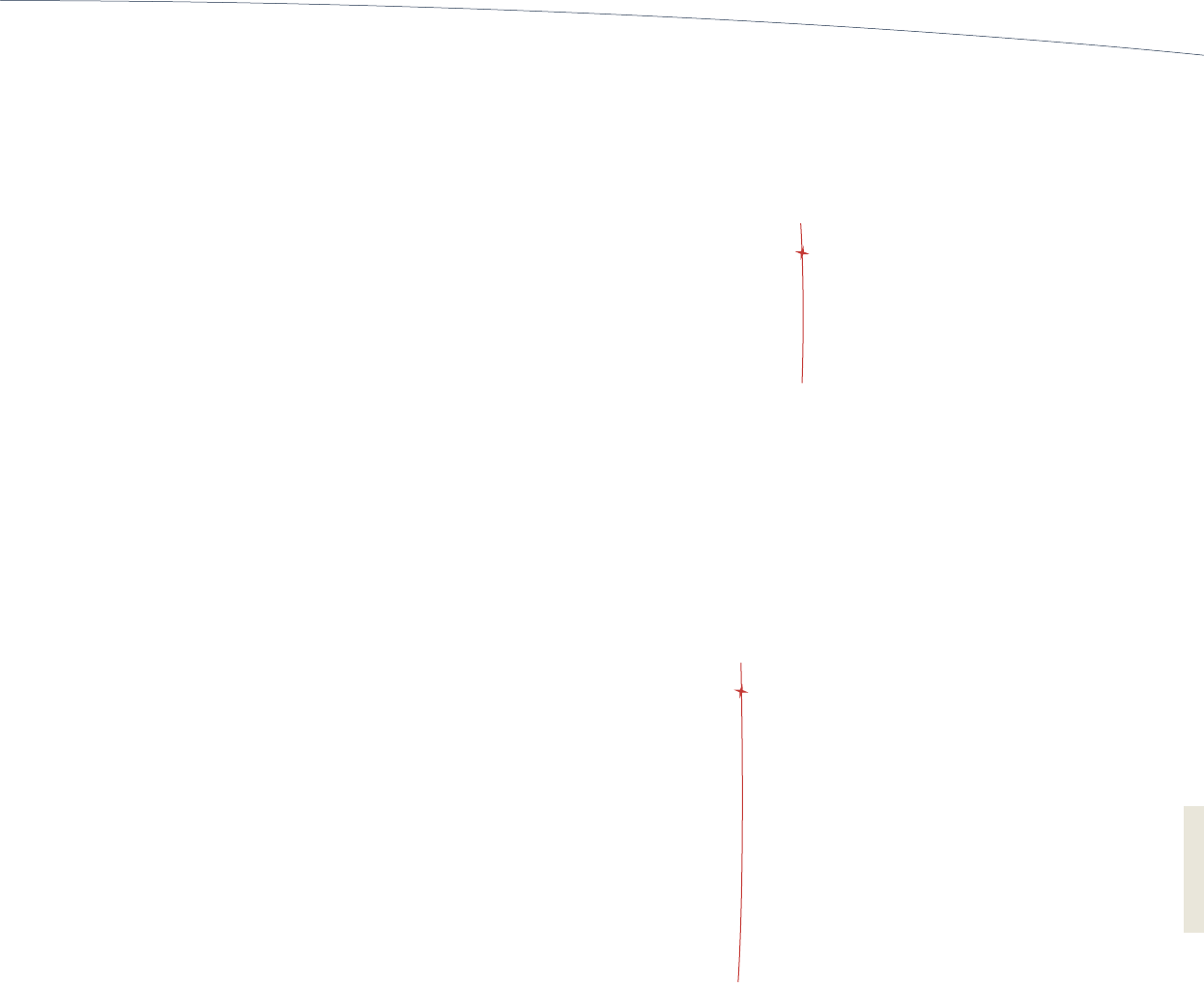
159
As of March 31,
In EUR million
2005
Air France-KLM
2004
Air France
published
Opening balance 13 11
Change in scope of consolidation 82 -
Charge 17 10
Release (45) (8)
Exchange difference
4 -
Closing balance 71 13
As of March 31,
2005 2004
France Abroad France Abroad
Gross discount rate
4.50% 1.75 to 18% 5.00% 2 to 9%
Gross rate of increase in salaries
1.5 to 5.1% 3 to 18.5% 1.5 to 4.5% 2 to 12%
The assumptions used in the valuation of retirement benefit obligations are as follows:
22.3 Restructuring provisions
The change in «restructuring provisions» primarily reflects the consolidation of the KLM group. Restructuring provisions for the
KLM group at March 31, 2005 amounted to 53 million euros.
03-FINANCIER UK.indd 159 11/07/05 13:48:45

160
23. Financial debt
As of March 31,
In EUR million
2005
Air France-KLM
2004
Air France
published
Perpetual subordinated loan stock 571 116
Bonds - 18
Capital-lease obligations 4,482 1,453
Other long-term loans 2,873 2,461
Accrued interest not yet due
79 43
Bond redemption premiums
- -
Long-term debt
(1)
8,005 4,091
Borrowings with short-term original maturities
Commercial paper
- -
Short-term bank finance facilities and similar facilities
263 289
Short-term debts 263 289
Total financial debt
8,268 4,380
(1) Less than one year
1,056 429
23.1 Perpetual subordinated loan securities (TDI)
Part of the long-term debt of KLM are two subordinated loans
(Japanese Yen and Swiss Franc) amounting to 495 million
euros. These two issues are subject to the payment of a coupon
considered to be fixed-rate, after the exercise of swaps for the
issue denominated in yen. In certain circumstances, KLM has
the right to redeem the subordinated perpetual loans, with or
without payment of a premium. These loans are subordinated
to all other existing and future KLM debts. The subordinations
are equal in rank. The loan in Swiss Franc was incepted in 2
tranches (1985 and 1986); the weighted average rate of this
perpetual loan was 4.45 % for the period ended March 31,
2005. The loan in Japanese Yen was incepted in 1999.
Air France issued two of TDI perpetual subordinated loan securi
-
ties, one in June 1989 and a second in May 1992, in the amounts
of 381 million euros and 395 million euros respectively.
The first issuance was restructured in the year 1998-99: the
original securities were bought back from their holders and
were substituted by a perpetual non-subordinated loan issued
under the same financial conditions (Euribor + 0.38 % for the
first tranche of 114 million euros and a fixed rate of 10% for the
second tranche of 267 million euros). Under the terms of issue,
holders of the new securities will receive a nominal amount of
interest from June 23, 2004. The lender securitized this loan in
the form of units in a mutual debt fund of which the remaining
units could be bought by Air France at any time.
The TDIs issued in 1992 bear interest at a fixed rate of 10.06%.
Payment of interest is not subordinated, although the Board
of Directors may decide to suspend payment thereof if net
consolidated losses exceed 30% of stockholders’ equity
and no dividend is paid. The securities were designated as
subordinated financing following the conclusion of an issue
03-FINANCIER UK.indd 160 11/07/05 13:48:45

161
23.3 Other long-term loans
In July 2003, Air France finalized the securitization of aeronau-
tic assets for an amount of 435 million euros.
This financing arrangement was secured by sixteen aircraft.
Three ten-year debt tranches were issued.
A senior floating rate A1 tranche of 98.4 million euros with an
average maturity of 5.6 years, a second senior outstanding
fixed rate A2 tranche of 194 million euros with a maturity of ten
years (both tranches are secured by MBIA Assurance S.A and
were given an Aaa/AAA rating by the Moody’s and Fitch rating
agencies respectively), a mezzanine floating rate B tranche of
142.6 million euros with an average maturity of 5.6 years. The
latter was given an Baa1/A- rating by Moody’s and Fitch res-
pectively.
During the fiscal year ended 31 March 2004, 13 aircraft were
delivered for an amount of 337 million euros, 3 last aircraft have
been delivered during this fiscal year for 98 million euros.
23.2 Bonds
As of March 31,
In EUR million
2005
Air France-KLM
2004
Air France
published
Bonds denominated in EUR
Other bonds - 18
Total bonds denominated in EUR
- 18
Accrued interest payable
- -
Bond redemption premiums
- -
Total bonds
- 18
agreement with certain trusts. The trusts thereby undertook,
via a series of separate subscriber agreements, to buy back
the securities after a period of 15 years, requiring an initial
payment from Air France of 94 million euros. The agreements
also stipulate that the trusts will only receive a nominal inte
-
rest from the sixteenth year onwards.
TDIs were recorded at the date of their issue under short and
long-term debt net of amounts paid to the trusts, i.e. 281 mil
-
lion euros for the 1989 issuance and 301 million euros for the
1992 issuance. The perpetual loan which replaced the 1989
issuance is recorded in the same way.
Interest paid by Air France on the TDIs issued is recorded as an
interest expense. Interest receivable on the zero-coupon bonds
is credited to the interest charge and debited to the outstan-
ding balance on the debts. The net balance of the loan is being
written down over a period of 15 years. As of March 31, 2005,
the TDI 89 was fully amortized and the TDI 92 represented a
debt of 76 million euros.
In France, the tax regime for perpetual subordinated loan stock
was approved by the Tax Authorities and interest is henceforth
deductible for the portion effectively received.
03-FINANCIER UK.indd 161 11/07/05 13:48:45

162
23.4 Analysis by maturity date
23.5 Analysis by currency
As of March 31,
In EUR million
2005
Air France-KLM
2004
Air France
published
Euro 6,997 3,720
US Dollar 619 366
Swiss Franc 280 -
Yen
29 -
Pound Sterling 76 -
Other currencies
4 5
Total
8,005 4,091
The breakdown of all long-term debt and capital leases taking into account the effects of derivative financial instruments is as
follows:
23.6 Credit lines
On August 8, 2001, Air France signed the opening of a revol-
ving, syndicated multi-currency credit line in the amount of 1
billion euros for a period of five years, unused as of March
31, 2005. This credit line was renewed in April 2005 in the
amount of 1.2 billion euros for a new period of five years with
two one-year period. In addition, the Group benefits from a
medium-term credit line in the amount of 52 million euros
(28 million euros drawn as of March 31, 2005), with repay
-
ment deadlines between April 2005 and October 2006.
As of March 31,
In EUR million
2005
Air France-KLM
2004
Air France
published
Matures in
Y + 1 1,056 429
Y + 2 1,087 523
Y + 3 983 600
Y + 4 849 312
Y + 5 573 435
> 5 years 3,457 1,792
Total
8,005 4,091
03-FINANCIER UK.indd 162 11/07/05 13:48:46
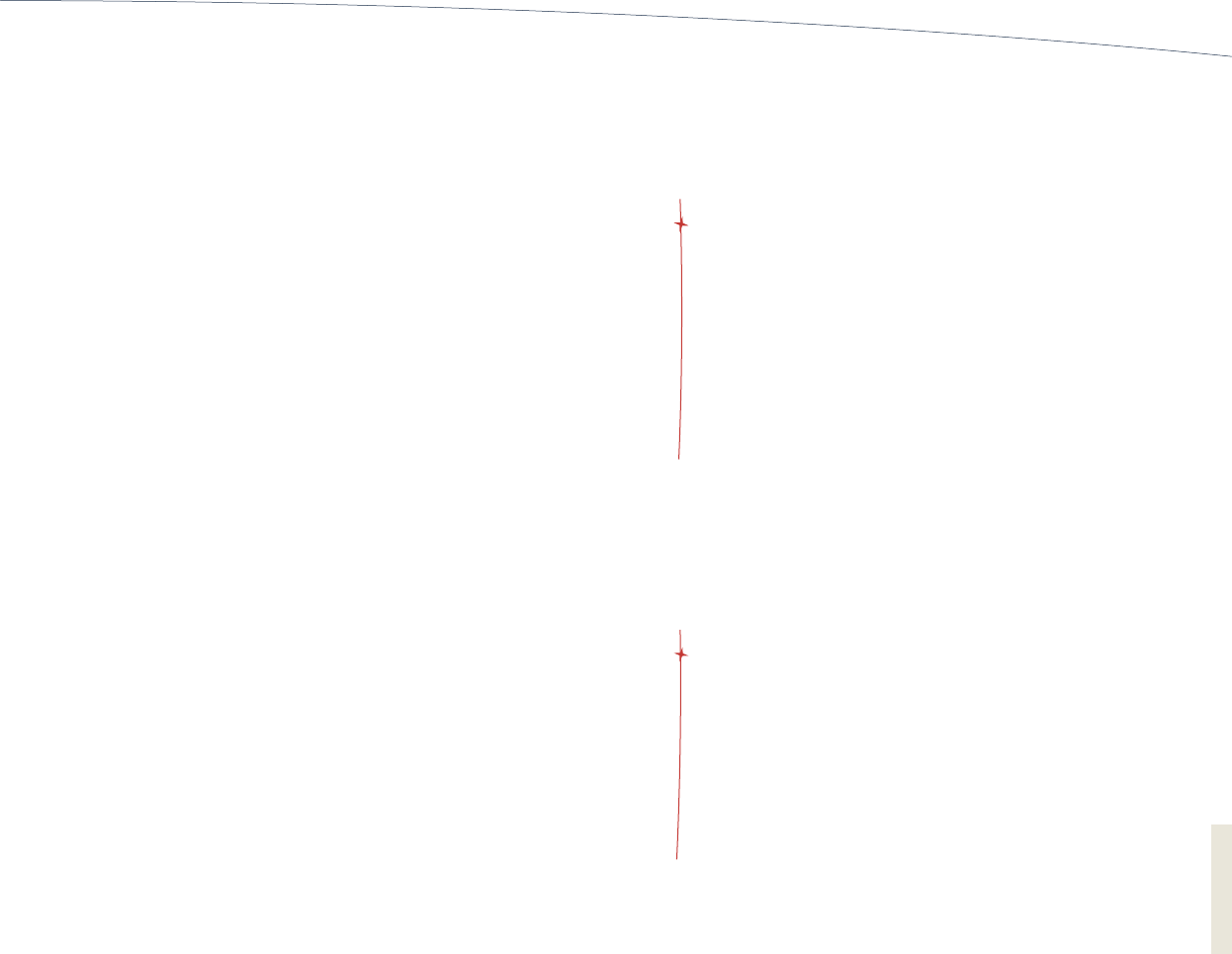
163
24. Income tax liability
Income tax liability breaks down as follows:
25. Advance ticket sales
26. Other payables
Other payables consist, for the most part, of salaries and other
amounts owed to employees including corresponding social
contributions, and internal gains on disposals with equity affi
-
liates (Amadeus G.T.D and Air France Partnairs Leasing) stated
in “Other”.
During 1997 and 1998, the Group sold its investment in Amadeus
Data Processing (a subsidiary had been consolidated) and 33% of
its investment in Amadeus France (which remains a consolidated
subsidiary of the Group) to Amadeus G.T.D., an equity affiliate.
On December 30, 2004, the Group sold its entire stake in Ama
-
deus France to Amadeus GTD. The gains on disposal of these
investments have been eliminated to the extent of the Group’s
continuing investment in Amadeus G.T.D. These amount will con
-
tinue to be deferred until such time as the Group’s investment in
Amadeus G.T.D. is reduced by sale or other means.
As of March 31, 2005, the item «Other liabilities» also includes
the other operating liabilities of the KLM group in the amount of
355 million euros, including 77 million euros for layover services
and aircraft fees, and 51 million euros for maintenance.
Finally, «other liabilities» as March 31, 2005 includes 207 million
euros in liabilities to the French State under the Offer Reserved
for Employees and the Salary-Share swap (SSS; see notes
18 and 33).
As of March 31,
In EUR million
2005
Air France-KLM
2004
Air France
published
Current tax 8 21
Deferred tax
73 -
Total
81 21
Of which > 1 year 73 -
As of March 31,
In EUR million
2005
Air France-KLM
2004
Air France
published
Tickets 1,328 781
Frequent Flyer Program
118 80
Other 210 147
Total
1,656 1,008
03-FINANCIER UK.indd 163 11/07/05 13:48:46

164
27. Financial instruments
27.1 Exposure to interest rate risk
In order to manage interest rate risk on short-and long-term borrowings, the Group uses instruments with the following nominal
values as of the balance sheet date:
These instruments have different objectives:
• Hedging price risk relating to fixed-rate financial debt:
By contracting a fixed-rate debt, the Group is exposed to an
opportunity risk if the rate falls.
Given the current position of market rates in comparison with
fixed contractual rates on certain of its financial debt , the Group
entered into a number of fixed to variable-rate swaps.
• Hedging of cash-flow risk relating to variable-rate fi
-
nancial debt:
The Group has sought to fix the rate of certain variable-rate
debts and thus entered into a number of variable to fixed-rate
swaps.
As of March 31,
In EUR million
2005
Air France-KLM
2004
Air France
published
Employee-related liabilities 742 491
Tax liabilities
234 193
Other 1,130 516
Total
2,106 1,200
Of which > 1 year - -
As of March 31,
In EUR million
2005
Air France-KLM
2004
Air France
published
Fixed to variable-rate swaps 762 172
Variable to fixed-rate swaps
1,894 1,105
Interest rate collars
7 -
03-FINANCIER UK.indd 164 11/07/05 13:48:46
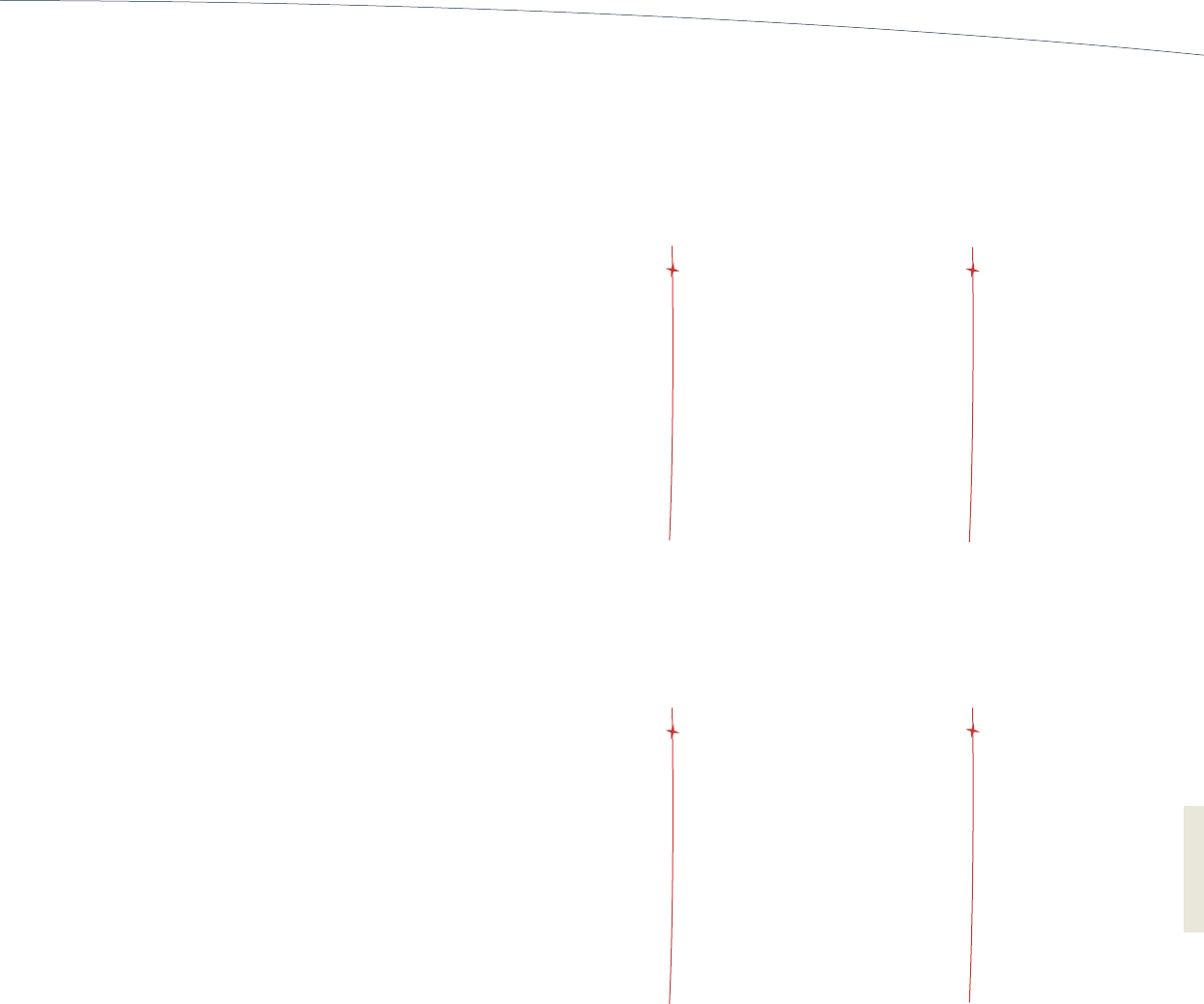
165
Based on the above hedging arrangements, the Group’s interest rate exposure can be presented as follows:
27.2 Exchange rate risk
Current operations:
Although the Group’s reporting currency is the euro, part of its
cash flow is denominated in other currencies, such as the US
dollar, the yen, the pound sterling and the Swiss franc.
Commercial activities also generate and incur income and
expenses in foreign currency. The Group’s policy is to hedge
against exchange risks relating to forecast cash surpluses or
shortfalls in various currencies (US dollar, yen, non-euro Euro
-
pean currencies, etc.). Hedging takes the form of forward sales
or purchases and/or option-based strategies.
Financial assets and liabilities at fixed rates
As of March 31,
In EUR million
Bases Average rate of interest
2005
Air France-KLM
2004
Air France
published
2005
Air France-KLM
2004
Air France
published
Fixed-rate financial assets 36 13 4.54% 9.30%
Perpetual subordinated loan securities
571 97 5.32% 10.04%
Bonds - - - 6.54%
Other long-term financial debt
3,822 1,800 6.05% 5.18%
Short-term bank finance facilities and similar facilities
- - - -
Fixed-rate financial liabilities
4,393 1,897 5.96% 5.46%
Variable-rate assets and liabilities
As of March 31,
In EUR million
Bases Average rate of interest
2005
Air France-KLM
2004
Air France
published
2005
Air France-KLM
2004
Air France
published
Variable-rate financial assets 805 163 2.26% 2.25%
Perpetual subordinated loan securities
- 19 2.70% 2.70%
Bonds - 18 1.62% 1.16%
Other long-term financial debt
3,533 2,114 2.85% 3.12%
Short-term bank finance facilities and similar facilities
263 289 2.06% 2.04%
Variable-rate financial liabilities
3,796 2,440 2.78% 2.93%
03-FINANCIER UK.indd 165 11/07/05 13:48:46

166
The nominal amounts of forward currency hedges and swaps are shown below, based on the nature of the hedging instrument used:
Acquisitions of flight equipment:
Capital expenditure for flight equipment is denominated in US
dollars. The Group hedges on the basis of projected fluctua-
tions in the US dollar via forward sales and purchases and/or
option-based strategies.
Financial debt:
A number of loans are denominated in foreign currency so as to
diversify sources of funding and take into account cash surpluses
generated in various currencies. In order to safeguard against
the risk of exchange rate fluctuations on debt and capital leases
currency swaps are used. This is a micro-hedging mechanism
matched specifically to the borrowing to which it relates.
Nominal amounts
As of March 31,
In EUR million
2005
Air France-KLM
2004
Air France
published
Operating hedges:
Forward sales
- Yen
76 124
- Sterling pound
183 57
- Swiss Franc
36 -
- Norwegian Krone
77 -
- Swedish Krona
62 -
- Singapore Dollar
14 -
- Polish New Zloty
9 -
Maturity - min
April 2005 April 2004
- max March 2006
April 2006
Forward purchases
- US Dollar
290 182
Maturity - min
April 2005 April 2004
- max March 2006 March 2005
Exchange rate options
- US Dollar
647 227
- Sterling pound
66 45
- Yen
58 -
- Swiss Franc
22 -
Maturity - min
April 2005 April 2004
- max
May 2006 March 2005
Flight equipment acquisition hedging:
- forward purchases
1,973 1,091
- put options
216 -
Maturity - min
April 2005 April 2004
- max
February 2010 May 2008
Hedging of long-term debt and capital leases:
- currency swaps 234 -
- cross currency interest rate swap (CIRS)
1,014 -
Maturity - min
April 2005 -
- max
August 2019 -
03-FINANCIER UK.indd 166 11/07/05 13:48:47

167
27.3 Commodity risk-fuel prices
In the normal course of its business, the Group conducts tran-
sactions on the petroleum products markets in order to effectively
manage the risks related to its purchases of aircraft fuel.
The Group’s commitments on the crude and refined oil markets
are shown below (nominal amounts):
27.4 Counterparty risk management
Transactions which potentially generate counterparty risk for
the Group are as follows:
- temporary financial investments;
- derivatives;
- trade receivables.
• Financial investments are diversified investments in blue-chip
securities negotiated with leading banks.
• Group transactions in derivatives have the sole aim of redu
-
cing overall exposure to exchange rate and interest rate risks
to which the Group is exposed in the normal course of busi
-
ness. Such transactions are limited to organized markets or
over-the-counter transactions with first-class counterparties
with no counterparty risk.
• Counterparty risk relating to trade receivables is limited due
to the large number and geographical diversity of customers
comprising the trade receivables portfolio.
As of March 31, 2005, the Group did not identified any specific
counterparty risks.
27.5 Market value of financial instruments
Market values of financial instruments are estimated for the most
part using a variety of valuation methods, such as discounted
future cash flows. However, the methods and assumptions
used to provide the information set out below are theoretical in
nature. They are subject to the following inherent limitations:
• market values do not take into consideration the effect of
subsequent fluctuations in interest or exchange rates,
• estimated amounts as of March 31, 2005 and 2004 are not
indicative of gains and/or losses arising upon maturity or in
the event of cancellation of a financial instrument.
Application of alternative methods and assumptions may,
therefore, have a significant impact on the estimated market
values shown.
The methods used are as follows:
• Cash, trade receivables, other receivables, short-term
bank finance, trade payables and other payables.
The Group believes that, due to the short-term nature of the
above, net book value can be deemed a reasonable approxi
-
mation of market value.
• Marketable securities, investments and other securities.
The market value of securities is determined based on the
market price or the prices available on other similar securities
markets. Where no benchmark exists, net book value is used,
which is deemed a reasonable approximation of market value
in this instance.
As of March 31,
In EUR million
2005
Air France-KLM
2004
Air France
published
Petroleum swaps 1,712 25
Petroleum options
2,574 842
Maturity - min
April 2005 April 2004
- max March 2009
June 2007
03-FINANCIER UK.indd 167 11/07/05 13:48:47

168
• Borrowings and other long-term loans and debt:
The exchange and interest rate swaps are specifically hedged
against long-term debt and capital leases. The market value
of financial debt and loans has been determined after having
taken the hedged swaps into account. Variable-rate loans and
financial debt are recorded at net book value. The market value
of fixed-rate loans and financial debt is determined based on
discounted future cash flows at market interest rates for instru
-
ments with similar features.
• Off-balance sheet instruments
The market value of off-balance sheet instruments corresponds
to the amounts payable or receivable were the positions to be
closed out as of March 31, 2005 and 2004 calculated using
the year-end market rate.
As of March 31,
In EUR million
2005
Air France-KLM
2004
Air France published
Net book
value
Estimated
market value
Net book
value
Estimated
market value
Balance sheet
Investment securities 73 70 81 76
Loans
- fixed-rate
3 3 4 4
- variable-rate
3 3 36 36
Marketable securities 2,254 2,254 1,478 1,478
Bonds
- fixed-rate
- - - -
- variable-rate
- - 18 18
Perpetual subordinated loan securities
571 550 116 155
Other loans and long-term debt and capital leases
- fixed-rate
3,822 4,048 1,800 1,822
- variable-rate
3,533 3,533 2,114 2,114
Other short-term loans and long-term debt
and capital leases 263 263 289 289
Off-balance sheet (1)
Treasury management instruments
- exchange rate options
- (6) - 5
- forward currency contracts
- (178) - 21
- currency swaps
- (36) - -
- interest rate swap
- (57) - -
commodity instruments
- petroleum swaps
- 1,183 - 154
(1) For off-balance sheet financial instruments, the figures quoted as market values represent unrealized gains and losses as of March 31, 2005 and 2004.
Market values calculated in this way are shown in the table below:
03-FINANCIER UK.indd 168 11/07/05 13:48:47

169
28. Leases
28.1 Capital leases
In fiscal 2004-05, the group exercised a purchase option on a financial lease contract, then sold a building in Ivry.
As of March 31,
In EUR million
2005
Air France-KLM
2004
Air France
published
Aircraft
Minimum lease payments by maturity
Y + 1 609 161
Y + 2 881 134
Y + 3 882 281
Y + 4 525 172
Y + 5 411 100
> 5 years 1,729 591
Total
5,037 1,439
Of which interest
727 185
Aircraft capital leases debt
4,310 1,254
Buildings
Minimum lease payments by maturity
Y + 1 21 20
Y + 2 21 21
Y + 3 19 22
Y + 4 18 21
Y + 5 18 19
> 5 years 102 127
Total
199 230
Of which interest
29 34
Building capital leases debt 170 196
Equipment capital leases debt 2 3
Total capital leases debt
4,482 1,453
Amounts non discounted
03-FINANCIER UK.indd 169 11/07/05 13:48:47

170
28.2 Operating leases
For practical reasons, it is not Group policy to disclose the schedule of minimum payments for other operating leases.
29. Flight equipment orders
Due dates for commitments in respect of flight equipment orders are as follows:
These commitments relate to the amounts in US dollar which are converted into euros at the year-end exchange rate.
As of March 31,
In EUR million
2005
Air France-KLM
2004
Air France
published
Aircraft
Minimum lease payments by maturity
Y + 1 648 502
Y + 2 548 467
Y + 3 449 388
Y + 4 354 319
Y + 5 263 241
> 5 years 589 370
Total
2,851 2,287
Amounts non discounted
As of March 31,
In EUR million
2005
Air France-KLM
2004
Air France
published
Y + 1 1,157 779
Y + 2 608 839
Y + 3 422 332
Y + 4 537 375
Y + 5 121 590
> 5 years 117 261
Total
2,962 3,176
03-FINANCIER UK.indd 170 11/07/05 13:48:48

171
Air France had 31 aircraft on order at March 31, 2005, inclu-
ding 20 Airbus and 11 Boeing, nine planes less than at the
end of March 2004. This change reflects the continued rolling
out of delivery schedules for new aircraft and the new orders
booked.
KLM and its subsidiaries had 9 aircraft on order at March 31,
2005, including 6 Airbus and 3 Boeing.
Long-haul fleet
Air France group
Nine Boeing 777-300ER, a 310 seater three-class aircraft, were
added to Air France’s fleet between May 2004 and the end of
March 2005. Four of the nine Boeing 777-300ER were part of the
order made for 10 planes in November 2000 (two owned outright
by the Company and two held under financial leases); the other five
are held under operating leases. This fleet, which will be increased
to 10 aircraft in summer 2005 following an additional delivery in
April 2005, is intended to be run on long-haul lines with high levels
of business travelers.
Air France has also confirmed its interest in this model by conver
-
ting four options into firm orders with a view to the development of
a dedicated ‘leisure’ fleet for flights on the Caribbean-Indian Ocean
network as of fiscal 2006-2007.
The order book for 777-300ER at the end of March 2005 was the
-
refore still 10 units, i.e. the 10 aircraft from the initial order less the
four deliveries over the year plus the four options exercised.
The other orders for long-haul aircraft have not seen any major
changes over the year. The commitments for firm flight equipment
orders include two A330-200, which will be delivered in April 2005.
However, they do not include the last A330-200, which is still in
storage further to the operation carried out in fall 2002 to defer the
delivery. This plane is owned by NOGUES, a financing company
that is now consolidated within the Air France group. This aircraft
will enter into service in April 2005, marking the completion of mo
-
ves to set up a fleet of 16 A330-300.
The order for ten A380-800 has not changed, with the first three
deliveries still scheduled for spring 2007.
Lastly, a final order has been made for one 747-400ERF, which is
due to be delivered in June 2005, supplementing the current fleet
of four aircraft.
KLM group
KLM finalized Phase I of its Fleet Renewal Program with the
delivery of the remaining four B777-200ER aircraft in April 2004,
October 2004, December 2004 and January 2005. Three of
these aircraft are operating leases and one is a financial lease.
For Phase II of the Fleet Renewal Program, the replacement of
twelve B767-300, KLM purchased six Airbus A330-200 aircraft.
The first A330-200 aircraft is scheduled for delivery in August
2005. Additionally, KLM has ordered two B777-200ER aircraft
from Boeing, to be delivered early 2006. A combination of two
B777-200ER and A330-200 aircraft will be leased in May 2006
(first B777) and early 2007 (others) from ILFC. The first B767-
300 was scheduled for redelivery to the lessor in April 2005.
Medium-haul fleet
Air France group
The process to rationalize the A320 fleet has continued, with
eight planes brought into service –four A318, two A320, one
A321 and one A319 – over the year.
The four A318 delivered represent the sixth to ninth planes of an
order for 15 units signed in December 1999, with this module
intended to replace the 737-500 in time on the starter segment
for the medium-haul fleet (110-120 seats).
The other four A320 aircraft, which were brought into service
between April and July 2004, were initially concerned by the
decision to defer the delivery in fall 2002 with a view to adjusting
the fleet in line with the slowdown on air transport. The upturn
in traffic seen in 2003 and confirmed in 2004 allowed the Group
to end this operation for these planes.
A breakdown by fleet type is given in the following paragraphs:
03-FINANCIER UK.indd 171 11/07/05 13:48:48

172
Regional company fleet
Air France group
The regional companies took delivery of one CRJ 700 and one
Embraer 145.
KLM group
In May 2004, KLM replaced one B737-300 on operating lease
by a B737-900 in a financial lease. One owned B737-400 was
written-off following the Barcelona incident on 28 November
2004. No further orders were placed with manufacturers and
lessors.
Transavia purchased a B737-800 and leased a B737-700 in
April 2004. One order was placed with Boeing for an additional
B737-700.
KLM group
KLM Cityhopper has recently added one used Fokker-70 and
one used Fokker-100 to its fleet. Both are owned aircraft. Fur
-
thermore, four Fokker-50 aircraft were sold and leased back in
November 2004.
03-FINANCIER UK.indd 172 11/07/05 13:48:48

173
As of To be delivered in Y + 1 Y + 2 Y + 3 Y + 4 Y + 5 > 5 years
A 318 March 31, 2005 Firm orders
3 3 - - - -
Options
- 5 2 - - -
March 31, 2004 Firm orders
4 3 3 - - -
Options - - 5 2 - 3
A 319 March 31, 2005 Firm orders
2 - - - - -
Options
- - - - - -
March 31, 2004 Firm orders
1 2 - - - -
Options - - - - - -
A 320 March 31, 2005 Firm orders
- - - - - -
Options
- 2 1 - - -
March 31, 2004 Firm orders
2 - - - - -
Options - 1 2 1 - -
A 321 March 31, 2005 Firm orders
- - - - - -
Options
- - - - - -
March 31, 2004 Firm orders
1 - - - - -
Options - - - - - -
A 330 March 31, 2005 Firm orders
6 2 - - - -
Options
- - 1 - - -
March 31, 2004 Firm orders
- 3 - - - -
Options - 1 2 2 - 1
A 380 March 31, 2005 Firm orders
- - 3 5 1 1
Options
- - - 1 1 2
March 31, 2004 Firm orders
- - - 3 5 2
Options - - - - 2 2
B 737 March 31, 2005 Firm orders
1 - - - - -
Options
- 2 4 4 1 -
March 31, 2004 Firm orders
- - - - - -
Options - - - - - -
B 747 March 31, 2005 Firm orders
1 - - - - -
Options
- - - - - -
March 31, 2004 Firm orders
- 1 - - - -
Options - - - - - -
B 777 March 31, 2005 Firm orders
5 5 2 - - -
Options
- - 2 4 - -
March 31, 2004 Firm orders
3 5 2 - - -
Options - - 2 4 3 1
Embraer 145 March 31, 2005 Firm orders
5 2 - - - -
Options
- - - - - -
March 31, 2004 Firm orders
1 5 2 - - -
Options - - - - - -
CRJ 700 March 31, 2005 Firm orders
1 - - - - -
Options
- - - - - -
March 31, 2004 Firm orders
1 1 - - - -
Options - - - - - -
The commitments of the Group concern the following aircraft:
03-FINANCIER UK.indd 173 11/07/05 13:48:49
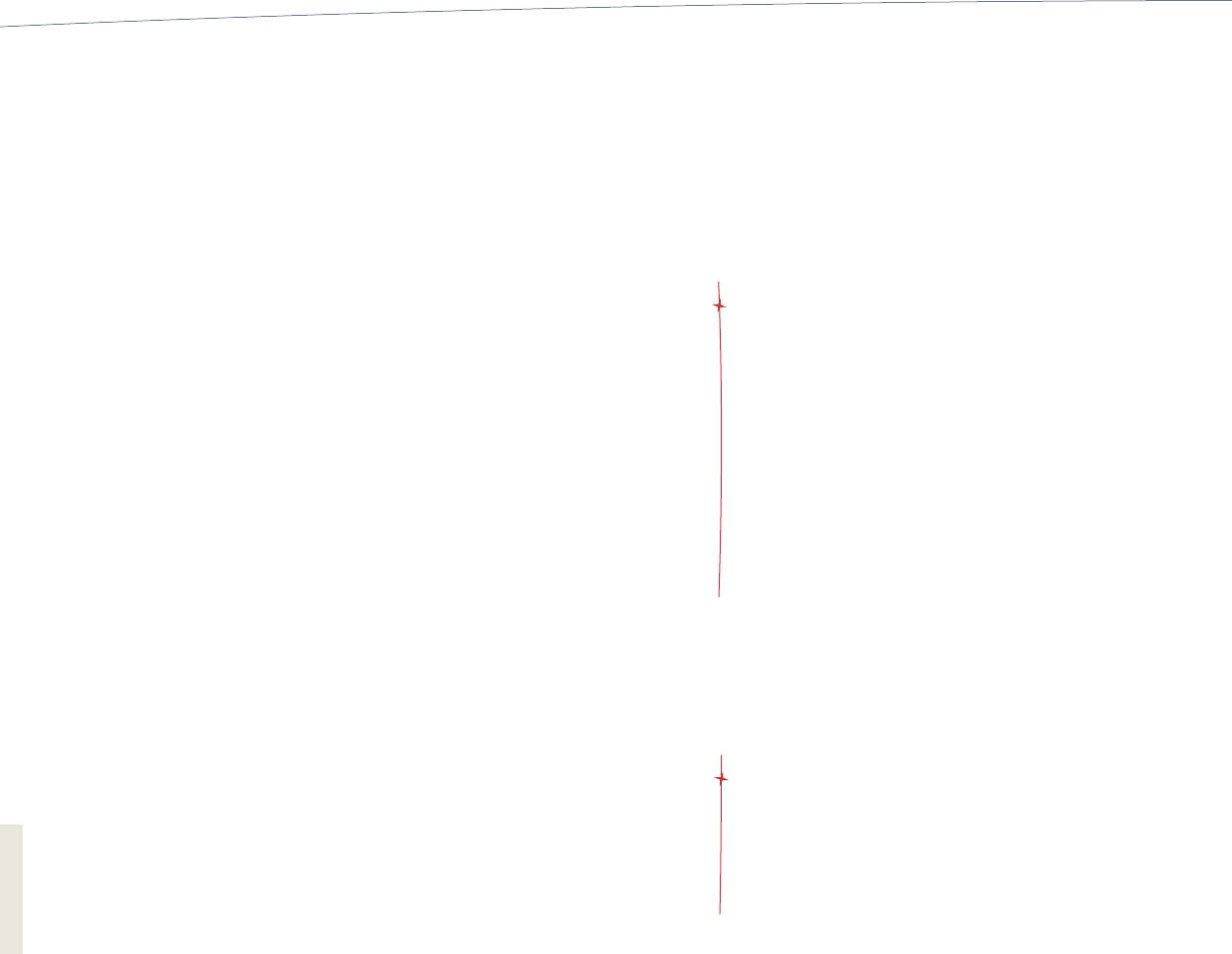
174
30. Other commitments
30.1 Commitments provided
30.2 Commitments received
Warranties, sureties and guarantees are comprised primarily of letter of credit received from financial institutions.
As of March 31,
In EUR million
2005
Air France-KLM
2004
Air France
published
Call on investment securities 23 13
Put on investment securities (2) (2)
Total
21 11
Warranties, sureties and guarantees
105 16
Morgaged or secured assets
1,749 1,650
Other purchase
167 215
As of March 31,
In EUR million
2005
Air France-KLM
2004
Air France
published
Warranties, sureties and guarantees 145 106
Other 3 9
03-FINANCIER UK.indd 174 11/07/05 13:48:49

175
Air France–KLM and its subsidiaries are involved in various dis-
putes, for which they have not necessarily been required to
book provisions in their accounts.
More specifically, a class action has been filed against Air France,
KLM and several US airlines, by five travel agencies based in the
United States and their professional association (Association of
Retail Travel Agents) for collusion. The damages claimed against
the airlines represented a total of 17.5 billion dollars, and this
amount could have been tripled under US collusion legislation.
An initial ruling was handed down on October 30, 2003 in favor
of the airlines. In a ruling announced on December 9, 2004, the
Court of Richmond (Virginia) confirmed the decision taken on
October 30, 2003. Subject to a possible appeal, the airlines, in
-
cluding Air France, have been definitively cleared in this case. No
provisions had been booked in connection with this dispute.
Furthermore, a similar suit is currently being reviewed by
the federal courts in Ohio. Around 150 travel agents, which
were initially plaintiffs in the case mentioned above, but later
withdrew, have filed a case on the same grounds (collusion)
against Air France, KLM and other European and US airlines.
The amount of damages alleged by these 150 agents has not
yet been determined.
Neither Air France nor KLM have booked any provisions in con-
nection with these proceedings.
In December 2004, IAP Intermodal, a US company, filed char-
ges against several airlines including Air France with a federal
court in Texas, accusing them of using flight-time schedu
-
ling software that infringe on three patents that this company
claims to hold.
On the basis of legal advice given by a specialized firm in the
United States, Air France believes that these claims have no
grounds, and as such, does not plan to book any provisions.
Lastly, in 2000 and 2001, several Servair employees opened
proceedings against their employer claiming that their mealtimes
at the place of work should be paid in the same way as working
time since they were still available for their employer. Servair on
the other hand considered that mealtimes represented an in-
terruption in working time and as such should not be paid. The
Paris court of appeals ruled in favor of Servair on November 8,
2001. Other suits focusing on the same issue have been filed
by another 471 Servair employees and are currently being re
-
viewed. In a ruling handed down on October 29, 2004, the court
dismissed a case filed by around thirty employees. A verdict
on similar claims filed by 393 members of staff is expected for
June 7, 2005.
No provisions have been booked for any of these cases, which
Servair believes to be unfounded.
None of the other disputes that are currently underway, for which
Air France and KLM may not have set aside reasonably sufficient
provisions, are likely to have a significant impact on the activities,
financial position or operating results of the Group.
30.3 Litigation and court action
31. Cash flow statement
31.1 Cash and cash equivalents
As of March 31,
In EUR million
2005
Air France-KLM
2004
Air France
published
Cash at bank 386 330
Cash equivalents (note 20) 2,101 1,364
Short-term bank finance and similar facilities (note 23)
(263) (289)
Cash and cash equivalents 2,224 1,405
03-FINANCIER UK.indd 175 11/07/05 13:48:49

176
Address Siren Stock %
Interest
%
control
Method Year end
AIR France SA Group
AIR FRANCE SA 45, rue de Paris
95747 Roissy - CDG Cedex
420,495,178 1,901,231,625 100 100 Fully
consolidated
Mar-31
AIR FRANCE SERVICES LTD Room 229 - Terminal 2 Office Block
London Heathrow Airport - Hounslow
MDDX TW6 1RR - Great Britain
Foreign 7,000,000 GBP 100 100 Fully
consolidated
Dec-31
AMADEUS GLOBAL
TRAVEL DISTRIBUTION
Salvador de Madariaga 1
28046 Madrid - Spain
Foreign 23,044,000 23 43 Equity
method
Dec-31
CRMA ZA de la Clef de Saint-Pierre BP 10F
78996 Elancourt
312,139,215 1,300,000
100 100 Fully
consolidated
Mar-31
GIE ITAB 320 45, rue de Paris
95747 Roissy - CDG Cedex
347,907,636 - 100 100 Fully
consolidated
Mar-31
HEATHROW
CARGO HANDLING
Building 558-Shoreham road West
Heathrow Airport - Hounslow
MDDX TW6 3RN - Great Britain
Foreign 800,000 GBP 50 50 Equity
method
Dec-31
NOGUES 5 Harbourmaster Place,
Dublin 1, Ireland
Foreign 1 USD
0 100 Fully
consolidated
Dec-31
SODEXI 14 rue des Voyelles - BP 10301
Bat. AFE 3512 - Zone Fret 4
95703 Roissy - CDG Cedex
347,960,825 2,400,000
60 60 Fully
consolidated
Mar-31
REENTON DEVELOPMENT LTD sub group
REENTON DEVELOPMENT LIMITED Room 901, 9th Floor, Tien Cheung Hong
Building - 77-81 Jervois Street -
Sheung Wan - Hong Kong
Foreign 10,000 HKD 51 51 Fully
consolidated
Dec-31
HANGXIN HITECH RESOURCES HOLDING LTD Room 901, 9th Floor, Tien Cheung Hong
Building - 77-81 Jervois Street -
Sheung Wan - Hong Kong
Foreign 77,984 HKD 41 80 Fully
consolidated
Dec-31
HARBIN HANGXIN AVIONICS CO. LTD N°8, Bohaiyi Road, Jizhongqu, Hapin Road
Harbin Economic Development Zone
Harbin 150060 - China
Foreign 1,283,865 CNY 41 80 Fully
consolidated
Dec-31
GUANGZHOU HANGXIN AVIONICS CO. LTD N° 2, Kexin Road, TIANHE, 510630
Guangzhou - China
Foreign 26,944,758 CNY 41 80 Fully
consolidated
Dec-31
SHANGHAI HANGXIN AERO MECHANICS CO. LTD N° 12-C, Jinwen Road, Zhuqiao,
Nanhui District, 201323
Shanghai - China
Foreign 3,476,424 CNY 41 80 Fully
consolidated
Dec-31
SINGAPORE HANGXIN AVIATION ENG. PTE N° 66, Loyang Way
Singapore 508756
Foreign 16,000 SGD 12 30 Equity
method
Dec-31
SHANGDONG XIANGYU AERO-TECHNOLOGY
SERVICES LTD
Yaoqiang International Airport, Jinan
250107, Shandong - China
Foreign 3,380,000 CNY
8 20 Equity
method
Dec-31
UILEAG HOLDING COMPANY sub group
UILEAG HOLDING COMPANY LIMITED 5 Harbourmaster Place, International
Financial Services Center, Dublin 1, Ireland
Foreign 1 100 100 Fully
consolidated
Mar-31
O’FIONNAGAIN HOLDING COMPANY LIMITED 5 Harbourmaster Place, International
Financial Services Center, Dublin 1, Ireland
Foreign 1
100 100 Fully
consolidated
Mar-31
TAKEOFF 1 LIMITED 5 Harbourmaster Place, International
Financial Services Center, Dublin 1, Ireland
Foreign 1
100 100 Fully
consolidated
Mar-31
TAKEOFF 2 LIMITED 5 Harbourmaster Place, International
Financial Services Center, Dublin 1, Ireland
Foreign 1
100 100 Fully
consolidated
Mar-31
TAKEOFF 3 LIMITED 5 Harbourmaster Place, International
Financial Services Center, Dublin 1, Ireland
Foreign 1
100 100 Fully
consolidated
Mar-31
TAKEOFF 4 LIMITED 5 Harbourmaster Place, International
Financial Services Center, Dublin 1, Ireland
Foreign 1
100 100 Fully
consolidated
Mar-31
TAKEOFF 5 LIMITED 5 Harbourmaster Place, International
Financial Services Center, Dublin 1, Ireland
Foreign 1
100 100 Fully
consolidated
Mar-31
TAKEOFF 6 LIMITED 5 Harbourmaster Place, International
Financial Services Center, Dublin 1, Ireland
Foreign 1
100 100 Fully
consolidated
Mar-31
TAKEOFF 7 LIMITED 5 Harbourmaster Place, International
Financial Services Center, Dublin 1, Ireland
Foreign 1
100 100 Fully
consolidated
Mar-31
TAKEOFF 8 LIMITED 5 Harbourmaster Place, International
Financial Services Center, Dublin 1, Ireland
Foreign 1
100 100 Fully
consolidated
Mar-31
TAKEOFF 9 LIMITED 5 Harbourmaster Place, International
Financial Services Center, Dublin 1, Ireland
Foreign 1
100 100 Fully
consolidated
Mar-31
TAKEOFF 10 LIMITED 5 Harbourmaster Place, International
Financial Services Center, Dublin 1, Ireland
Foreign 1
100 100 Fully
consolidated
Mar-31
TAKEOFF 11 LIMITED 5 Harbourmaster Place, International
Financial Services Center, Dublin 1, Ireland
Foreign 1
100 100 Fully
consolidated
Mar-31
TAKEOFF 12 LIMITED 5 Harbourmaster Place, International
Financial Services Center, Dublin 1, Ireland
Foreign 1
100 100 Fully
consolidated
Mar-31
TAKEOFF 13 LIMITED 5 Harbourmaster Place, International
Financial Services Center, Dublin 1, Ireland
Foreign 1
100 100 Fully
consolidated
Mar-31
TAKEOFF 14 LIMITED 5 Harbourmaster Place, International
Financial Services Center, Dublin 1, Ireland
Foreign 1
100 100 Fully
consolidated
Mar-31
TAKEOFF 15 LIMITED 5 Harbourmaster Place, International
Financial Services Center, Dublin 1, Ireland
Foreign 1
100 100 Fully
consolidated
Mar-31
TAKEOFF 16 LIMITED 5 Harbourmaster Place, International
Financial Services Center, Dublin 1, Ireland
Foreign 1
100 100 Fully
consolidated
Mar-31
31.2 Acquisition of subsidiaries and affiliates
The acquisition of subsidiaries and stakes mainly correspond
to KLM cash at the acquisition date for an amount of 575 mil
-
lion euros and the acquisition of self-controlling shares for an
amount of 32 million euros.
Additional stakes were purchased in Servair and Air Chef for
respective amounts of 3 and 4 million euros.
32. Other key events over the year
After the French state’s disposal of part of its interest in
Air France-KLM on December 9, 2004, the employees of
Air France and its subsidiaries have had the opportunity to
purchase shares on special terms.
A total of 21.6 million Air France-KLM shares (excluding bo
-
nus shares), representing 8% of the capital of Air France-KLM,
were offered to employees in February 2005 through two sche
-
mes: an offer reserved for employees (ORE) and a salary-share
swap (SSS).
The offer reserved for employees enabled employees to pur
-
chase 9 million shares and, depending on the formula chosen,
take advantage of various benefits offered by the French go
-
vernment and the company:
- 20% discount;
- bonus shares;
- employer’s contribution of up to 40%;
- easy payment facilities.
The employer’s contribution paid by Air France in the Offer
Reserved for Employees impacted personnel costs in the
amount of 16 million euros at March 31, 2005.
On February 1, 2005, Air France-KLM offered Air France
employees working under a permanent French employment
contract the possibility of agreeing to reductions in their
wages over a period of 6 years in exchange for the remittal
of Air France-KLM shares by the French State, up to a
maximum of 13,186,853 shares. At the close of the offer on
February 21, 2005, 12.6 million shares of Air France-KLM
stock had been subscribed by the employees of Air France.
Therefore, this operation, which will be effective as of May
2005, had no impact on the group’s financial statements for
the year ended March 31, 2005.
In addition, the group must reimburse the French State for the
cost of implementing the salary-share swap (the shares
subscribed under the salary-share swap are remitted to
Air France employees by the French State). The debt booked
for this purpose in the accounts of Air France-KLM at
March 31, 2005 totaled 107 million euros.
33. Subsequent events review
In April 2005, Air France issued a 15-year Convertible Bond
with an option to convert to new or existing Air France-KLM
stock (“OCEANEs”) for a total of 450 million euros.
The sums borrowed through this convertible bond issue will be
used to finance capital investments for the Air France group,
especially fleet modernization, at a lower financing cost com-
pared with traditional borrowing facilities over a similar period
and without mortgaging planes as would normally be the case
when financing aircraft.
During fiscal year 2004-05, Air France and the other air carriers
that were Amadeus shareholders initiated negotiations with
investment funds (known as private equity funds) to launch,
through a company they will hold, a tender offer for GTD at a
price of 7.35 euros per share. This «Leveraged Buy Out (LBO)»
will allow Air France to realize its potential gain, while remaining
a shareholder of Amadeus GTD, and to realize gross cash of
800 million euros. The documents required to obtain approval
of the offer were filed with the Spanish market authorities on
April 8, 2005. The tender offer opened on May 26 and will con-
tinue until June 27.
03-FINANCIER UK.indd 176 11/07/05 13:48:50

177
34. Scope of consolidation at March 31, 2005
Address Siren Stock %
Interest
%
control
Method Year end
AIR France SA Group
AIR FRANCE SA 45, rue de Paris
95747 Roissy - CDG Cedex
420,495,178 1,901,231,625 100 100 Fully
consolidated
Mar-31
AIR FRANCE SERVICES LTD Room 229 - Terminal 2 Office Block
London Heathrow Airport - Hounslow
MDDX TW6 1RR - Great Britain
Foreign 7,000,000 GBP 100 100 Fully
consolidated
Dec-31
AMADEUS GLOBAL
TRAVEL DISTRIBUTION
Salvador de Madariaga 1
28046 Madrid - Spain
Foreign 23,044,000 23 43 Equity
method
Dec-31
CRMA ZA de la Clef de Saint-Pierre BP 10F
78996 Elancourt
312,139,215 1,300,000
100 100 Fully
consolidated
Mar-31
GIE ITAB 320 45, rue de Paris
95747 Roissy - CDG Cedex
347,907,636 - 100 100 Fully
consolidated
Mar-31
HEATHROW
CARGO HANDLING
Building 558-Shoreham road West
Heathrow Airport - Hounslow
MDDX TW6 3RN - Great Britain
Foreign 800,000 GBP 50 50 Equity
method
Dec-31
NOGUES 5 Harbourmaster Place,
Dublin 1, Ireland
Foreign 1 USD
0 100 Fully
consolidated
Dec-31
SODEXI 14 rue des Voyelles - BP 10301
Bat. AFE 3512 - Zone Fret 4
95703 Roissy - CDG Cedex
347,960,825 2,400,000
60 60 Fully
consolidated
Mar-31
REENTON DEVELOPMENT LTD sub group
REENTON DEVELOPMENT LIMITED Room 901, 9th Floor, Tien Cheung Hong
Building - 77-81 Jervois Street -
Sheung Wan - Hong Kong
Foreign 10,000 HKD 51 51 Fully
consolidated
Dec-31
HANGXIN HITECH RESOURCES HOLDING LTD Room 901, 9th Floor, Tien Cheung Hong
Building - 77-81 Jervois Street -
Sheung Wan - Hong Kong
Foreign 77,984 HKD 41 80 Fully
consolidated
Dec-31
HARBIN HANGXIN AVIONICS CO. LTD N°8, Bohaiyi Road, Jizhongqu, Hapin Road
Harbin Economic Development Zone
Harbin 150060 - China
Foreign 1,283,865 CNY 41 80 Fully
consolidated
Dec-31
GUANGZHOU HANGXIN AVIONICS CO. LTD N° 2, Kexin Road, TIANHE, 510630
Guangzhou - China
Foreign 26,944,758 CNY 41 80 Fully
consolidated
Dec-31
SHANGHAI HANGXIN AERO MECHANICS CO. LTD N° 12-C, Jinwen Road, Zhuqiao,
Nanhui District, 201323
Shanghai - China
Foreign 3,476,424 CNY 41 80 Fully
consolidated
Dec-31
SINGAPORE HANGXIN AVIATION ENG. PTE N° 66, Loyang Way
Singapore 508756
Foreign 16,000 SGD 12 30 Equity
method
Dec-31
SHANGDONG XIANGYU AERO-TECHNOLOGY
SERVICES LTD
Yaoqiang International Airport, Jinan
250107, Shandong - China
Foreign 3,380,000 CNY
8 20 Equity
method
Dec-31
UILEAG HOLDING COMPANY sub group
UILEAG HOLDING COMPANY LIMITED 5 Harbourmaster Place, International
Financial Services Center, Dublin 1, Ireland
Foreign 1 100 100 Fully
consolidated
Mar-31
O’FIONNAGAIN HOLDING COMPANY LIMITED 5 Harbourmaster Place, International
Financial Services Center, Dublin 1, Ireland
Foreign 1
100 100 Fully
consolidated
Mar-31
TAKEOFF 1 LIMITED 5 Harbourmaster Place, International
Financial Services Center, Dublin 1, Ireland
Foreign 1
100 100 Fully
consolidated
Mar-31
TAKEOFF 2 LIMITED 5 Harbourmaster Place, International
Financial Services Center, Dublin 1, Ireland
Foreign 1
100 100 Fully
consolidated
Mar-31
TAKEOFF 3 LIMITED 5 Harbourmaster Place, International
Financial Services Center, Dublin 1, Ireland
Foreign 1
100 100 Fully
consolidated
Mar-31
TAKEOFF 4 LIMITED 5 Harbourmaster Place, International
Financial Services Center, Dublin 1, Ireland
Foreign 1
100 100 Fully
consolidated
Mar-31
TAKEOFF 5 LIMITED 5 Harbourmaster Place, International
Financial Services Center, Dublin 1, Ireland
Foreign 1
100 100 Fully
consolidated
Mar-31
TAKEOFF 6 LIMITED 5 Harbourmaster Place, International
Financial Services Center, Dublin 1, Ireland
Foreign 1
100 100 Fully
consolidated
Mar-31
TAKEOFF 7 LIMITED 5 Harbourmaster Place, International
Financial Services Center, Dublin 1, Ireland
Foreign 1
100 100 Fully
consolidated
Mar-31
TAKEOFF 8 LIMITED 5 Harbourmaster Place, International
Financial Services Center, Dublin 1, Ireland
Foreign 1
100 100 Fully
consolidated
Mar-31
TAKEOFF 9 LIMITED 5 Harbourmaster Place, International
Financial Services Center, Dublin 1, Ireland
Foreign 1
100 100 Fully
consolidated
Mar-31
TAKEOFF 10 LIMITED 5 Harbourmaster Place, International
Financial Services Center, Dublin 1, Ireland
Foreign 1
100 100 Fully
consolidated
Mar-31
TAKEOFF 11 LIMITED 5 Harbourmaster Place, International
Financial Services Center, Dublin 1, Ireland
Foreign 1
100 100 Fully
consolidated
Mar-31
TAKEOFF 12 LIMITED 5 Harbourmaster Place, International
Financial Services Center, Dublin 1, Ireland
Foreign 1
100 100 Fully
consolidated
Mar-31
TAKEOFF 13 LIMITED 5 Harbourmaster Place, International
Financial Services Center, Dublin 1, Ireland
Foreign 1
100 100 Fully
consolidated
Mar-31
TAKEOFF 14 LIMITED 5 Harbourmaster Place, International
Financial Services Center, Dublin 1, Ireland
Foreign 1
100 100 Fully
consolidated
Mar-31
TAKEOFF 15 LIMITED 5 Harbourmaster Place, International
Financial Services Center, Dublin 1, Ireland
Foreign 1
100 100 Fully
consolidated
Mar-31
TAKEOFF 16 LIMITED 5 Harbourmaster Place, International
Financial Services Center, Dublin 1, Ireland
Foreign 1
100 100 Fully
consolidated
Mar-31
177
03-FINANCIER UK.indd 177 11/07/05 13:48:51

178
Address Siren Stock %
Interest
%
Control
Method Year end
AIR FRANCE FINANCE sub group
AIR FRANCE FINANCE 45, rue de Paris
95747 Roissy - CDG Cedex
341,178,697 200,000,000 100 100 Fully
consolidated
Mar-31
AIR AUSTRAL BP 611
97473 Saint Denis de la Réunion
323,650,945 1,984,000
30 30 Equity
method
Mar-31
AIR FRANCE FINANCE IRELAND 69/71 st Stephen’s Green
Dublin 2 - Ireland
Foreign 3,502,508 USD 100 100 Fully
consolidated
Dec-31
AIR FRANCE PARTNAIRS LEASING NV 130 Schottegativeg Oost
Curaçao- Dutch West Indies
Foreign 26,209,180 USD 45 45 Equity
method
Dec-31
ALL AFRICA AIRWAYS Les Cascades, Edith Cavell Street
Port-Louis - Mauritius
Foreign 6,697,487 USD 51 51 Fully
consolidated
Dec-31
BRIT AIR Aéroport BP 156
29204 Morlaix
927,350,363 23,483,376
100 100 Fully
consolidated
Mar-31
CITY JET Swords Campus, Balheary Road
Swords Co. Dublin - Ireland
Foreign 5,079,968
100 100 Fully
consolidated
Mar-31
FREQUENCE PLUS SERVICES 51/59 avenue Ledru Rollin
94 200 Ivry sur Seine
347,944,259 2,288,000
100 100 Fully
consolidated
Mar-31
GIE JEAN BART 260 Bd Saint Germain
75007 Paris
430,337,766 - 10 10 Fully
consolidated
Dec-31
GIE SCHIPHOL 260 Bd Saint Germain
75007 Paris
452,912,488 20,000
0 100 Fully
consolidated
Dec-31
GIE SURCOUF 260 Bd Saint Germain
75007 Paris
432,655,785 - 100 100 Fully
consolidated
Mar-31
ICARE Aéroport BP 156
29204 Morlaix
380,582,346 1,035,488
100 100 Fully
consolidated
Mar-31
LYON MAINTENANCE Aéroport Lyon Saint Exupery BP 386
69125 Lyon
421,812,595 80,000
100 100 Fully
consolidated
Mar-31
REGIONAL COMPAGNIE AERIENNE EUROPEENNE Aéroport de Nantes Atlantique
44340 Bouguenais
335,351,920 50,000,000
100 100 Fully
consolidated
Mar-31
SOCIETE D’EXPLOITATION AERONAUTIQUE 45,rue de Paris
95747 Roissy - CDG Cedex
379,316,276 38,112
100 100 Fully
consolidated
Mar-31
SOCIETE NOUVELLE AIR IVOIRE Place de la République - Abidjan
Ivory Coast
Foreign
3,600,000,000 XOF
39 76 Fully
consolidated
Dec-31
TEAMTRACKERS SA 57 rue Ledru Rollin
94 200 Ivry sur Seine
449,171,222 1,000,000
49 49 Proportionally
consolidated
Dec-31
TEAMTRACKERS SRO Olivova 4/2096 - 11000 Praha 1
Czech republic
Foreign 17,500,000 CZK 49 49 Proportionally
consolidated
Dec-31
SERVAIR sub group
SERVAIR 4 place de Londres Roissypole
95726 Roissy - CDG Cedex
722,000,395 52,386,208 98 98 Fully
consolidated
Mar-31
ACNA Bat. 3416 Modules 100 et 200
BP 10605
95724 Roissy - CDG Cedex
382,587,558 250,000
98 100 Fully
consolidated
Mar-31
ACSAIR Le Ronsard - Paris Nord 2
22 avenue des Nations - BP 50379
Villepinte - 95942 Roissy - CDG Cedex
437,568,702 1,500,000
50 51 Fully
consolidated
Dec-31
AEROFORM Le Ronsard - Paris Nord 2
22 avenue des Nations - BP 50379
Villepinte - 95942 Roissy - CDG Cedex
448,568,702 8,000
98 100 Fully
consolidated
Mar-31
AEROSUR Le Ronsard - Paris Nord 2
22 avenue des Nations - BP 50379
Villepinte - 95942 Roissy - CDG Cedex
432,219,940 40,000
98 100 Fully
consolidated
Mar-31
AFRIQUE CATERING 4 place de Londres Roissypole
BP 10701
95726 Roissy - CDG Cedex
403,236,714 450,000
50 51 Fully
consolidated
Dec-31
AIR CHEF Via Venezia Guilia 5/a
Milano
Italy
Foreign 2,000,000
49 50 Equity
method
Dec-31
ALPHA AIRPORTS GROUP PLC Europa House - 804 Bath road
Cranford Middlesex TW5 9US
Great Britain
Foreign 17,068,000 GBP 26 27 Equity
method
Jan-31
BRUNEAU PEGORIER 15 rue de la Grande Borne
77 990 Le Mesnil Amelot
572,129,377 1,365,500
93 95 Fully
consolidated
Mar-31
CENTRE DE PRODUCTION ALIMENTAIRE 16 rue de la Grande Borne
77990 Le Mesnil Amelot
380,885,129 1,500,000
98 100 Fully
consolidated
Mar-31
CULIN’AIR PARIS 8 rue des acacias
77230 Villeneuve sous Dammartin
430,048,959 914,760
55 56 Fully
consolidated
Dec-31
Scope of consolidation at March 31, 2005 (continued)
03-FINANCIER UK.indd 178 11/07/05 13:48:52

179
Scope of consolidation at March 31, 2005 (continued)
Address Siren Stock %
Interest
%
Control
Method Year end
DAKAR CATERING PO Box 8431
Aéroport de Dakar Yoff
Dakar - Senegal
Foreign 250,000,000 CFA 49 51 Fully
consolidated
Dec-31
EUROPEAN CATERING SERVICES The Corporation Trust Company
1209 Orange Street
Wilmington DE 19801 USA
Foreign 4,860,000 USD 98 100 Fully
consolidated
Dec-31
FLYING FOOD CATERING 1209 Orange Street - City of Wilmington
400 - State of Delaware
USA
Foreign 920,000 USD 48 49 Equity
method
Dec-31
FLYING FOOD MIAMI 1650 N.W - 70 th Avenue
Miami, Florida 33299 USA
Foreign 6,462,131 USD 48 49 Equity
method
Dec-31
FLYING FOOD SAN FRANCISCO 810 Malcom Road Burlingame
California 94010 USA
Foreign 6,926,328 USD 43 44 Equity
method
Dec-31
FLYING FOOD SERVICES 1209 Orange Street - City of Wilmington
400 - State of Delaware USA
Foreign 450,000 USD 48 49 Equity
method
Dec-31
JET CHEF Zone d’aviation d’affaires
93350 Aéroport du Bourget
382,587,541 380,000
98 100 Fully
consolidated
Mar-31
LOGAIR 4 place de Londres Roissypole
95726 Roissy - CDG Cedex
443,014,527 40,000
49 50 Proportionally
consolidated
Dec-31
LOME CATERING SA Aéroport de Lomé
BP 3688 Togo
Foreign 100,000,000 CFA 17 35 Equity
method
Dec-31
LYON AIR TRAITEUR 4 place de Londres Roissypole
BP 10701
95726 Roissy - CDG Cedex
451,329,916 455,000
100 100 Fully
consolidated
Mar-31
MACAU CATERING SERVICES Catering Building
Macau International Airport
Pac On Taipa - Macao
Foreign 16,000,000 MOP 17 34 Equity
method
Dec-31
MALI CATERING Aéroport de Bamako Sénou
BP E3803 - Bamako
Mali
Foreign 350,000,000 CFA 70 99 Fully
consolidated
Dec-31
MARTINIQUE CATERING 4 place de Londres Roissypole
BP 10701
95726 Roissy - CDG Cedex
451,329,932 505,000
100 100 Fully
consolidated
Mar-31
ORLY AIR TRAITEUR 1 rue du Pont des Pierres
91320 Wissous
384,030,680 5,700,000
98 100 Fully
consolidated
Mar-31
PASSERELLE Route du Midi
Bat. 3441 - BP 10605
95724 Roissy - CDG Cedex
433,032,828 7,500
98 100 Fully
consolidated
Mar-31
PRESTAIR 1 rue du Pont de Pierre
BP 61 - Wissous
91422 Morangis Cedex
429,723,737 7,500
98 100 Fully
consolidated
Mar-31
PMAIR Bat. 3416 - Route du Midi
93290 Tremblay
437,927,882 8,000
50 51 Fully
consolidated
Dec-31
SEREP PO Box 8431
Aéroport de Dakar Yoff
Dakar - Senegal
Foreign 30,600,000 CFA 38 39 Equity
method
Dec-31
SERVAIR EUREST Avenida 11 de Septiembre Poligono
Mas Blau 08820 El Prat de Llobregat
Barcelona - Spain
Foreign 710,797
34 35 Equity
method
Dec-31
SERVAIR SATS PO Box 3 Singapore
Changi Airport
918141 Singapore
Foreign 1,040,000 SGD 50 51 Fully
consolidated
Dec-31
SERVANTAGE 12 chemin des glirettes
95000 Le Thillay
424,657,179 37,500
98 100 Fully
consolidated
Mar-31
SESAL Aéroport Léon Mba
PO Box 20303
Libreville - Gabon
Foreign
250,000,000 CFA
39 40 Equity
method
Dec-31
SOCIETE IMMOBILIERE AEROPORTUAIRE 4 place de Londres Roissypole
BP 10701
95726 Roissy - CDG Cedex
722,003,795 1,905,000
98 100 Fully
consolidated
Mar-31
SKYCHEF International Airport
PO Box 450 Victoria - Point Larue
Mahé - Seychelles
Foreign 312,500 SCR 54 55 Fully
consolidated
Mar-31
SKYLOGISTIC BP 121
69125 Lyon St Exupéry Aéroport
423,049,089 547,500
98 100 Fully
consolidated
Mar-31
SOGRI Aéroport de Cayenne Rochambeau
97351 Matoury
320,750,763 225,000
95 97 Fully
consolidated
Mar-31
SORI Zone de fret Nord
Aéroport Pôle Caraïbes
97139 Abymes
322,055,187 50,000
49 50 Fully
consolidated
Dec-31
SPECIAL MEALS CATERING 16 rue de la Grande Borne
77990 Le Mesnil Amelot
429,627,474 7,622
98 100 Fully
consolidated
Mar-31
03-FINANCIER UK.indd 179 11/07/05 13:48:53

180
Scope of consolidation at March 31, 2005 (continued)
Address Siren Stock %
Interest
%
Control
Method Year end
KLM N.V. Group
KLM N.V. Amsterdamseweg 55, 1182 GP
Amstelveen - Netherlands
Foreign
125,347,000 97 84 Fully
consolidated
Mar-31
AIRGO B.V. Amsterdamseweg 55, AMS /DJ
1182 GP Amstelveen - Netherlands
Foreign
18,151 97 84 Fully
consolidated
Mar-31
AIRPORT MEDICAL SERVICES B.V.
Stationsplein 236, 1117 CJ Schiphol
Netherlands
Foreign
16,000 78 80 Fully
consolidated
Mar-31
AMA HOLDING B.V.
Hangar 10, 1117 AA Schiphol
Netherlands
Foreign
18,151 97 84 Fully
consolidated
Mar-31
AIRCRAFT MAINTENANCE AMSTERDAM B.V.
Hangar 10, 1117 AA Schiphol
Netherlands
Foreign
18,151 97 84 Fully
consolidated
Mar-31
AMSTERDAM SCHIPHOL PIJPLEIDING BEHEER B.V. Amsterdamseweg 55, 1182 GP
Amstelveen - Netherlands
Foreign
10,861 58 60 Fully
consolidated
Mar-31
AMSTERDAM SCHIPHOL PIJPLEIDING C.V. Oude Vijfhuizerweg 6, 1118 LV
Luchthaven Schiphol - Netherlands
Foreign
98,935 70 84 Fully
consolidated
Mar-31
AQUILA INVEST B.V. Amsterdamseweg 55, AMS / DJ,
1182 GP Amstelveen - Netherlands
Foreign
22,689 97 84 Fully
consolidated
Mar-31
BLUE CROWN B.V. Amsterdamseweg 55,
1182 GP Amstelveen - Netherlands
Foreign
18,151 97 84 Fully
consolidated
Mar-31
BLUE YONDER II B.V. Amsterdamseweg 55,
1182 GP Amstelveen - Netherlands
Foreign
18,151 97 84 Fully
consolidated
Mar-31
BLUE YONDER IX B.V. Amsterdamseweg 55,
1182 GP Amstelveen - Netherlands
Foreign
18,151 97 84 Fully
consolidated
Mar-31
BLUE YONDER X B.V. Amsterdamseweg 55,
1182 GP Amstelveen - Netherlands
Foreign
18,000 97 84 Fully
consolidated
Mar-31
BLUE YONDER XI B.V. Amsterdamseweg 55,
1182 GP Amstelveen - Netherlands
Foreign
18,000 97 84 Fully
consolidated
Mar-31
BLUE YONDER XII B.V. Amsterdamseweg 55,
1182 GP Amstelveen - Netherlands
Foreign
18,000 97 84 Fully
consolidated
Mar-31
BLUE YONDER XIII B.V. Amsterdamseweg 55,
1182 GP Amstelveen - Netherlands
Foreign
18,000 97 84 Fully
consolidated
Mar-31
BLUE YONDER XIV B.V. Amsterdamseweg 55,
1182 GP Amstelveen - Netherlands
Foreign
18,000 97 84 Fully
consolidated
Mar-31
CELL K16 INSURANCE COMPANY Heritage Group Limited, Polygon Hall
Le Marchant Street -
St Peter Port Guernsey
GY1 4HY Channel Islands
Foreign 2,147 USD 97 0 Fully
consolidated
Mar-31
CSC INDIA 301-303 Rangoli,
Opp. Air Cargo Complex
Andheri (East), Mumbai
India
Foreign 9,883,175 BHT 97 84 Fully
consolidated
Mar-31
CYGNIFIC B.V. Koningin Wilhelminaplein 29TRN 3 12 FI.
1062 HJ Amsterdam - Netherlands
Foreign
500,000 97 84 Fully
consolidated
Mar-31
CYGNIFIC (UK) LIMITED New Reservation Building,
Amsterdam way, Norwich, NR6 6EP
Great Britain
Foreign 2 GBP 97 84 Fully
consolidated
Mar-31
HEESWIJK HOLDING B.V. Amsterdamseweg 55,
1182 GP Amstelveen - Netherlands
Foreign
19,173,575 97 84 Fully
consolidated
Mar-31
KES AIRPORT EQUIPMENT FUELLING B.V.
Pakhuisstraat 1, 1118 DJ Luchthaven
Schiphol - Netherlands
Foreign
18,151 97 84 Fully
consolidated
Mar-31
KES AIRPORT EQUIPMENT LEASING B.V. Amsterdamseweg 55,
1182 GP Amstelveen - Netherlands
Foreign
18,151 97 84 Fully
consolidated
Mar-31
KLEUR INVEST B.V. Amsterdamseweg 55, AMS / DJ,
1182 GP Amstelveen - Netherlands
Foreign
18,151 97 84 Fully
consolidated
Mar-31
KLM AIR CHARTER B.V. Amsterdamseweg 55,
1182 GP Amstelveen - Netherlands
Foreign
113,445 97 84 Fully
consolidated
Mar-31
KLM ARBO SERVICES B.V.
Stationsplein 236, 1117 CJ Schiphol
Netherlands
Foreign
689,494 97 84 Fully
consolidated
Mar-31
03-FINANCIER UK.indd 180 11/07/05 13:48:54

181
Scope of consolidation at March 31, 2005 (continued)
Address Siren Stock %
Interest
%
Control
Method Year end
KLM CATERING SERVICES SCHIPHOL B.V. Havenmeesterweg 1, 1118 CB
Luchthaven Schiphol - Netherlands
Foreign
13,613,406 97 84 Fully
consolidated
Mar-31
KLM CITYHOPPER B.V.
Stationsplein 102, Convair Geb.,
1117 BV Luchthaven Schiphol
Netherlands
Foreign
90,756 97 84 Fully
consolidated
Mar-31
KLM CITYHOPPER UK LTD
North Suite, Skyway House,
Parsonage Road, Takely,
Bishop’s Stortford, Herts CM22 6CPU
Great Britain
Foreign 1 GBP 97 84 Fully
consolidated
Mar-31
KLM EQUIPMENT SERVICES B.V.
Pakhuisstraat 1, Gebouw 565,
1118 DJ Luchthaven Schiphol
Netherlands
Foreign
1,361,341 97 84 Fully
consolidated
Mar-31
KLM FINANCIAL SERVICES B.V. Amsterdamseweg 55,
1182 GP Amstelveen - Netherlands
Foreign
123,101,974 97 84 Fully
consolidated
Mar-31
KLM FLIGHT CREW SERVICES GMBH
Siemensstrasse 9,
63263 Neu - Isenburg - Germany
Foreign
25,565 97 84 Fully
consolidated
Mar-31
KLM GROUND SERVICES LIMITED Station Management, Terminal 4,
Heathrow Airport London,
Hounslow, Middlesex, TW6 3XQ
Great Britain
Foreign
500,000 GBP 97 84 Fully
consolidated
Mar-31
KLM INTERNATIONAL CHARTER B.V. Amsterdamseweg 55,
1182 GP Amstelveen - Netherlands
Foreign
17,713,220 97 84 Fully
consolidated
Mar-31
KLM INTERNATIONAL FINANCE COMPANY B.V. Amsterdamseweg 55,
1182 GP Amstelveen - Netherlands
Foreign
46,294 97 84 Intégration
Globale
Mar-31
KLM LUCHTVAARTSCHOOL B.V. Burgemeester J.G. Legroweg 43,
9761 TA Eelde - Netherlands
Foreign
18,151 97 84 Fully
consolidated
Mar-31
KLM OLIEMAATSCHAPPIJ B.V. Amsterdamseweg 55,
1182 GP Amstelveen - Netherlands
Foreign
510,503 97 84 Fully
consolidated
Mar-31
KLM UK ENGINEERING LIMITED Liberator Road, Norwich Airport
Norwich, Norfolk, NR6 6 ER
Great Britain
Foreign
100 GBP 97 84 Fully
consolidated
Mar-31
KROONDUIF B.V. Amsterdamseweg 55, AMS /DK
1182 GP Amstelveen - Netherlands
Foreign
113,445 97 84 Fully
consolidated
Mar-31
MICOPA B.V. Manitobadreef 6 - E, 3565 CH
Utrecht - Netherlands
Foreign
50,000 97 84 Fully
consolidated
Mar-31
OCCABOT BEHEER B.V. Amsterdamseweg 55, afd. AMS /DJ
1182 GP Amstelveen - Netherlands
Foreign
18,151 97 84 Fully
consolidated
Mar-31
ORION-STAETE B.V. Amsterdamseweg 55, TAV. AMS /BB,
1182 GP Amstelveen - Netherlands
Foreign
18,151 97 84 Fully
consolidated
Mar-31
PYRHELIO-STAETE B.V. Amsterdamseweg 55, TAV. AMS /BB,
1182 GP Amstelveen - Netherlands
Foreign
18,151 97 84 Fully
consolidated
Mar-31
QUASAR-STAETE B.V. Amsterdamseweg 55, TAV. AMS /BB,
1182 GP Amstelveen - Netherlands
Foreign
18,151 97 84 Fully
consolidated
Mar-31
RIGEL-STAETE B.V. Amsterdamseweg 55, TAV. AMS /BB,
1182 GP Amstelveen - Netherlands
Foreign
18,151 97 84 Fully
consolidated
Mar-31
ROAD FEEDER MANAGEMENT B.V. Amsterdamseweg 55,
1182 GP Amstelveen - Netherlands
Foreign
18,151 97 84 Fully
consolidated
Mar-31
SPICA-STAETE B.V. Amsterdamseweg 55, TAV. AMS /BB,
1182 GP Amstelveen - Netherlands
Foreign
18,151 97 84 Fully Mar-31
consolidated
TRANSAVIA AIRLINES C.V. Westelijke Randweg 3, 1118CR
Luchthaven Schiphol - Netherlands
Foreign
0 49 50 Fully
consolidated
Mar-31
WEBLOK B.V. Amsterdamseweg 55, AMS/BY,
1182 GP Amstelveen - Netherlands
Foreign
2,817,518 97 84 Fully
consolidated
Mar-31
MARTINAIR HOLLAND N.V.
Havenmeesterweg 201, 1118 CD
Luchthaven Schiphol - Netherlands
Foreign
32,247,866 49 50 Equity
method
Dec-31
KENYA AIRWAYS LIMITED
Kenya Airways Headquarters and
Base, Airport North Road,Embakasi,
Nairobi,
PO Box 19002, 00501 Nairobi - Kenya
Foreign
1,198,971 429
KES
25 26 Equity
method
Mar-31
INTERNATIONAL AEROSPACE MANAGEMENT
COMPANY S.C.R.L.
Via Mestrina 123, 30172 Venice
Italy
Foreign
51,650 19 20 Equity
method
Mar-31
EUROPEAN PNEUMATIC COMPONENT OVERHAUL
AND REPAIR (EPCOR) B.V.
Bellsingel 41, 1119 NT Schiphol-Rijk
Netherlands
Foreign
3,778,583 48 49 Equity
method
Mar-31
03-FINANCIER UK.indd 181 11/07/05 13:48:55

182
Adress Siren Stock %
interest
%
Control
Method
Year end
INTERNATIONALE FINANCIERING EN MANAGEMENT MAATSCHAPPIJ B.V. sub group
INTERNATIONALE FINANCIERING EN
MANAGEMENT MAATSCHAPPIJ B.V.
Keesomstraat 38, 1171 AN
Badhoevedorp
Netherlands
Foreign
45,378 97 84 Fully
consolidated
Mar-31
PHK FREIGHT SERVICES B.V. Amsterdamseweg 55, AMS /DJ,
1182 GP Amstelveen
Netherlands
Foreign
22,689 97 84 Fully
consolidated
Mar-31
TRAVEL INDUSTRY SYSTEMS B.V. Amsterdamseweg 55, AMS /BIJ,
1182 GP Amstelveen
Netherlands
Foreign
226,890 97 84 Fully
consolidated
Mar-31
INTERNATIONAL AIRLINE SERVICES LIMITED sub group
INTERNATIONAL AIRLINE SERVICES LIMITED Bridge House, 4 Borough High Street,
London SE1 9QQ
Great Britain
Foreign
200 GBP 97 84 Fully
consolidated
Mar-31
INTERNATIONAL AIRLINE SERVICES
EUROPE LIMITED
Bridge House, 4 Borough High Street,
London SE1 9QQ
Great Britain
Foreign
100 GBP 97 84 Fully
consolidated
31 mars
IAS ASIA INCORPORATED 25th Floor, RCBC Plaza, Ayala Avenue
corner with Sen. Gil Puyat Avenue
Makati City 1200, Metro Manilla
Philippines
Foreign 250,000 PHP 97 84 Fully
consolidated
Mar-31
IASA INCORPORATED 25th Floor, RCBC Plaza, Ayala Avenue
corner with Sen. Gil Puyat Avenue
Makati City 1200, Metro Manilla
Philippines
Foreign 10,947,500 PHP 97 84 Fully
consolidated
Mar-31
INTERNATIONAL MARINE AIRLINE
SERVICES LIMITED
Bridge House, 4 Borough High Street,
London SE1 9QQ
Great Britain
Foreign
1 GBP 97 84 Fully
consolidated
Mar-31
INTERNATIONAL MARINE AIRLINE
SERVICES LIMITED LIABILITY COMPANY
Fullbright & Jaworski LLP,
1301 Mc Kinney, Suite 5100, Houston
Texas 77010 - USA
Foreign
10,000 USD 97 84 Fully
consolidated
Mar-31
INTERNATIONAL AIRLINE SERVICES
OFFSHORE LIMITED
Bridge House, 4 Borough High Street,
London SE1 9QQ
Great Britain
Foreign
1 GBP 97 84 Fully
consolidated
Mar-31
KLM UK HOLDINGS LIMITED sub group
KLM UK HOLDINGS LIMITED North Suite, Skyway House,
Parsonage Road, Takely,
Bishop’s Stortford, Herts CM22 6 PU
Great Britain
Foreign 112,007,902 GBP 97 84 Fully
consolidated
Mar-31
ROSC LIMITED North Suite, Skyway House,
Parsonage Road, Takely,
Bishop’s Stortford, Herts CM22 6 PU
Great Britain
Foreign 100 GBP 97 84 Fully
consolidated
Mar-31
KLM UK LIMITED North Suite, Skyway House,
Parsonage Road, Takely,
Bishop’s Stortford, Herts CM22 6 PU
Great Britain
Foreign 46,900,000 GBP 97 84 Fully
consolidated
Mar-31
AIR UK LEASING LIMITED North Suite, Skyway House,
Parsonage Road, Takely,
Bishop’s Stortford, Herts CM22 6 PU
Great Britain
Foreign 50,000 GBP 97 84 Fully
consolidated
Mar-31
AIR UK (Jersey) LIMITED
SERVICES LIMITED
North Suite, Skyway House,
Parsonage Road, Takely,
Bishop’s Stortford, Herts CM22 6 PU
Great Britain
Foreign 6,871 GBP 97 84 Fully
consolidated
Mar-31
Scope of consolidation at March 31, 2005 (continued)
03-FINANCIER UK.indd 182 11/07/05 13:48:55

183
Auditors’ Report on the Consolidated
Financial Statements
Dear Shareholders,
In accordance with our appointment as auditors by your Annual General Meeting, we have audited the accompanying consolidated
financial statements of Air France – KLM S.A. (ex Air France S.A.) for the year ended March 31, 2005.
The consolidated financial statements have been approved by the Board of Directors. Our role is to express an opinion on these
financial statements, based on our audit.
1. Opinion on the consolidated financial statements
We conducted our audit in accordance with professional
standards applicable in France. Those standards require that
we plan and perform the audit to obtain reasonable assurance
about whether the consolidated financial statements are free
of material misstatement. An audit includes examining, on a
test basis, evidence supporting the amounts and disclosures
in the consolidated financial statements. An audit also inclu-
des assessing the accounting principles used and significant
estimates made by management, as well as evaluating the
overall financial statement presentation. We believe that our
audit provides a reasonable basis for our opinion.
In our opinion, the consolidated financial statements give a true
and fair view of the financial position and the assets and liabilities
of the Group as at March 31, 2005 and the results of its ope
-
rations for the year then ended in accordance with accounting
principles generally accepted in France.
Without qualifying the opinion expressed above, we would draw
your attention to Notes 2.2, 3.2 and 22.2 to the consolidated
financial statements:
• Note 2.2 discloses the change in method for estimating
the debt related to the “frequent flyer” loyalty programs
“Fréquence Plus” of Air France S.A. and “Flying Dutchman”
of KLM N.V.: the combination of these two loyalty programs
and the valuation of new use practices of “miles” starting in
June 2005 lead Air France – KLM to adjust its estimate of
the related debt;
• Note 3.2 discloses the main assumptions used in KLM’s
purchase price allocation and the fair value determination of
its assets and liabilities at the acquisition date. Such note
highlights that the group is awaiting for some further clari-
fication from the international regulator in connection with
the recognition of pension asset surplus. In the meantime,
the group decided not to amortize from the second quarter
of the year ended March 31, 2005 the portion of the nega
-
tive goodwill resulting from the recognition of KLM’s pension
asset surplus. The effects of the final decision of the interna
-
tional regulator on the recognition or not of the pension asset
surplus are disclosed in note 22.2.
2. Justification of our assessments
Pursuant to Article L.225-235 of the French Commercial Code
governing the justification of our assessments, we hereby
report on the following:
As detailed in Note 2.26 of the footnotes to the consolidated
financial statements, Air France – KLM management makes es-
timates and assumptions that affect the amounts shown in its
financial statements and the notes thereto. This note also indi
-
cates that actual results could differ from estimates. As part of
our audit of the consolidated financial statements for the year
ended March 31, 2005, we consider that among the accounts
subject to significant accounting estimates and a justification of
our assessments are goodwill and negative goodwill, tangible
and intangible fixed assets, long-term investments, deferred
tax assets, advance ticket sales, and provisions for liabilities.
In accordance with the French professional standard applica
-
ble to accounting estimates, we have:
• for the aforementioned assets and advance ticket sales,
assessed the data and assumptions on which the esti-
mates are based, reviewed the company’s calculations,
compared the accounting estimates of prior periods with
the corresponding actual figures and examined the mana-
gement approval procedures for these estimates;
• for the negative goodwill related to KLM N.V.’s acquisition,
assessed the data and assumptions used for the fair value
03-FINANCIER UK.indd 183 11/07/05 13:48:56

184
3. Specific procedures
We have also verified the information given in the Group management report. We have no comment to make as to the fair presen-
tation of this information nor its consistency with the consolidated financial statements.
determination of KLM’s assets and liabilities (KLM is conso
-
lidated since May 1st, 2004 in Air France-KLM consolidated
financial statements) as well as the information disclosed in
footnotes 3.2 and 22.2 in relation to the financial effects of
the international regulator’s final decision which might im
-
pact the recognition or non recognition of KLM’s pension
asset surplus. We have also assessed and reviewed data
and assumptions used for the determination of the negative
goodwill amortization period;
• for the provisions for liabilities, assessed the bases on which
these provisions were recognized, reviewed the information
relative to these liabilities contained in the notes to the conso
-
lidated financial statements and examined the management
approval procedures for these estimates.
As part of our assessment of your company’s accounting
policies, we have satisfied ourselves as to the validity of the
aforementioned changes in accounting methods and estimates
and their presentation.
These assessments are part of our audit approach to the con
-
solidated financial statements taken as a whole and therefore
contribute to the expression of the unqualified opinion given in
the first part of this report.
Pascal Pincemin
Partner
The Auditors
Paris La Défense and Neuilly-sur-Seine, June 21, 2005
Jean-Paul Vellutini
Partner
Jean-Luc Decornoy
Partner
KPMG Audit
Department of KPMG S.A.
Deloitte & Associés
This is a free translation into English of the Statutory Auditors’ report issued in the French language and is provided solely for the convenience of English speaking
readers. The Statutory Auditors’ report includes for the information of the reader, as required under French law in any auditors’ report, whether qualified or not, an
explanatory paragraph separate from and presented below the audit opinion discussing the auditors’ assessment of certain significant accounting and auditing matters.
These assessments were considered for the purpose of issuing an audit opinion on the consolidated financial statements taken as a whole and not to provide separate
assurance on individual account captions or on information taken outside of the consolidated financial statements. Such report, together with the Statutory Auditors’
report addressing financial reporting in management’s report on internal control, should be read in conjunction and construed in accordance with French law and French
auditing professional standards
03-FINANCIER UK.indd 184 11/07/05 13:48:56

185
Adoption of International Financial
Reporting Standards (IFRS)
Under European Regulation 1606/2002 adopted on July 19
th
2002, publicly-traded European companies are required to use
international accounting standards to prepare their consolidated
financial statements for financial years beginning on or after
January 1
st
, 2005. For the Air France-KLM group, the new
standards will therefore be applied as of April 1
st
, 2005.
The adoption of these standards makes it mandatory to
publish a year of comparative figures, setting the date for the
changeover from the current standards to the IAS/IFRS system
as of April 1
st
, 2004 – the date on which a restated balance
sheet must be prepared.
The Group has completed two of the three phases of its conversion project:
- The first stage of the project, the “diagnosis”, was designed
to identify the principal differences in accounting treatments
between the new standards and those currently applied
within the Group.
- The second phase consisted of a training programme on
IFRS for staff in all of the Group’s companies.
- The third and final phase consists of preparing the opening
balance sheet at April 1
st
2004 and restating transactions for
fiscal 2004-05.
This conversion is made possible by the fact that the
Air France-KLM group adopted certain IFRS provisions
ahead of schedule over the last few years when they were
compliant with French standards. In particular, this was the
case for the adoption of the component method for property
plant, and equipment (IAS 16), and for the valuation of pension
commitments (IAS 19).
The principal differences in accounting treatment identified by the Group concerning
the following standards and items:
IFRS 1 - First application of international financial
information standards
• When the opening balance sheet is established, a company
has the option offered by IFRS 1 to value a tangible asset on
the date of transition to IFRS at its fair market value and to
use this fair value as the cost deemed on that date.
• The Group is studying the feasibility of using market value
for the valuation of the fleet of the Air France group on the
opening balance sheet, given the recent acquisition of the
KLM group for which market value was used in the procedure
to value the acquisition balance sheet.
• Valuations by independent experts are currently in progress.
• Likewise, the Group has the option offered by this same
standard to recognize on the IFRS opening balance sheet,
as the valuation of pension commitments, the balance of the
actuarial differences currently amortized over the average
period of employment of the personnel in question.
• An exhaustive calculation is in progress.
IAS 12 - Deferred taxes
Discounting of long-term deferred taxes is prohibited, unlike
by French standards.
Likewise, the international standard requires the posting
of deferred taxes on undistributed reserves for companies
consolidated using the equity method.
The Group believes that certain companies may be affected
by the implementation of this standard. Identification and
calculation are in progress.
IAS 28 - Investments in associates
Under French accounting standards, significant influence
over a company is assumed when the percentage held in a
company reaches 20%.
However, when such significant influence is not exercised, the
company may be excluded from the scope of consolidation
even when this threshold is reached.
This possibility for exclusion does not exist under IFRS.
03-FINANCIER UK.indd 185 11/07/05 13:48:56

186
The Group is currently reviewing the entire portfolio of
companies in the group to identify if, in rare cases, an impact
on the valuation of the opening balance sheet might appear
when the standard is applied.
IAS 27 - Consolidation and separate financial statements
Under French accounting standards, exclusive control is esta-
blished when a company is held at more than 50%.
However, when exclusive control can be demonstrated despite
a percentage lower than 50%, the company must be fully
consolidated.
The Group is currently reviewing the entire portfolio of companies
in the Group in order to identify if, in rare cases, this change
may have an impact on the consolidation method.
Although the difference in consolidation method does not
generate any impact on the opening balance sheet, there may
be an indirect impact, particularly with respect to the elimination
of inter-company transactions; this is currently being analyzed.
IFRS 2 - Share-based payment
In accordance with the option proposed by IFRS 1, Air France
has decided not to apply the IFRS 2 standard to stock option
and stock purchase plans granted before November 7
th
, 2002.
The impact of the application of this standard is currently being
assessed.
IFRS 3 - Business combinations
The Group has decided to use the option offered by IFRS 1
which allows the Group, the first time it is used, not to
apply IFRS 3 retrospectively to past business combinations
(i.e., combinations prior to the date of transition).
As a result, business combinations are accounted for in
accordance with the provisions of IFRS 3 as of April 1
st
, 2004.
The only business combination that has taken place since
April 1
st
, 2004 is the merger with the KLM group, which was
completed on May 1
st
, 2004.
As a result, the work to allocate the acquisition price in IFRS is
currently being finalized.
The other adjustments resulting from the differences between
the French standards and the IFRS are currently being valued
and primarily deal with the booking of intangible items on
the balance sheet; these are not recognized under French
standards when the goodwill is negative.
Other standards
For standards IAS 32 and 39, in accordance with the
option offered, the group has decided to apply them as of
April 1
st
, 2005.
An analysis of the various financial instruments used in the
group, classification of the instruments, and calculation of the
impacts is currently in progress.
For the other standards, the valuation of which continues, the
group believes that possible impacts will not be material.
03-FINANCIER UK.indd 186 11/07/05 13:48:56

187
Parent company financial statements
By resolution of the Extraordinary Shareholders’ Meeting of
Air France on September 15, 2004, Air France contributed
most of its assets to its subsidiary Air France - Compagnie
aérienne (ex Air Orient).
On the same day, these two companies were «renamed»: the
Air France company became Air France-KLM and Air France -
Compagnie Aérienne became the Air France company. The
spin-off was retroactive to April 1, 2004. At the end of this
operation, the assets retained by Air France-KLM consisted
primarily of shares in Air France, KLM, and Alitalia stock as
well as the treasury stock held under the buyback program.
The assets and liabilities contributed to Air France by
Air France-KLM are presented in the note below. There is no
other item in the parent company financial statements that
might inform the judgment of an investor.
In EUR million
Assets Amount
Intangible fixed assets
25
Tangible assets
5,614
Financial assets 1,152
Inventories & work in progress
102
Operating receivables
1,866
Other receivables
142
Marketable securities 1,413
Cash 290
Prepaid amount and expenses to be spread over several years
409
Total contribution of assets
11,013
Liabilities
Provisions for liabilities and charges
1,244
Financial liabilities 3,224
Operating liabilities 3,100
Miscellaneous liabilities 118
Accruals & outstanding exchange rate difference
268
Total contribution of liabilities
7,954
Net 3,059
Contribution of assets
03-FINANCIER UK.indd 187 11/07/05 13:48:57

188
Income statement
Year ended March 31,
In EUR million
2005
Air France-KLM
Holding
2004
Air France
published
2003
Air France
published
Operating income
Revenues - 11,345 11,731
Capitalized production
- 28 49
Release of provisions and write back
of depreciation & amortization
- 188 188
Transfered expenses
- 94 127
Other income 3 7 3
Total operating income
3 11,662 12,098
Operating expenses
Consumption for te year from third parties
30 6,853 7,380
Taxes and related payments
2 155 141
Salaries and related costs
- 3,615 3,436
Depreciation allowances and provisions
- 1,367 892
Other expenses 1 161 181
Total operating expenses
33 12,151 12,029
Operating income (30) (489) 69
Share in joint operations
- 5 12
Financial incomes 1 554 578
Financial expenses 7 665 685
Net financial expense
(6) (111) (106)
Pre-tax income/loss
(36) (596) (25)
non-recuring income
- 1,512 541
non-recuring expenses
- 1,353 735
non-recuring income/loss
159 (194)
Corporate income tax (3) 16 (2)
Loss for the year (33) (453) (218)
03-FINANCIER UK.indd 188 11/07/05 13:48:57

189
Assets
Year ended March 31,
In EUR million
2005
Air France-KLM
Holding
2004
Air France
published
2003
Air France
published
Intangible fixed assets 25 29
Tangible assets
5,614 5,883
Aircraft 4,343 4,709
Financial assets 3,883 1,193 759
Total fixed assets
3,883 6,832 6,671
Inventories & work in progress
102 163
Operating receivables
2 1,869 1,674
Customer & associated accounts receivable
2 1,581 1,362
Other operating receivables
288 311
Other receivables
7 142 451
Marketable securities 1 1,413 989
Cash 307 164
Total current assets
10 3,832 3,442
Prepaid amount & expenses to be spread over several years
409 424
Total assets
3,893 11,073 10,538
Balance sheet
Liabilities & stockholders’ equity
Year ended March 31,
In EUR million
2005
Holding
Air France-KLM
2004
Air France
published
2003
Air France
published
Common stock 2,290 1,868 1,868
Additional paid-in capital 384 261 261
Retained earnings
1,178 415 649
Current income
-33 -453 -218
Regulated reserves
1,027 1,086
Stockholder’s equity
3,819 3,118 3,647
Provisions for liabilities and charges
1,244 822
Financial liabilities 3,224 2848
Operating liabilities 11 3,100 2,970
Liabilities with suppliers ans similar
8 1,190 1,317
Advance ticket sales
993 902
Other
3 918 751
Miscellaneous liabilities 63 118 36
Total liabilities
74 6,442 5,854
Accruals & outstanding exchange rate difference
268 215
Total liabilities & stockholders’ equity
3,893 11,073 10,538
03-FINANCIER UK.indd 189 11/07/05 13:48:57

190
In EUR million
Capital Stockholder’s
equity
after earning
of the period
and without
capital
Capital
share
Book value of shares Loans
and cash
advances
Warranties
&
endorsements
Fiscal
year
revenues
Fiscal
year
net profit
or loss
Dividends
received
during the
fiscal year
Revaluation
difference
or provision
Gross
Net
Companies
Detailed informations on participations
in excess of 15 million euros
1 - Susidiaries owned at 50 % or more
Société Air France (ex Air Orient) (Roissy)
(1)
1,901 1,290 100.0% 3,060 3,060 — — 12,102 95 — —
KLM
(1)
125 1,648 97.3% 789 789 — — 6,441 91 1 —
2 - Participations owned at less than 50 %
Alitalia (Italy)
(2)
1,433 (184) 2.0% 22 16 — — 4,306 (520) — —
(1) Local accounts March 31, 2005
(2) Consolidated accounts Decmber 31, 2003
Subsidiaries and participations
03-FINANCIER UK.indd 190 11/07/05 13:48:58

191
In EUR million
Capital Stockholder’s
equity
after earning
of the period
and without
capital
Capital
share
Book value of shares Loans
and cash
advances
Warranties
&
endorsements
Fiscal
year
revenues
Fiscal
year
net profit
or loss
Dividends
received
during the
fiscal year
Revaluation
difference
or provision
Gross
Net
Companies
Detailed informations on participations
in excess of 15 million euros
1 - Susidiaries owned at 50 % or more
Société Air France (ex Air Orient) (Roissy)
(1)
1,901 1,290 100.0% 3,060 3,060 — — 12,102 95 — —
KLM
(1)
125 1,648 97.3% 789 789 — — 6,441 91 1 —
2 - Participations owned at less than 50 %
Alitalia (Italy)
(2)
1,433 (184) 2.0% 22 16 — — 4,306 (520) — —
(1) Local accounts March 31, 2005
(2) Consolidated accounts Decmber 31, 2003
03-FINANCIER UK.indd 191 11/07/05 13:48:58

192
In EUR million
Source of funds Capital
Issue and
conversion
premiums
Reevaluation
gain/loss
Reserves Retained
earnings
Earnings
for the
year
Regulatory
provisions
Net
position
Situation
at March 31, 2004 1,868 261 3 412 (453) 1,027 3,118
General Meeting on
September 15, 2004
,
Third resolution
(earnings for 2003-04)
(207) (246) 453
Third resolution
(dividend)
(13) (13)
Third resolution
(withholding tax)
(5) (5)
Twelveth resolution
(allocation to reserves)
1,027 (1,027)
Exchange Offer KLM
422 330 752
Earnings for the period
(33) (33)
Situation
at March 31, 2005 2,290 384 3 1,175 (33) 3,819
Change in stockholder’s equity
03-FINANCIER UK.indd 192 11/07/05 13:48:58

193
Five-year financial summary
Year ended March 31
2001
Air France
published
2002
Air France
published
2003
Air France
published
2004
Air France
published
2005
Air France-KLM
Holding
1. Share capital at year-end
Share capital (in euros)
1,868,137,539 1,868,137,539 1,868,137,539 1,868,137,539 2,289,759,903
Number of ordinary shares outstanding
219,780,887 219,780,887 219,780,887 219,780,887 269,383,518
Number of prefered shares
Maximum number of shares that may be created by
- Conversion of bonds
0 0 0 0 0
- Exercise of subscription rights
0 0 0 0 30,062,199
2. Transactions and results for the year
(in thousand euros)
Net revenues
11,637,679 11,670,871 11,730,679 11,344,755 0
Net income before income tax, employee profit-sharing,
depreciation, amortization and provisions
866,772 771,375 628,753 507,862 (30,307)
Income tax 0 0 (1,777) 15,945 (3,426)
Employee profit-sharing for the year
0 0 0 0 0
Net income/(loss) after income tax, employee profitsharing,
depreciation, amortization and provisions
205,169 41,917 (217,624) (452,558) (33,359)
Distributed net income 61,013 21,690 13,014 13,347 40,407
3. Per share data (in euros)
Net income after income tax and employee profit-sharing,
but before depreciation, amortization and provisions
3.94 3.51 2.86 2.24 (0.10)
Net income/(loss) after income tax, employee profit-sharing
depreciation, amortization and provisions
0.93 0.19 (0.99) (2.06) (0.12)
Dividend per share
0.22 0.10 0.06 0.05 0.15
4. Employees
Average number of employees during the year
55,777 59,296 59,731 59,788 0
Total payroll costs (in thousand euros)
2,301,741 2,443,904 2,528,771 2,639,480 0
Employee welfare contributions and similar charges
(social security, employee organizations, etc…)
(in thousand euros)
810,047 869,692 907,126 975,878 0
03-FINANCIER UK.indd 193 11/07/05 13:48:58

194
3. Specific procedures and disclosures
We have also performed the other procedures required by
law, in accordance with professional standards applicable in
France.
We have no comment to make as to the fair presentation and
consistency with the financial statements of the information
given in the Board of Directors’ management report and the
documents addressed to the shareholders in respect of the
financial position and the financial statements.
Pursuant to the law, we have verified that the management re
-
port contains the appropriate disclosures as to the acquisition
of participating and controlling interests and as to the identity
of shareholders (percentage of voting rights).
The Statutory Auditors
Paris La Défense and Neuilly-sur-Seine, June 21, 2005
Jean-Paul Vellutini
Partner
Jean-Luc Decornoy
Partner
KPMG Audit
Department of KPMG S.A.
Pascal Pincemin
Partner
Deloitte & Associés
Statutory Auditors’ report
on the financial statements
Dear Shareholders,
In accordance with our appointment as Statutory Auditors by your Annual General Meeting, we hereby report to you for the year
ended March 31, 2005 on:
• the audit of the accompanying financial statements of Air France-KLM S.A. (ex Air France S.A.),
• the justification of our assessments,
• the specific procedures and disclosures required by law.
The financial statements have been approved by the Board of Directors. Our role is to express an opinion on these financial sta
-
tements, based on our audit.
1. Opinion on the financial statements
We conducted our audit in accordance with professional stan-
dards applicable in France. These standards require that we plan
and perform the audit to obtain reasonable assurance about
whether the financial statements are free of material misstatement.
An audit includes examining, on a test basis, evidence supporting
the amounts and disclosures in the financial statements. An audit
also includes assessing the accounting principles used and the
significant estimates made by management, as well as evaluating
the overall financial statement presentation. We believe that our
audit provides a reasonable basis for our opinion.
In our opinion, the financial statements give a true and fair
view of the financial position and the assets and liabilities
of Air France-KLM S.A. (ex Air France S.A.) as at March 31,
2005 and the results of its operations for the year then ended,
in accordance with French accounting regulations.
Without qualifying the opinion expressed above, we would draw
your attention to the introduction paragraph of the financial state
-
ments footnotes which disclose the change in Air France-KLM’s
operations during the year ended March 31, 2005: Air France-KLM
is now a holding company which contributed, based on the de
-
cision of Air France shareholders’ extraordinary meeting held on
September 15, 2004, the operations of the former called Air France
company to its affiliate Air France – Compagnie Aérienne (ex Air
Orient) effective April 1st, 2004.
2. Justification of our assessments
Pursuant to Article L.225-235 of the French Commercial Code
governing the justification of our assessments, we hereby
report to you that our assessments primarily related to the ap
-
propriateness of the Company’s accounting policies as well as
to the reasonableness of the Company’s significant accounting
estimates notably as they relate to investments.
Regarding the asset contribution mentioned above, we verified
that such transaction was correctly booked in the financial state
-
ments as well as we verified that the related information disclosed
in the financial statements footnotes was appropriate.
These assessments are part of our audit approach to the finan-
cial statements taken as a whole and therefore contribute to
the expression of the unqualified opinion given in the first part
of this report.
This is a free translation into English of the Statutory Auditors’ reports issued in the French language and is provided solely for the convenience
of English speaking readers. The Statutory Auditors’ report includes for the information of the reader, as required under French law in any audi-
tors’ report, whether qualified or not, an explanatory paragraph separate from and presented below the audit opinion discussing the auditors’
assessment of certain significant accounting and auditing matters. These assessments were considered for the purpose of issuing an audit
opinion on the financial statements taken as a whole and not to provide separate assurance on individual account captions or on information
taken outside of the financial statements. Such report, together with the Statutory Auditors’ report addressing financial reporting in manage-
ment’s report on internal control, should be read in conjunction and construed in accordance with French law and French auditing professional
standards.
03-FINANCIER UK.indd 194 11/07/05 13:48:59

195
To the shareholders,
In our capacity as Statutory Auditors of your Company, we hereby present to you our report on the regulated agreements.
1. Agreements entered into by the Company during the year ended March 31, 2005
In accordance with article L. 225-40 of the Commercial Code,
we have been advised of agreements which have been pre
-
viously authorised by your Board of Directors.
We are not required to ascertain whether any other agreements
exist but to inform you, on the basis of the information provided
to us, of the terms and conditions of the agreements of which
we were notified. It is not our role to determine whether they are
beneficial or appropriate. It is your responsibility, under the terms
of article 92 of the March 23, 1967 Decree, to evaluate the bene
-
fits arising from these agreements prior to their approval.
We conducted our work in accordance with professional stan
-
dards applicable in France; those standards require that we
perform the procedures deemed necessary so as to verify that
the information provided to us is in agreement with the under-
lying documentation from which it was extracted.
Statutory Auditors’ report
on regulated agreements
Service, cash and domiciliation agreement between Air France and the Company
• Director concerned
Mr. Jean-Cyril Spinetta, Director of Air France – KLM and
Air France.
• Purpose, terms and conditions of the agreement
Air France – KLM and its affiliate Air France concluded an
agreement which term is to define the conditions in which Air
France will provide upon request of Air France – KLM technical
and administrative support services to its benefit. Such servi-
ces which comprise accounting, administrative, legal and IT
services, will be invoiced at cost.
In addition, Air France – KLM and its affiliate Air France con
-
cluded:
- a cash agreement: which consists in a credit line in favour of
Air France – KLM;
- a domiciliation agreement: which consists in Air France – KLM
headquarters being located in Air France premises.
Such agreements were approved by the Board of Directors on
September 15, 2004.
• Directors concerned
Mr. Jean-Cyril Spinetta, Director of Air France – KLM and
Air France.
Mr. Pierre-Henri Gourgeon, Director of Air France – KLM and
Air France (as representative of Air France-KLM).
• Purpose, terms and conditions of the agreement
The compensation of the President and Chief Operating Officer
of Air France – KLM is invoiced to Air France based on their
actual time spent for Air France.
Such agreement was approved by the Board of Directors on
November 23, 2004
Agreements related to the disposition of Air France investment in Amadeus GTD
• Director concerned
Mr. Pierre-Henri Gourgeon, Director of Air France – KLM and
Amadeus GTD
• Purpose, terms and conditions of the agreement
On January 20, 2005, the board of Directors delegated to the
President, the power to conclude the above mentioned tran-
saction, and to conclude all acts and to sign all agreements
with the faculty of substitution.
Agreement related to the compensation of the President and Chief Operating Officer
03-FINANCIER UK.indd 195 11/07/05 13:48:59

196
2. Continuing agreements which were entered into in prior years
In addition, in accordance with the March 23, 1967 Decree, we
have been advised that the following agreement entered into in
prior years continued during the year ended March 31, 2005.
Reciprocical shareholding agreement between Air France
and Alitalia
• Director concerned by the agreement
Mr G.Cimoli, Air France and Alitalia Director.
• Purpose, terms and conditions of the agreement
A reciprocical shareholding agreement exists between Air France
and Alitalia according to which Air France and Alitalia agree
to have a 2% reciprocical shareholding. The 2% reciprocical
shareholding was effective January 2003.
The Statutory Auditors
Paris La Défense and Neuilly-sur-Seine, June 21, 2005
Jean-Paul Vellutini
Partner
Jean-Luc Decornoy
Partner
KPMG Audit
Department of KPMG S.A.
Pascal Pincemin
Partner
Deloitte & Associés
03-FINANCIER UK.indd 196 11/07/05 13:48:59

197
Simplified consolidated accounts
of Amadeus GTD
Consolidated statements of income
The financial statements of the Amadeus Group are prepared and presented in accordance with international financial reporting
standards (IFRS). They can be viewed in their entirety on the Amadeus corporate website:http://amadeus.com
As of December 31
in EUR million
2004 2003
Revenue 2,056,680 1,929,009
Cost of sales 1,620,379 1,528,358
Gross profit
436,301 400,651
Selling, general and administrative expenses 92,887 80,021
Operating income 343,414 320,630
Other income (expense)
Interest expense, net
(6,045) (15,713)
Exchange gains (losses) (4,109) (1,931)
Other income (expenses), net 397 2,980
Income before income taxes 333,657 305,966
Income tax 129,018 122,182
Income after taxes 204,639 183,784
Equity in income (losses) from associates (8,279) (23,645)
Minority interests
11,672 (25)
Net income 208,032 160,114
Basic earnings per class “A” share, in EURs 0.36 0.28
Basic earnings per class “B” share, in EURs
- -
Diluted earnings per class “A” share, in EURs
0.36 0.28
Diluted earnings per class “B” share, in EURs
- -
Air France holds 23.6% of Amadeus, which is consolidated using the equity method. As the Amadeus financial statements
are published in the annual report in the 20-F form filed with the SEC, simplified statements for Amadeus are included in
this reference document.
03-FINANCIER UK.indd 197 11/07/05 13:48:59

198
As of December 31,
in EUR million
Assets
2004 2003
Current assets
Cash and cash equivalents 104,669 42,101
Accounts receivable, net
245,228 182,429
Accounts receivable – affiliates, net
58,921 63,021
Loans receivable and advances – affiliates
1,190 88
Taxes receivable
41,611 42,023
Prepayments and other current assets
77,456 82,810
Total current assets
529,075 412,472
Tangible assets
Land and buildings 130,142 129,213
Data processing hardware and software
465,097 425,707
Other tangible assets 138,616 128,503
Tangible assets, gross
733,855 683,423
Less accumulated depreciation
(446,321) (410,944)
Net tangible assets 287,534 272,479
Intangible assets
Patents, trademarks and licenses 79,903 88,673
Purchased technology
72,282 41,688
Software development projects
371,859 324,957
Purchased contracts
274,748 272,093
Goodwill 453,383 310,961
Other intangible assets 9,137 5,486
Intangible assets, gross
1,261,312 1,043,858
Less accumulated amortization (604,103) (487,806)
Net intangible assets 657,209 556,052
Deferred income taxes 108,779 126,115
Loans receivable – affiliates
1,015 1,725
Other long term investments, net 27,588 63,273
Other non-current assets
63,839 104,757
Total other non-current assets
201,221 295,870
Total non-current assets
1,145,964 1,124,401
Total 1,675,039 1,536,873
Consolidated balance sheets
03-FINANCIER UK.indd 198 11/07/05 13:49:00

199
Consolidated balance sheets
As of December, 31
in EUR million
Liabilities and shareholders’ equity
2004 2003
Current liabilities
Accounts payable, net 316,768 247,400
Accounts payable- affiliates, net
27,032 24,731
Dividends payable 34 -
Debt payable within one year 8,562 80,310
Current obligations under finance leases
9,996 9,643
Income taxes payable 32,651 35,181
Other current liabilities
127,863 100,739
Total current liabilities
522,906 498,004
Long-term liabilities
Long term debt 2,538 701
Obligations under finance leases
96,003 104,420
Deferred income taxes payable
74,528 102,228
Other long-term liabilities 37,303 72,778
Total long-term liabilities
210,372 280,127
Minority interests 10,037 1,029
Shareholders’ equity
Share capital
23,044 27,898
Additional paid - in capital 360,341 379,358
Treasury shares and other similar equity instruments
(109,499) (126,899)
Retained earnings and other reserves
686,395 502,879
Cumulative translation adjustments (28,557) (25,523)
Total shareholders’ equity
931,724 757,713
Total 1,675,039 1,536,873
03-FINANCIER UK.indd 199 11/07/05 13:49:00

200
Consolidated statement of cash flows
As of December 31,
In EUR million
2004 2003
Cash flows from operating activities
Operating income 343,414 320,630
Adjustments for:
Depreciation and amortization
205,991 211,905
Operating income before changes in working capital net
of amounts acquired
549,405 532,535
Accounts receivable
4,334 (4,067)
Taxes receivable
(5,810) 2,525
Other current assets
8,053 15,837
Accounts payable (24,855) (17,286)
Other current liabilities
(10,397) 1,815
Other long-term liabilities (5,127) 2,099
Cash provided from operating activities
515,603 533,458
Taxes paid
(105,621) (61,825)
Net cash provided from operating activities
409,982 471,633
Cash flows from investing activities
Additions to tangible assets (77,011) (52,803)
Additions to intangible assets (73,830) (89,033)
Investment in subsidiaries and associates,
net of cash acquired
(55,884) (83,957)
Interest received
4,631 1,813
Sundry investments and deposits (4,257) (8,529)
Loans to third parties
(4,367) (55,652)
Loans to affiliates
(585) (4,941)
Cash proceeds collected/(paid) – derivative agreements
3,889 12,225
Disposals of sundry investments 3,663 2,689
Dividends received
7,828 9,076
Proceeds obtained from disposal of fixed assets
3,598 5,112
Net cash used in investing activities (192,325) (264,000)
Cash flows from financing activities
Proceeds from borrowings 32,864 300,598
Repayments of borrowings
(106,076) (427,819)
Interest paid
(12,533) (17,928)
Redemption of class “B” shares
(485) -
Acquisition of Treasury shares
(63,086) (96)
Disposals of Treasury shares
39,215 224
Dividends paid (35,000) (29,998)
Payments of finance lease liabilities
(10,419) (9,756)
Net cash used in financing activities (155,520) (184,775)
Effect of exchange rate changes on cash
and cash equivalents
431 941
Net increase / (decrease) in cash and cash equivalents
62,568 23,799
Cash and cash equivalents at beginning of period 42,101 18,302
Cash and cash equivalents at end of period 104,669 42,101
03-FINANCIER UK.indd 200 11/07/05 13:49:00

Consolidated statements of changes in shareholders’ equity
As of December 31,
In EUR million
Share
capital
Addi-
tional
paid-in
capital
Treasury shares
and other similar
equity instruments
Retained
earnings
and other
reserves
Cumulative
translation
adjustments
Total
Balance as of December 31, 2002 27,898 373,195 (128,050) 367,026 (17,729) 622,340
Equity instruments - (3,543) - - - (3,543)
Available for sale financial assets
- - - 4,092 - 4,092
Tax impact
- - - (1,441) - (1,441)
Hedging instruments - - - 22,076 11,875 33,951
Tax impact
- - - (7,735) (4,156) (11,891)
Other gains (losses) - - - (10,104) (15,513) (25,617)
Gains (losses) not recognized
in the statement of income
- (3,543) - 6,888 (7,794) (4,449)
(Acquisitions) / disposals
of Treasury shares, net
- 9,706 1,151 (1,151) - 9,706
Dividends - - - (29,998) - (29,998)
Net income for the period - - - 160,114 - 160,114
Balance as of December 31, 2003 27,898 379,358 (126,899) 502,879 (25,523) 757,713
Available for sale financial assets
- - - (2,373) - (2,373)
Tax impact
- - - 828 - 828
Hedging instruments - - - (4,131) 2,155 (1,976)
Tax impact
- - - 1,444 (755) 689
Other gains (losses) - - - (632) (4,434) (5,066)
Gains (losses) not recognized
in the statement of income
- - - (4,864) (3,034) (7,898)
(Acquisitions) / disposals
of Treasury shares, net
- (19,017) 17,400 10,979 - 9,362
Dividends - - - (35,000) - (35,000)
Redemptions of class ”B” shares
(4,854) - - 4,369 - (485)
Net income for the period - - - 208,032 - 208,032
Balance as of December 31, 2004 23,044 360,341 (109,499) 686,395 (28,557) 931,724
201
Entrées de Chapitres UK.indd 25 11/07/05 13:48:13

A
dditional
information
204
History
206
General information
207
Information on the share capital
214
Information on the agreements concluded in connection
with the combination between Air France and KLM
220
Legislative and regulatory environment for the air transport industry
223
Statutory Auditors’ report on the «Document de Référence» 2004-05
225
Information and control
227
Glossary
230
Cross-referencing schedule for the Reference Document
Entrées de Chapitres UK.indd 22 11/07/05 13:48:10
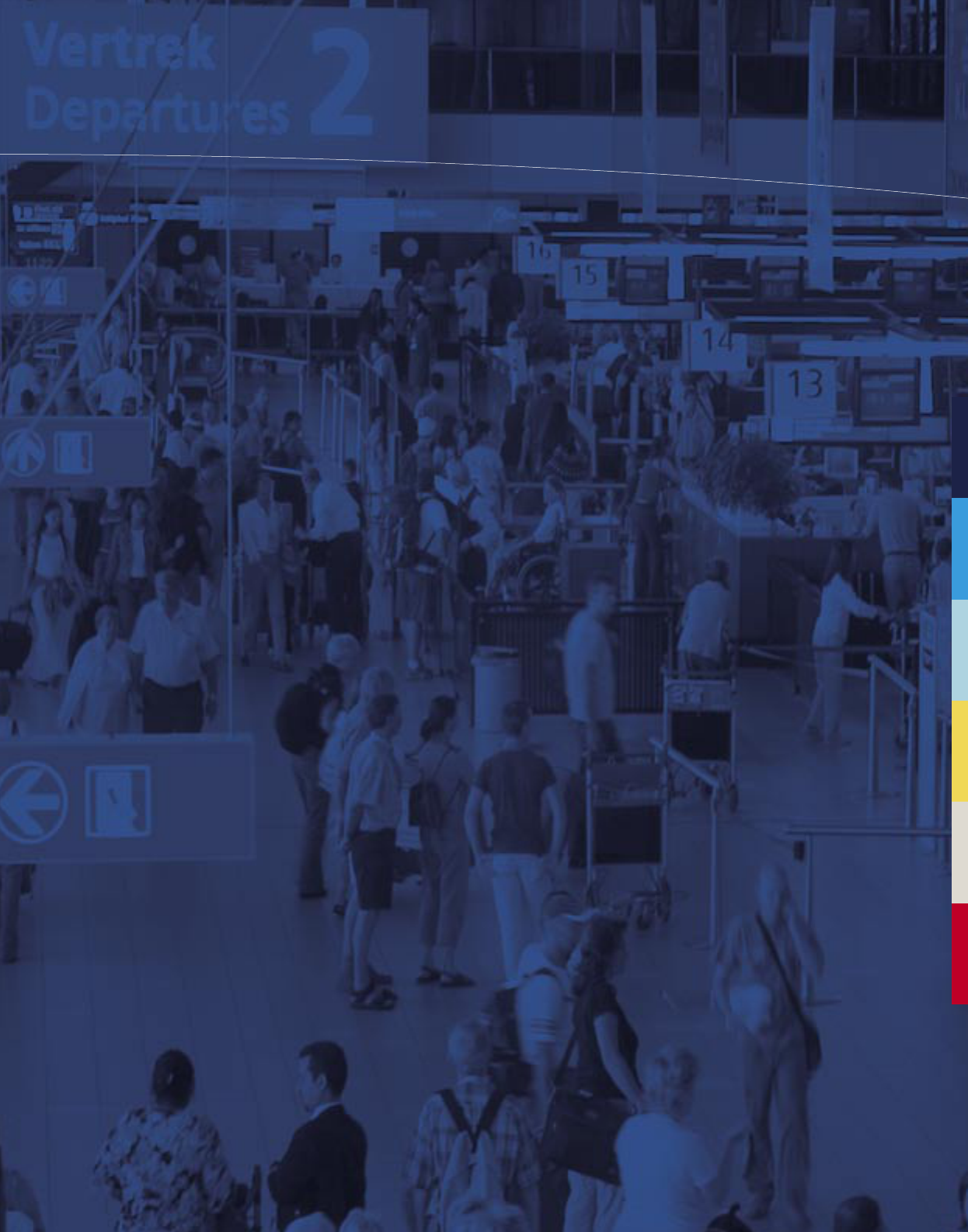
Entrées de Chapitres UK.indd 23 11/07/05 13:48:12

204
History
Air France
1933
Air France is born out of the combination of
five French airlines.
1945
Air France is nationalized.
1946
The Paris-New York service is inaugurated with a DC4
and a flight time of 23 hours and 45 minutes.
1959-1960
The first Caravelle and Boeing 707 aircraft are brought
into service, with the latter model reducing the time of
the Paris-New York service to 8 hours.
1976
Concorde is commissioned, first on the Paris-Rio,
Paris-Caracas and Paris-Washington routes and then
Paris-New York the following year, connecting the
two cities in 3 hours and 45 minutes.
1990
The Company acquires UTA, founded in 1963.
1992
Air France and UTA merge, giving Air France a 72% stake
in Air Inter after combining its own interest in this company
with that of UTA.
1996
Air Inter becomes Air France Europe.
1997
Air France Europe is merged with Air France.
1999
Air France is successfully floated, with the participation
of 2.4 million private individuals, international institutional
investors and 72% of staff. Air France is listed on the Monthly
Settlement Market for the first time on February 22, 1999.
2000
SkyTeam and SkyTeam Cargo are launched. Air France is a
founding member of these alliances alongside Aeromexico,
Delta and Korean. The regional division is created following
the acquisition of Régional Airlines, Flandre Air, Porteus, Brit
Air and CityJet.
2001
The “Open Sky” agreement is concluded between France
and the US. Alitalia and CSA join the SkyTeam alliance.
2002
SkyTeam is the only alliance in the world to benefit from
anti-trust immunity on its transatlantic and transpacific flights.
2003
Air France celebrates its 70th anniversary and announces its
intention to merge with KLM through a public exchange offer.
Entrées de Chapitres UK.indd 24 11/07/05 13:48:12

205
KLM
1919
KLM is founded as the Royal Dutch Airline for the
Netherlands and its Colonies.
1924
KLM runs its first intercontinental flight from Amsterdam
to Jakarta.
1934
KLM offers its first transatlantic service from Amsterdam
to Curaçao using a FokkerF XVIII Snip.
1946
KLM inaugurates a regular service between Amsterdam
and New York.
1958
KLM completes its first flight to Japan flying over the Pole.
1989
KLM concludes an alliance with Northwest Airlines.
2002
KLM announces the renewal of its fleet, with the arrival of the
Boeing B 747-400ER Freighter, the Boeing B 777-200ER and
the Airbus A 330-200.
2004
KLM celebrates its 85th anniversary.
Air France-KLM
2004
21 April - Launch of the exchange offer for KLM shares.
3 May - Closing of the initial offer.
5 May - Listing on the Amsterdam and New York markets.
21 May - Closing of the additional offer.
15 September - Finalisation of the group organisation
with the creation of an Air France-KLM holding.
2005
Announcement of the creation of the European Cargo House.
Presentation of the first joint Air France-KLM summer schedule.
Introduction of Flying Blue, the first joint frequent-flyer program.
04-INFOS UK.indd 205 11/07/05 13:49:13

206
General information
Corporate name
Air France-KLM
Registered office
2, rue Robert Esnault-Pelterie, 75007 Paris
Mailing address
45, rue de Paris, 95747 Roissy CDG Cedex
Legal status
French limited liability company (Société Anonyme) with a
Board of Directors.
Legislation
French law.
Air France-KLM is governed by the French Commercial Code
and the provisions of the Civil Aviation Code as amended by
the law of April 9, 2003 relative to air transport companies and
notably Air France. The law of April 9, 2003 amended the Civil
Aviation Code, introducing a provision designed to safeguard
the nationality of air transport companies whose securities are
admitted to trading on a regulated market.
Incorporation and expiry dates
Incorporated on: April 23, 1947
Due to expire on: July 3, 2045 barring early liquidation or
extension.
Corporate purpose (Article 2 of the bylaws)
The primary purpose of Air France-KLM is to hold a direct or
indirect interest in the capital of air transport companies and
more generally stakes in any companies in France or elsewhere
whose purpose is related to the air transport business.
Trade register
Paris Trade and Company Register: 552 043 002
APE Code: 621 Z
Consultation of legal documents
Air France-KLM’s legal and corporate documents may be
consulted at 45 rue de Paris, 95747 Roissy CDG Cedex, France,
or requested by calling the following number: +33 1 41 56 88 85.
Fiscal year
The fiscal year runs from April 1 to March 31 of the following
year (IATA fiscal year) (see Glossary).
Appropriation of profits
After approving the financial statements and taking due note of
profits available for distribution, shareholders in shareholders’
meetings vote to decide on the total or partial distribution of
such profits (with, in the latter case, the appropriation of the
undistributed balance to one or more reserve accounts), or the
appropriation of all distributable profits to one or more reserve
accounts.
04-INFOS UK.indd 206 11/07/05 13:49:13

207
Information on the share capital
At March 31, 2005, the share capital came to a total of
2,289,759,903 euros, split into 269,383,518 fully paid-up shares
with a par value of 8.50 euros, held in registered or bearer form as
decided by the shareholder.
Share capital at March 31, 2005
The Extraordinary Shareholders’ Meeting of April 20, 2004
authorized the Board of Directors for a period of 26 months
from the date of the Meeting to issue shares and/or other
securities giving immediate or future rights to the capital of
Air France-KLM.
The Board of Directors used 677.1 million euros of the
authorization of 1.15 billion euros granted by the Shareholders’
Meeting of April 20, 2004 to increase the capital through the
issue of shares without preemptive subscription rights in the
context of the public exchange offer for the KLM shares, as
well as warrants to purchase new or existing shares (BASA).
The equity capital of the Air France-KLM group was increased
by 768 million euros at the end of the exchange offer in May
2004 and potentially by approximately 600 million euros at
the end of the period for exercising the warrants issued at the
same time.
Currently valid authorities granted by the Shareholders’ Meeting
to the Board of Directors
Nature of the operation Maximum amount of issues Balance available
Capital increase via the issue of shares:
- with preemption subscription rights 400 million euros 400 million euros
- without preemptive subscription rights 1.15 billion euros 437.9 million euros
Issues of debt securities giving rights to capital 1 billion euros 1 billion euros
Capital increase through capitalization of reserves
and/or additional paid-in capital 400 million euros 400 million euros
Capital increase reserved for the employee savings scheme
3% of the capital at
the time of the issue
The Combined Ordinary and Extraordinary Shareholders’
Meeting of September 15, 2004 authorized the Board of
Directors, for a period of 18 months, to trade its own shares
pursuant to the buyback program approved by the AMF under
No. 04-737, subject to the provisions governing stock buybacks
published by the French Autorité des Marchés Financiers on
October 13, 2004. The maximum purchase price was set at 25
euros and the minimum sale price at 8.50 euros.
Air France-KLM agreed not to acquire more than 5% of its
stock. In fiscal 2004-05, Air France-KLM used this authority
and the authority granted by the Shareholders’ Meeting of
July 10, 2003 (buyback program approved by the French COB
under No. 03.601) under the liquidity agreement signed with
SG Securities for a purchase amount of 2,535,856 shares and
sale of 2,422,165 shares.
As of March 31, 2005, the Air France-KLM group held 6,483,270
shares of Air France-KLM, including 3,524,464 shares for stock
options granted to Air France flight crews under the salary-
share swap plan established in 1999; 1,659,268 shares held
by KLM for stock options granted to the KLM management;
and 1,299,538 treasury shares.
Authorization to buy back the company’s own shares
04-INFOS UK.indd 207 11/07/05 13:49:13

208
At March 31, 2005, no options on the Air France-KLM’s shares
had been granted to the Air France-KLM’s corporate officers.
No stock subscription or purchase option schemes have been
set up by the Air France-KLM or its subsidiaries, with the
exception of those outlined below
Stock option scheme set up by KLM prior to the combination
with Air France in favor of the corporate officers and
managing executives of KLM.
Prior to the combination with the Air France, KLM set up a stock
option program governed by Dutch law, entitling beneficiaries
to acquire KLM shares. KLM had acquired or created and
held the number of shares needed to cover its obligations to
beneficiaries if they were to exercise their options.
Within the framework of the combination between Air France
and KLM, it was agreed that these options granted by KLM
would now entitle holders to Air France-KLM shares (instead
of KLM shares as initially planned). The shares held by KLM to
cover its stock option schemes were therefore transferred to a
foundation whose sole purpose was to hold the said shares,
and were converted into Air France-KLM shares. In addition,
the holders of stock options from the 1999 and 2000 programs
were offered an alternative solution under which their options
were valued using the Black-Scholes method and exchanged
for a portfolio of Air France-KLM warrants with an equivalent
value.
At March 31, 2005, this foundation held 1,659,268 Air France-KLM
shares in order to be able to cover any existing stock options
that may be exercised.
These options were granted to the corporate officers and
managing executives of KLM.
Stock subscription or purchase option schemes
Year created 2000 2001 2002 2003 2004 Total
Total number of
Air France-KLM shares
that can be subscribed
34,419 457,804
of which
A: 343,642
B: 114,162
460,455
of which
A: 341,350
B: 119,105
355,379 463,884 1,771,941
Due to expire on:
October 21,
2005
October 20,
2006
October 19,
2007
June 30,
2008
June 25,
2009
Exercise price
- A options — 20.44 12.80 — —
- B options 32.86 16.22 10.07 6.48 13.19
04-INFOS UK.indd 208 11/07/05 13:49:13

209
The Combined Shareholders’ Meeting on September 28, 1999
voted to authorize the allocation of stock options to flight deck
crew who accepted the salary-share swap. At the meeting on
May 30, 2000, the Board of Directors implemented this plan as
shown in the following table.
Stock option schemes set up by Air France-KLM for flight deck
crew prior to the combination with KLM
Plan characteristics
Date of the Shareholders’ meeting authorizing the plan
September 28, 1999
Date of the Board of Directors implementing the plan
May 30, 2000
Number of beneficiaries: 2,787 flight deck crew members
Maximum number of options: 3,516,596
Maximum number of shares acquired:
3,516,596
Option exercise price: 15.75 euros
Exercise conditions:
Between May 30, 2005 and May 30, 2007 at a
rate of one option for four shares acquired
in connection with the salary-share swap
Under this plan, the 10 largest beneficiaries hold a total of 79,465 options.
At March 31, 2005, Air France had 3,524,464 shares in order to cover the stock option plan for flight deck crew members who
accepted the salary-share swap.
At March 31, 2005, certain securities giving rights to capital
were outstanding. Following the operation to exchange
KLM securities for Air France-KLM securities, 45,093,299
subscription warrants for new or existing shares were created
in May 2004. These warrants, with a maturity of three and a
half years, may be exercised on or after November 6, 2005 in
the ratio of three warrants for two shares at a price of 20 euros
per share.
On April 22, 2005, Air France successfully placed 450 million
bonds convertible and/or exchangeable to Air France-KLM
shares (OCEANE) on the capital markets. The 21,951,219
Air France bonds with a unit face value of 20.50 euros give
the right to the allotment of new and/or existing shares of
Air France-KLM on the basis of one share per bond. This
allotment may be made at any time from June 1, 2005 until
March 25, 2020. The bonds will be fully amortized on April 1,
2020 by redemption at par.
The OCEANES have been listed for trading on the Eurolist
market of Euronext Paris since April 22, 2005.
Securities conferring entitlement to shares
04-INFOS UK.indd 209 11/07/05 13:49:14

210
Following the exchange offer for KLM securities by Air France,
49,602,631 million shares were created on two occasions in May
2004, taking the total number of shares up to 269,383,518 and
the share capital to 2,289,759,903 euros.
The public exchange offer proposed to KLM shareholders on
April 5, 2004 had the following features:
- Exchange parity: 11 Air France shares and 10 equity warrants
for Air France shares (BASA) for 10 KLM shares, and
11 Air France American Depositary Shares (ADS) and
10 Air France American Depositary Warrants (ADW) for
10 KLM New York Registry Shares.
- Three BASAs will give the holders the right to purchase two
new and/or existing shares of Air France stock at an exercise
price of 20 euros per Air France-KLM share. The BASAs have
a maturity of three and a half years from May 6, 2004 and
may be exercised on or after November 6, 2005.
- The ADW will have the same conditions and exercise price
for ADS or Air France-KLM shares as the BASAs.
Changes in the share capital over the last five years
Variations in capital Total capital
(euros)
Total number of
shares
Par value
(euros)
Additional paid-in
capital (euros)
At March 31, 2001
— — 1,868,137,540 219,780,887
At March 31, 2002
— — 1,868,137,540 219,780,887
At March 31, 2003
— — 1,868,137,540 219,780,887
At March 31, 2004
— — 1,868,137,540 219,780,887
At March 31, 2005
421,622,363 346,264,903 2,289,759,903 269,383,518
04-INFOS UK.indd 210 11/07/05 13:49:14

211
Current breakdown of capital and voting rights
% of share capital % of voting rights
At March 31, 2005 March 31, 2004 March 31, 2003 March 31, 2005 March 31, 2004 March 31, 2003
French State
23.2 54.0 54.4 23.8 54.6 55.1
Current and
former employees
11.7 12.8 12.9 11.7 12.9 13.1
Air France-KLM
(treasury stock)
2.4 1.1 1.3 - - -
Public 62.7 32.1 31.4 64.5 32.5 31.8
Following the transfer of 47,680,883 shares by the French
State on December 9, 2004, an offering was proposed to the
employees in accordance with the privatization law.
This offering was composed of two blocks:
- a first block of 8,414,273 shares fully subscribed and
delivered on March 31, 2005;
- a second salary-share swap block of 12,612,671 shares
delivered on April 11, 2005. At the end of the operation, the
French State held 18.6% of the capital and the employees
held 16.3%.
To the knowledge of Air France-KLM, no shareholder or group of
shareholders other than the French State, the Barclays Group,
the BNP Paribas Group, the Caisse Nationale des Caisses
d’Epargne (CNCE), Alitalia, the Société Générale Group and
CIP-Paribas, held directly or indirectly, individually or together,
0.5% or more of the capital and voting rights at March 31,
2005. Air France-KLM has no knowledge of the existence of a
shareholders’ agreement.
04-INFOS UK.indd 211 11/07/05 13:49:14

212
On September 25, 1998, the Shareholders’ Meeting authorized
Air France-KLM to make use of the legal provisions concerning
the identification of holders of securities conferring immediate
or future entitlements to vote at shareholder meetings. This
option was exercised in September 2002 and April 2004.
Pursuant to the new Articles L.360-1 to L.360-4 of the Civil
Aviation Code, as amended under the French law of April 9,
2003, listed French air transport companies are authorized
to incorporate a provision into their bylaws allowing them to
monitor and control their shareholders and to require certain
shareholders to sell all or part of their interests in the event of
a risk relative to their nationality. This is because, over time,
changes in the shareholding structure of an air transport
company whose shares are traded on a regulated market could
jeopardize its operating license as an EU air transport company
(retention of this license is conditional on EU interests holding
a majority of the shares and maintaining effective control) or
the traffic rights held by the company as a French air transport
company pursuant to bilateral international agreements
concluded between France and other states outside the
European Union.
Identification of shareholders
Identification of holders of bearer shares
Pursuant to Article L.233-7 of the French Commercial Code,
Article 13 of the Air France-KLM bylaws stipulates that any
private individual or corporate body, acting alone or in concert,
acquiring directly or indirectly at least 0.5% of Air France-KLM’s
voting rights or any multiple thereof lower than 5%, must notify
Air France-KLM by registered mail with delivery receipt within
15 days of the date on which the threshold is exceeded.
Above 5% and without limitation, notice must be given under
the same conditions each time a further 1% of voting rights is
crossed. These obligations are applicable when thresholds are
crossed in either direction.
The aforementioned obligations under the bylaws do not
replace the legal obligation to inform Air France-KLM and the
French securities regulator (Autorité des Marchés Financiers,
AMF) within five trading days if the 5%, 10%, 20%, 33
1/3
%,
50% and 66
2/3
% share capital and voting right thresholds are
exceeded. Furthermore, if the 10% and 20% share capital and
voting right thresholds are exceeded, the shareholder must
notify Air France-KLM and the AMF of its objectives for the
next 12 months within 15 days.
This notification is subject to the conditions and sanctions set
forth in Article L.233-14 of the Commercial Code. In addition, in
the event of failure to comply with this notification requirement
and at the request of one or more shareholders holding at least
5% of the share capital or voting rights, the shares exceeding
the reporting thresholds will be stripped of their voting rights at
all shareholder meetings held for a period of two years following
compliance with notification procedures.
Any shareholder acquiring over 2% of Air France-KLM s voting
rights is required to register these securities within 15 days of
the date on which the threshold is exceeded. (Extraordinary
Shareholders’ Meeting of September 25, 1998).
Following the public exchange offer on KLM securities,
Air France-KLM was privatized, with the French State’s interest
diluted, down from 54% to 44.1%. As a result, the statutory
changes in the bylaws related to the transfer of the majority of
the capital stock to the private sector, which were approved at
the Shareholders’ Meeting on July 10, 2003, now apply. These
changes primarily concern the monitoring and registration of
shareholders, formal notices to sell shares and the mandatory
sale of shares, and the structure of the Board of Directors, as
presented in the corporate governance part.
Legal and statutory investment thresholds
04-INFOS UK.indd 212 11/07/05 13:49:14

213
Air France-KLM and its Air France subsidiary signed an agreement
on October 5, 2004 that set out to define the conditions under
which Air France would provide technical and administrative sup
-
port services requested by Air France-KLM
.
These accounting, administrative, legal and IT services will be
invoiced at cost.
On the same date, Air France-KLM and its Air France subsi
-
diary also concluded:
- a cash management agreement (credit line made available
to Air France-KLM);
- a domiciliation agreement (site of Air France-KLM’s head
-
quarters made available).
Prior to their signature, these three agreements were approved
by the Boards of Directors of Air France-KLM and Air France
on September 15, 2004.
Similar agreements will be signed between Air France-KLM and
KLM.
Relations between Air France-KLM and its subsidiaries
Identification and monitoring of shareholders: Articles 9
and following of the Air France-KLM bylaws set the conditions
under which the Board of Directors can or must decide either
to reduce the 2% threshold (the current threshold) above which
shares must be held in registered form to 10,000 shares, or
to require all shares in Air France-KLM to be held in registered
form. However, when the 40% share capital or voting right
threshold has been passed by non-French shareholders, the
Board of Directors must decide to reduce this 2% threshold to
10,000 shares.
When Air France-KLM has published a notice informing
shareholders and the public that non-French shareholders
own, directly or indirectly, 45% of Air France-KLM’s capital or
voting rights, the Board of Directors must decide to make it
mandatory for all Air France-KLM shares to be held in registered
form. Air France-KLM may at any time and at its cost submit a
request to the organization responsible for the compensation
of securities to provide full details regarding the identification
of holders of Air France-KLM securities conferring immediate
or future entitlements to vote at its shareholder meetings, in
addition to information on the quantity of securities held by
each one of them.
Furthermore, independently from the prescriptions applicable
under Article L.233-7 of the Commercial Code, any private
individual or corporate body, acting alone or in concert, acquiring
directly or indirectly a number of shares corresponding to at
least 0.5% of Air France-KLM’s capital or voting rights or any
multiple thereof, must notify Air France-KLM by registered mail
with delivery receipt within 15 days of the date on which the
threshold is exceeded. Notice must be given under the same
conditions each time a further 0.5% of the capital and voting
rights is crossed, up to 50%. Any shareholder, whose holding
falls below one of the thresholds listed above must also inform
the company within the same deadline of 15 days and under
the same conditions.
Article 10 of the bylaws defines the information that must be
provided to Air France-KLM by shareholders—both private
individuals and corporate bodies—subject to the obligation to
hold their shares in registered form. This information includes
the nationality of the shareholder. Article 11 defines the
conditions under which the Board of Directors may exercise its
right to approve new shareholders.
Formal notice to sell and mandatory sale of shares: Article
15 of the Air France-KLM bylaws stipulates the information
that Air France-KLM must publish and distribute to inform the
public that over 45% of the share capital or voting rights is
held by shareholders who are not of French nationality. Based
on this threshold, Air France-KLM will be entitled to launch
procedures requiring the sale of shares in order to protect
its nationality. Articles 15 and 16 respectively concern formal
notices to sell and the mandatory sale of shares held in breach
of regulations.
Statutory provisions concerning shareholders
04-INFOS UK.indd 213 11/07/05 13:49:14

214
Information on the agreements concluded
in connection with the combination between
Air France and KLM
In connection with the agreements concluded between KLM and Air France for the creation of the Air France-KLM group, various
agreements were concluded with KLM’s existing shareholders on the date on which the global agreement between Air France
and KLM was signed.
KLM set up two Dutch foundations, SAK I and SAK II, to handle
the administration of KLM shares transferred as part of the
combination operations and acquired by Air France-KLM from
KLM shareholders over a three-year period.
In return for the shares transferred to SAK I and SAK II,
Air France-KLM has received share certificates enabling
it to benefit from all the economic rights (including dividend
rights) associated with the underlying shares. SAK I and SAK
II will however retain the voting rights linked to these shares.
These voting rights will be exercised by the two foundations in
accordance with the corporate governance principles defined
in the agreements for the combination between KLM and
Air France, in the best interests of KLM, Air France-KLM and
its shareholders.
Agreements on the shareholding structure
In order to allow the combination to go ahead and safeguard
KLM’s traffic rights, Air France-KLM and KLM concluded the
following agreements with the Dutch State.
Agreement for the acquisition of cumulative preferential
A shares held by the Dutch State
Air France-KLM, KLM and the Dutch State have signed an
agreement under which the Dutch State will scale down its
interest in KLM in proportion to any reduction by the French
State of its stake in the Air France-KLM’s share capital. As such,
the Dutch State will sell its cumulative preferential A shares to
Air France-KLM or to a Dutch foundation in the name of and on
behalf of Air France-KLM if the transfer takes place during the
first three years following the successful completion of the offer.
In the second case, the foundation will issue share certificates
for Air France-KLM corresponding to the cumulative preferential
A shares transferred to the foundation. These share certificates
will confer all the economic rights associated with the shares
on Air France-KLM, while the corresponding voting rights will
be exercised by the foundation until the share certificates have
been exchanged by Air France-KLM against the said shares. At
the end of the initial three-year period, Air France-KLM will be
entitled to exchange the share certificates for the cumulative
preferential A shares, and hold the shares directly.
After the French State’s sale of 68,707,903 shares of
Air France-KLM, the Dutch State sold 5,103,885 KLM
cumulative preferred A shares to Air France-KLM. They
were transferred to the SAK I foundation, which remitted to
Air France-KLM the financial rights attached to these shares.
Notwithstanding the mandatory disposal of these cumulative
preferential A shares under the conditions set out above, the
Dutch State may transfer as many cumulative preferential A
shares as it deems relevant to Air France-KLM at any time.
Amendments made to the Dutch State’s option and the
related agreements
The Dutch State has an option to subscribe for preferential
KLM B shares, enabling it to increase its stake to 50.1%
of the capital and voting rights of KLM irrespective of the
amount of capital issued by KLM when the said option is
exercised. This option is based on the Chicago Convention
and bilateral air service agreements according to which
KLM’s operational right to operate air transport services on
international lines generally depends on the obligation for a
majority or a significant percentage of the capital to be held
by Dutch nationals or Europeans or for the effective control of
Air France-KLM to be exercised by Dutch or European parties.
Agreements with the Dutch State
04-INFOS UK.indd 214 11/07/05 13:49:15

215
On October 16, 2003, Air France-KLM and KLM gave the Dutch
State the following assurances with a view to maintaining the
quality of KLM’s network at Schiphol airport, which, according
to the Dutch State, is of public interest, while at the same time
taking into account the interests of the Air France-KLM group
and its shareholders.
The assurances given to the Dutch State will be applicable
until May 5, 2012
• Air France and KLM will continue to be air transport companies
and will maintain their operational activities in France and the
Netherlands respectively. Air France and KLM will keep their air
transport and operating licenses, and will continue to fulfill all of
the conditions required for the maintenance of these licenses;
• Working with the relevant Civil Aviation Authorities,
Air France and KLM will both make every effort to keep all
the authorizations and respective rights granted by the said
authorities that are necessary for running international lines.
To this end, if an economic decision to shut a service down
was likely to result in the partial loss of these authorizations, all
the parties concerned will make every effort to safeguard the
authorizations and rights concerned without compromising
the underlying economic decision;
• Air France and KLM confirmed that passenger traffic on flights
out of Roissy-CDG and Schiphol and the potential for growth
in this traffic are vital to the success of the Air France-KLM
group, which will operate a multi-hub system in Europe based
on two main airports: Roissy-CDG and Schiphol;
Assurances given to KLM and to the
Dutch State by Air France-KLM
Air France-KLM, KLM and the Dutch State signed an agreement
on October 16, 2003 to amend certain terms of the existing
option for the Dutch State, subject to the suspensive condition
of the offer being completed. In accordance with the amended
terms of the option, the Dutch State may exercise its option
if another country, representing a key market served by KLM
provides written notice that it intends to limit or terminate KLM’s
scheduled airline operations with the said country because
it considers that a significant percentage of KLM’s capital is
no longer held by Dutch shareholders or that the effective
control of KLM is no longer exercised by Dutch nationals. The
Dutch State’s amended option will initially be set for a period
of three years, which may be renewed on three occasions
by the Dutch State for periods of twelve months each. This
period may be renewed if the Dutch State deems that it is
necessary owing to a threat to KLM’s traffic rights on certain
key markets. The State will be required to give written notice
to KLM and Air France of its intention to renew this option.
This notification should notably include the reasons behind
such a renewal and the names of the countries contesting
KLM’s traffic rights.
This agreement also stipulates that the parties will discuss
upstream and in good faith the need to exercise the amended
option for the Dutch State and the corresponding schedule,
although such discussions will not necessarily represent a
prior authorization right for Air France-KLM. After exercising
the option, the Dutch State will be required to inform
Air France-KLM at least every six months of progress made
on discussions with the countries contesting KLM’s traffic
rights.
The amended option also states that the Dutch State will
exercise the voting rights associated with the preferential
B shares acquired as a result of this option being exercised,
in accordance with the best interests of KLM, Air France-KLM
and its shareholders but, under all circumstances, in accordance
with the corporate governance guidelines indicated in the
global agreement.
If after exercising the amended option, the Dutch State
establishes that KLM’s key markets are no longer threatened,
KLM will be required to buy back the preferential B shares
with a view to canceling them, at a price equal to the amount
paid at the time of the issue of the preferential B shares,
increased to factor in the amount of any dividends accrued
but not yet paid. Such a buyback operation will not affect
the Dutch State’s option, which will remain in force as
stipulated.
In connection with their combination, Air France and KLM drew up a set of principles for “assurances” given by Air France-KLM
to KLM and by Air France-KLM and KLM to the Dutch state.
Assurances given to the Dutch State
04-INFOS UK.indd 215 11/07/05 13:49:15

216
• Air France and KLM agreed that the cargo activities on
the Roissy CDG and Schiphol hubs and the potential
for growth in this business are vital to the success of the
Air France-KLM group;
• Air France and KLM agreed that the potential for synergies
identified with regard to the cargo business will open up
development opportunities for the Air France-KLM group at
Schiphol and Roissy-CDG.
The following assurances given to the Dutch State will be
applicable until May 5, 2009
• Subject to any measures for adaptations required in the
event of a crisis, the passenger traffic at Roissy-CDG will not
be developed in such a way that it is significantly detrimental
to the existing portfolio of key destinations operated by
KLM out of Schiphol provided that the said destinations
maintain their economic interest for the Air France-KLM
group; Similarly, the passenger traffic at Schiphol will not be
developed in such a way that it is significantly detrimental to
the current portfolio of key Air France destinations operated
out of Roissy-CDG. The Air France-KLM group will be able to
transfer up to five key KLM destinations, which will become
destinations operated by Air France out of Roissy-CDG,
insofar as the transfer of these lines is accompanied by the
symmetrical transfer of five Air France destinations that will
then be operated by KLM out of Schiphol.
• Subject to any measures for adaptations required in the
event of a crisis, the Air France-KLM group’s cargo activity
at Roissy-CDG will not be developed in such a way that it
is significantly detrimental to KLM’s global cargo activity at
Schiphol. Similarly, the Air France-KLM group’s cargo activity
at Schiphol will not be developed in such a way that it is
significantly detrimental to Air France’s global cargo activity
operated out of Roissy-CDG.
In return for these assurances, the Dutch State undertook
to take the importance of KLM’s activities at Schiphol into
consideration when defining its civil aviation policy. Furthermore,
the Dutch State has agreed to:
• maintain the existing portfolio of traffic rights granted to
KLM, other than those that have not been used by KLM over
a cumulative period of twelve months;
• continue to review any future request submitted by KLM
for the allocation of new traffic rights on a fair and non-
discriminatory basis.
Any action or decision to be taken while the assurances
given to KLM are still in force that could result in a change in
these assurances will be subject to the prior agreement of the
Dutch State.
In order to safeguard the long-term interests of each party
as well as the interests of the Air France-KLM group and its
shareholders, Air France-KLM has given KLM the following
assurances:
• Air France and KLM recognize the importance of human
resources and the need to develop and maintain centers
of excellence within the Air France-KLM group. They agree
that promotions will be based on merit and skills with no
discrimination. Similarly, any restructuring operations will
be carried out in accordance with the principle of non-
discrimination;
• Air France and KLM confirm that passenger traffic on flights
out of Roissy CDG and Schiphol and the potential for growth
in this traffic are vital to the success of the Air France-KLM
group, which will operate a multi-hub system in Europe
based on two main airports: Roissy CDG and Schiphol;
• By setting up a combined integrated network, Air France and
KLM intend to optimize the current portfolio of Air France and
KLM destinations in favor of the Air France-KLM group, while
seeking to maintain and ensure the long-term development
of lines operated by the two companies for flights to or from
Roissy-CDG and Schiphol. The balanced nature of this long-term
development will be ensured through compliance with the fleet
plan already defined by each of the parties for the period from
2003 to 2005, and will be determined based on the following
factors:
- a common economic strategy and, for the development
of business plans for the two airlines, a common objective
Assurances given to KLM
04-INFOS UK.indd 216 11/07/05 13:49:15

217
of global profitability and financial solidity;
- the suitability of business plans for the development of
traffic flows;
- a reasonable division of new opportunities between the
two networks, in line with natural traffic flows and the
economic conditions applicable to each of the two hubs;
- subject to the aforementioned criteria, the development of
one hub must not be detrimental to the other hub, its existing
portfolio of key destinations and its potential development.
A transfer of destinations from one hub to another will not
be authorized unless this option is of obvious interest and
significance for the combined operational entities or it is
offset by the symmetrical transfer of another destination.
• Air France and KLM agreed not to operate flights from the
two hubs to any long-haul destination serviced up until this
point by only one of the companies from its hub, subject to
certain conditions.
• Air France and KLM will continue to use their respective
codes: “AF” and “KL”;
• On lines between the Netherlands and France, Air France and
KLM will optimize the use of their fleet, services and crews
in order to reduce costs by eliminating non-use of aircraft at
night and optimizing schedules and capacities. Air France
and its subsidiaries will serve the hubs at Roissy-CDG,
Clermont-Ferrand and Lyon. KLM and KLM Cityhopper will
serve the Schiphol hub, with no less than 50% of flights.
• Air France and KLM agreed that the cargo activity and its
potential for growth at Roissy-CDG and Schiphol are vital to
the success of their cooperation.
• Air France and KLM agreed to ensure the balanced
development of capacity at each hub, including, if
economically justified, investments in cargo planes or
aircraft conversions in order to maintain the capacity and
development of cargo destinations, and investments to
develop the capacity of cargo infrastructures for hubs. The
Air France-KLM group’s business plan aims to maintain the
long-term development of each hub.
The fair nature of this long-term development will be determi
-
ned on the following basis:
- a common economic strategy and, for the development
of business plans for the two companies, a common
objective of global profitability and financial solidity
- the suitability of business plans for the development of
the air cargo transport market;
- the development of one hub will not be detrimental to the
cargo activity at the other hub, subject to all the measures
for adaptations required in the event of a crisis.
• Air France and KLM agreed to draw up a “cargo agreement”,
which will not impede the potential integration of Martinair
into the Air France-KLM group if this is beneficial for the
two parties and strengthens the position of Schiphol.
Air France will not block the project, subject to a review of the
lines operated by the two airlines and a comparison of the
benefits, synergies and risks involved (including the securing
of acceptable conditions for the operation to be approved by
the Dutch and European authorities);
• Air France and KLM agreed that the combination should
lead to an increase in the portfolio of products offered by
the Air France-KLM group in terms of engineering and
maintenance services;
• Air France and KLM agreed that for commercial and heritage
reasons, the identity of each party should be preserved;
• Air France and KLM agreed to continue using, for as long
as they believe it to be necessary, their brand and logo,
of which they recognize the value and heritage, until the
Air France-KLM group has acquired an equivalent or higher
level of recognition;
• Air France and KLM will make every effort to retain the term
“Royal” for KLM.
The assurances given to KLM entered into effect on
May 5, 2004 and will continue to apply until May 5, 2009,
it being understood that at the end of a three-year period,
the assurances given relative to the passenger and cargo
networks, hubs and engineering and maintenance activities
will be revised jointly by Air France-KLM and KLM in order
to take the future Air France-KLM group environment into
consideration.
04-INFOS UK.indd 217 11/07/05 13:49:16

218
Strategic Management Committee (SMC)
Under the agreements signed with KLM, a Strategic Management
Committee (the “SMC”) was formed within Air France-KLM on
May 6, 2004 for a period of three years, until May 6, 2007. After
that date, the Chairman of the Air France Board may decide
either to keep the SMC or to create another equivalent body. The
SMC meets every two weeks, alternating between Amsterdam
and Paris.
In connection with the combination with KLM, Air France-KLM
and KLM set up a Dutch foundation—Fondation des Assurances
KLM —in order to facilitate the formation of binding advices on the
interpretation of assurances given to the Dutch state and KLM.
The foundation comprises two boards, which issue binding
advices if any decisions taken by the KLM Supervisory Board,
KLM Management Board or Air France Board of Directors
appear to contravene the assurances given. The foundation
will be in place through to May 6, 2012, subject to one of the
boards not being affected by a possible contravention of the
assurances on this date. In this case, the foundation will be
immediately liquidated after having given its opinion on the said
contravention. When giving its opinions, the foundation must
act in the best interests of KLM, the Air France-KLM group and
its shareholders.
The foundation is managed by a board of four independent
directors:
- one appointed by Air France;
- one appointed by KLM;
- one appointed by the Dutch State;
- one appointed by the other three directors.
The director appointed by Air France has double voting rights
with regard to the appointment of the fourth director. Notices
relative to a possible contravention of the assurances given
to the Dutch State will be issued by a board made up of the
director appointed by Air France, the director appointed by the
Dutch State, and the director appointed by the other directors.
Notices relative to a possible contravention of the assurances
given to KLM will be issued by a second board comprising
the director appointed by Air France, the director appointed by
KLM, and the director appointed by the other directors.
The submission of a case for the foundation’s relevant board may be
carried out either by the Dutch state with regard to the assurances
given to it, or by several members of the KLM Supervisory Board
acting together with regard to the assurances given to KLM. If
the relevant board issues a mandatory notice indicating that the
decision that was submitted to it contravenes the assurances
given, the KLM Supervisory Board, KLM Management Board or
Air France-KLM Board of Directors will be required to cancel or
amend its decision as soon as possible and cancel the effects
of any actions taken in connection with the said decision, in
accordance with the notice issued. The two boards will take their
decisions based on a majority of votes.
At March 31, 2005, no cases had been submitted to the
foundation’s boards.
Implementation of a mechanism to ensure compliance with the assurances given
Members of the SMC
The SMC has eight members:
- the Chairman of the Board of Air France (Chairman of the
SMC);
- three employees of Air France exercising management
positions;
- the Chairman of the KLM Management Board; and;
- three members who are either members of the KLM Mana-
gement Board or KLM employees exercising management
positions.
The members of the SMC are appointed by the Air France-KLM
Appointments committee after consultation and on the
recommendation of the Chairman of the Board of Directors of
Air France for the three members representing Air France and
exercising management positions, and after consultation and
on the recommendation of the Chairman of the Supervisory
Board of KLM for the appointment of the three members who
are either members of the KLM Management Board or KLM
employees exercising management positions.
04-INFOS UK.indd 218 11/07/05 13:49:16

219
The decisions of the SMC express the joint position of
Air France and KLM for any significant strategic decisions that
affect commercial, financial, technical and operational areas,
particularly with respect to the following:
• the strategy of the Air France-KLM group toward its
competitors, partners and the public authorities;
• the definition of the strategy for network management,
including the development of the hubs, significant changes
in the structure of the network, the introduction of routes
operated by the two airlines, agreements with other carriers,
the division of traffic rights between KLM and Air France if
there is a European decision to lift restrictions on nationality;
• the financing, debt strategy and significant investments
in terms of the fleet, information systems and any other
significant projects;
• significant financial investments and partnership, cooperative
and/or alliance agreements with strategic air carrier
partners;
• the purchasing policy;
• budgets and medium-term planning to ensure that they are in line
with the strategy defined by the SMC;
• the appointment of key personnel within Air France and KLM
(selected on the basis of lists prepared by Air France and
KLM respectively);
• the addition of new airlines to the Air France-KLM group;
• the human resources policy on issues shared by several
companies of the group;
• any decision concerning the Dutch airline Martinair, in which
KLM is a shareholder; and;
• any reserved decision or decision subject to prior consultation
(such as those described below).
The SMC will make mandatory recommendations on the
issues listed above to the Board of Directors of Air France,
the Management Board and the Supervisory Board of KLM.
Neither the Chairman of the Management Board of KLM, the
Chairman of the Board of Directors of Air France nor any
chairman, director or key employee of the combined entities
or their subsidiaries, depending on the case, may take or
implement any decisions that come under the competence
of the SMC unless the SMC has previously issued its binding
recommendation.
The SMC also acts as mediator in the event of disagreements
about the application of the bilateral commercial agreements or the
management of the entities held or managed jointly by Air France
and KLM.
Operational sub-committees have been put in place under the
direction of the Strategic Management Committee to deal with
subjects such as the network, pricing and revenue management,
sales and distribution, products and brands, loyalty program,
engineering and maintenance, information technologies, regulations
and marketing agreements.
Role and responsibilities of the SMC
The Chairman of the SMC chairs SMC meetings and casts the
deciding vote if necessary on any decisions that must be sub
-
mitted to the SMC, with the exception of decisions reserved for
other bodies as summarized below.
Until May 6, 2007, the Chairman of the SMC must consult the
Chairman of the KLM Management Board before casting his
deciding vote, if necessary, on the following decisions:
• coordination of the available capacity of Air France and KLM,
the schedule and determination of the days for service on
shared destinations;
• coordination in order to avoid unfair practices against one
of the two subsidiaries by any partner that has signed an
alliance with the other subsidiary; and
• the schedules for passenger transport between France and
the Netherlands.
The following decisions must receive a unanimous vote by all
members of the SMC:
• any decision that modifies the assurances given to KLM;
• any decision, the purpose of which is:
- the combination or creation of common activities within
the operational activities of Air France and KLM existing
on October 16, 2003, such as the integration within a
joint structure of the cargo and catering businesses or
any general reorganizations of the operational activities
following the divestment or the termination of a business
by Air France and KLM;
- a change in the assignment of key management person
-
nel or of an entire operational activity between Air France
and KLM;
- the calendar, development and implementation of any deci-
sion dealing with the two issues described above; and;
- a decision to enter into an intra-group agreement on terms
other than normal current terms.
Any decision by the SMC to reject an operation relating to a
reserved decision will be binding.
Role and responsibilities of the Chairman of the SMC
04-INFOS UK.indd 219 11/07/05 13:49:16

220
Legislative and regulatory environment
for the air transport industry
Commercial air transport is governed by eight freedoms, national and supranational legislation, and various international
conventions that each state undertakes to apply in its air space after ratification.
Freedoms
Under a bilateral treaty, an air carrier has freedoms that allow
it to operate in the air space and the territory of a State other
than its State of origin. These eight freedoms are as follows:
1
st
freedom – A carrier that leaves from its State of origin has
the right to overfly the air space of a foreign State.
2
nd
freedom – A carrier that leaves from its State of origin
has the right to make a technical layover without unloading
or loading passengers in a foreign State. This freedom is the
«transit right».
3
rd
freedom – A carrier that leaves from its State of origin
has the right to unload passengers from its State of origin in
a foreign State.
4
th
freedom – A carrier that leaves from a foreign State has the
right to load passengers in this foreign State to unload them in
its State of origin.
5
th
freedom – A carrier that leaves from its State of origin has
the right to unload and load passengers in two successive
foreign States.
6
th
freedom – A carrier that leaves from a foreign State has the
right to load passengers in that State and unload them in its
State of origin, then in another foreign State.
7
th
freedom – A carrier that leaves from a foreign State has the
right to load passengers in that State to unload them in another
foreign State, without going through its State of origin.
.
8
th
freedom – A carrier that leaves from its State of origin has
the right to load passengers in a foreign State, to unload them
in another city in this same foreign State.
Access to the main international airports is regulated by the
allocation of time slots. A slot represents clearance given for a
carrier to land at or take off from an airport at a specified time
and date. Access to most European airports (London, Paris,
Frankfurt, Milan, Madrid, Amsterdam, etc.) and Asian airports
(Bangkok, Tokyo, Hong Kong, Singapore, etc.) is regulated
through slots. In the United States, with the exception of
John F. Kennedy Airport (New York) and O’Hare Airport
(Chicago), access to airports is controlled by other regulations
based on the assignment of boarding gates.
For airports within the EU, each Member State, in relation to
all the airports under its responsibility, and after consulting
the airlines that regularly use the airports concerned, their
representative organizations and the airport authorities,
designates an individual or an entity to be responsible for the
allocation of slots and the monitoring of their use.
Such individuals or entities must have specialized knowledge
in the area of coordinating aircraft routes for air transport
companies.
Slots are allotted twice a year by the designated airport
coordinator, at the same time as the airline flight schedules for
the relevant IATA season (April to October summer season and
November to March winter season) are being prepared, in line
with the following procedure:
• Airlines file their slot applications with the coordinator five
months prior to the beginning of each season;
• The coordinator first allocates slots to airlines that already
had slots the previous season (known as “grandfather rights”)
for past operators;
Allocation of slots
04-INFOS UK.indd 220 11/07/05 13:49:16

221
European legislation
Within the European Union, these freedoms are completed
by common legislation that creates a homogenous regulatory
situation for all European carriers. The existence of this
legislation eliminates the need for any bilateral agreement
between member States.
Single European airspace
Since April 1, 1997, all European airlines may freely operate
and, in particular, perform cabotage operations within a single
European airspace. Furthermore, any resident of an EU Member
State may now hold a stake in the shares of any EU-registered
airline, without limit, provided that the shareholder is not acting
as a front for a beneficial owner who is not a citizen of an
EU Member State. This framework does not prevent EU Member
States from participating in the ICAO, nor does it conflict with
the principles and regulations of the Chicago Convention.
• Once the slots have been allocated, the coordinator gives all
the interested parties certain details about the slots requested:
slots subject to grandfather rights and slots allocated, with a
breakdown by airline and ranking in chronological order for all
carriers, as well as information on which slots are on hold and
which may still be available;
• A pool is created that includes, for each coordination period,
all the available slots, whether they are newly created, unused,
abandoned by a transporter or have become available for
any other reason;
• The coordinator allocates half of the pooled slots to newcomers
and the other half to long-standing operators in proportion
to the slots allocated previously; any remaining slots are also
allocated based on the same procedure.
An allocated slot that is not used is reclaimed and re-allocated
to another airline. Since slots are first allocated to existing
long-standing operators, and given the expansion plans of
most airlines, requests for new slots are rarely satisfied at
saturated airports.
At the end of this preliminary allocation (pre-coordination)
process, a conference attended by virtually all airport
coordinators and airlines is organized in order to enable the
airlines to:
• simultaneously coordinate the slots they are allocated on
different airports so that when they operate flights between
two coordinated airports they are granted compatible slots
by each of them; and
• exchange slots among themselves in the event that the
slots originally allocated by the airport coordinators are
unsatisfactory.
The grandfather rights of long-standing users give established
airlines a decisive commercial competitive edge over other
airlines on saturated airports because they already enjoy the
best slots in their principal airports in terms of both quality and
quantity.
04-INFOS UK.indd 221 11/07/05 13:49:17

222
International conventions
Three main treaties establish the legal and regulatory framework governing commercial air transport: the Montreal Convention,
the Chicago Convention and the Rome Convention.
The Montreal Convention (1999)
In May 1999, a new treaty was signed in Montreal by more
than 50 states. It aims to provide better protection for victims
for damages suffered. This convention entered into force on
June 28, 2004.
It is based on several fundamental provisions, notably the
principle of the unlimited liability of air transport companies in
the event of physical injury with the implementation of a two-
tier system:
• a first level that sets an objective liability for the air transport
company of up to 100,000 Special Drawing Rights (SDR);
• a second level, based on a presumption of fault for the air
transport company, for which the airline may be exempt if it
proves that it or its agents or officials have not been negligent
in any way or that the damages are exclusively a result of the
acts of a third party.
Furthermore, with regard to compensation, the rule relative to
the regional authority of courts has been extended.
The Chicago Convention (1944)
The Chicago Convention established the International Civil
Aviation Organization (ICAO), which in 1947 became the
aviation division of the United Nations, within the framework
of which Member States establish the international technical
regulations governing civil aviation.
This convention sets out the legal, regulatory and technical
rules governing commercial aviation and its signatories are
required to implement a common legal framework governing
their domestic airspace and their relations with one another.
The Rome Convention (1952)
The Rome Convention covers damages caused to third parties
on the ground by foreign aircraft. This convention, signed in
1952, has not been ratified by France or the Netherlands.
Passenger rights in the European Union
On February 17, 2005, new European regulations governing
the rights of passengers took effect. These regulations apply to
all flights—both scheduled and unscheduled—departing from
an airport located in a member State of the European Union,
and established new common rules for indemnification and
assistance, if embarkation is refused or delayed substantially, a
flight is cancelled, or class is downgraded.
In the area of overbooking, air carriers are above all encouraged
to develop their policy to call for volunteers. If this policy does
not prevent refusals for boarding, the passengers affected receive
an indemnification calculated on the basis of the final destination
mileage zone and the delay in terms of the initial arrival time. This
indemnification may vary from
€250 to €600.
In addition, when a flight is delayed for at least five hours,
passengers may request reimbursement for their ticket (including
for the legs of the trip already completed) if no replacement solution
is possible or if they believe that their trip has become pointless.
If a flight is cancelled, the regulations introduce new rights for the
passenger and new obligations for air carriers. These obligations
are based on the carrier’s ability to react to inform the passenger.
The earlier the carrier informs the passenger, the fewer constraints
it has. If these obligations are not met, the passenger may claim
an indemnity that varies from €250 to
€600, on the basis of the
final destination mileage zone and the time period in which he was
rescheduled.
Finally, a passenger who is seated in a class lower than the
reservation class will now benefit from a partial reimbursement
of the trip in question equal to 30%, 50% or 75% based on the
destination mileage zone.
04-INFOS UK.indd 222 11/07/05 13:49:17

223
Statutory Auditors’ Report on the
«Document de Référence» 2004-05
As Statutory Auditors of Air France-KLM and in accordance with
articles 211-1 through 211-42 of the AMF rules and regulations,
we have performed procedures on the information relating to the
financial position and the historical financial statements of the
Company contained in the attached “document de référence” in
accordance with professional standards applicable in France.
The Chairman of the Company is responsible for the preparation
of the “Document de référence”. Our responsibility is to report
on the fairness of the information presented in the “Document
de référence” relating to the financial position and the historical
financial statements.
We performed our procedures in accordance with professional
standards applicable in France. Those standards require that
we assess the fairness of the information presented relating
to the financial position and the historical financial statements,
and its consistency with the audited financial statements on
which we have issued a report. Our procedures also included
reading the other information contained in the “Document de
référence” in order to identify any material inconsistencies
with the information relating to the financial position and the
historical financial statements and to report any apparent
material misstatements of facts that we may have found in
reading the other information based on our general knowledge
of the Company obtained during the course of our engagement.
The document does not include any selected prospective data
resulting from an organized process
Statutory financial statements as of and for the year ended March 31, 2005
The introduction paragraph of the financial statements
footnotes discloses the change in Air France-KLM’s operations
during the year ended March 31, 2005: Air France–KLM is now
a holding company which contributed, based on the decision
of Air France shareholders’ extraordinary meeting held on
September 15, 2004, the operations of the former called
Air France company to its affiliate Air France – Compagnie
Aérienne (ex Air Orient) effective April 1
st
, 2004.
Statutory financial statements as of and for the year ended March 31, 2004
Change in accounting principles relating to the accounting for
engine maintenance expenses for aircrafts that are fully owned
and under finance lease: following the adoption of regulation
2003-07 of the Committee of Accounting Regulations (“Comité de
la Réglementation Comptable”) which is effective for fiscal years
beginning on January 1, 2003 and which updates article 15 of
regulation 2002-10 relating to the amortization and depreciation of
assets, Air France has to record in its statutory financial statements
a provision for the maintenance of engines that are fully owned
or under finance lease. The effect of this accounting change
was entirely recognized in the income statement in accordance
with statements 97-06 and 00-A issued by the French National
Accounting Board (“Conseil National de la Comptabilité”).
Change in accounting principle relating to the accounting for
long-service awards: following the recommendation of the French
National Accounting Board (“Conseil National de la Comptabilité”)
on April 1, 2003 and in accordance with Regulation n°2000-06
relating to liabilities, Air France records a provision for the costs
of long-service awards.
Change in accounting estimate relating to the Fréquence Plus
liabilities: following the study conducted during the fiscal year
ended March 31, 2004 regarding the behavior of passengers
participating to the Fréquence Plus program and the evolution
of the program, Air France had to revise its estimation of the
liabilities relating to the program.
We have audited, in accordance with professional standards applicable in France, the statutory and consolidated financial
statements of Air France-KLM as of and for the years ended March 31, 2005, 2004 and 2003 approved by the board of directors,
and issued an unqualified opinion with the following explanatory paragraphs.
Statutory financial statements as of and for the year ended March 31, 2003
Changes in accounting principles relating to the first adoption of CRC Regulation n°2000-06 regarding liabilities and the
recognition of certain long-term contracts involving maintenance activites of the Company.
04-INFOS UK.indd 223 11/07/05 13:49:17

224
Consolidated financial statements as of March 31, 2005
Note 2.2 discloses the change in method for estimating the
debt related to the “frequent flyer” loyalty programs “Fréquence
Plus” of Air France S.A. and “Flying Dutchman” of KLM N.V.: the
combination of these two loyalty programs and the valuation
of new use practices of “miles” starting in June 2005 lead
Air France–KLM to adjust its estimate of the related debt;
Note 3.2 discloses the main assumptions used in KLM’s
purchase price allocation and the fair value determination of its
assets and liabilities at the acquisition date. Such note highlights
that the Group is awaiting for some further clarification from
the international regulator in connection with the recognition of
pension asset surplus. In the meantime, the Group decided not
to amortize from the second quarter of the year ended March
31, 2005 the portion of the negative goodwill resulting from the
recognition of KLM’s pension asset surplus. The effects of the
final decision of the international regulator on the recognition or
not of the pension asset surplus are disclosed in note 22.2.
Consolidated financial statements as of March 31, 2003
Changes in accounting principles relating to the first-time adoption of CRC Regulation n°2000-06 relating to liabilities and the
recognition of certain long-term contracts involving maintenance activites of Air France.
Based on the procedures performed, we have no matters to report regarding the fairness of the information relating to the financial
position and the historical financial statements presented in the “Document de référence”.
The Statutory Auditors
Paris La Défense and Neuilly-sur-Seine, June 29, 2005
Jean-Paul Vellutini
Partner
Jean-Luc Decornoy
Partner
KPMG Audit
Department of KPMG S.A.
Pascal Pincemin
Partner
Deloitte & Associés
Information included in the appendices:
The “document de référence” includes:
- The Statutory Auditors’ report on the consolidated financial statements and the Parent Company financial statements as
of and for the year ended March 31, 2005 including repectively on pages 183 and 194 of the “document de référence”
the justifications of the assessement in accordance with article L225-235 paragraphs 1 and 2 of the “Code de Commerce”.
- The Statutory Auditors’ report, issued in accordance with arcticle L. 225-235 of the last paragraph of the “Code de Commerce”,
on the report of the President of the Board of Directors of Air France-KLM S.A., describing the internal controls over the financial
reporting process.
Consolidated financial statements as of March 31, 2004
Changes in accounting principles relating to the accounting
for certain long-service awards: following the recommendation
of the French National Accounting Board (“Conseil National
de la Comptabilité) on April 1, 2003 and in accordance with
Regulation n°2000-06 relating to liabilities, Air France records
a provision for the costs of long-service awards.
Change in accounting estimate relating to the Fréquence Plus
liabilities: following the study conducted during the fiscal year
ended March 31, 2004 regarding the behaviour of passengers
participating to the Fréquence Plus program and the evolution
of the program, Air France had to revise its estimation of the
liabilities relating to the program.
04-INFOS UK.indd 224 11/07/05 13:49:17

225
Information and control
Person responsible for the reference document
To the best of my knowledge, the information contained in this reference document is fair and accurate in all material respects,
and the document provides investors with sufficient information to evaluate the assets, operations, financial position, results
and outlook of the Group and does not include any omissions likely to alter the scope.
Jean-Cyril Spinetta
Chairman and Chief Executive Officer
Person responsible for financial information
Dominique Barbarin
Tel: +33 (0)1 41 56 88 60
Email: dobarbarin@airfrance.fr
Auditors
Incumbent Statutory Auditors
Deloitte Touche Tohmatsu
185, avenue Charles-de-Gaulle - 92200 - Neuilly-sur-Seine
represented by Pascal Pincemin
Renewal for six years submitted for approval at the General
Meeting on 15 September 2004.
Start date of first engagement: September 25, 1998
KPMG Audit
Département of KPMG SA
1, cours Valmy - 92923 - Paris La Défense
represented by Jean-Luc Decornoy
Renewal for six years submitted for approval at the General
Meeting on 25 September 2002.
Start date of first engagement: September 25, 2002
Deputy Statutory Auditors
B.E.A.S.
7/9, Villa Houssaye - 92200 - Neuilly-sur-Seine
represented by Alain Pons
Renewal for six years submitted for approval at the General
Meeting on 15 September 2004.
Start date of first engagement: September 25, 1998
SCP Jean-Claude André et Autres
Les Hauts de Villiers - 2 bis, rue de Villiers
92300 - Levallois-Perret
represented by Jean-Claude André
Renewal for six years submitted for approval at the General
Meeting on 25 September 2002
Start date of first engagement: September 25, 2002
04-INFOS UK.indd 225 11/07/05 13:49:18

226
In euro thousands
KPMG network including KPMG N.V.
2004-05
2003-04
Audit
Total % Total %
Statutory audit, certification,
review of stand-alone and consolidated accounts
5,138 77% 5,124 60%
Other accessory services and other audit services 984 15% 1,498 17%
Subtotal 6,122 92% 6,622 77%
Other services
Legal, tax, corporate 515 8% 855 10%
Information technology
Internal audit
Other 1,085 13%
Subtotal 515 8% 1,940 23%
Total Air France-KLM
6,637 100% 8,562 100%
In euro thousands
Deloitte Touche Tohmatsu
2004-05
2003-04
Audit
Total % Total %
Statutory audit, certification,
review of stand-alone and consolidated accounts
2,815 79%
3,503 94%
Other accessory services and other audit services 767 21% 223 6%
Subtotal 3,582 100% 3,726 100%
Other services
Legal, tax, corporate — — — —
Information technology — — — —
Internal audit
— — — —
Other — — — —
Subtotal 0 0% 13 0%
Total Air France-KLM
3,582 100% 3,739 100%
Fees of Statutory Auditors
04-INFOS UK.indd 226 11/07/05 13:49:18

227
Glossary – Air transport
AEA
Association of European Airlines. Created in 1952, notably by
Air France and KLM, the AEA represents the interests of its
members at the European Union institutions, the European Civil
Aviation Conference and other organisations and associations.
Available seat-kilometers (ASK)
Total number of seats available for the transportation of paying
passengers multiplied by the number of kilometers flown.
Available ton-kilometers (ATK)
Total number of tons available for the transport of freight
multiplied by the number of kilometers covered.
Cargo occupancy rate or cargo load factor
Revenue ton-kilometers (RTK) divided by available ton-kilome-
ters (ATK).
Code sharing
In accordance with a code sharing agreement, two partner
airlines offer services on the same aircraft, each with their own
brand, their own IATA code and their own flight number.
Combo
Aircraft where the main deck is equipped for both the
transportation of passengers and cargo. The freight is stored
at the back of the aircraft and is accessed by a specially-fitted
cargo door.
DGAC
Direction Générale de l’Aviation Civile. Under the authority of
the French ministry of transport, the DGAC is in charge of the
security of air transport and of air space in France.
DGTL
Directoraat-Generaal Transport en Luchtvaart. Under the
authority of the Dutch ministry of traffic and public works,
the DGTL is in charge of the security of air transport and of
air space in the Netherlands.
EASA
European Aviation Safety Agency. EASA develops a safety
and environmental protection know how in civil aviation in order
to assist the European institutions in preparing legislation,
and putting measures into effect regarding aircraft security,
organisations and associated staff.
FAA
Federal Aviation Authority. Administration in charge of civil
aviation security in the United States.
Fare combinability
System which offers customers on destinations served by both
Air France and KLM to choose between an outbound trip with
KLM via Amsterdam and an inbound trip with Air France via
Paris, or vice-versa, benefiting from the advantages of two half
return tickets. With the fare combinability, customers benefit
from more frequencies from each of the hubs, on the inbound
or outbound trip.
Hub
Term used for a connecting platform where departures
and arrivals are scheduled to minimize transfer times.
Air France-KLM has two of the four major European hubs:
Roissy-Charles de Gaulle and Amsterdam-Schiphol. The
Air France and KLM hubs are organized into successive waves
for arrivals and departures each day in order to increase the
options for connections available to the customers.
IATA
International Air Transport Association. Created in 1945, IATA
establishes regulations for the air transport industry and
provides its members with a framework for the coordination
and proper implementation of tariffs, together with commercial
and financial support services.
IATA year
Fiscal year for many airlines which runs from April 1
st
, to
March 31
st
, the following year. This system makes it possible
to track changes in the activity more effectively based on the
“seasons” defined by the IATA, i.e. a summer season and a
winter season.
04-INFOS UK.indd 227 11/07/05 13:49:18

228
Multi-hub
System linking several hubs, allowing customers to access to
the networks developed from each hubs, thus multiplying the
offer of destinations.
Occupancy rate or passenger load factor
Revenue passenger-kilometers (RPK) divided by available seat-
kilometers (ASK).
Point-to-point traffic
Traffic between two airports excluding all passengers taking
a connecting flight.
Revenue management
Technique designed to optimise revenue on flights, by
constantly seeking the balance between the cargo load factor
and the rates offered.
Revenue passenger-kilometer (RPK)
Total number of paying passengers multiplied by the number of
kilometers that they have flown.
Revenue ton-kilometer (RTK)
Total number of tons of paid cargo multiplied by the number of
kilometers that this cargo is flown.
Segment
Section of a flight between two stopovers.
Summer season
Defined by IATA as the period running from the last Saturday
in March to the last Saturday in October. The summer season
corresponds to a schedule of summer flights over a period of
7 months.
Unit revenue
In the passenger business, corresponds to the revenues for one
paying passenger transported over one kilometer. In the cargo
business, corresponds to the revenues for one ton transported
over one kilometer.
Winter season
Defined by IATA as the period running from the first Sunday
following the last Saturday in October to the Friday before the
last Saturday in March. The winter season corresponds to a
schedule of winter flights over 5 months.
04-INFOS UK.indd 228 11/07/05 13:49:18

229
ADR
– American Depositary Receipt
Air France-KLM is listed on the New York Stock Exchange under ADR. The ADRs are negotiable certificates
representing a specific number of shares with a nominal value in dollars.
ESS – Exchange Salary Shares
.
ISIN – International Securities Identification Number.
Financial glossary
04-INFOS UK.indd 229 11/07/05 13:49:19

230
Cross-referencing schedule
for the Reference Document
Certification of persons responsible
• Certification of person responsible for Reference Document .......................................................................... p. 225
• Certification of the Statutory Auditors ........................................................................................................... p. 223
• Information policy ......................................................................................................................................... p. 25
General information
Issuer
• General information .......................................................................................................................... non applicable
Authorized capital
• Special features ............................................................................................................................... non applicable
• Authorized capital not issued ........................................................................................................... non applicable
• Potential capital ............................................................................................................................................. p.209
• Trend of capital over five years ...................................................................................................................... p. 210
Securities market
• Stock price and volume over 18 months ......................................................................................................... p. 23
• Dividends ...................................................................................................................................................... p. 24
Capital and voting rights
• Current distribution of capital and voting rights .............................................................................................. p. 211
• Changes in shareholder profile .................................................................................................................. p. 20-21
• Shareholders agreement ............................................................................................................................... p. 211
Group activity
• Organization of the Group ............................................................................................................................. p. 213
• Key figures for the Group .............................................................................................................................. p. 8-9
• Data by sector .......................................................................................................................................... p. 40-51
• Markets and competitive positioning of issuer ............................................................................................ p. 36-39
• Investment policy .......................................................................................................................................... p. 110
• Performance indicators .................................................................................................................... non applicable
The following schedule will help identify the main information required by the Autorité des Marchés Financiers (French Financial
Market Authority) under its regulations and instructions for implementation
04-INFOS UK.indd 230 11/07/05 13:49:19

231
Group risk analysis Pages
• Risk factors
- Market risks ........................................................................................................................................... p. 89-90
- Specific risks tied to the business ................................................................................................................ p. 84
- Legal risks .................................................................................................................................................. p. 93
- Industrial and environmental risks ........................................................................................................... p. 84-88
• Insurance and risk coverage ........................................................................................................................... p. 93
Assets, financial situation and earnings
• Consolidated financial statements ....................................................................................................... p. 113 - 182
• Off-balance sheet commitments .......................................................................................................... p. 169 - 174
• Fees to Statutory Auditors and members of their networks ............................................................................. p. 226
• Company financial statements ............................................................................................................. p. 187 - 193
Corporate governance
• Composition and functioning of management and supervisory bodies ...................................................... p. 10 - 13
• Composition and functioning of committees ................................................................................................... p. 14
• Management (officers and directors) ............................................................................................................... p. 16
• Ten most senior employees (excluding officers and directors) ......................................................................... p. 209
• Regulated agreements ........................................................................................................................ p. 195 - 196
Internal control
• President of the Board of Air France–KLM’s report on internal control ..................................................... p. 94 - 105
• Statutory Auditors’ report on the report prepared by the President of the Board .............................................. p. 103
Recent trends and outlook
• Recent trends ............................................................................................................................................... p. 112
• Outlook ........................................................................................................................................................ p. 112
04-INFOS UK.indd 231 11/07/05 13:49:19

232
Document edited by Air France-KLM’s Financial Communication
45, rue de Paris - 95747 Roissy-CDG Cedex
Creation and realisation: Valefi
Editorial committee: Air France-KLM Financial Communication, Valefi.
Photo credits: picture library of Air France, picture library of KLM, Guillaume Grandin.
This document is printed on Galaxy chlorine free paper by a printer
respecting the environment and IMPRIM’VERT certified
04-INFOS UK.indd 232 11/07/05 13:49:19

04-INFOS UK.indd 233 11/07/05 13:49:19
www.airfranceklm-finance.com
04-INFOS UK.indd 234 11/07/05 13:49:19
